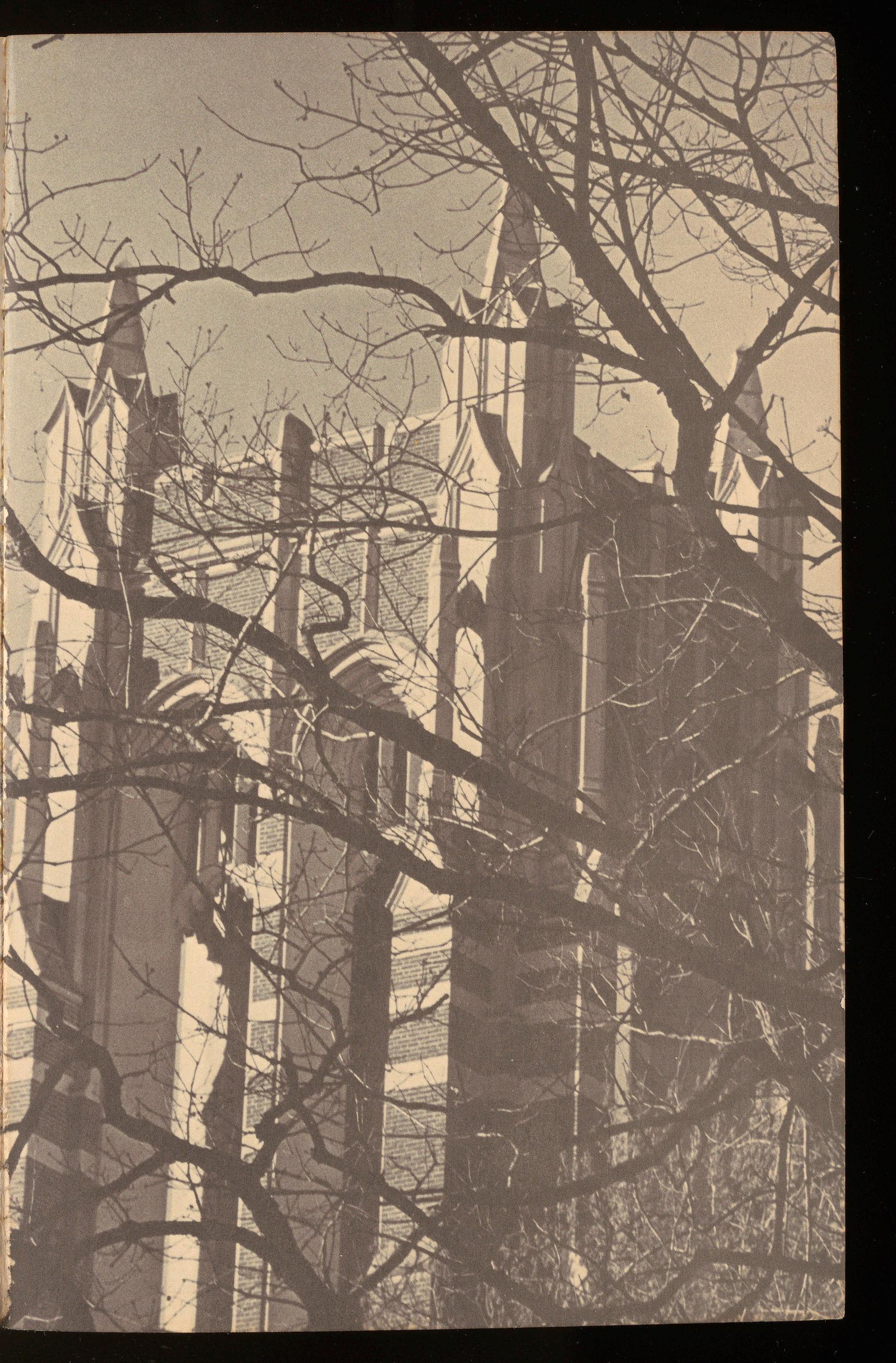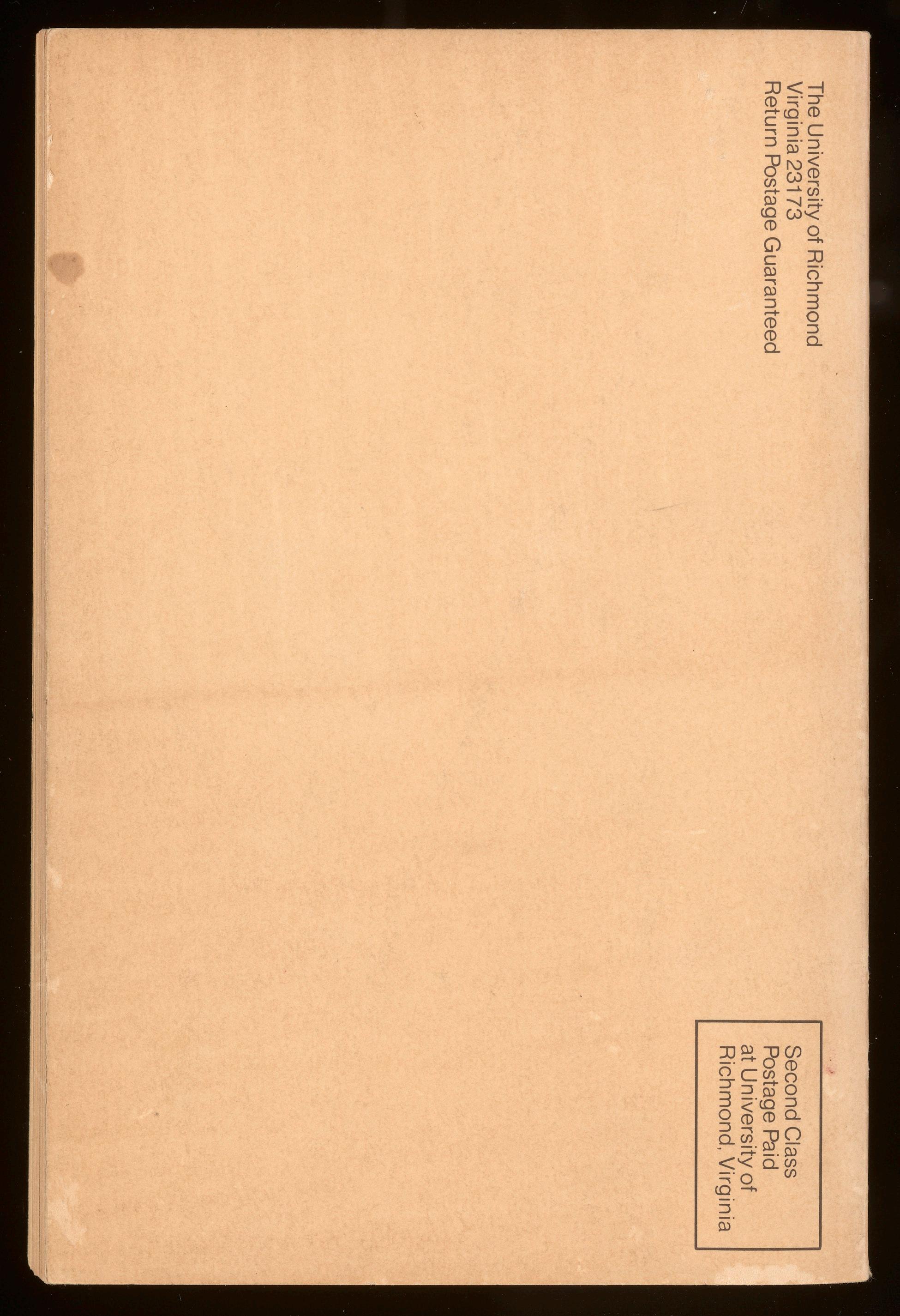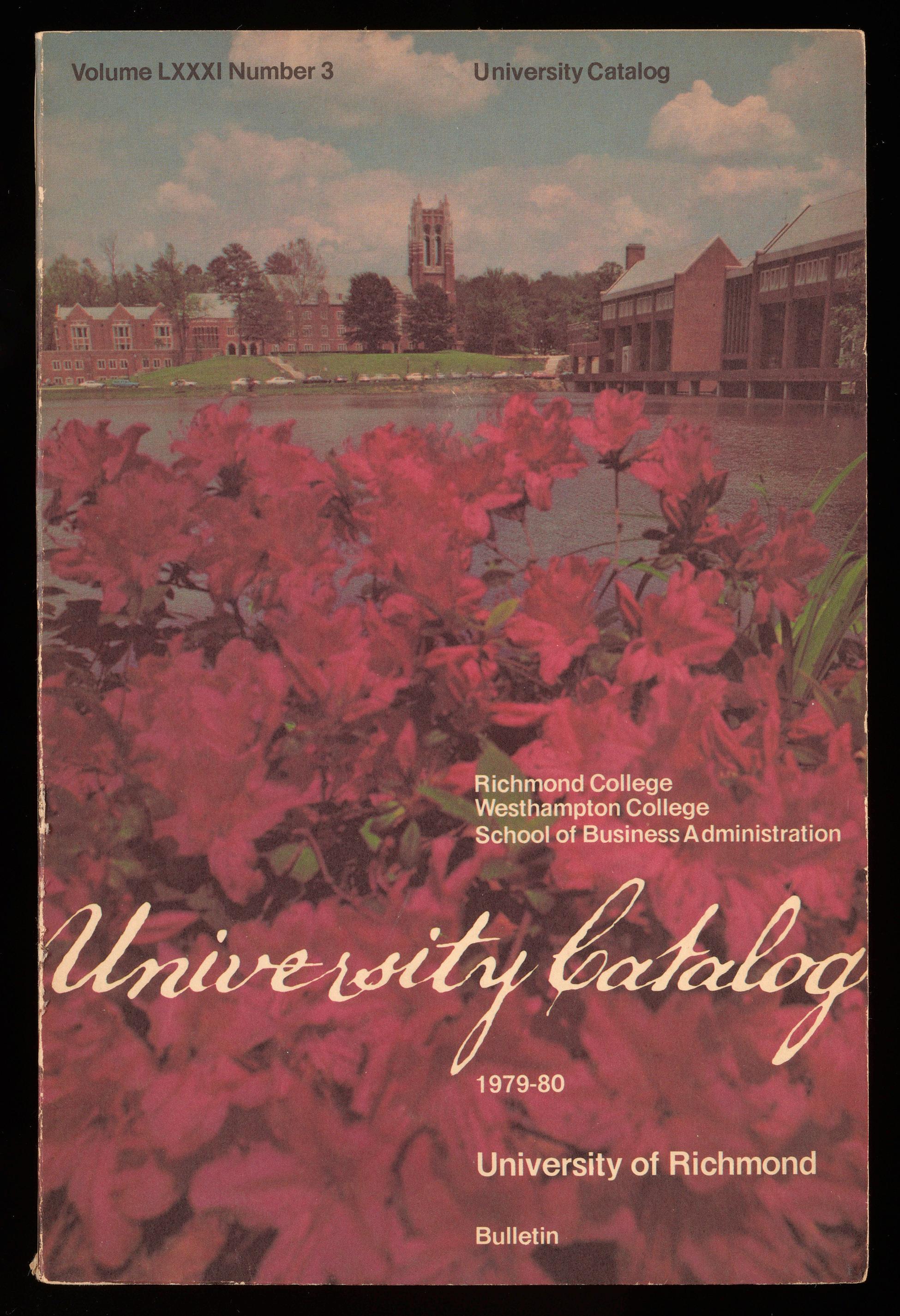

Universityof Richmond Bulletin
Volume LXXXI April 15, 1979 Number 3
USPS 652-160
Second-class postage paid by University of Richmond, Virginia 23173. Published by the University of Richmond four times a year: once in February, twice in March and once in April.
The University of Richmond does not discriminate against students, prospective students, employees or prospective employees because of their sex, religion, race, color, age, or ethnic or national origin. This policy is in compliance with the requirements of Title VII of the Civil Rights Act of 1964, Title IX of the Education Amendments of 1972 and all other applicable federal, state and local statutes, ordinances and regulations.
The provisions of this bulletin are not to be regarded as an irrevocable contract between the University (or any of its colleges) and the student. The University of Richmond reserves the right to change any provision or requirement at any time.
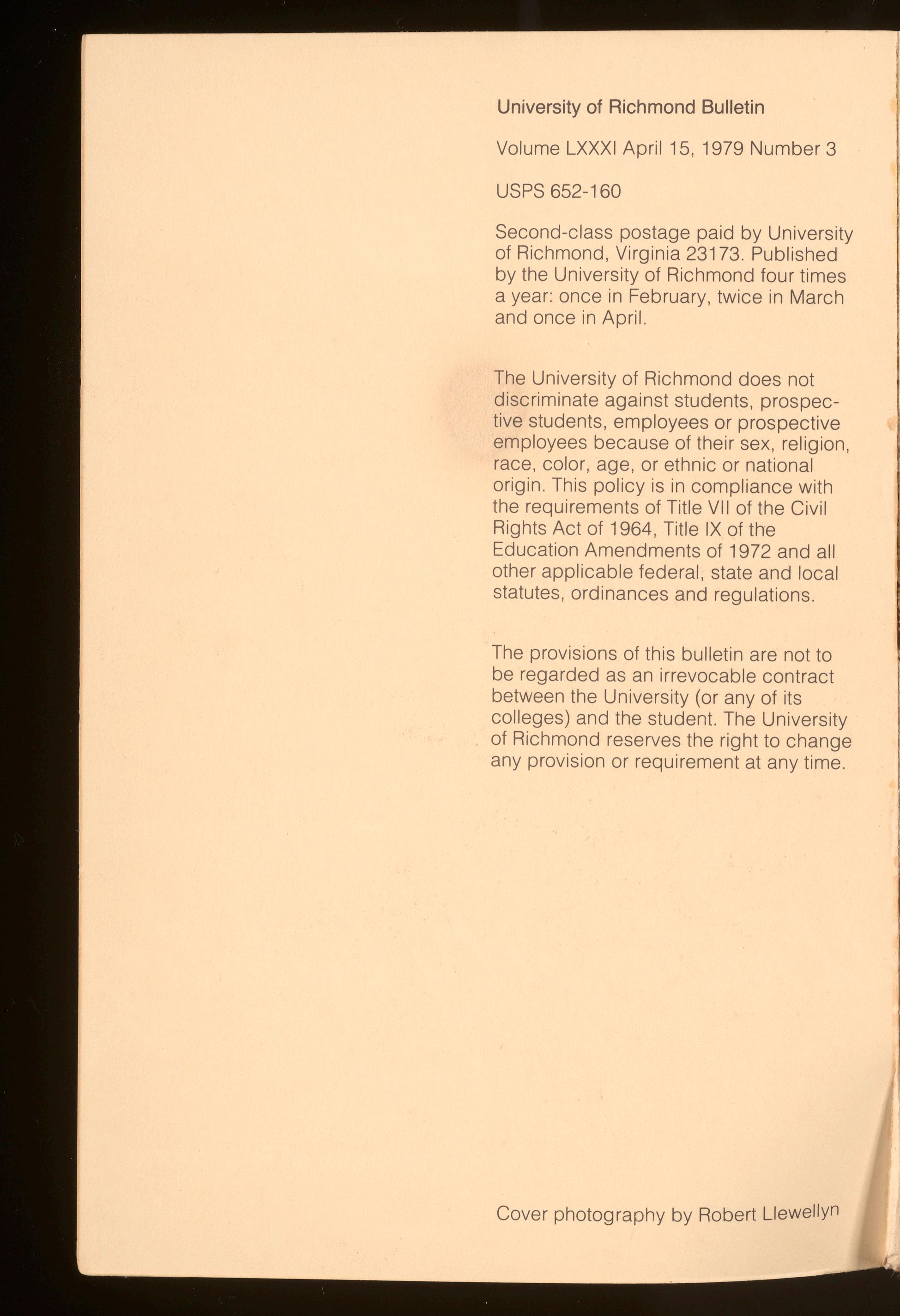
Cover
photography by Robert Llewellyn
Universityof Richmond
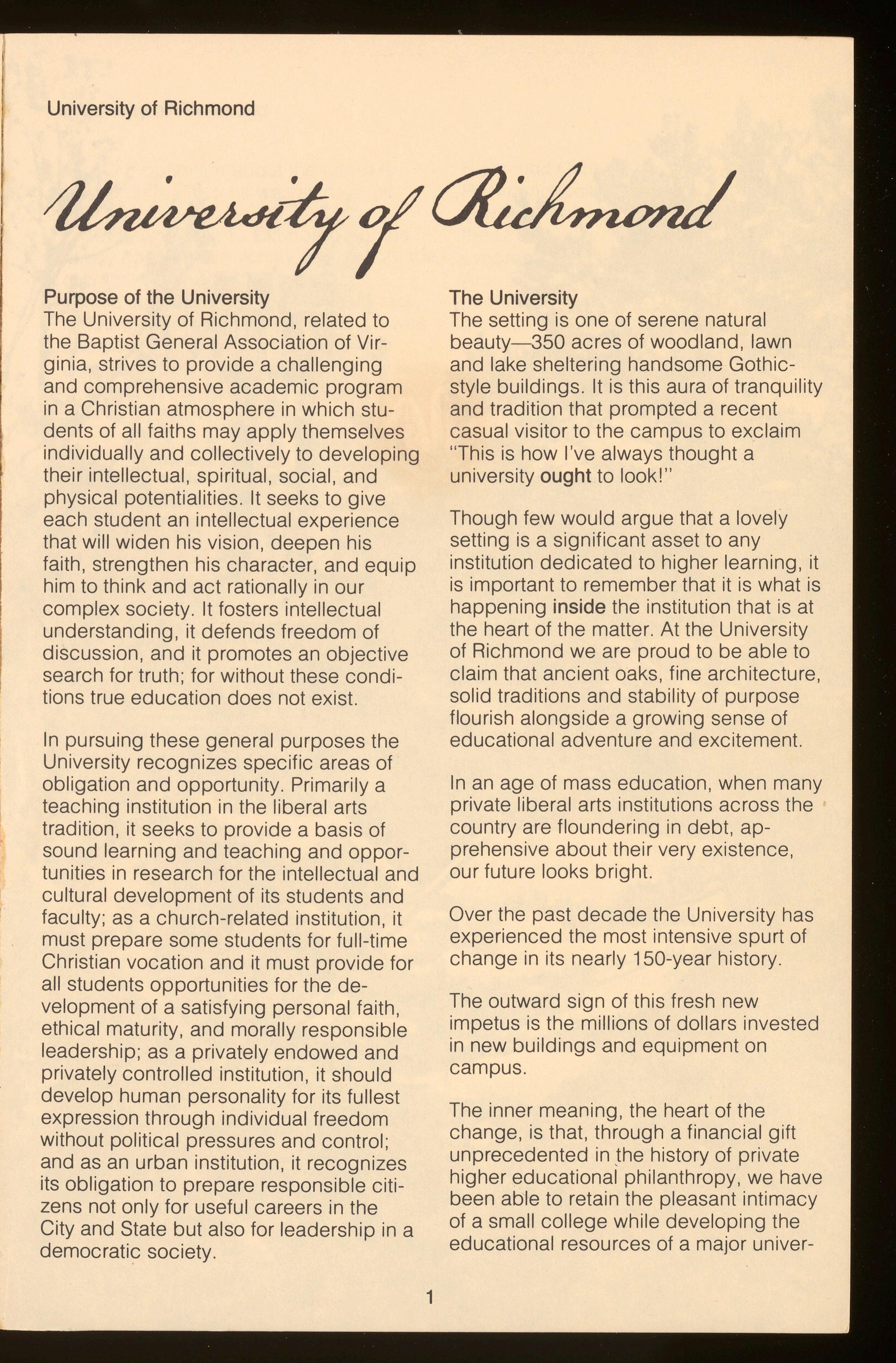
Purpose of the University
The University of Richmond , related to the Baptist General Association of Virginia, strives to provide a challenging and comprehensive academic program in a Christian atmosphere in which students of all faiths may apply themselves individually and collectively to developing their intellectual , spiritual , social, and physical potentialities . It seeks to give each student an intellectual experience that will widen his vision , deepen his faith , strengthen his character, and equip him to think and act rationally in our complex society It fosters intellectual understanding, it defends freedom of discussion, and it promotes an objective search for truth ; for without these conditions true education does not exist.
In pursuing these general purposes the University recognizes specific areas of obligation and opportunity Primarily a teaching institution in the liberal arts tradition , it seeks to provide a basis of sound learning and teaching and opportunities in research for the intellectual and cultural development of its students and faculty ; as a church-related institution, it must prepare some students for full-time Christian vocation and it must provide for all students opportunities for the development of a satisfying personal faith , ethical maturity, and morally responsible leadership; as a privately endowed and privately controlled institution , it should develop human personality for its fullest expression through individual freedom without political pressures and control; and as an urban institution, it recognizes its obligation to prepare responsible citizens not only for useful careers in the City and State but also for leadership in a democratic society .
The University
The setting is one of serene natural beauty-350 acres of woodland , lawn and lake sheltering handsome Gothicstyle buildings . It is this aura of tranquility and tradition that prompted a recent casual visitor to the campus to exclaim " This is how I've always thought a university ought to look!"
Though few would argue that a lovely setting is a significant asset to any institution dedicated to higher learning, it is important to remember that it is what is happening inside the institution that is at the heart of the matter. At the University of Richmond we are proud to be able to claim that ancient oaks , fine architecture , solid traditions and stability of purpose flourish alongside a growing sense of educational adventure and excitement .
In an age of mass education , when many private libera l arts institutions across the country are floundering in debt, apprehensive about their very existence, our future looks bright.
Over the past decade the University has experienced the most intensive spurt of change in its nearly 150-year history
The outward sign of this fresh new impetus is the millions of dollars invested in new buildings and equipment on campus .
The inner meaning, the heart of the change , is that, through a financial gift unprecedented in _thehistory of private higher educational philanthropy , we have been able to retain the pleasant intimacy of a small college while developing the educational resources of a major univer-
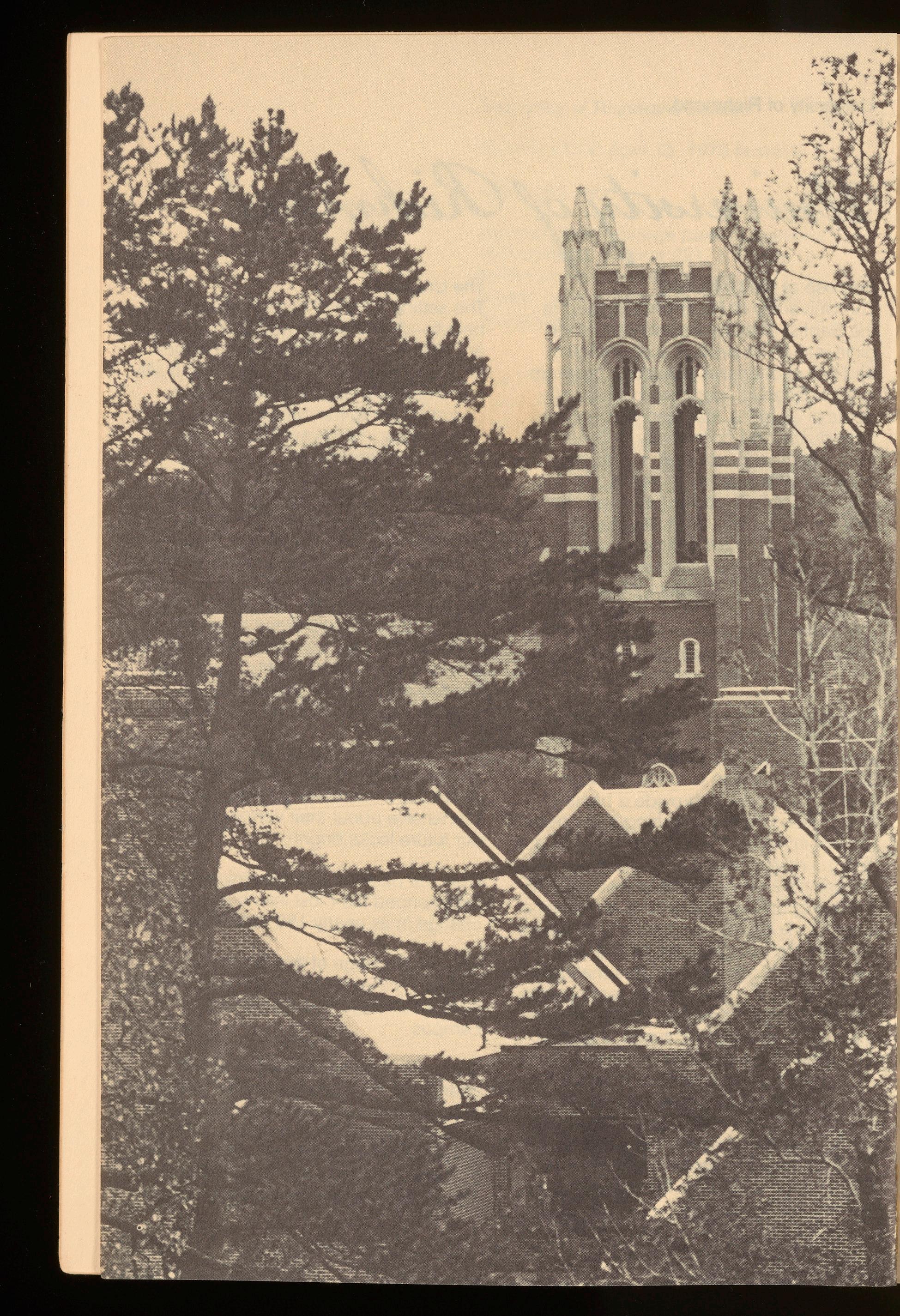

Universityof Richmond
sity. Our optimism about the future is based on realities as well as dreams.
In 1969, when the E. Claiborne Robins family gave the University $50 million, the purpose behind the gift was that we should strive upward toward greatness, rather than toward bigness. The gift was to be used to stimulate the pursuit of academic excellence and humane values in an era of educational mass production with its implications of mediocrity.
Since 1969 , additional funds of more than $40 million have been donated by friends, alumni, businesses and foundations who share our optimism and our exhilaration about the University's future in the pursuit of excellence.
Our history began in 1830. The Baptists of Virginia founded a seminary , which evolved into a men's liberal arts college, known as Richmond College. Over the years , other colleges and schools were added: the T. C. Williams School of Law in 1870 , and Westhampton College , the women 's liberal arts division , in 1914. In 1920 the complex of colleges and schools became the University of Richmond The institution continued to grow, adding the Graduate School (1921 ), the School of Business Administration (1949) and University College: Summer School and Continuing Education (1962), and has thus become the largest private university in Virginia.
Though the University of Richmond is composed of six colleges and schools, you probably will be concerned primarily with the three undergraduate divisions: Richmond and Westhampton Colleges , which are the coordinate arts and science colleges for men and women respectively, and the School of Business Administration, a professional college for junior and senior students with business interests.
RichmondCollege
Richmond College, with its current enrollment of 1285 men, is the oldest of the University 's six divisions. It offers programs that lead to the Bachelor of Arts , Bachelor of Science and Bachelor of Music degrees. In UR's coordinate arts and sciences college for undergraduate men, you may major in any of 22 academic areas. Included are courses in preparation for such professional schools as medicine, dentistry, veterinary science, pharmacy , law , business or the ministry .
Equally extensive is the diversity of cocurricular activities on campus and the vast social and cultural opportunities of the City of Richmond. More than onethird of Richmond 's students belong to one of 11 national fraternity chapters. For the athletically minded (and more than two-thirds of the student body participate in at least one sport) , the $1 a-million Robins Center provides the most modern facilities for physical education and intercollegiate and intramural athletics.
Westhampton College
Westhampton College , the liberal arts and sciences college for 900 undergraduate women, offers a strong academic program leading to the Bachelor of Arts , Bachelor of Science or Bachelor of Music degrees. The curriculum encourages students to gain a broad liberal arts education while pursuing an in-depth major in one of the 22 academic disciplines.
Westhampton College is one of the six coordinate colleges that make up the University of Richmond While Westhampton students have access to all University facilities and activities , the College has a separate student body , an independent student government, honor code and honorary society , and a strong intramural program
Universityof Richmond
Westhampton students live in their own residence halls and enjoy a wide variety of cocurricular programs designed with the needs and interests of today ' s women in mind .
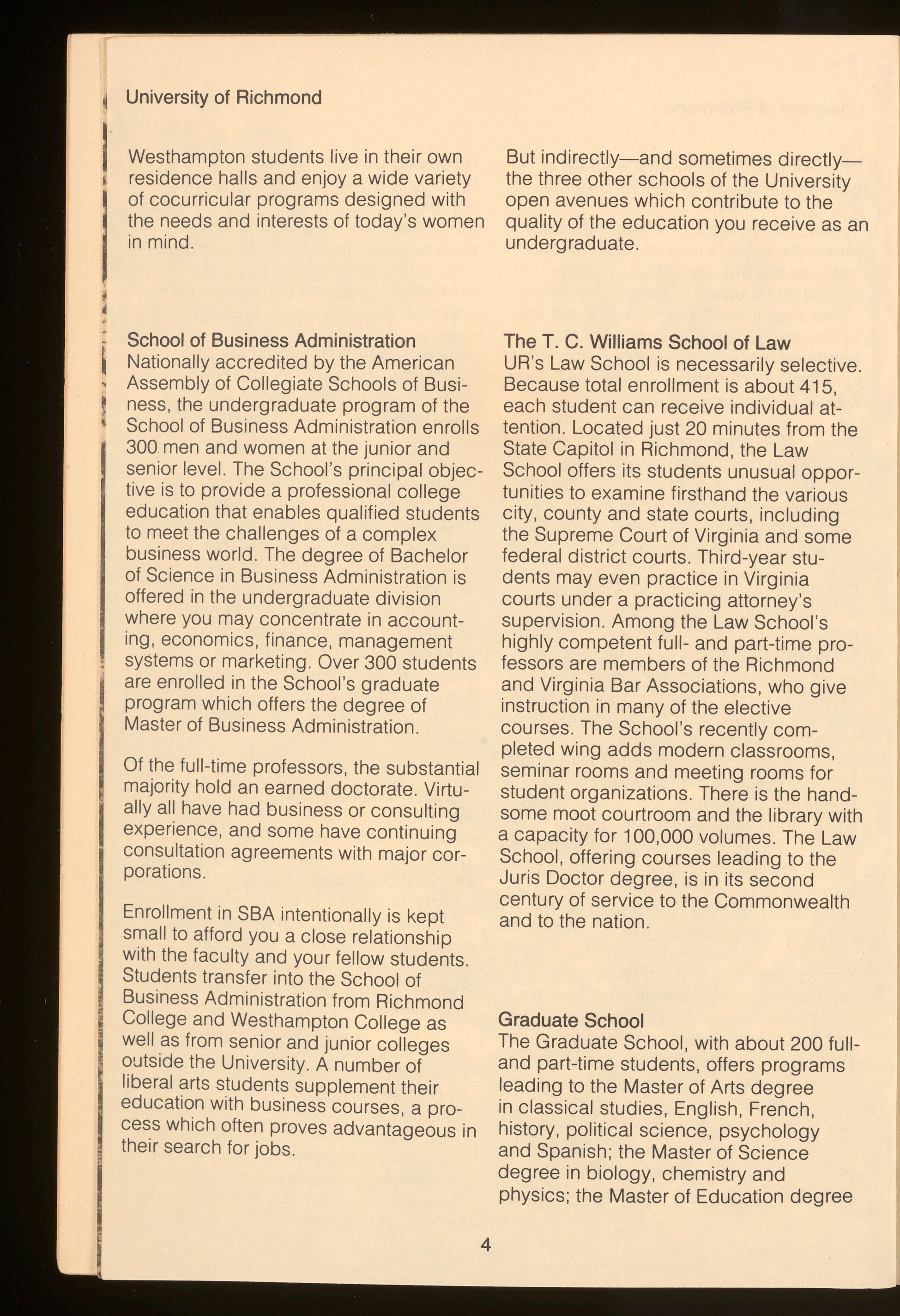
· Schoolof BusinessAdministration
Nationally accredited by the American , Assembly of Collegiate Schools of Business, the undergraduate program of the School of Business Administration enrolls 300 men and women at the junior and senior level. The School's principal objective is to provide a professional college education that enables qualified students to meet the challenges of a complex business world. The degree of Bachelor of Science in Business Administration is offered in the undergraduate division where you may concentrate in accounting , economics, finance , management systems or marketing. Over 300 students are enrolled in the School's graduate program which offers the degree of Master of Business Administration .
Of the full-time professors, the substantial majority hold an earned doctorate. Virtually all have had business or consulting ex perience, and some have continuing consultation agreements with major corporations.
Enrollment in SBA intentionally is kept small to afford you a close relationship with the faculty and your fellow students . Students transfer into the School of Business Administration from Richmond College and Westhampton College as well as from senior and junior colleges outside the University . A number of liberal arts students supplement their education with business courses, a process which often proves advantageous in their search for jobs.
But indirectly-and sometimes directlythe three other schools of the University open avenues which contribute to the quality of the education you receive as an undergraduate
The T. C. WilliamsSchoolof Law UR's Law School is necessarily selective
Because total enrollment is about 415 , each student can receive individual attention . Located just 20 minutes from the State Capitol in Richmond, the Law School offers its students unusual opportunities to examine firsthand the various city, county and state courts, including the Supreme Court of Virginia and some federal district courts . Third-year students may even practice in Virginia courts under a practicing attorney's supervision. Among the Law School's highly competent full-and part-time professors are members of the Richmond and Virginia Bar Associations, who give instruction in many of the elective courses The School's recently completed wing adds modern classrooms, seminar rooms and meeting rooms for student organizations There is the handsome moot courtroom and the library with a capacity for 100,000 volumes . The Law School, offering courses leading to the Juris Doctor degree, is in its second century of service to the Commonwealth and to the nation .
Graduate School
The Graduate School, with about 200 fulland part-time students, offers programs leading to the Master of Arts degree in classical studies, English, French, history, political science, psychology and Spanish; the Master of Science degree in biology, chemistry and physics; the Master of Education degree

Universityof Richmond
in school administration, guidance and counseling, supervision of instruction, reading, elementary education N-K-3 and 4-7, physical education and learning disabilities . In addition, the Graduate School offers the interdisciplinary Master of Humanities degree
Students holding undergraduate degrees who wish to take graduate courses but do not intend to enroll in a graduate degree program may matriculate in the Graduate School as special students . Under certain conditions undergraduate seniors may also enroll in graduate-level courses .
Because most of the Graduate School faculty are drawn from the undergraduate Faculty of Arts and Sciences, Richmond and Westhampton College students have the advantage of the highest quality instruction .
UniversityCollege
The six divisions of University College are 1) Evening School, 2) Summer School , 3) Continuing Education, 4) School of Christian Studies, 5) Women's Programs, 6) Summer Programs , Institutes and Workshops, with a combined population of over 15,395 people.
Students may enroll to take courses, with or without credit, in the evening during the regular academic year, and in the day and evening during the summer. University College offers the Bachelor of Applied Studies degree with seven areas of application : banking, human resources management, legal assistant, public administration, public relations, real estate and transportation
Units (CEUs) are awarded for completion of noncredit courses and seminars.
Undergraduates at UR can test their interest in many career areas and learn professional skills . They may enroll in professional courses, workshops or seminars in University College under certain conditions .
CoordinateEducation
The University of Richmond is more than a collection of schools and colleges. It is the separateness of each division that lends to the institution's distinctness. By maintaining a coordinate college system, UR is able to offer you the best of both worlds-the advantages of a single-sex college and the advantages of a coeducational college; the advantages of a major university and the advantages of a small college. You benefit from the interplay and interaction of a diversely organized university
If you wish to focus your activities within the intimate boundaries of your own college, you may do so Because each college has its own independent student government organization, your opportunities to lead and to make your voice heard multiply Because each college has its own dean, you have great accessibility to the administration. And because each college emphasizes personal goals and the special paths to achievement for its students, you can obtain specific guidance.
But you share an outstanding faculty . You share student activities (although there are few specifically for one sex or the other). And you share superb facilities.
Though there are over 46 major buildings The Associate of Applied Studies degree and facilities on campus, you will want to is offered in the above areas as well as acquaint yourself with a few of the various certificate programs Certificates buildings in which you'll be spending a of Completion and Continuing Education major part of your time .
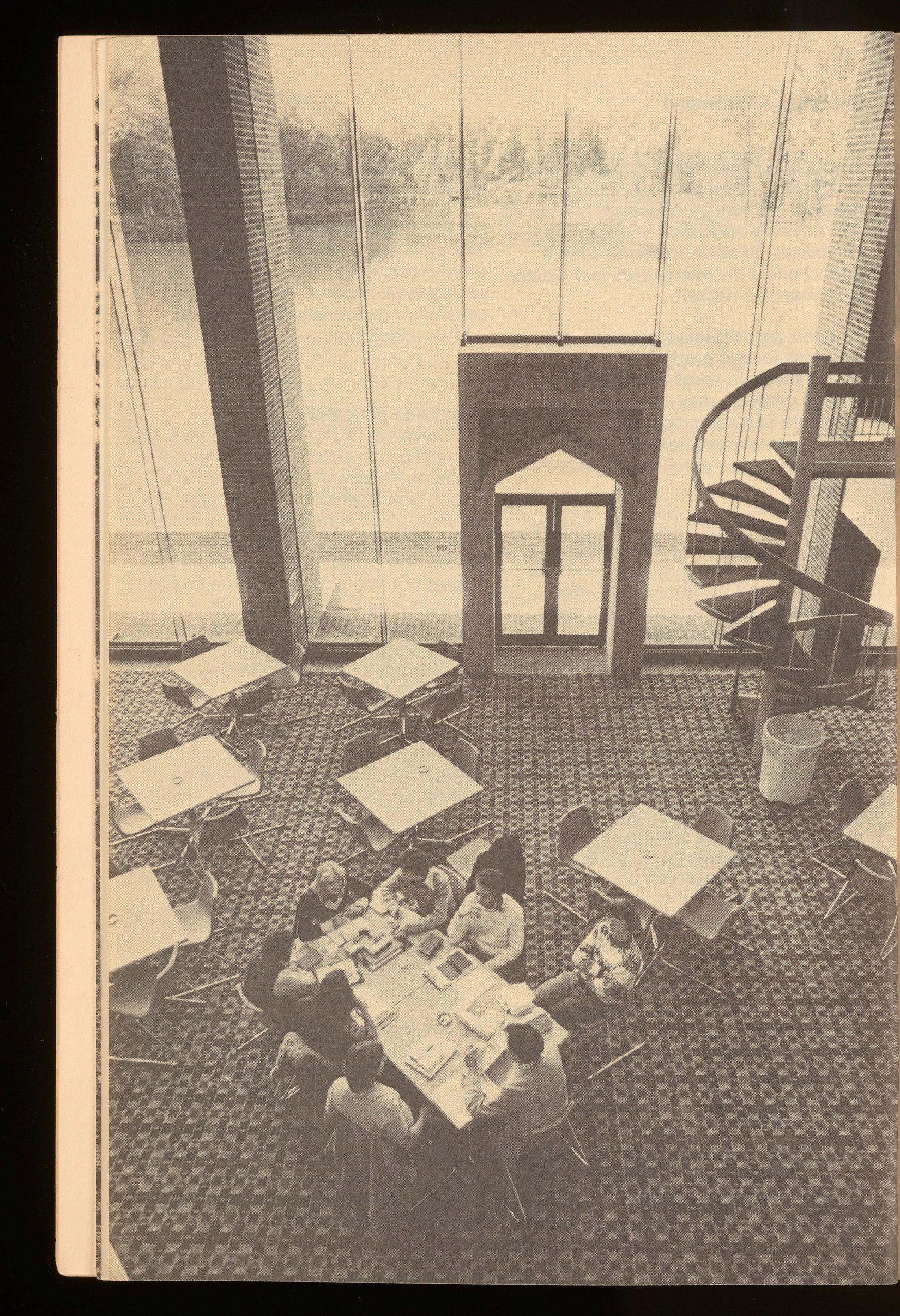

Universityof Richmond
UniversityCommons
Spanning University Lake is University Commons, the new student activities center which provides a physical tie between the Richmond and Westhampton campuses Although modern, the design of the building complements the Collegiate Gothic architecture of the campus. Two-story eating , recreation, and lounge areas overlook the lake. Facilities on the first f loor of the building include the Dry Dock, a fast-food service, and a multipurpose room capable of seating 500. Winding, open staircases lead to the second floor which houses the University Bookstore, the Chaplain's Office and the Student Activities Office. Adjacent to the University Food Service office on the third floor are large and small meeting rooms and offices for many student organizations-newspaper, yearbook, FM radio station, University Student Union and student governments The Commons is a constant center of activity; many of its facilities are booked by some groups months in advance.
The Libraries
The University libraries ' collections and buildings have expanded significantly in size and in scope , allowing greater resources for the interaction of students, faculty and librarians.
There are four University libraries: the Frederic W. Boatwright Memorial Library , the Science Library in the new Science Center , the Music Library in the Modlin Fine Arts Center and the Law Library in the T. C Williams School of Law. Total holdings, excluding the Law Library , come to 285,645 volumes , 2,716 subscription periodicals, 107,163 government documents, 7,424 microforms , approximately 6,000 musical scores and recordings.
The main library is Boatwright. Recently enlarged to more than triple its former size, Boatwright will eventually accommodate a half million volumes. It comfortably seats up to 1,000 students at any one time (far above the average of major college and university libraries). In addition to the open stacks, there are custom-made carrels, individual study rooms, group studies equipped with blackboards, an all-night study, an honors study, typing rooms, a rare books room and the Lora Robins Gallery of Design From Nature, housing the University ' s extensive collections of minerals, shells and fossils. Boatwright has been designated an official depository for U.S. Government documents.
The Billikopf Learning Resources Center of Boatwright Library affords students the latest in multimedia facilities : individual carrels wired for remote television and cassette tape modules , preview rooms, exhibit room, a 100-seat auditorium , and complete provisions for film showings , video taping , language and learning laboratories.
The libraries have a total staff of 38 persons , who provide information , teach the use of bibliographic and audio-visual materials and encourage the University community to regard the libraries as an integral part of its academic experience.
The Science Center
The newest of UR's facilities is an extensive complex, where the biology, chemistry and physics departments are housed in separate wings. To allow the greatest reciprocal influence among disciplines , each of the wings ' three floors converges onto a central hall. The Science Center contains 27 teaching laboratories with adjoining preparation and instrument rooms , 26 student-faculty laboratories for individual research projects, an electron microscope suite , a radio-nuclide labora-

Universityof
Richmond
tory that enables students and faculty to work with radioactive isotopes , a greenhouse, a variety of animal facilities, a surgery and a computer terminal room. It also houses the science library , seminar rooms, classrooms, faculty offices and student-faculty lounges . Throughout the building are showcases of biological specimens and materials.
Maryland Hall and RichmondHall
Built during the early 1930's , Maryland Hall and Richmond Hall were part of the Science Quadrangle until the completion of the Science Center in 1977. After a year of extensive renov ations to restore the beauty of the exterior and to modernize the interior , these traditional old structures now house many of the Univ ersity ' s administrative offices.
As you enter the main floor of Maryland Hall from the courtyard, the Admissions and Financial Aid Offices are to the right To the left are the offices of Student Affairs and University Relations , including the Alumni and Development Offices . The President's Suite along with the offices of the Provost , Business and Finance, Controller , and University Services are on the second floor. The lower level of the building consists of offices for Communications , the Westhampton College Alumnae Association and Accounting
Adjacent to Maryland Hall , Richmond Hall accommodates administrative offices as well as classroom and departmental facilities. Included among the administrative offices are the Payments Office , University College , the Center for Psychological Services, Career Planning and Placement, and the Women 's Resource Center.
The Modlin Fine Arts Center
Modlin is the centerfor art, music , speech and theatre arts In the Marsh Gallery contemporary artists regularly display touring exhibits of their works , while the Lutz Puppet Collection and an extensive collection of American pressed glass goblets are part of the permanent collections on exhibit. Adjacent to the Gallery is the modern and comfortable 700-seat Camp Theater, where music concerts , dance performances and dramatic productions are presented. The facility also includes painting , sculpture and ceramic studios (including pottery wheels and a gas-fired kiln); a music listening library ; special rehearsal rooms for band, orchestra and vocal groups; teaching studios; and 12 music-practice rooms
Robins Center and Athletic Facilities
The $10-million Robins Center ranks high among the best-equipped athletic facilities in the country. It features a 10,000-seat basketball arena, a six-lane swimming pool with an automatic timing system, wrestling room , olympic weight room , two exercise rooms with gymnastic equipment, seven handball courts , two squash courts , two auxiliary gymnasiums, steam and sauna baths. Also included are a physiology laboratory, classrooms, offices , conference rooms, locker rooms and a 130-seat theatre (One of the unique aspects of the facility is that however frequently you go to the Center, you always find a fresh change of athletic clothes.)
Adjoining Robins Center is the 3 ,000-seat stadium and all-weather Chevron 440 metric track Nearby are all-weather tennis courts and Pitt Baseball Field , an NCAA certified field of the highest quality
Universityof Richmond
Westhampton has its own athletic facilities - Crenshaw Swimming Pool, a gymnasium for intramural sports in Keller Hall, excellent tennis courts and field hockey , lacross and archery fields .
City of Richmond
Although the University of Richmond is a complete community in itself-with a full range of cultural , social and recreational opportunities on its own campus-we would be remiss not to mention the advantages of the University 's location
Richmond , with a metropolitan population of a half million , is the capital of Virginia Traditionally the cultural center of the South, it is a major financial, business and industrial center Not only do some students find part-time or summer employment in the city, but many after graduation decide to remain in Richmond
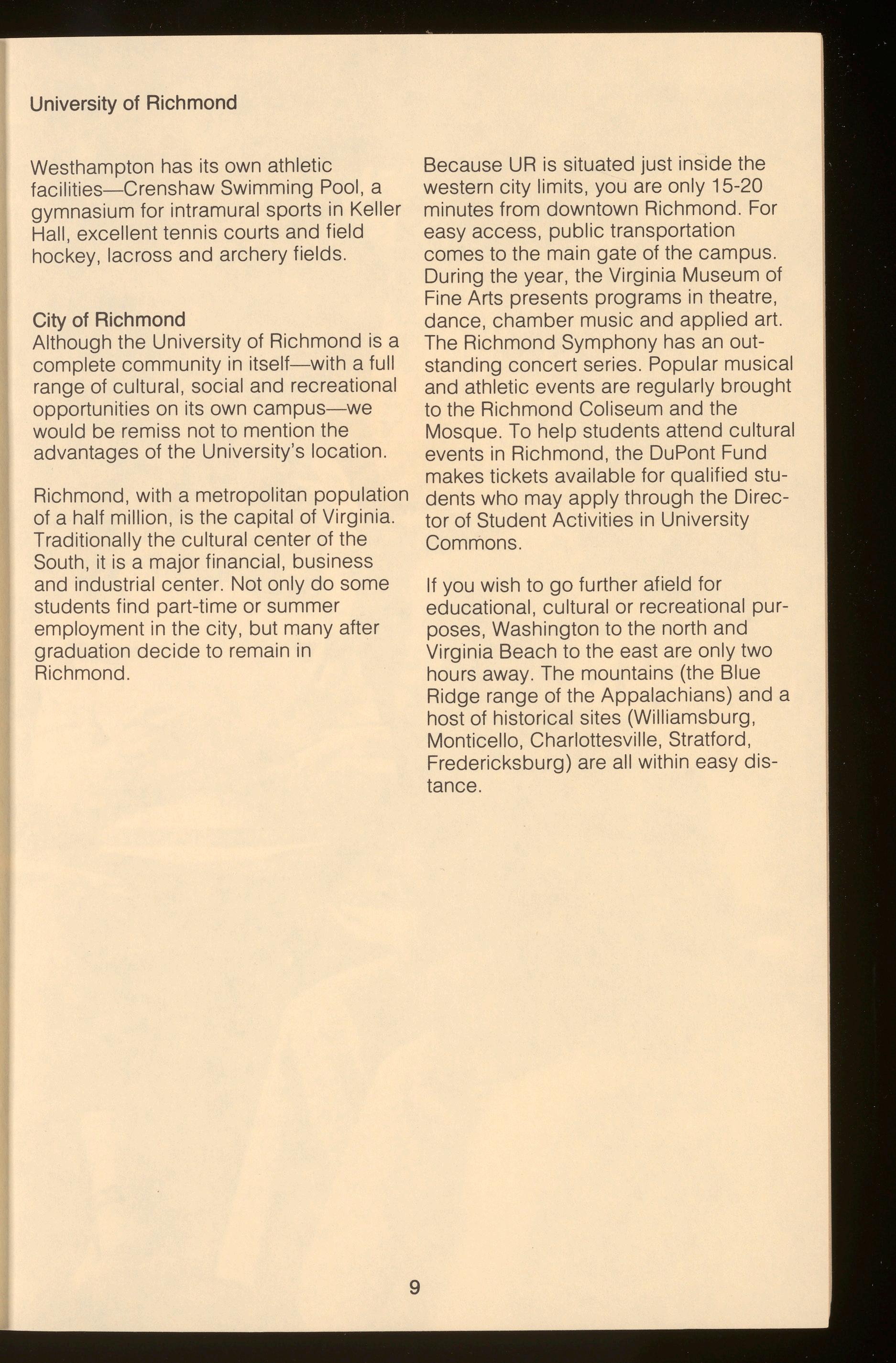
Because UR is situated just inside the western city limits, you are only 15-20 minutes from downtown Richmond For easy access, public transportation comes to the main gate of the campus. During the year, the Virginia Museum of Fine Arts presents programs in theatre, dance, chamber music and applied art. The Richmond Symphony has an outstanding concert series . Popular musical and athletic events are regularly brought to the Richmond Coliseum and the Mosque . To help students attend cultural events in Richmond , the DuPont Fund makes tickets available for qualified students who may apply through the Director of Student Activities in University Commons .
If you wish to go further afield for educational , cultural or recreational purposes, Washington to the north and Virginia Beach to the east are only two hours away . The mountains (the Blue Ridge range of the Appalachians) and a host of historical sites (Williamsburg , Monticello, Charlottesville , Stratford , Fredericksburg) are all with in easy distance .
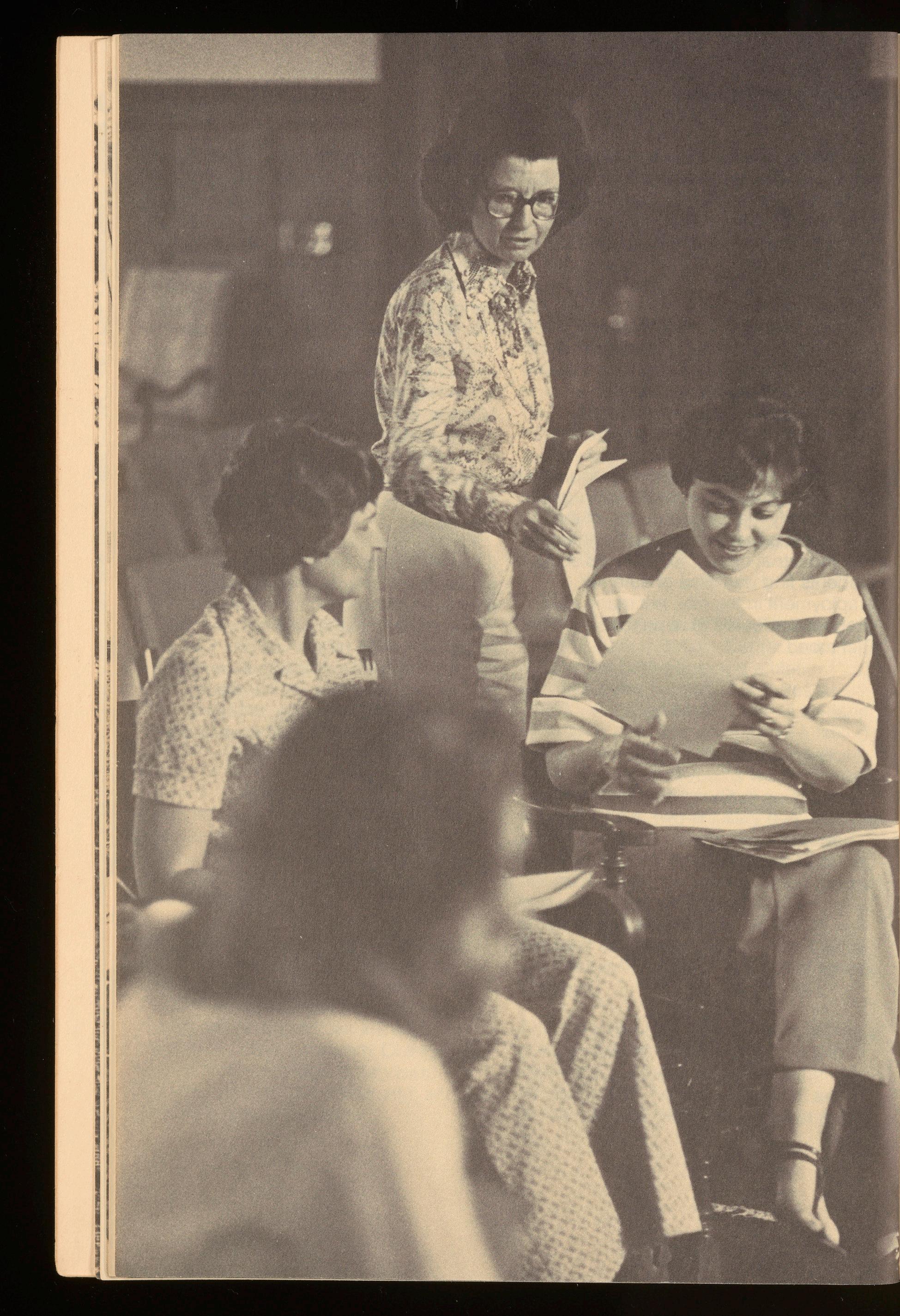
Academic Life
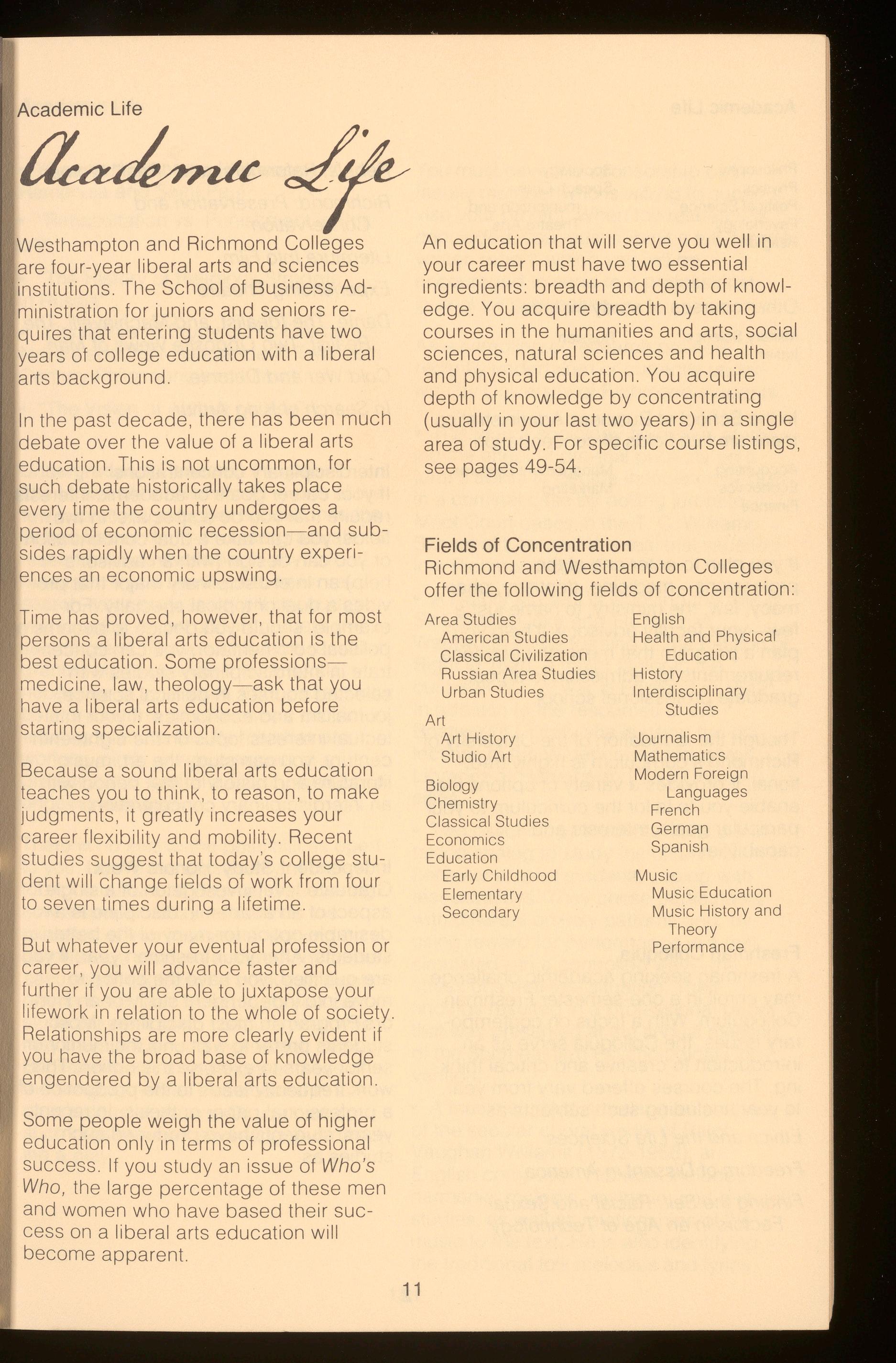
Westhampton and Richmond Co lleges are four-year liberal arts and sciences institutions. The School of Business Administration for juniors and seniors requires that entering students have two years of college education with a liberal arts background.
In the past decade , there has been much debate over the value of a liberal arts education. This is not uncommon, for such debate historically takes place every time the country undergoes a period of economic recession-and subsides rapidly when the country experiences an economic upswing.
Time has proved, however, that for most persons a liberal arts education is the best education. Some professionsmedicine , law , theology - ask that you have a liberal arts education before starting specialization.
Because a sound liberal arts education teaches you to think , to reason , to make judgments , it greatly increases your career flexibility and mobility. Recent studies suggest that today 's college student will change fields of work from four to seven times during a lifetime.
But whatever your eventual profession or career , you will advance faster and further if you are able to juxtapose your lifework in relation to the whole of society. Relationships are more clearly evident if you have the broad base of knowledge engendered by a liberal arts education.
Some people weigh the value of higher education only in terms of professional succe ss If you study an issue of Who's Who, the large percentage of these men and women who have based their success on a liberal arts education will become apparent.
An educat ion that wil l serve you well in your career must have two essential ingredients: breadth and depth of knowledge. You acquire breadth by taking courses in the humanities and arts, social sciences, natural sciences and health and physical education. You acquire depth of knowledge by concentrating (usually in your last two years) in a single area of study. For specific course listings , see pages 49-54.
Fields of Concentration
Richmond and Westhampton Colleges offer the following fields of concentration:
Area Studies
American Studies
Classical Civilization
Russian Area Studies
Urban Stud ies
Art
Art History
Studio Art
Biology
Chemistry
Classical Studies
Economics
Education
Early Childh ood
Elementary
Secondary
English
Health and Physical
Education
History
Interdisciplinary Studies
Journalism
Mathematics
Modern Foreign
Languages
French
German
Spanish
Music
Music Education
Music History and Theory
Performance
Academic Life
Philosophy
Physics
Political Science
Psychology
Religion

Sociology
Speech Communication and Theatre Arts
Other courses of study include:
Military Science
Italian Russian
In the School of Business Administration there are five fields of concentration:
Accounting
Economics
Finance
Management Systems
Marketing
If you plan to enter one of the professions-medicine, dentistry, pharmacy, law, the ministry, to name just a few-your faculty advisor will help you plan a program that meets the entrance requirements for admission to a postgraduat,e professional school.
Though the foundation of the University of Richmond's curriculum is highly traditional, it provides a variety of options that enable you to tailor the curriculum to your particular goals, interests and capabilities.
Freshman Colloquia
A freshman seeking academic challenge may enroll in a one-semester Freshman Colloquium. With a focus on contemporary issues, the Colloquia serve as an introduction to creative and critical thinking. The courses offered vary from year to year, including such subjects as:
Ethics and the Life Sciences
Freedom of Dissent in America
Finding the Self: Racial and Sexual Factors in an Age of Technology
Rebels, Reformers, and "Real" Women
Richmond: Preservation and Conservation
Literature Into Film
Experiencing Theatre
Dante, The Idealist, and Machiavelli, The Realist: Two Opposite Views of Man
Cold War and Detente
In Search of King Arthur
Interdisciplinaryconcentrations
If your career goals or academic interests require that you be a specialist in two fields, you can take a dual concentration or you can design (with an advisor's help) an interdisciplinary major that provides a dual or topical specialty. For example, should you decide to become a political commentator, you can concentrate in interdisciplinary studies with selected courses in political science, journalism and economics. If your intellectual interests focus on the eighteenth century, you can study the art, music, literature and history of that period with an interdisciplinary concentration.
IndependentStudy/ Honors Work
Graduate-level investigaton of a single aspect of an academic discipline is a desirable option for many of the better students. After your freshman year, if you are qualified, you have the option to move into independent study or an Honors Program in most disciplines. Most students prefer to wait until their junior or senior years to exercise this option. This work frequently leads to the production of a professional paper or thesis. In recent years, students have produced such studies as:
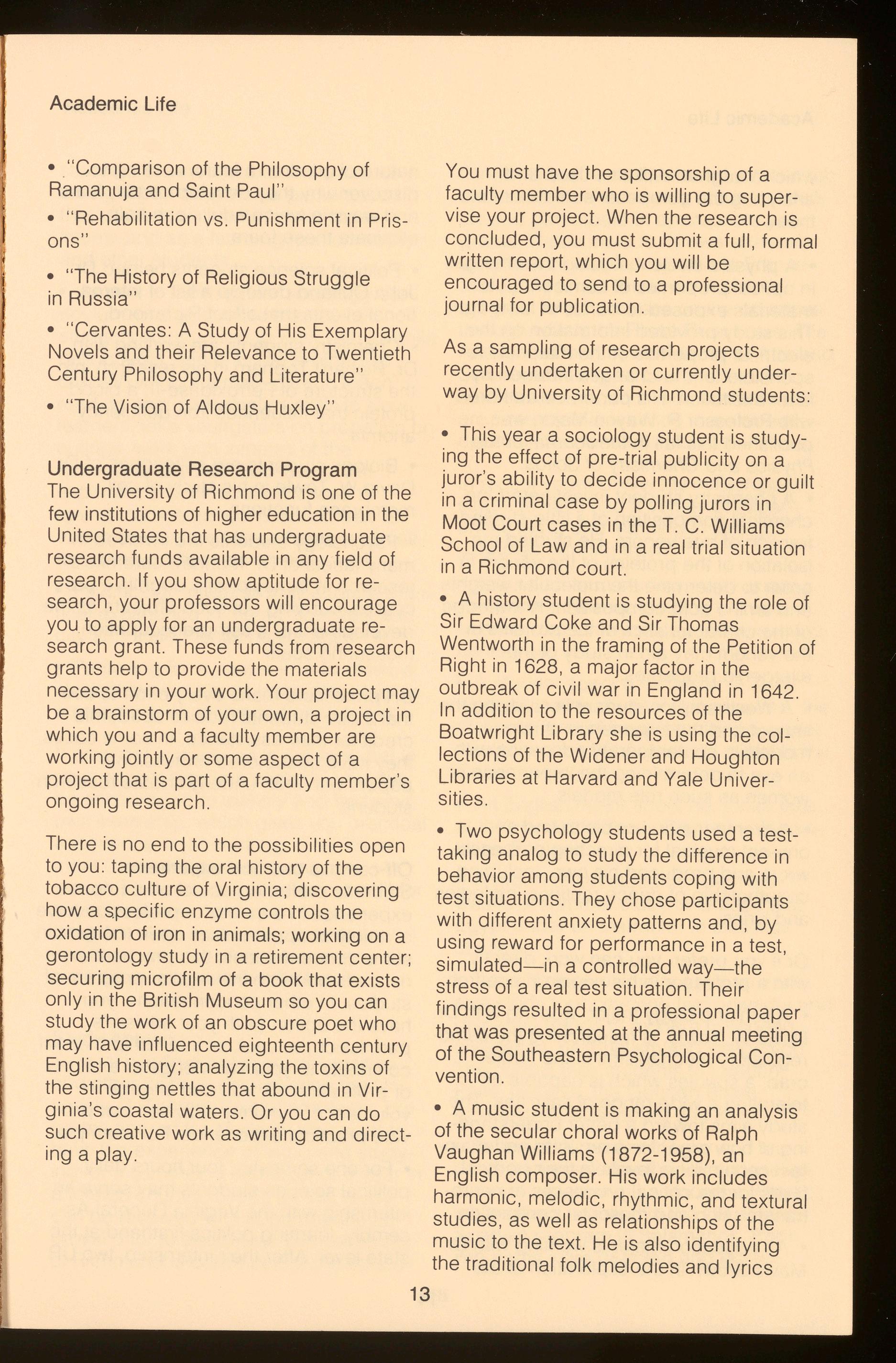
• "Comparison of the Philosophy of Ramanuja and Saint Paul"
• " Rehabilitation vs . Punishment in Prisons"
• "The History of Religious Struggle in Russia"
• "Cervantes: A Study of His Exemplary Novels and their Relevance to Twentieth Century Philosophy and Literature"
• "The Vision of Aldous Huxley"
UndergraduateResearch Program
The University of Richmond is one of the few institutions of higher education in the United States that has undergraduate research funds available in any field of research. If you show aptitude for research, your professors will encourage you to apply for an undergraduate research grant. These funds from research grants help to provide the materials necessary in your work. Your project may be a brainstorm of your own, a project in which you and a faculty member are working jointly or some aspect of a project that is part of a faculty member's ongoing research
There is no end to the possibilities open to you : taping the oral history of the tobacco culture of Virginia; discovering how a specific enzyme controls the oxidation of iron in animals; working on a gerontology study in a retirement center; securing microfilm of a book that exists only in the British Museum so you can study the work of an obscure poet who may have influenced eighteenth century English history; analyzing the toxins of the stinging nettles that abound in Virginia ' s coastal waters Or you can do such creative work as writing and directing a play.
You must have the sponsorship of a faculty member who is willing to supervise your project. When the research is concluded, you must submit a full, formal written report, which you will be encouraged to send to a professional journal for publication.
As a sampling of research projects recently undertaken or currently underway by University of Richmond students:
• This year a sociology student is studying the effect of pre-trial publicity on a juror's ability to decide innocence or guilt in a criminal case by polling jurors in Moot Court cases in the T C Williams School of Law and in a real trial situation in a Richmond court.
• A history student is studying the role of Sir Edward Coke and Sir Thomas Wentworth in the framing of the Petition of Right in 1628, a major factor in the outbreak of civil war in England in 1642. In addition to the resources of the Boatwright Library she is using the collections of the Widener and Houghton Libraries at Harvard and Yale Universities.
• Two psychology students used a testtaking analog to study the difference in behavior among students coping with test situations. They chose participants with different anxiety patterns and, by using reward for performance in a test. simulated-in a controlled way-the stress of a real test situation. Their findings resulted in a professional paper that was presented at the annual meeting of the Southeastern Psychological Convention.
• A music student is making an analysis of the secular choral works of Ralph Vaughan Williams (1872-1958), an English composer. His work includes harmonic, melodic, rhythmic, and textural studies, as well as relationships of the music to the text. He is also identifying the traditional folk melodies and lyrics

which Vaughan Williams used and analyzing the composer's treatment of them.
• A physics student studied the changes in optical properties of semiconductor materials exposed to bursts of laser light. This study provided information on the electrical properties of the materials responsible for the changes induced by laser excitation. His paper, co-authored with Professor R. Wayne Major, was published this fall in the Journal of the Physics and Chemistry of Solids.
• A chemistry student investigated the chemical composition of a little-studied fraction of bee venom. He studied the isolation of the proteins of the venom in order to determine the molecular weights and amino acid composition. Knowledge of the characteristics of the proteins in the venom may aid in study of the allergenic properties.
• A Westhampton student is studying the impact and the importance of role models in contemporary education with an eye to determining the importance of women as such role models.
• A drama major, unable to find a one-act musical for directing purposes, wrote and produced his own, including coauthorship of dance routines, melodies and lyrics.
Or if you prefer , you can work directly with a professor in his ongoing research:
• A senior biology major, working with Dr David W. Towle, is researching the osmoregulatory mechanisms in the fiddler crab , a species which is capable of tolerating a wide range of salinities. The study aims toward a better understanding of how organisms regulate and maintain certain ionic levels in their body fluids for the critical processes of neurotransmission and muscular contraction.
• An education major is working with Dr. Mavis Brown in the exploration of the
nature of children's fears, seeking to discover why they develop certain fears and ways in which adults can help eliminate these fears.
• Political science students helped Dr. John Outland develop a list of international events that affect Richmond.
• Chemistry students are working with Dr. Richard Topham in his research into the structure of Ferroxidase-11,a blood protein that influences iron deficiency anemia.
• Biology students are colleagues of Dr. David W. Towle in his study of cell membrane functions.
• Psychology students are involved in many facets of Dr. Matthew Jaremko ' s research in behavior and cognitive processes, carrying out such projects as the development of a self-preoccupation measuring scale.
UR professors make every effort to see that these students receive academic credit for their assistance. In some cases they have coauthored professional papers with their undergraduate research students.
Off-campuspracticalexperience
Students preferring actual off-campus experience in a career or profession have a variety of opportunities open to them. In some concentrations , this practical experience is built into the regular program of studies. In other concentrations , you have the option (with your advisor's permission) to seek an internship that will contribute to your knowledge of a career or profession. Or you can engage in volunteer community activities that provide practical experience. For example:
• For one semester, four hours daily, political science students may serve an internship with the Virginia General Assembly, learning politics firsthand at the state level. After their internship , two UR
Academic Life
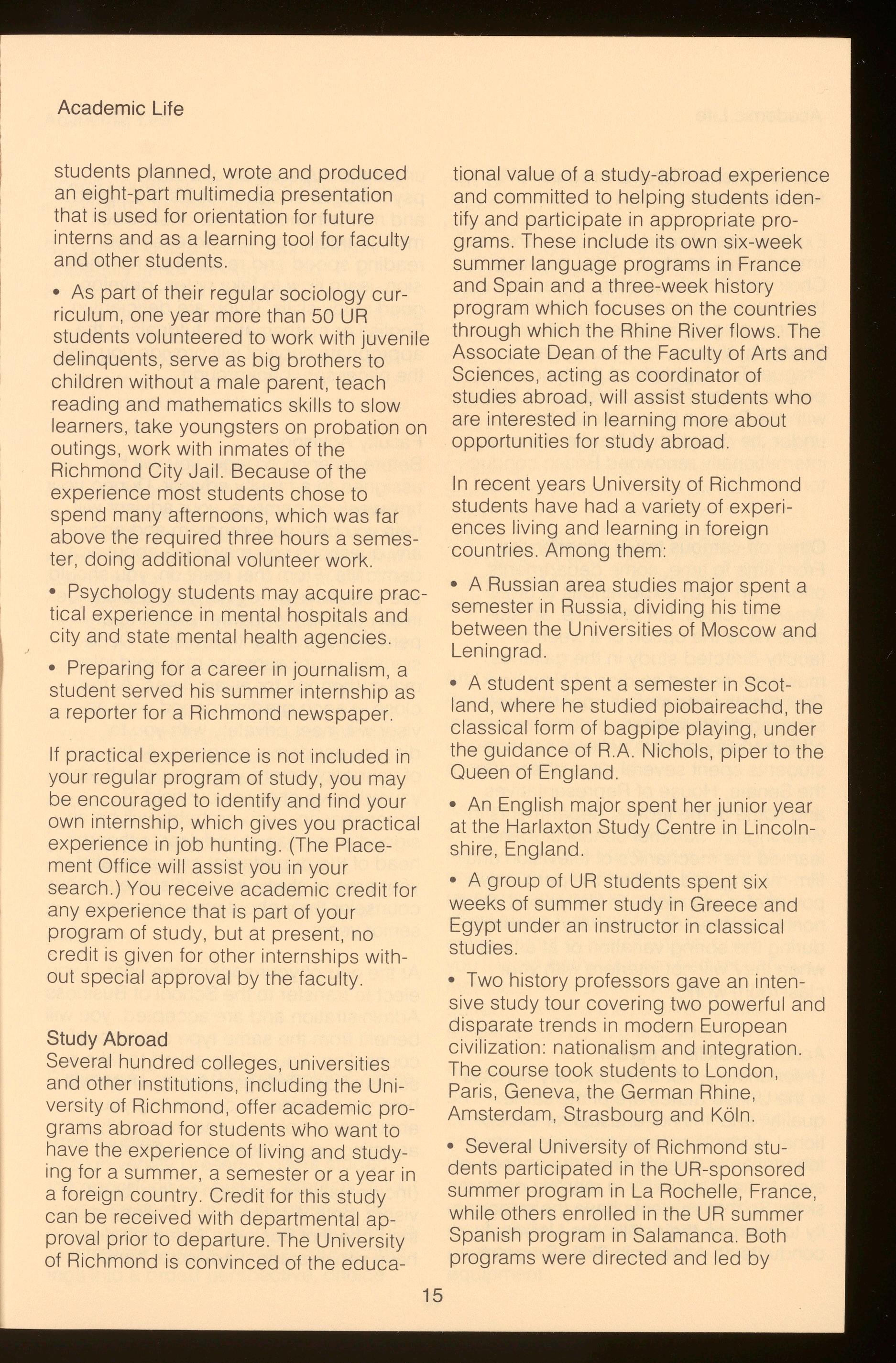
students planned, wrote and produced an eight-part multimedia presentation that is used for orientation for future interns and as a learning tool for faculty and other students.
• As part of their regular sociology curriculum, one year more than 50 UR students volunteered to work with juvenile delinquents, serve as big brothers to children without a male parent, teach reading and mathematics skills to slow learners , take youngsters on probation on outings , work with inmates of the Richmond City Jail. Because of the experience most students chose to spend many afternoons , which was far above the required three hours a semester , doing additional volunteer work.
• Psychology students may acquire practical experience in mental hospitals and city and state mental health agencies.
• Preparing for a career in journalism, a student served his summer internship as a reporter for a Richmond newspaper.
If practical experience is not included in your regular program of study, you may be encouraged to identify and find your own internship , which gives you practical experience in job hunting. (The Placement Office will assist you in your search.) You receive academic credit for any experience that is part of your program of study , but at present, no credit is given for other internships without special approval by the faculty.
Study Abroad
Several hundred colleges , universities and other institutions, including the University of Richmond, offer academic programs abroad for students Who want to have the experience of living and studying for a summer , a semester or a year in a foreign country. Credit for this study can be received with departmental approval prior to departure. The University of Richmond is convinced of the educa-
tional value of a study-abroad experience and committed to helping students identify and participate in appropriate programs. These include its own six-week summer language programs in France and Spain and a three-week history program which focuses on the countries through which the Rhine River flows. The Associate Dean of the Faculty of Arts and Sciences , acting as coordinator of studies abroad, will assist students who are interested in learning more about opportunities for study abroad.
In recent years University of Richmond students have had a variety of experiences living and learning in foreign countries Among them:
• A Russian area studies major spent a semester in Russia, dividing his time between the Universities of Moscow and Leningrad .
• A student spent a semester in Scotland , where he studied piobaireachd, the classical form of bagpipe playing, under the guidance of RA Nichols, piper to the Queen of England.
• An English major spent her junior year at the Harlaxton Study Centre in Lincolnshire, England.
• A group of UR students spent six weeks of summer study in Greece and Egypt under an instructor in classical studies.
• Two history professors gave an intensive study tour covering two powerful and disparate trends in modern European civilization : nationalism and integration. The course took students to London Paris, Geneva, the German Rhine ' Amsterdam, Strasbourg and Kain'.
• Several University of Richmond students participated in the UR-sponsored summer program in La Rochelle, France , while others enrolled in the UR summer Spanish program in Salamanca. Both programs were directed and led by
Academic Life
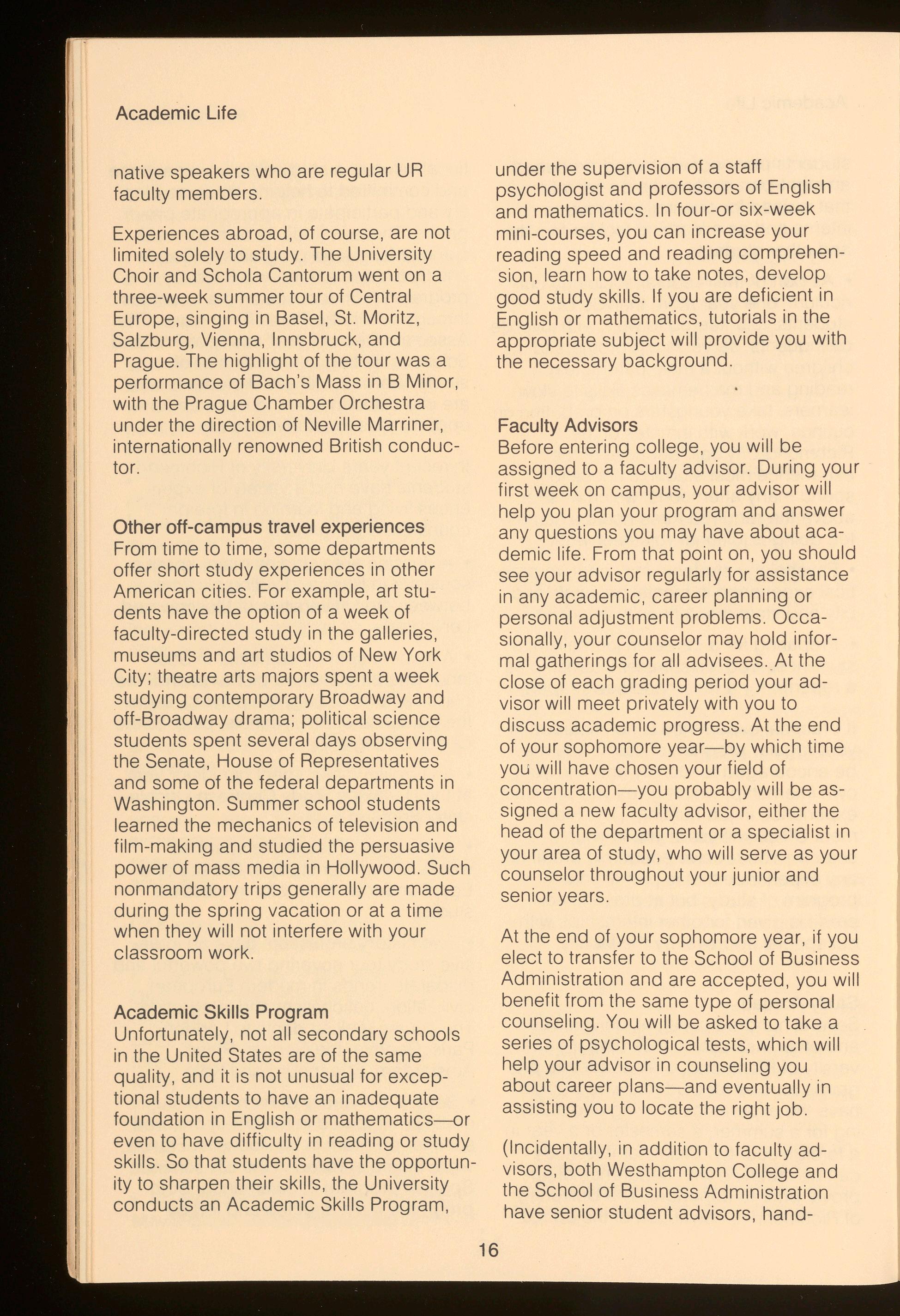
native speakers who are regular UR faculty members.
Experiences abroad, of course, are not limited solely to study. The University Choir and Schola Cantorum went on a three-week summer tour of Central Europe, singing in Basel, St. Moritz, Salzburg, Vienna, Innsbruck, and Prague. The highlight of the tour was a performance of Bach's Mass in B Minor, with the Prague Chamber Orchestra under the direction of Neville Marriner, internationally renowned British conductor.
Other off-campustravel experiences
From time to time, some departments offer short study experiences in other American cities. For example, art students have the option of a week of faculty-directed study in the galleries, museums and art studios of New York City; theatre arts majors spent a week studying contemporary Broadway and off-Broadway drama; political science students spent several days observing the Senate, House of Representatives and some of the federal departments in Washington. Summer school students learned the mechanics of television and film-making and studied the persuasive power of mass media in Hollywood. Such nonmandatory trips generally are made during the spring vacation or at a time when they will not interfere with your classroom work.
Academic Skills Program
Unfortunately, not all secondary schools in the United States are of the same quality, and it is not unusual for exceptional students to have an inadequate foundation in English or mathematics-or even to have difficulty in reading or study skills. So that students have the opportunity to sharpen their skills, the University conducts an Academic Skills Program,
under the supervision of a staff psychologist and professors of English and mathematics. In four-or six-week mini-courses, you can increase your reading speed and reading comprehension, learn how to take notes, develop good study skills. If you are d_efic~entin English or mathematics, tutorials in the appropriate subject will provide you with the necessary background.
FacultyAdvisors
Before entering college, you will be assigned to a faculty advisor. During your first week on campus, your advisor will help you plan your program and answer any questions you may have about academic life. From that point on, you should see your advisor regularly for assistance in any academic, career planning or personal adjustment problems. Occasionally, your counselor may hold informal gatherings for all advisees. At the close of each grading period your advisor will meet privately with you to discuss academic progress. At the end of your sophomore year-by which time you will have chosen your field of concentration-you probably will be assigned a new faculty advisor, either the head of the department or a specialist in your area of study, who will serve as your counselor throughout your junior and senior years.
At the end of your sophomore year, if you elect to transfer to the School of Business Administration and are accepted, you will benefit from the same type of personal counseling. You will be asked to take a series of psychological tests, which will help your advisor in counseling you about career plans-and eventually in assisting you to locate the right job.
(Incidentally, in addition to faculty advisors, both Westhampton College and the School of Business Administration have senior student advisors, hand-
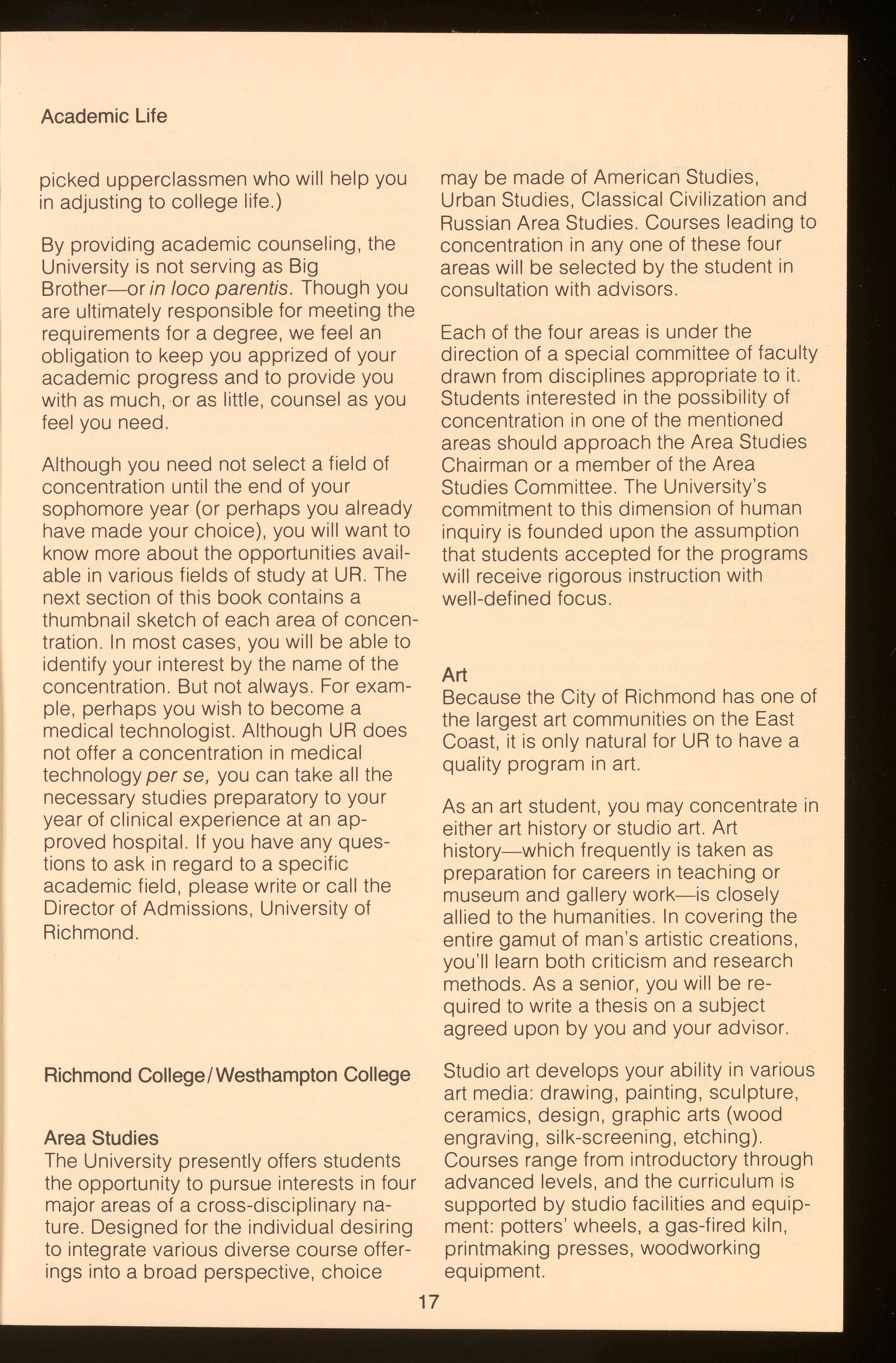
p icked upperclassmen who will help you in adjusting to college life )
By providing academic counseling , the University is not serving as Big Brother - or in loco parentis . Though you are ultimately responsible for meeting the requirements for a degree , we feel an obligation to keep you apprized of your academic progress and to provide you with as much , or as little , counsel as you feel you need
Although you need not select a field of concentration until the end of your sophomore year (or perhaps you already have made your choice), you will want to know more about the opportunities available in various f ields of study at UR. The ne xt section of this book contains a thumbna il sketch of each area of concentration In most cases , you will be able to identify your interest by the name of the c oncentration But not always . For e xample , perhaps you wish to become a medical technologist. Although UR does not offer a concentration in medical technology per se, you can take all the necessary studies preparatory to your year of clinical e x perience at an approved hospital. If you have any questions to ask in regard to a specific academic field , please write or call the Director of Admissions , University of Richmond
RichmondCollege/WesthamptonCollege
Area Studies
The University presently offers students the opportunity to pursue interests in four major areas of a cross-disciplinary nature. Designed for the individual desiring to integrate various diverse course offerings into a broad perspective , choice
may be made of American Studies , Urban Studies, Classical Civilization and Russian Area Studies. Courses leading to concentration in any one of these four areas will be selected by the student in consultation with advisors.
Each of the four areas is under the direction of a special comm ittee of faculty drawn from discipl ines appropriate to it. Students interested in the poss ibility of concentration in one of the mentioned areas should approach the Area Studies Chairman or a member of the Area Studies Committee The University ' s commitment to this dimension of human inquiry is founded upon the assumption that students accepted for the programs w ill rece ive rigorous instruction with well-defined focus
Art
Because the City of Richmond has one of the largest art communities on the East Coast, it is only natural for UR to have a quality program in art.
As an art student , you may concentrate in either art history or studio art. Art history-which frequently is taken as preparation for careers in teach i ng or museum and gallery work-is closely allied to the humanities In covering the entire gamut of man's artistic creations, you ' ll learn both criticism and research methods . As a senior, you will be required to write a thesis on a subject agreed upon by you and your advisor
Studio art develops your ability in various art media: drawing , pa inting, sculpture , ceramics, design , graphic arts (wood engraving , silk-screening , etching) Courses range from introductory through advanced levels , and the curriculum is supported by studio facilities and equipment: potters' wheels, a gas-fired kiln, printmaking presses, woodworking equipment.
Academic Life
You will work within the creative surroundings of the Modlin Fine Arts Center, where studios and classrooms are located. Besides benefiting from the Center's Marsh Gallery, you'll have the advantage of proximity to the Virginia Museum, which houses the South's largest art library. In addition , there are many fine museums located within easy driving distance, in Washington , D.C. and Norfolk, Virginia.
For practical experience in art, many art majors work on student publications.
Biology
Because of its fine balance between animal and plant studies, the UR Department of Biology can offer excellent preparation for almost any career in zoology or botany. Year after year, the success of its graduates in winning admission to the better medical, dental and graduate schools attests to the soundness of the program.
As a biology major , you will study only under qualified professors. (From the assistant professor level up , all faculty members hold doctorates.) Classes, particularly the laboratory sections , are kept as small as possible to assure you of personal help.
Excellent facilities in the new $8-million Science Center, where there are more than 50 teaching and research laboratories , greatly contribute to the learning environment. These are supported by preparation and instrument rooms , animal rooms, radionuclide rooms , an electron microscope and a greenhouse.
Solid emphasis is placed on student research. You will be encouraged to set up your own research project, or you can
work directly with a professor in projects that may range from "The investigation of Storms on Westhampton Lake" to the physiological aspects of sodium regulation in blue crabs. If your study involves the expenditure of money, you may apply for an undergraduate research grant to underwrite the cost.
Because of the interdisciplinary nature of modern biological research , you will be required to take courses in chemistry and mathematics, and you will be encouraged to take one or more physics courses. During your senior year you will participate in a special seminar that meets once a week. If you notify your faculty advisor of your intention to go on to medical, dental, veterinary or any other professional school, he or she will help to assure that your program includes all the courses required for admission.
UR's chapter of Beta Beta Beta , the national honor society in biology, provides an option for out-of-the-classroom activity.
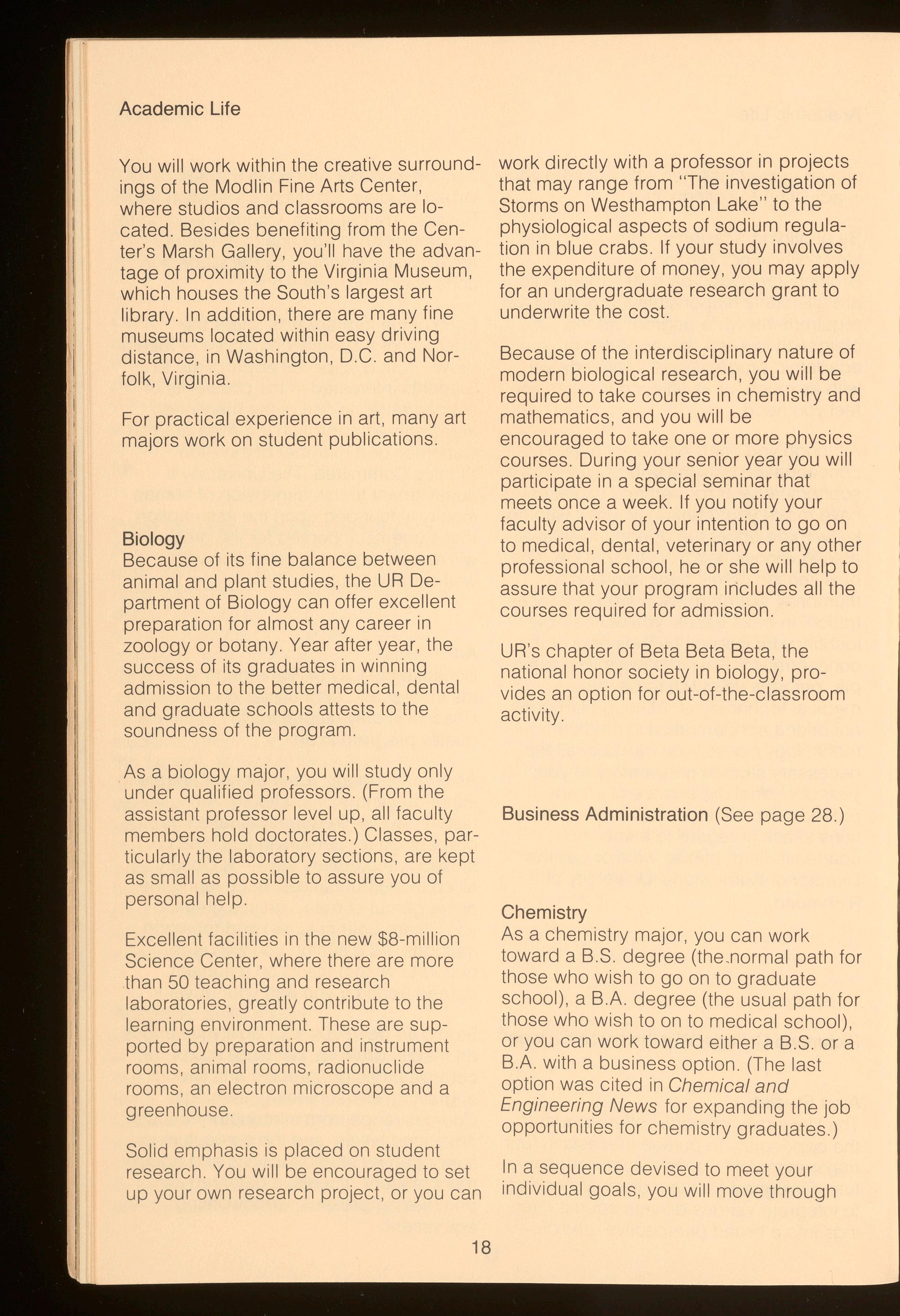
BusinessAdministration(See page 28.)
Chemistry
As a chemistry major, you can work toward a B.S. degree (the .normal path for those who wish to go on to graduate school), a B.A. degree (the usual path for those who wish to on to medical school), or you can work toward either a B.S. or a B.A. with a business option (The last option was cited in Chemical and Engineering News for expanding the job opportunities for chemistry graduates.)
In a sequence devised to meet your 1nd1v1dualgoals, you will move through

Academic Life
the various aspects of organic, physical, analytical, bio and inorganic chemistry. Naturally, your career goals will play an important part in your choice of electives. In your fourth year you will participate in a senior seminar.
All chemistry classes and laboratories are taught in UR's new Science Center, a well-equipped academic installation. Major instruments include a nuclear magnetic resonance spectrometer, a mass spectrometer , UV-visible spectrophotometers, infrared spectrophotometers, a spectrofluorometer, atomic absorption spectrophotometers, gas liquid chromatographs and computer terminals. Although UR offers a master's degree in chemistry, equipment is not reserved for the use of graduate students or professors. Undergraduate students routinely use these instruments.
As in other sciences, chemistry students are encouraged to engage in independent research, and the new Science Center provides space reserved just for this endeavor. Funds to support these research projects are available. The chemistry program is accredited by the American Chemical Society, and the University has a chapter of Gamma Sigma Epsilon, the national chemistry honor society , and a Student Affiliate Chapter of the American Chemical Society. Because Richmond is a major chemical center, you will have an opportunity to gain a firsthand understanding of industrial chemistry.
Classical Studies
Study of the classics not only involves a study of the language and literature of ancient Greece and Rome, but includes the study of art, archeology, history, philosophy, religion-the total culture of the ancient world.
If you elect to major in classical studies, you will be required to have at least 24 semester hours of Greek or Latin above the intermediate level. In your senior year, you will either write a thesis or take a comprehensive examination.
In addition to courses in Greek and Latin, classical studies offers a number of courses taught in English-courses treating Mediterranean art, archeology, history, literature and mythology. Courses in other disciplines-art history, philosophy, religion, literature, history-supplement and complement the offerings in classical studies.
In your junior year, you may elect to take advantage of UR's study abroad option to acquire a firsthand knowledge of the art and archeology of the ancient world
Campus activities add to your classroom studies. Both Oedipus Rex and Lysistrata have been staged by the University Players, and Eta Sigma Phi, the classics honor society, welcomes qualified students.
Economics
For some reason , the study of economics has a dry-as-dust reputation. In reality, economics is one of the most exciting of all studies because it is totally concerned with you and me , our future and our options. At the moment, the entire world is concerned with the economics of oil-how it may change the balance of power , what substitute form of energy can be found for it, whether you will have to pay $1 50 for a gallon of gas in just another year or two.
Because economics is concerned with the utilization of our resources-which range from land to manpower - and because man is just awakening to how limited our resources are , this career field
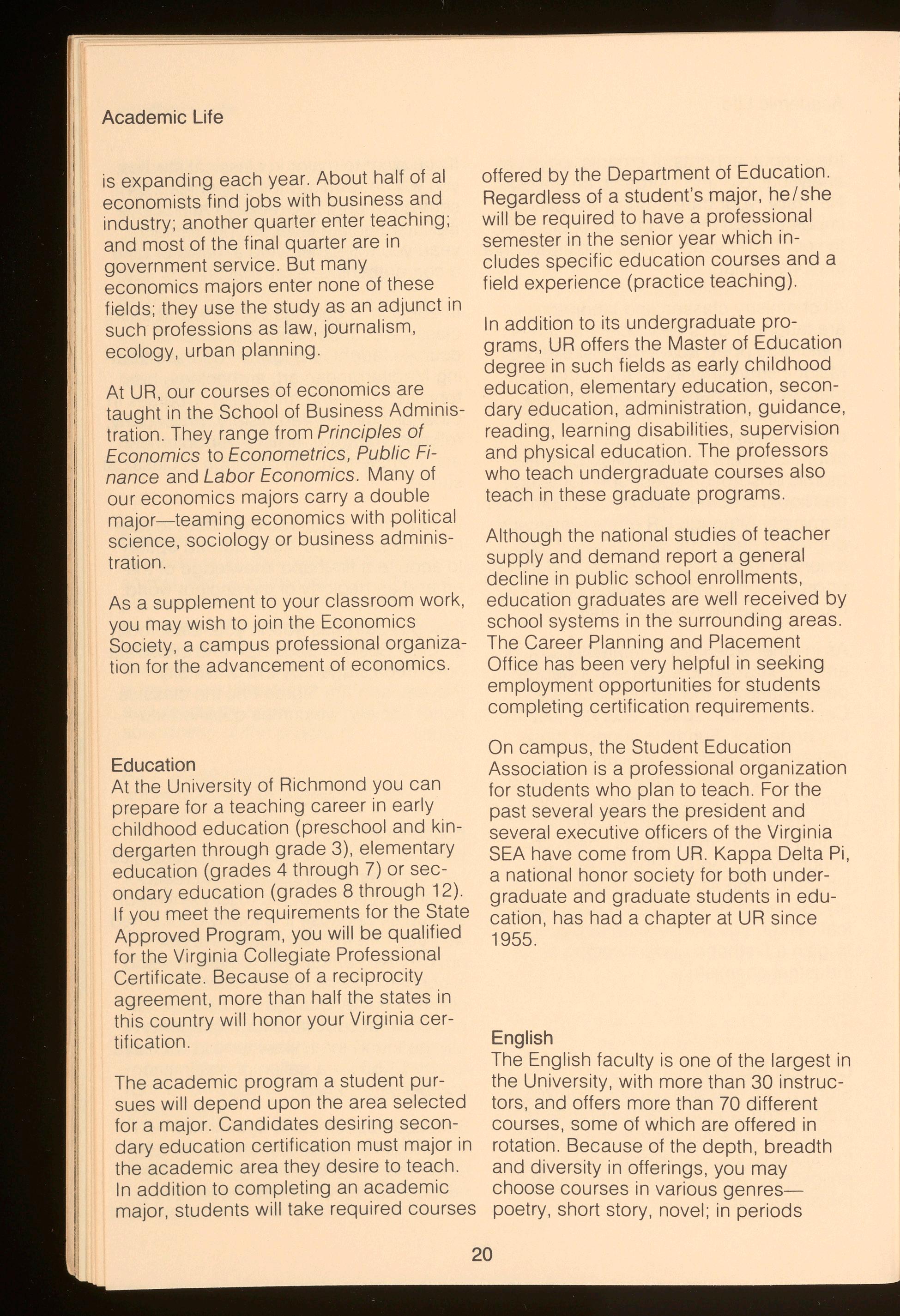
is expanding each year. About half of al economists find jobs with business and industry; another quarter enter teaching; and most of the final quarter are in government service. But many economics majors enter none of these fields; they use the study as an adjunct in such professions as law, journalism, ecology, urban planning.
At UR, our courses of economics are taught in the School of Business Administration. They range from Principles of Economics to Econometrics, Public Finance and Labor Economics. Many of our economics majors carry a double major-teaming economics with political science, sociology or business administration.
As a supplement to your classroom work, you may wish to join the Economics Society, a campus professional organization for the advancement of economics.
Education
At the University of Richmond you can prepare for a teaching career in early childhood education (preschool and kindergarten through grade 3), elementary education (grades 4 through 7) or secondary education (grades 8 through 12).
If you meet the requirements for the State Approved Program, you will be qualified for the Virginia Collegiate Professional Certificate. Because of a reciprocity agreement, more than half the states in this country will honor your Virginia certification.
The academic program a student pursues will depend upon the area selected for a major. Candidates desiring secondary education certification must major in the academic area they desire to teach. In addition to completing an academic major, students will take required courses
offered by the Department of Education. Regardless of a student's major, he/ she will be required to have a professional semester in the senior year which includes specific education courses and a field experience (practice teaching).
In addition to its undergraduate programs, UR offers the Master of Education degree in such fields as early childhood education, elementary education, secondary education, administration, guidance, reading, learning disabilities, supervision and physical education. The professors who teach undergraduate courses also teach in these graduate programs.
Although the national studies of teacher supply and demand report a general decline in public school enrollments, education graduates are well received by school systems in the surrounding areas. The Career Planning and Placement Office has been very helpful in seeking employment opportunities for students completing certification requirements.
On campus, the Student Education Association is a professional organization for students who plan to teach. For the past several years the president and several executive officers of the Virginia SEA have come from UR. Kappa Delta Pi, a national honor society for both undergraduate and graduate students in education, has had a chapter at UR since 1955.
English
The English faculty is one of the largest in the University, with more than 30 instructors, and offers more than 70 different courses, some of which are offered in rotation. Because of the depth, breadth and diversity in offerings, you may choose courses in various genrespoetry, short story, novel; in periods
Academic Life

ranging from the Middle Ages to the modern world ; in language; in writing; and in criticism. Courses include British and American literature and some material in translation.
The basic program in English is a sound but exciting introduction to the study of important and interesting pieces of literature , including the examination of critical approaches to literature and the cultivation of critical perceptions . You may elect work in creative writing and perhaps even find this training remunerative. (One student's short story recently won a $1000 graduate scholarship from the National Society of Arts and Letters ) You may elect to go abroad for a semester or a year to study. There are opportunities for independent study and for honors work Certain seminars are limited in size to assure personal attention, and no class is so large that the student's individual voice is lost. The study of language, writing and literature may be pursued as an avocation, but one of the department's basic aims is to provide the groundwork for a vocation Opportunities for research may develop interests in professional scholarship .
Literature is a living art , and the University of Richmond encourages this perception of literature. Frequently the University brings to campus important novelists , playwrights, poets, critics and scholars There is also a writer-inresidence who teaches creative writing . An active journalism program draws upon the e x perience of practicing journalists in the community
You will have various opportunities to participate in campus publications ; the literary magazine , the newspaper and the yearbook - and also the radio stationencourage student work The English Club, Areopagus (the honorary society), the Sherwood Anderson Society and the Douglas Southall Freeman Literary and
Debate Society create a climate for both learning and social activities.
Health and Physical Education
In health and physical education, your major concentration can take one of two directions : (1) secondary and elementary teaching / coaching certification in health education or physical education ; (2) nonteaching, which leads to careers in allied fields
The health and physical education facilities for men and women are located in Robins Center, Millhiser Gymnasium and Keller Hall. Departmental faculty offices are in Robins Center and Keller Hall.
UR's health and physical education facilities are comparable to the finest in the country . Adjacent to Robins Center are superb track and field facilities (which were chosen for the AAU National Decathalon Championships) and a new baseball field. Playing fields for field hockey , lacrosse, hardyball , football , rugby , soccer and softball are near Keller Hall.
The diversity of professional courses is excellent , with specialized studies in anatomy, physiology of exercise , kinesiology, adapted physical education , health, choreography and aquatics (the last of which includes skin and scuba diving). These offerings are further strengthened by courses in organization and administration , motor-learning methods , and tests and measurement s.
The University supports extensi v e intercollegiate and intramural sports programs , which are supplemented by sports-oriented student clubs and organizations .
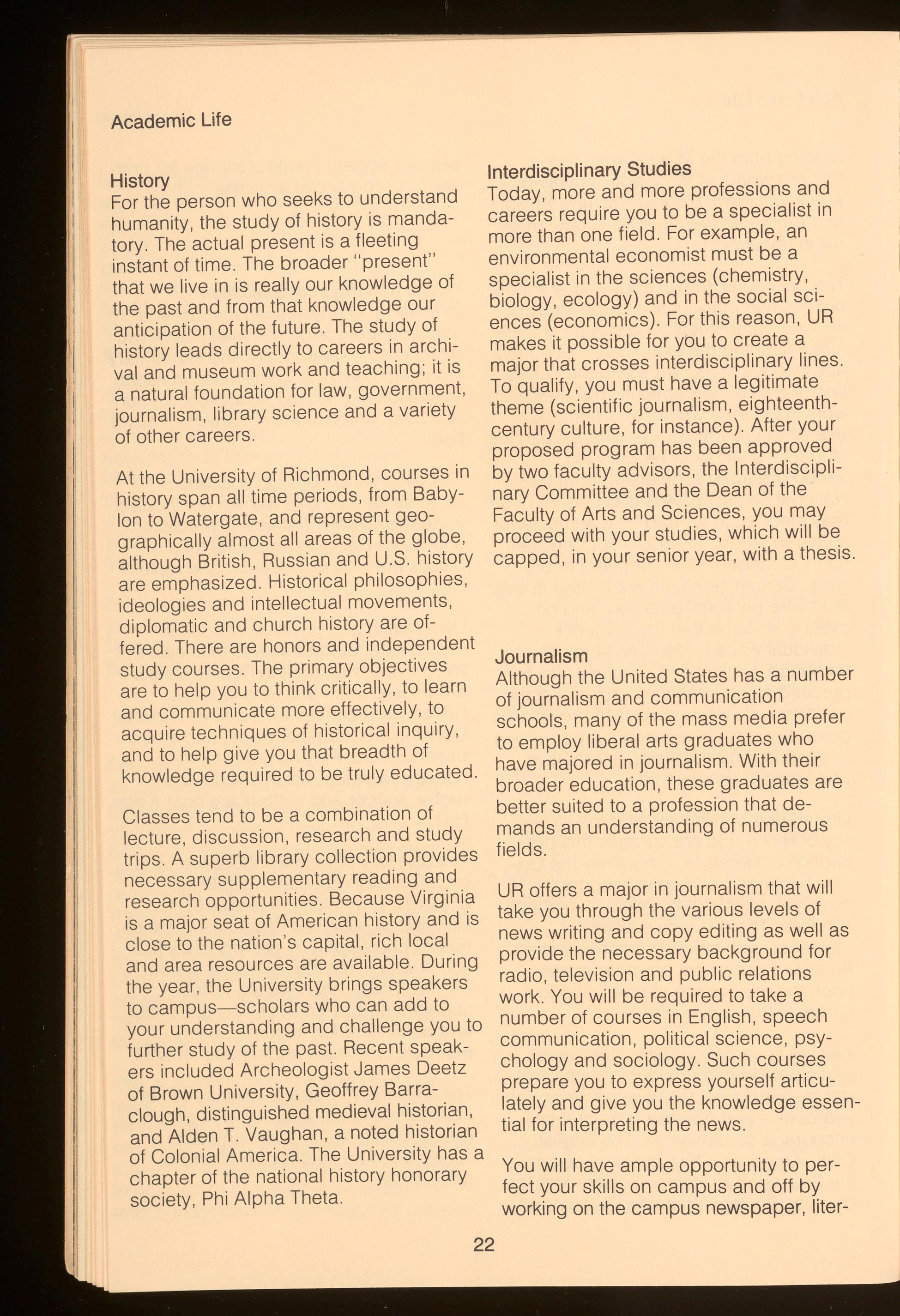
AcademicLife
History
For the person who seeks to understand humanity, the study of history is mandatory. The actual present is a fleeting instant of time. The broader "present" that we live in is really our knowledge of the past and from that knowledge our anticipation of the future. The study of history leads directly to careers in archival and museum work and teaching; it is a natural foundation for law, government, journalism, library science and a variety of other careers.
At the University of Richmond, courses in history span all time periods, from Babylon to Watergate, and represent geographically almost all areas of the globe, although British, Russian and U.S history are emphasized. Historical philosophies, ideologies and intellectual movements, diplomatic and church history are offered. There are honors and independent study courses. The primary objectives are to help you to think critically, to learn and communicate more effectively, to acquire techniques of historical inquiry, and to help give you that breadth of knowledge required to be truly educated.
Classes tend to be a combination of lecture, discussion, research and study trips. A superb library collection provides necessary supplementary reading and research opportunities. Because Virginia is a major seat of American history and is close to the nation's capital, rich local and area resources are available. During the year, the University brings speakers to campus-scholars who can add to your understanding and challenge you to further study of the past. Recent speakers included Archeologist James Deetz of Brown University, Geoffrey Barraclough, distinguished medieval historian, and Alden T. Vaughan, a noted historian of Colonial America. The University has a chapter of the national history honorary society, Phi Alpha Theta.
InterdisciplinaryStudies
Today, more and more professions and careers require you to be a specialist in more than one field. For example, an environmental economist must be a specialist in the sciences (chemistry, biology, ecology) and in the social sciences (economics). For this reason, UR makes it possible for you to create a major that crosses interdisciplinary lines. To qualify, you must have a legitimate theme (scientific journalism, eighteenthcentury culture, for instance). After your proposed program has been approved by two faculty advisors, the Interdisciplinary Committee and the Dean of the Faculty of Arts and Sciences, you may proceed with your studies, which will be capped, in your senior year, with a thesis.
Journalism
Although the United States has a number of journalism and communication schools, many of the mass media prefer to employ liberal arts graduates who have majored in journalism. With their broader education, these graduates are better suited to a profession that demands an understanding of numerous fields .
UR offers a major in journalism that will take you through the various levels of news writing and copy editing as well as provide the necessary background for radio, television and public relations work. You will be required to take a number of courses in English, speech communication, political science, psychology and sociology. Such courses prepare you to express yourself articulately and give you the knowledge essential for interpreting the news .
You will have ample opportunity to perfect your skills on campus and off by working on the campus newspaper, liter-
Academic Life
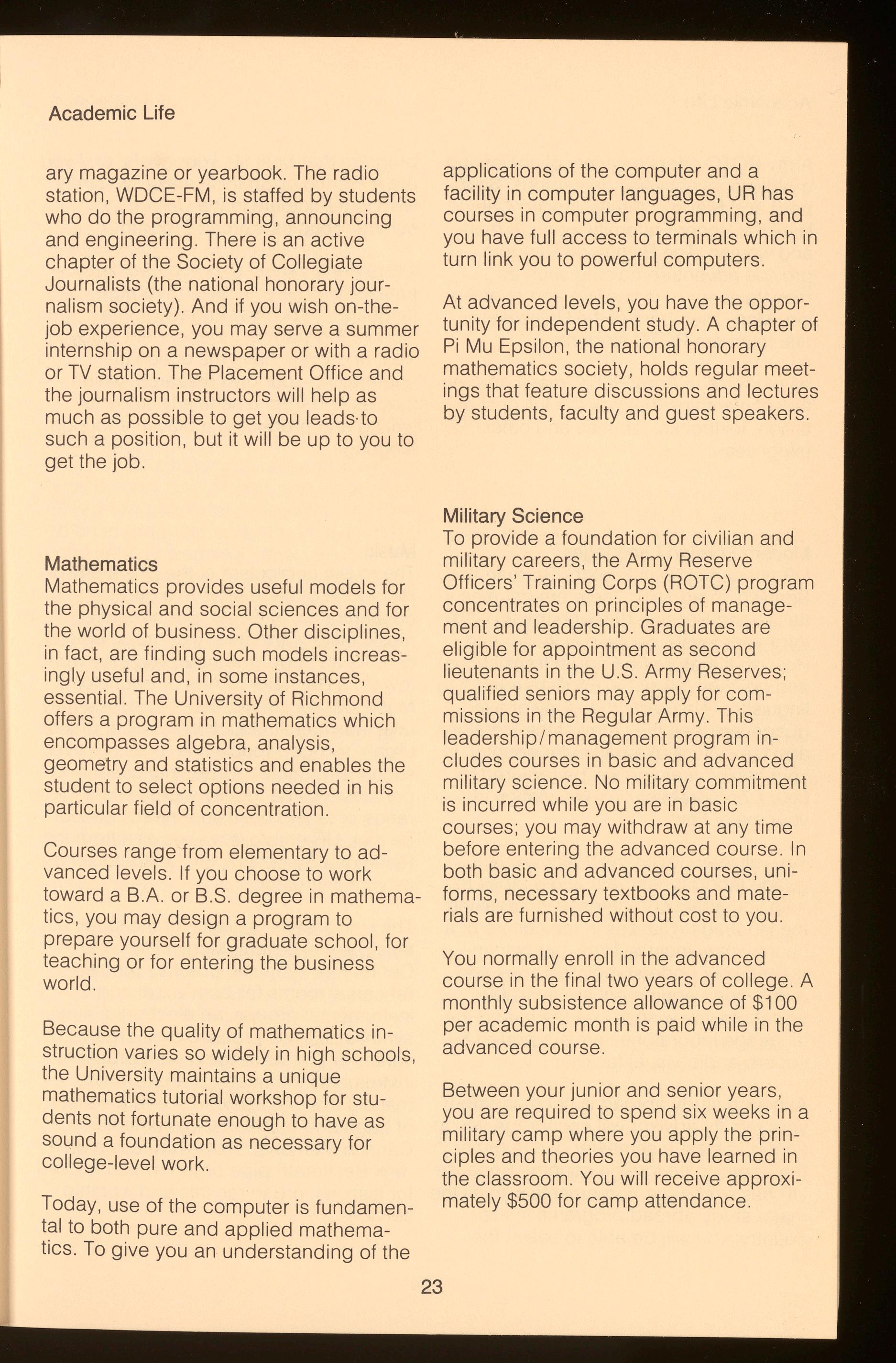
ary magazine or yearbook The radio station, WDCE-FM , is staffed by students who do the programming, announcing and engineering. There is an active chapter of the Society of Collegiate Journalists (the national honorary journalism society). And if you wish on-thejob experience , you may serve a summer internship on a newspaper or with a radio or TV station. The Placement Office and the journalism instructors will help as much as possible to get you leads -to such a position, but it will be up to you to get the job
Mathematics
Mathematics provides useful models for the physical and social sciences and for the world of business. Other disciplines, in fact, are finding such models increasingly useful and, in some instances , essential. The University of Richmond offers a program in mathematics which encompasses algebra, analysis , geometry and statistics and enables the student to select options needed in his particular field of concentration.
Cou rses range from elementary to advanced levels If you choose to work toward a B.A. or B.S. degree in mathematics , you may design a program to prepare yourself for graduate school, for teaching or for entering the business world.
Because the quality of mathematics instruction varies so widely in high schools , the University maintains a unique mathematics tutorial workshop for students not fortunate enough to have as sound a foundation as necessary for college-level work
Today, use of the computer is fundamental to both pure and applied mathematics To give you an understanding of the
applications of the computer and a facility in computer languages, UR has courses in computer programming, and you have full access to terminals which in turn link you to powerful computers.
At advanced levels , you have the opportunity for independent study. A chapter of Pi Mu Epsilon , the national honorary mathematics society, holds regular meetings that feature discussions and lectures by students, faculty and guest speakers.
MilitaryScience
To provide a foundation for civilian and military careers, the Army Reserve Officers ' Training Corps (ROTC) program concentrates on principles of management and leadership. Graduates are eligible for appointment as second lieutenants in the U.S Army Reserves ; qualified seniors may apply for commissions in the Regular Army. This leadership / management program includes courses in basic and advanced military science. No military commitment is incurred while you are in basic courses ; you may withdraw at any time before entering the advanced course. In both basic and advanced courses , uniforms, necessary textbooks and materials are furnished without cost to you
You normally enroll in the advanced course in the final two years of college. A monthly subsistence allowance of $100 per academic month is paid while in the advanced course .
Between your junior and senior years , you are required to spend six weeks in a military camp where you apply the principles and theories you have learned in the classroom. You will receive approximately $500 for camp attendance.
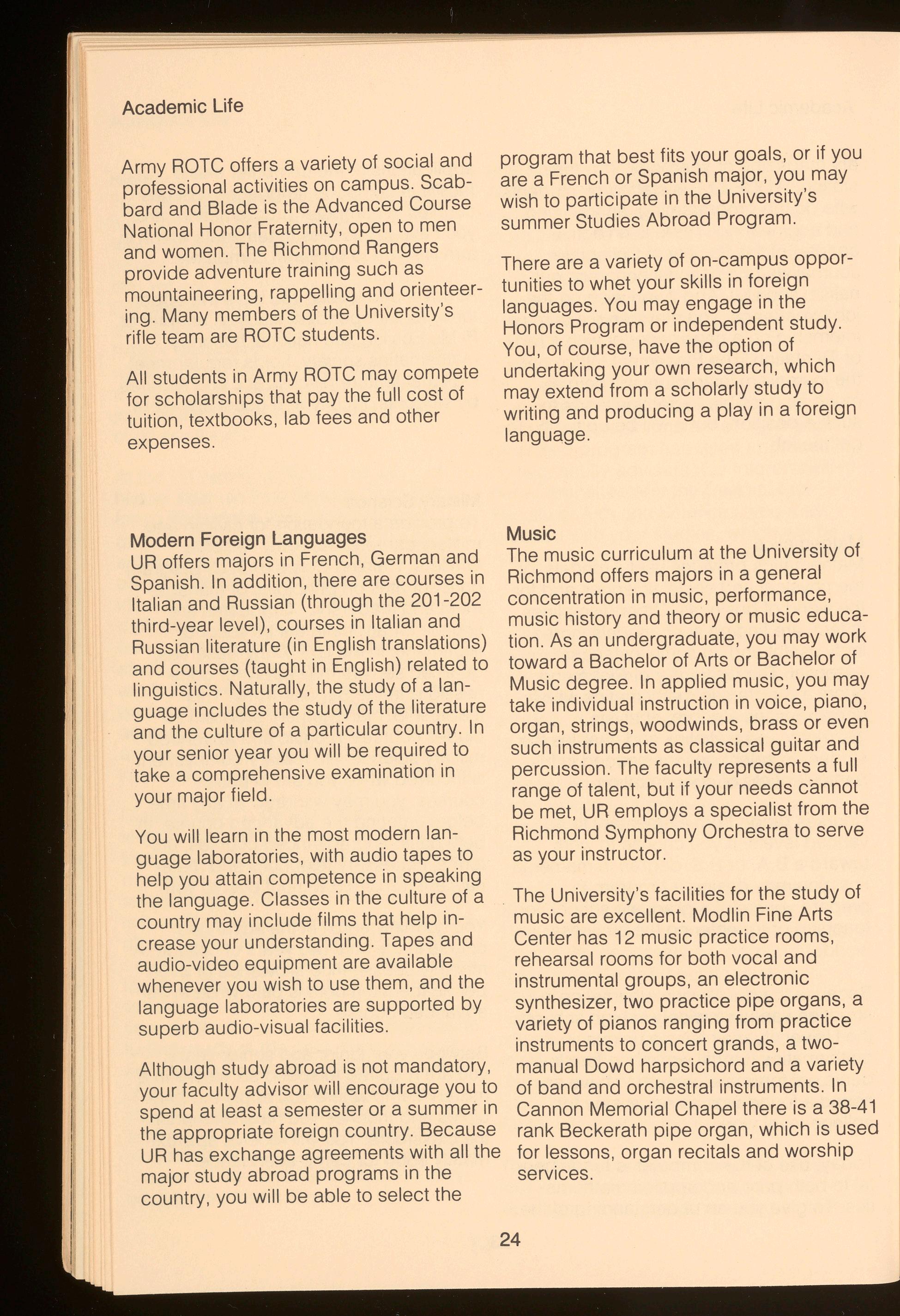
Army ROTC offers a variety of social and professional activities on campus. Scabbard and Blade is the Advanced Course National Honor Fraternity , open to men and women. The Richmond Rangers provide adventure training such as mountaineering, rappelling and orienteering Many members of the University's rifle team are ROTC students
All students in Army ROTC may compete for scholarships that pay the fu ll cost of tuition , textbooks , lab fees and other expenses .
ModernForeignLanguages
UR offers majors in French, German and Spanish . In addition , there are courses in Italian and Russian (through the 201-202 third-year level) , courses in Italian and Russian literature (in English translations) and courses (taught in English) related to linguistics. Naturally , the study of a language includes the study of the literature and the culture of a particular country . In your senior year you will be required to take a comprehensive examination in your major field
You will learn in the most modern language laboratories , with audio tapes to help you attain competence in speaking the language Classes in the culture of a country may include films that help increase your understanding Tapes and audio-video equipment are available whenever you wish to use them , and the language laboratories are supported by superb audio-visual facilities .
Although study abroad is not mandatory , your faculty advisor will encourage you to spend at least a semester or a summer in the appropriate foreign country Because UR has exchange agreements with all the major study abroad programs in the country, you will be able to select the
program that best fits your goals , or if you are a French or Spanish major, you may wish to participate in the University's summer Studies Abroad Program.
There are a variety of on-campus opportunities to whet your skills in foreign languages You may engage in the Honors Program or independent study . You, of course, have the option of undertaking your own research, which may extend from a scholarly study to writing and producing a play in a foreign language .
Music
The music curriculum at the University of Richmond offers majors in a general concentration in music, performance, music history and theory or music education . As an undergraduate, you may work toward a Bachelor of Arts or Bachelor of Music degree. In applied music, you may take individual instruction in voice, piano, organ , strings, woodwinds, brass or even such instruments as classical guitar and percussion The faculty represents a full range of talent, but if your needs cannot be met, UR employs a specialist from the Richmond Symphony Orchestra to serve as your instructor .
The University 's facilities for the study of music are excellent. Modlin Fine Arts Center has 12 music practice rooms, rehearsal rooms for both vocal and instrumental groups, an electronic synthesizer, two practice pipe organs, a variety of pianos ranging from practice instruments to concert grands, a twomanual Dowd harpsichord and a variety of band and orchestral instruments In Cannon Memorial Chapel there is a 38-41 rank Beckerath pipe organ, which is used for lessons , organ recitals and worship services
If you plan to major in music, you must audition in your major applied area, and during your years at UR you will be required to participate in at least one of the University's ensembles: the orchestra, the band, the choir or the Schola Cantorum . The University is a member of the National Association of Schools of Music

Philosophy
Philosophy is the study of the assumptions behind man's ideas and institutions. Only a few philosophy majors intend to go on to graduate school to prepare for college-level teaching . Most use the study as an appropriate undergraduate background for law , government, psychology and other professions or careers that demand critical and analytic thought and decision making
Philosophical study contributes significantly to your self-understanding, assisting you in synthesizing a clear conception of yourself and your world The four members of the department divide many specialties among them (from philosophy of law to symbolic logic) , but all share a commitment to the ancient maxim "know thyself "
At UR, philosophy courses cover much of the range of man 's thought from classical times to the present , but emphasize genuinely contemporary analysis . Advanced students may take an honors tutorial (which involves directed research) or independent study Each year, the University brings one or more distinguished philosophers to campus, where you and other students have the opportun ity to confer with them .
Most philosophy students take a dual major. Common groupings combine philosophy with psychology , political science, history, religion or literature Whatever your professional goals, however , philosophical analysis and reflection can assist in sharpening your conceptual skills and your insight.
Physics
From the nuclei of atoms to the birth of a star, physics at the University of Richmond opens the broadest vistas of the physical world. Both B S and B.A. programs are offered, and courses recognize the importance of such phenomena as the energy shortage .
As a physics major , you will move through a sequence of courses culminating in theoret ical physics, quantum mechanics, nuclear physics or solid state . If you are qualified to do individual research, you and your faculty advisor can determine a project that is in keeping with your goals and interests, and you will have your own research area in which to work
The curriculum is supported by superb facilities and equipment in the new Science Center ; computer terminals , telescopes , lasers, radionuclide instrumentation, X-ray and low-temperature equipment typify the up-to-date analytical and experimental tools available Your professors are active in research and publication . (Recent examples appear in Nuclear Physics, Physical Review and Applied Optics. ) The department encourages research by students and professors, in keeping with the University's philosophy that research of publishable quality contributes directly to creative teaching and learning .
Academic Life
Increasingly, physicists are choosing careers which combine physics with related sciences such as astrophysics, biophysics, computer science, geophysics, material sciences, medical physics , and physical oceanography
The flexible BA/ BS degree structure lends itself readily to preparation for a variety of such interdisciplinary pro-
with students . Student government provides an opportunity for you to practice politics, and a variety of campus organizations-Young Democrats, Young Republicans, Pi Sigma Alpha (the political science national honorary society)deepen your understanding of both the theoretical and the practical sides of grams.
PoliticalScience
In one respect, Watergate provided a service to the American people : it awakened them to the need to know more about government and politics-at all levels. At the University of Richmond, the study of political science provides an understanding of all aspects of government and political behavior. For example , you will learn the philosophies that underlie governments and the problems that those philosophies create. You will study the practice of politics at each level of government , and through independent study , you will have the opportunity to research an area of politics that particularly interests you politics.
Psychology
Few academic disciplines are more enticing and more useful than psychology . (In a recent survey , a random group of college graduates said that psychology was one of the three academic studies most relevant to their everyday work regardless of their careers.) But if you plan to major in psychology , be forewarned that there are relatively few professional openings for the person who has only a bachelor 's degree. Most of the psychology-related careers and professions demand an advanced degree
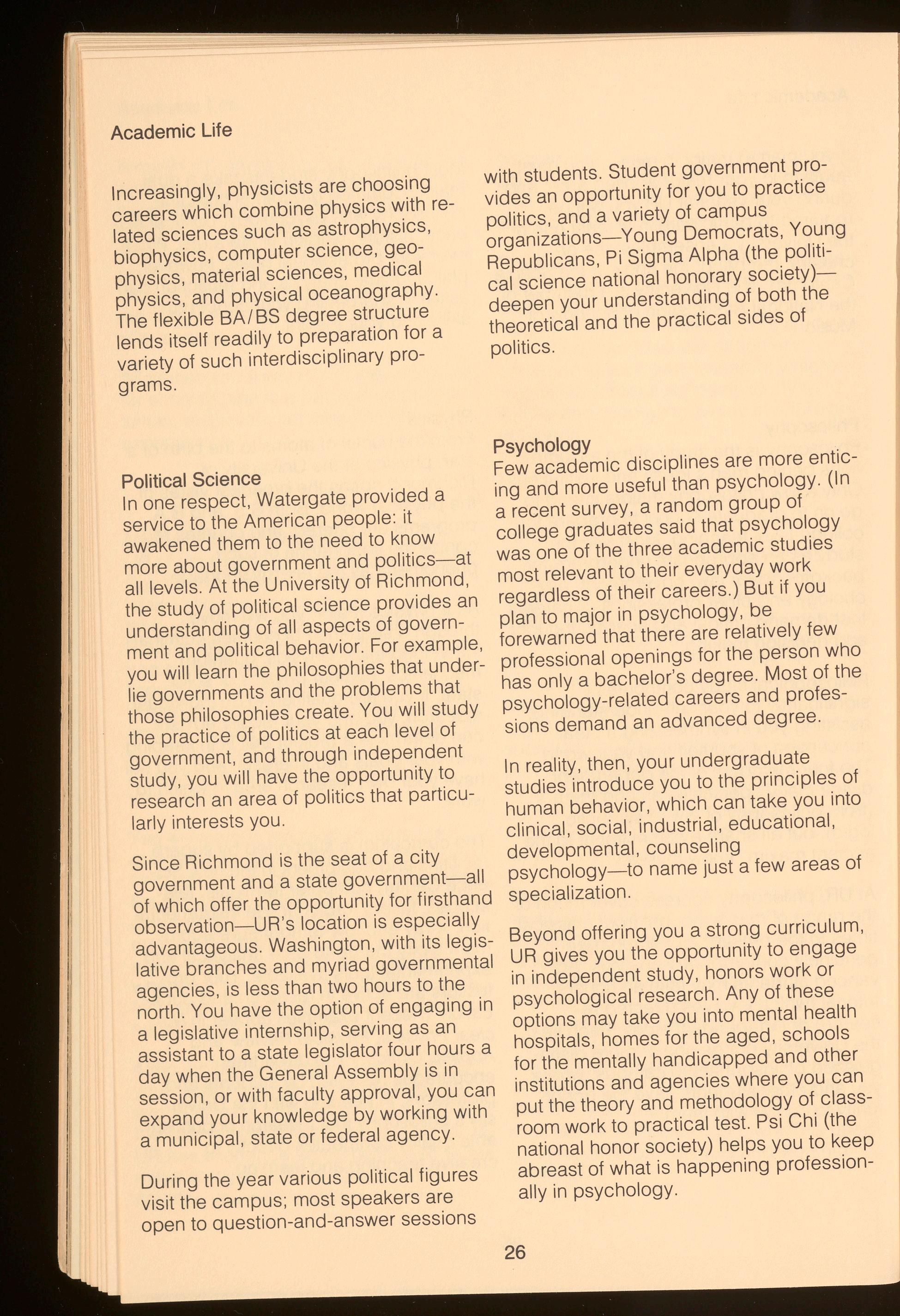
Since Richmond is the seat of a city government and a state government-all of which offer the opportunity for firsthand observation-UR 's location is especially advantageous. Washington , with its legislative branches and myriad governmental agencies , is less than two hours to the north You have the option of engaging in a legislative internship , serving as an assistant to a state legislator four hours a day when the General Assembly is in session , or with faculty approval, you can expand your knowledge by working with a municipal, state or federal agency .
In reality , then , your undergraduate studies introduce you to the principles of human behavior, which can take you into clinical, social, industrial , educational , developmental , counseling psychology-to name just a few areas of specialization
Beyond offering you a strong curriculum, UR gives you the opportunity to engage in independent study , honors work or psychological research . Any of these options may take you into mental health hospitals, homes for the aged, schools for the mentally handicapped and other institutions and agencies where you can put the theory and methodology of classroom work to practical test. Psi Chi (the national honor society) helps you to keep abreast of what is happening professionally in psychology. During the year various political figures visit the campus; most speakers are open to question-and -answer sessions
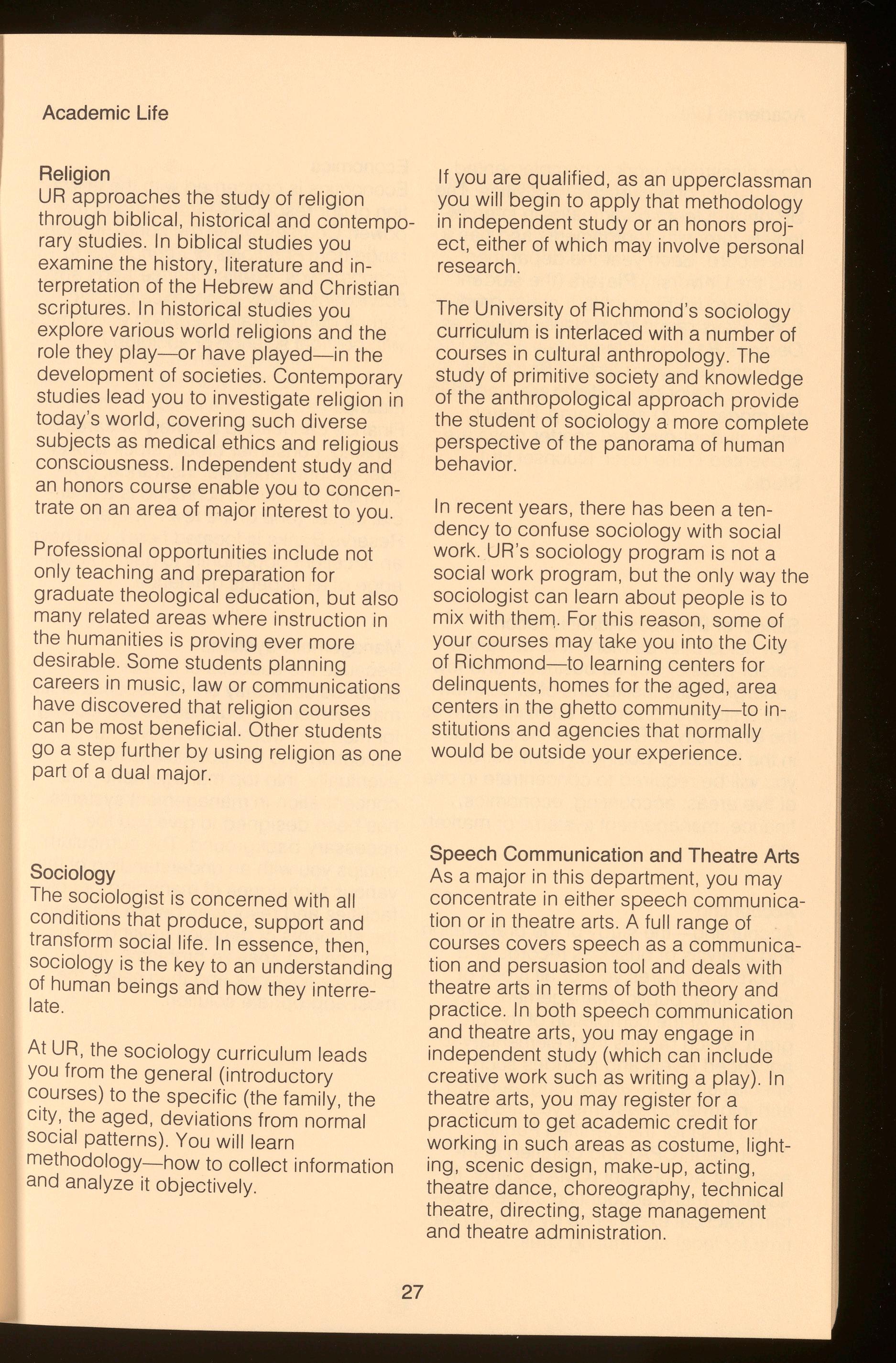
AcademicLife
Religion
UR approaches the study of religion through biblical, historical and contemporary studies. In biblical studies you examine the history, literature and interpretation of the Hebrew and Christian scriptures. In historical studies you explore various world religions and the role they play-or have played-in the development of societies. Contemporary studies lead you to investigate religion in today's world, covering such diverse subjects as medical ethics and religious consciousness . Independent study and an honors course enable you to concentrate on an area of major interest to you.
Professional opportunities include not only teaching and preparation for graduate theological education, but also many related areas where instruction in the humanities is proving ever more desirable Some students planning careers in music, law or communications have discovered that religion courses can be most beneficial. Other students go a step further by using religion as one part of a dual major.
Sociology
The sociologist is concerned with all conditions that produce , support and transform social life. In essence then sociology is the key to an under~tanding of human beings and how they interre- late.
At UR, the sociology curriculum leads you from the general (introductory courses) to the specific (the family, the city, the aged, deviations from normal social patterns). You will learn methodology-how to collect information and analyze it objectively
If you are qualified, as an upperclassman you will begin to apply that methodology in independent study or an honors project, either of which may involve personal research.
The University of Richmond 's sociology curriculum is interlaced with a number of courses in cultural anthropology. The study of primitive society and knowledge of the anthropological approach provide the student of sociology a more complete perspective of the panorama of human behavior
In recent years, there has been a tendency to confuse sociology with social work. UR's sociology program is not a social work program, but the only way the sociologist can learn about people is to mix with them For this reason, some of your courses may take you into the City of Richmond-to learning centers for delinquents, homes for the aged, area centers in the ghetto community-to institutions and agencies that normally would be outside your experience.
Speech Communicationand Theatre Arts
As a major in this department, you may concentrate in either speech communication or in theatre arts. A full range of courses covers speech as a communication and persuasion tool and deals with theatre arts in terms of both theory and practice In both speech communication and theatre arts, you may engage in independent study (which can include creative work such as writing a play). In theatre arts, you may register for a practicum to get academic credit for working in such areas as costume, lighting, scenic design, make-up, acting, theatre dance, choreography, technical theatre, directing, stage management and theatre administration.
AcademicLife
Your classroom work is complemented

Economics
Economics is concerned with the utilizaby a variety of cocurricular activities The UR debate team participates in intercollegiate forensics tournaments and has a fine record Each year the department and the University Players (the student drama group) present four major productions . Plays range from classics such as Oedipus Rex to contemporary works such as The Sign in Sidney Brustein's Window . Major productions are staged in the modern, 700-seat Camp Theater, while student-directed shorter plays are presented in the rustic Quonset Hut Studio.
tion of our resources-from land to manpower Courses within the concentration range from Principles of Economics to Econometrics , Public Finance and Labor Economics. Many economics majors carry a double major, teaming economics with political science or sociology .
Finance
Finance can lead to a variety of careers : banking, consumer credit, stock brokerage, security analysis, insurance, government. Because Richmond is a financial center (one of the few Federal Reserve Banks is located here), you have an excellent opportunity to gain a knowledge of all aspects of finance .
Schoolof BusinessAdministration
Few fields offer as many and as varied career possibilities as business, and few undergraduate institutions offer as intensive a study of business administration as the University of Richmond As a student in the School of Business Administration, you will be required to concentrate in one of five areas: accounting, economics, finance, management systems or marketing Accounting Accounting-the study of the preparation and analysis of business records and reports-prepares you for all types of accounting : public , management , government. At the completion of the program, which ranges from elementary to advanced levels and includes such specialties as tax accounting , auditing and information systems, you are prepared to sit for the Certified Public Accountant (CPA) and Certified Management Accountant (CMA) exams In addition, many accounting students obtain practical experience by working part time for local accounting firms.
ManagementSystems
Because the success of a business depends so greatly on the success of its management, all businesses are looking for men and women who have the education and the potential to move, eventually, into top management. The concentration in management systems has been designed to give you the necessary background. The curriculum equips you with an understanding of the various techniques of managing people, facilities and resources before you learn the elements of decision making You learn how to analyze problems, find possible solutions and then select the most appropriate solution .

Marketing
Marketing is the science of moving goods and services to the consumer If you concentrate in marketing, you will learn how to identify and analyze markets, to develop marketing strategies, to promote a product or a service, to conduct market research. In some of the courses the case method of teaching is used: you will be provided with a realistic marketing problem and then be required to solve it.
SBA StudentOrganizations
There are variety of student organizations that add a new dimension to your class- room work : Beta Gamma Sigma (a business honor society), Alpha Kappa Psi, Sigma Pi Beta, the Accounting Society, Omicron Delta Epsilon (economics), the Economics Society, Society for Advancement of Management and the American Marketing Association.

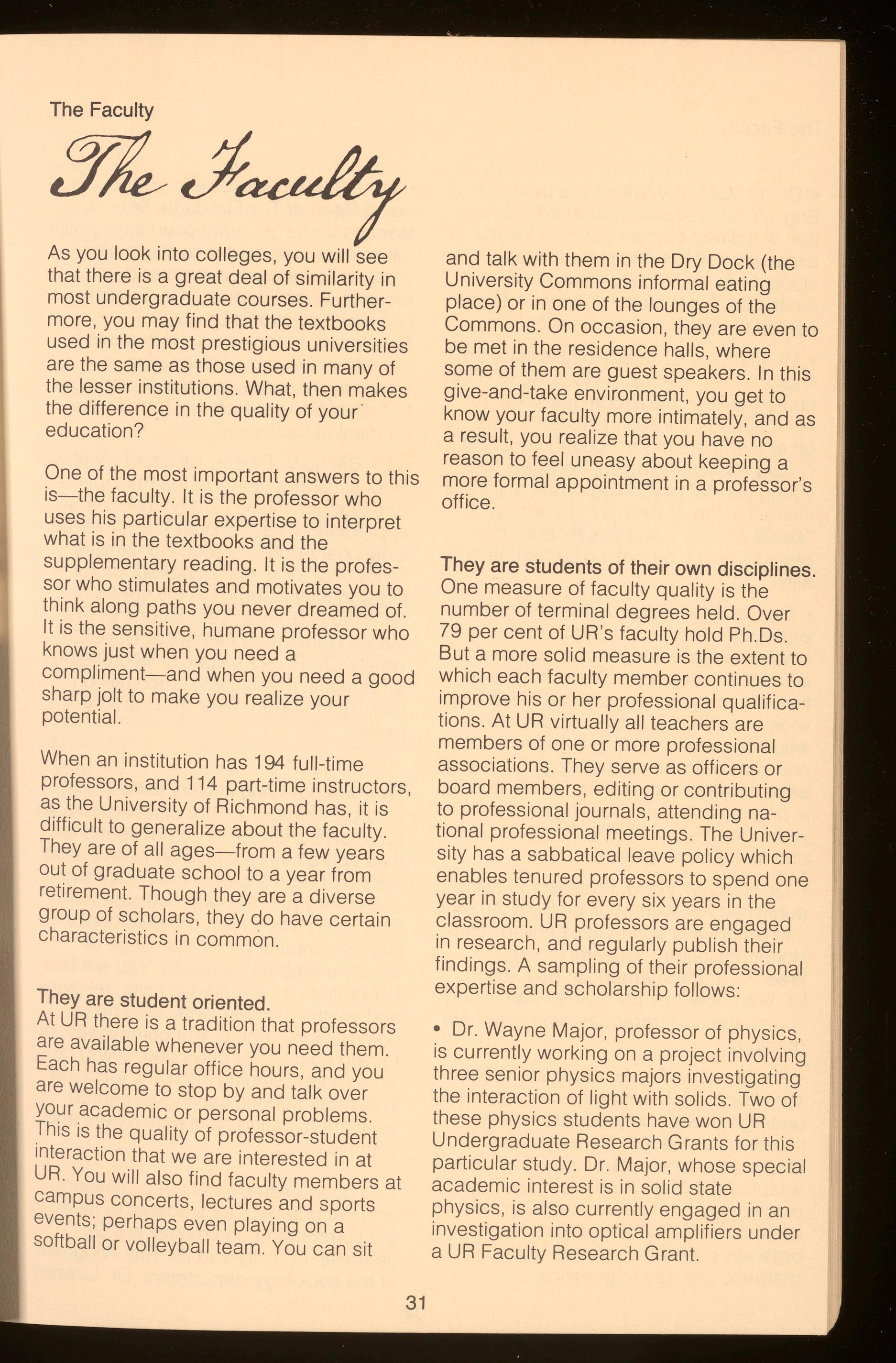
As you look into colleges, you will see that there is a great deal of similarity in most undergraduate courses. Furthermore, you may find that the textbooks used in the most prestigious universities are the same as those used in many of the lesser institutions. What, then makes the difference in the quality of your education?
One of the most important answers to this is-the faculty. It is the professor who uses his particular expertise to interpret what is in the textbooks and the supplementary reading. It is the professor who stimulates and motivates you to think along paths you never dreamed of It is the sensitive, humane professor who knows just when you need a compliment-and when you need a good sharp jolt to make you realize your potential.
When an institution has 194 full-time professors , and 114 part-time instructors , as the University of Richmond has, it is difficult to generalize about the faculty. They are of all ages-from a few years out of graduate school to a year from retirement. Though they are a diverse group of scholars , they do have certain c haracteristics in common .
They are student oriented. At UR there is a tradition that professors are available whenever you need them . Each has regular office hours, and you are welcome to stop by and talk over your academic or personal problems. This is the quality of professor-student interaction that we are interested in at UR. You will also find faculty members at campus concerts , lectures and sports events; perhaps even playing on a softball or volleyball team. You can sit
and talk with them in the Dry Dock (the University Commons informal eating place) or in one of the lounges of the Commons. On occasion, they are even to be met in the residence halls, where some of them are guest speakers. In this give-and-take environment, you get to know your faculty more intimately, and as a result, you realize that you have no reason to feel uneasy about keeping a more formal appointment in a professor's office
They are studentsof their own disciplines. One measure of faculty quality is the number of terminal degrees held. Over 79 per cent of UR's faculty hold Ph.Os. But a more solid measure is the extent to which each faculty member continues to improve his or her professional qualifications. At UR virtually all teachers are members of one or more professional associations. They serve as officers or board members, editing or contributing to professional journals , attending national professional meetings. The University has a sabbatical leave policy which enables tenured professors to spend one year in study for every six years in the classroom UR professors are engaged in research , and regularly publish their findings. A sampling of their professional expertise and scholarship follows:
• Dr. Wayne Major , professor of physics, is currently working on a project involving three senior physics majors investigating the interaction of light with solids. Two of these physics students have won UR Undergraduate Research Grants for this particular study. Dr. Major , whose special academic interest is in solid state physics , is also currently engaged in an investigation into optical amplifiers under a UR Faculty Research Grant.
The Faculty
• Dr Jo McMurtry , associate professor of English , has recently published a book that is a direct outcome of her classroom experience at UR and is dedicated to her students here . The book is entitled "Victorian Life and Victorian Fiction : A Companion for the American Reader ."
• Dr . Matthew E Jaremka, assistant professor of psychology , divides his working hours between classroom teaching , research , and counseling students and other members of the community at UR' s Center for Psychological Services This young clinical psychologist has a spec ial interest in the problem of shyness or " social anxiety ," and has recent ly completed work on a book on human personality
• Dr. Arthur B. Gunlicks , in addition to being Dean of The Graduate School, teaches undergraduate courses in political science . His field is contemporary Western European governments with focus on West Germany . Dr Gunlicks has received two Fulbright Scholarships-0ne as a graduate student, to work on his dissertation in Germany , and one as a faculty member to further his research on German government at the local level.
• Dr . Demetrios Mavroudis, assoc iate professor of art and sculptor , prefers small classes where he can give each student artist plenty of undivided attention . His students can choose to work in a wide variety of sculptural media-from wood and stone carving to metal casting and stoneware or raku pottery . A working artist as well as a teacher, Dr. Mavroudis is preparing for two showings of his work in the University ' s Modlin Fine Arts Center during the coming year
• Dr . Harry M Ward, professor of history , published his sixth book on Early American history this spring . It's entitled " Duty, Honor or Country: General George Weedon and the American Revolution ." Dr Ward teaches Early American history in both the undergraduate and graduate divisions.
• Dr Benito V Rivera , assistant professor of music and a native of the Philippines, who teaches music history , theory and apprec iation, has recently been awarded a national Andrew Mellon Humanities Fellowship for a year of post -doctoral study in musicology . He will spend the 1979 / 80 academic year as one of five Mellon Humanities Fellows at Duke University. Dr Rivera's special field of study is harmonic theory , w ith emphasis on mid-15th through early 16th century music .
• Dr . David W . Towle , associate professor of biology , is engaged with a group of undergraduate and graduate biology students in a Faculty Research Grant study of the molecular mechan ism of salt adaptation in fish . A physiologist/ biochemist, Dr. Towle's particular field of interest is the biochemistry of marine organisms. He also teaches undergraduate courses in genetics .
They are not livingin ivorytowers. Although professors are students all their lives , UR's professors do not spend all their spare time poring over books They are very much a part of the Richmond community and the world outside the University . Each year, the President's Report contains page after page of faculty members ' activities. You will find UR professors involved in civic , religious and youth volunteer work ; serving on commissions , board and committees ; directing community plays and writing musical scores ; singing in choirs, teaching in Sunday School, serving as church vestrymen ; acting as scoutmasters and youth leaders
Two good examples of UR professors who encourage their students to relate to the surrounding community are Dr. Jeremiah Lowney and Dr Ray Wingrove of the sociology department. Dr. Lowney

The Faculty
who is youth minister at his church as well as working as a volunteer with a local juvenile court probation department, requires his students in criminology and juvenile delinquency courses to do field work with local youth agencies . He also teaches a course in sociology at the Richmond City Jail. Dr. Wingrove, an ex pert on gerontology , involves his students in visiting housing facilities for the aged ; in conducting reality orientation sessions among old people at day care centers, and visiting agencies which provide services for the elderly .
To attract professors of this calibre , whenever there is a faculty opening the University conducts a nationwide search to find the best professor in a specific field, or to find a young professor who has already demonstrated exceptional promise In addition to its sabbatical leave policy, the University offers an attractive faculty salary scale (among the highest in Virginia) . Special funds have been earmarked for faculty research, professional advancement and a support program of workshops on faculty development. This latter program helps a professor to acquire new insights into a particular discipline and to improve teaching techniques Classes are kept as small as practicable. The student-faculty ratio is 15 to 1 , and classes average 20-25 students

The University makes certain specific demands on its faculty: senior professors must teach freshmen as well as upperclassmen . No graduate assistants teach in the undergraduate classes. The faculty is constantly being evaluated-by the academic administration, by peers , by students-to maintain a high level of teaching. Tenure is conferred only when a professor has proved his skill as a teacher. Each professor is expected to extend student contact beyond the confines of the classroom and to upgrade the content of his courses continually. Because both faculty and the University strive for the good of the student, the standards set by UR and its faculty are exceptionally high .

Student Life
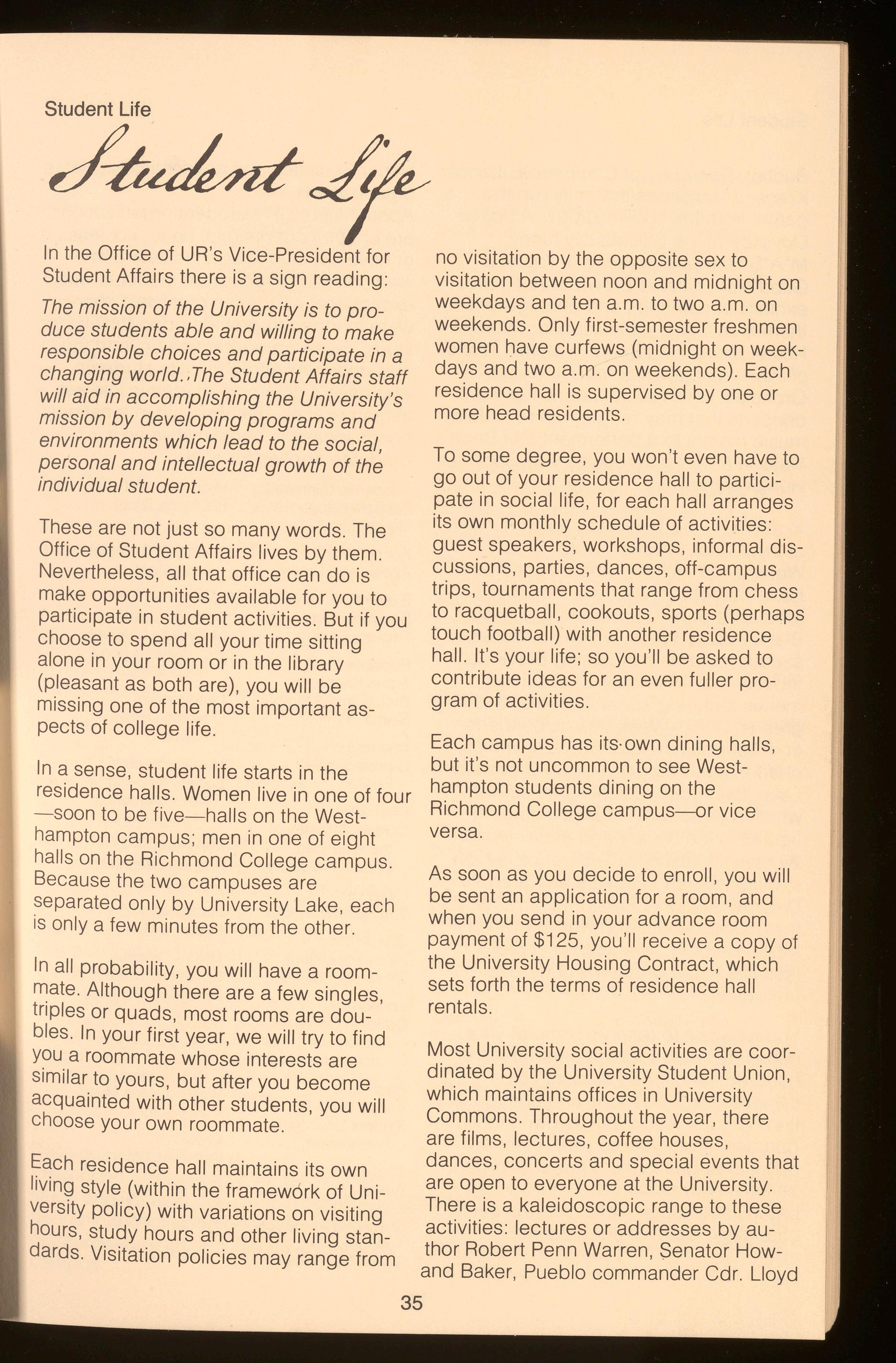
In the Office of UR's Vice-President for no vis_itationby the opposite sex t? n Student Affairs there is a sign reading : v1s1tat1onbetween noon and midnight o weekdays and ten a .m . to two a m . on The mission of the Umvers!t'>:is to pro- weekends. Only first-semester freshmen duce students able and w1llm9 to make women have curfews (midnight on week- responsible choices and participate tn a days and two a.m. on weekends) . Each changing world., The Student Affairs ~t~ff residence hall is supervised by one or will aid in accomplishing the Umversity s more head residents. mission by developing programs and environments which lead to the social , personal and intellectual growth of the individual student
These are not just so many words . The Office of Student Affairs lives by them. Neverthe less, all that office can do is make opportunities available for yo~ to participate in student activities . But 1fyou choose to spend all your time sitting a lone in your room or in the library (pleasant as both are) , you will be missing one of the most important aspects of college life
In a sense, student life starts in the residence halls . Women live in one of four -so on to be five - halls on the Westhampton campus; men in one of eight halls on the Richmond College campus. Bec ause the two campuses are sepa rated only by University Lake , each is o nly a few minutes from the other
In all probability , you will have a roommate Although there are a few singles , triples or quads, most rooms are doubles . In your first year, we will try to find you a roommate whose interests are similar to yours, but after you become acquainted with other students , you will c hoose your own roommate.
Each residence hall maintains its own living style (within the framework of University policy) with variations on visiting hours, study hours and other living standards. Visitation policies may range from
To some degree , you won't even have to go out of your residence hall to part1c1pate in social life, for each hall ar~anges its own monthly schedule of act1v1t1es : . guest speakers, workshops , informal discussions, parties, dances , off-campus trips, tournaments that range from chess to racquetball , cookouts , sports (perhaps touch football) with another residence hall. It's your life ; so you 'll be asked to contribute ideas for an even fuller program of activities
Each campus has its-own dining halls, but it's not uncommon to see Westhampton students dining on the . Richmond College campus-or vice versa.
As soon as you decide to enroll , you will be sent an application for a room, and when you send in your advance room payment of $125 , you'll receive a co_pyof the University Housing Contract, which sets forth the terms of residence hall rentals.
Most University social activities are coordinated by the University Student Union, which maintains offices in Un1vers1ty Commons Throughout the year, there are films lectures , coffee houses , dances 'concerts and special events that are ope 'n to everyone at the University . There is a kaleidoscopic range to these activities: lectures or addresses by author Robert Penn Warren, Senator Howand Baker , Pueblo commander Cdr Lloyd
Student Life
Bucher, Secretary of Commerce Juanita Kreps; a film series that may run the gamut from the sublime 2001: A Space Odyssey to the ridiculously tunny M*A*S*H; a performance of You're a Good Man, Charlie Brown or Antigone; exhibits of paintings and photographs in the Marsh Gallery; philosopher Michael Novak discussing Sport: A Mythic World of Power and Beauty; appearances by Orchesis, UR's resident dance group; concerts that may range from recitals by music majors to a performance of Bach's Mass in B Minor to rock by The Good Humor Band.
Honor Societiesand academicallyrelated organizations · About half of UR's student organizations are chapters of national honor societies or have specific academic ties. Some were formed to recognize students with exceptional academic records. Others were founded to provide opportunities for study, research or practice beyond the classroom. All serve to unite students who have a common academic interest. In many cases, membership in a national honor society is beneficial when a graduate applies for a job.
In addition , the University has a number of traditional "weeks" Dutch Chaos Week, a UR rite of spring that counts band parties, movies and a mud slide among its pressure-releasing activities; Black History Week , which combines serious lectures concerning Black contributions to America with soul food menus featuring spoon bread and collard greens; Greek Week with its concerts, cookout and hilarious Greek olympics, chariot race and raft race on University Lake; the Tucker-Boatwright Festival, which brings to campus outstanding figures in the literary and artistic world; Women 's Lifestyles Conference, which spotl ights such speakers as Karen DeCrow , National President of NOW , and feature s seminars and workshops on topics ranging from women in profess ions to the problems of dual-career families
.,.

Academic (General) : Phi Beta Kapp a Mortar Board
Accounting : Accounting Society
Biology : Beta Beta Beta Ecology Club
Business: Alpha Ka ppa Psi Beta Gamma Sigm a Sigma Pi Beta
Chemi stry : Gamma Sigma Epsilon
Chemi stry : Student Affiliate s of the American Chemical Society
Cla ssic s: Eta Sigma Phi
Dramatics : Alpha Psi Omega
University Player s
History : Phi Alpha Theta
Journali sm : Society of Collegiate Journali sts
Law : Delta Theta Phi McNeil! Law Society
T.C William s Legal Aid Society
Leader ship : Omicron Delta Kappa Management: Society for Advancement of Management
Marketing : American Marketing Association
Mathematics : Pi Mu Epsilon
Military Science : Scabbard and Blade Richmond Rangers
You will want to reserve some of your nonstudy hours for membership in the hundred sanctioned student clubs, societies , organizations and communications groups, each with its own individual purpose From year to year , there are minor changes in the number of organizations. New clubs are formed or old organizations die-reflecting the everchanging needs of our students.
Economics : Omicron Delta Epsilon
Economics Society
Educ ation : Kappa Delta Pi Student Education Association
Engli sh : Areopagu s Engli sh Club
Sherwood Ander son Society
Sigma Tau Delta
Music : Music Educator s National Conference
We sthampton Mu sic Honorary
Phys ics : Sigma Pi Sigma
Political Science / Politics
Pi Sigma Alpha
StudentLife
Psychology: Psi Chi
Psychology Club
Romance Languages:
Phi Sigma Iota
Student and Community Service:
Alpha Phi Omega
Community Service Bureau
Pierides (sophomore women)
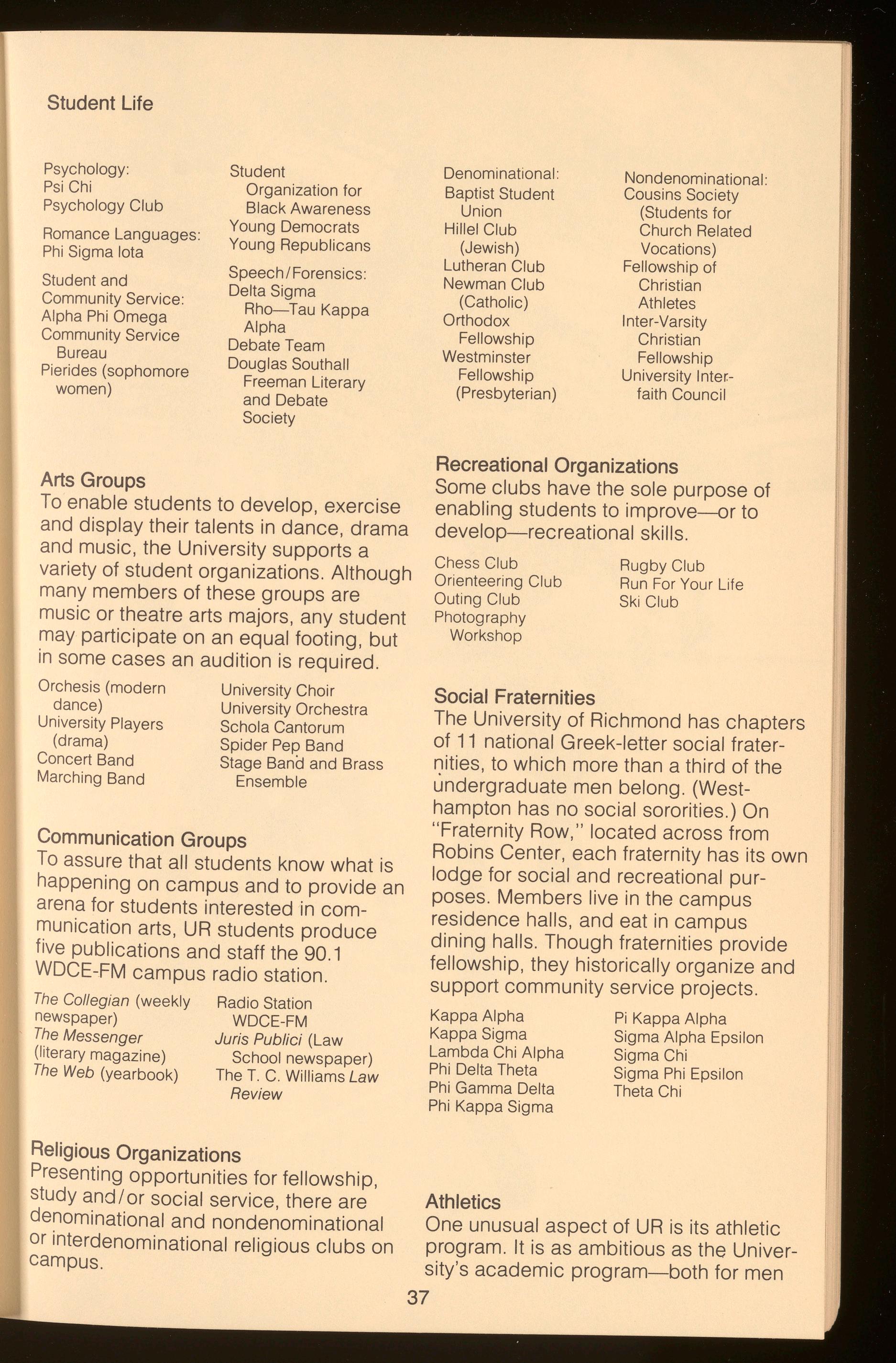
Student Organization for Black Awareness
Young Democrats
Young Republicans
Speech/ Forensics:
Delta Sigma Rho-Tau Kappa
Alpha
Debate Team
Douglas Southall
Freeman Literary and Debate Society
ArtsGroups
To enable students to develop, exercise and display their talents in dance, drama and music, the University supports a variety of student organizations. Although many members of these groups are music or theatre arts majors, any student may participate on an equal footing, but in some cases an audition is required. Orchesis (modern dance)
University Players (drama)
Concert Band Marching Band
University Choir University Orchestra
Schola Cantorum
Spider Pep Band
Stage Band and Brass Ensemble
CommunicationGroups
To assure that all students know what is happening on campus and to provide an arena for students interested in communication arts, UR students produce five publications and staff the 90.1 WDCE-FM campus radio station.
The Collegian (weekly newspaper)
The Messenger (literary magazine)
The Web (yearbook)
Radio Station WDCE-FM
Juris Publici (Law School newspaper)
The T. C. Williams Law Review
ReligiousOrganizations
Presenting opportunities for fellowship, study and/ or social service, there are denominational and nondenominational or interdenominational religious clubs on campus.
Denominational:
Baptist Student
Union
Hillel Club (Jewish)
Lutheran Club Newman Club (Catholic) Orthodox Fellowship
Westminster Fellowship (Presbyterian)
Nondenominational:
Cousins Society (Students for Church Related Vocations)
Fellowship of Christian Athletes
Inter-Varsity Christian Fellowship
University Inter.faith Council
RecreationalOrganizations
Some clubs have the sole purpose of enabling students to improve-or to develop-recreational skills.
Chess Club
Orienteering Club Outing Club Photography Workshop
Social Fraternities
Rugby Club Run For Your Life Ski Club
The University of Richmond has chapters of 11 national Greek-letter social fraternities, to which more than a third of the undergraduate men belong. (Westhampton has no social sororities.) On "Fraternity Row," located across from Robins Center, each fraternity has its own lodge for social and recreational purposes. Members live in the campus residence halls, and eat in campus dining halls. Though fraternities provide fellowship, they historically organize and support community service projects.
Kappa Alpha
Kappa Sigma
Lambda Chi Alpha
Phi Delta Theta
Phi Gamma Delta
Phi Kappa Sigma
Pi Kappa Alpha
Sigma Alpha Epsilon
Sigma Chi
Sigma Phi Epsilon
Theta Chi
Athletics
One unusual aspect of UR is its athletic program. It is as ambitious as the University's academic program-both for men
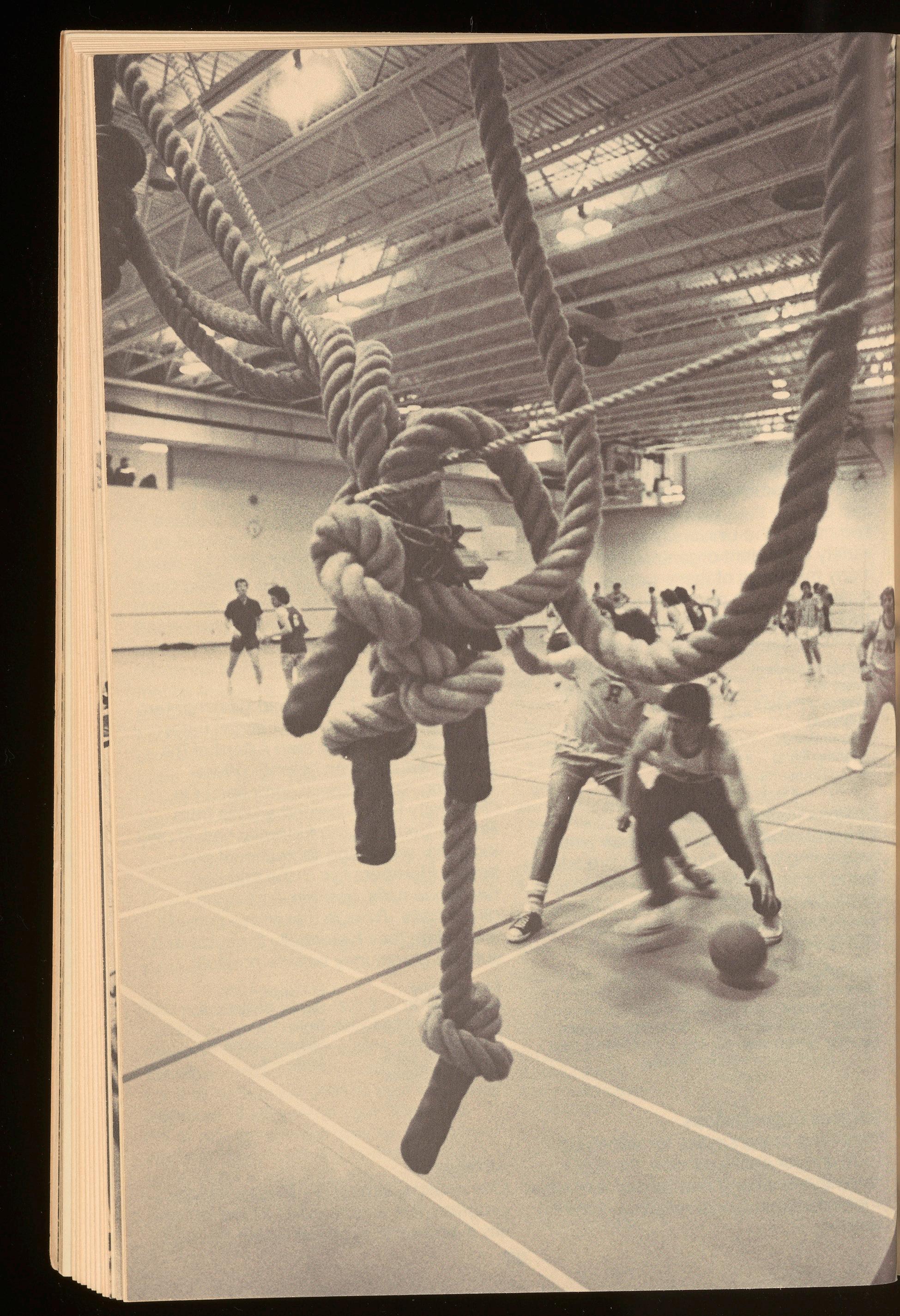
Student Life

and women. As an undergraduate, you can engage in any of the five areas of athletic activity: intercollegiate, club, intramural, physical education and individual physical conditioning.
Intercollegiate
In intercollegiate athletics, UR-a Division I National Collegiate Athletic Association (NCAA) university - currently belongs to the Eastern Corlegiate Athletic Conference (ECAC). UR is free to plan its own schedules, and in most sports, competition ranges from Conference foes such as St. John's, Niagara, George Washington and Villanova to traditional rivals such as William and Mary, VMI and Virginia Tech to athletic powers such as Duke, Auburn, Maryland, North Carolina, Wake Forest and West Virginia. Despite the rigors of such schedules, the University has a remarkable athletic record in all sports.
In men's intercollegiate sports, UR fields teams in football, basketball, baseball, cross-country, indoor and outdoor track and field, golf, soccer, swimming and water polo, tennis, riflery and wrestling. (Incidentally, women who have the ability may compete for a place on some men 's intercollegiate teams.)
Westhampton College, a member of the National Association for Intercollegiate Athletics for Women, fields intercollegiate teams in basketball, archery, field hockey, lacrosse, swimming and diving, tennis, cross-country / track and synchronized swimming.
Intramuraland Club
Two-thirds of all undergraduates participate in intramural or club sports at UR. Rugby, a men 's club sport, becomes more popular each year. There are 26 intramural team and individual sports for men and women: archery, badminton
singles and doubles, basketball, crosscountry , golf, handball singles and doubles, hardyball, horseshoe singles and doubles, racquetball singles and doubles, rifle, soccer, softball, squash singles, swimming, table tennis singles and doubles, tennis singles and doubles, track, volleyball, water polo, wrestling. Fraternities, residence halls and "pickup" groups vie with one another.
Physicaleducation
Because UR firmly believes that physical fitness is essential to your well-being , two years of physical education is mandatory for every student (unless the University physician determines otherwise after a physical examination).
Individualphysicalconditioning
The University's four gymnasiums are available for you to set up your own program of physical fitness or if you decide to engage in intercollegiate or intramural sports. A11facilities and equipment are at your disposal when not used for regularly scheduled team practice.
Religion
As an institution related to the Baptist General Association of Virginia, the University is interested in the spiritual growth of the student. The student body, however, is ecumenical in character , and religious activities involve all faiths.
Religious activities center in the Office of the Chaplain, which is easily accessible in University Commons. If you have personal problems , crisis decisions or spiritual needs, the Chaplain 's Office can help you through individual counseling or group workshops. Each Sunday morning there is an interdenominational Christian
worship service in Cannon Memorial Chapel, and the City of Richmond has over 325 churches and synagogues , any of which welcome you to participate .
CommunityService
Because some UR students wish to become involved in social service activities-either as a vehicle for selffulfillment or for professional enrichment - the University maintains a Community Service Program related to the Chaplain 's Office . You can tutor a child who has reading disabilities, work in a hospital or a home for the aged , serve with a Richmond social agency such as the Hotline or a drug rehabilitation center. Whatever your interest , there is an opportunity for community service.
StudentGovernment
To as great an extent as possible , UR places the governance of students in the hands of students. Each undergraduate college has its own Student Government Association, which responds to the needs and interests of its specific students . Thus , the residents of one college need never be discriminated against by the residents of another college .
whom you studied , and sometimes your appraisal will become part of the over-all evaluation that determines the contract renewal and grants of tenure of current faculty Students sit-and vote-on such committees of the Board of Trustees as Development and University Relations , Business Management, Academic Program and Student Affairs .
Every community must have laws or regulations-both to guarantee that one individual (or a small group of individuals) does not infringe on the rights of the majority and that no individual 's human rights are damaged . Among your rights is the right to privacy. Any entry of living quarters , offices, lockers or examination of possessions must be in accordance with the law .
To provide a clear-cut code of conduct for all members of the campus community, four years ago a committee-made up of students, faculty , administrators and trustees-prepared a Policy Statement on Standards of Conduct, Penalties and Disciplinary Procedures This statement has become the basis for disciplinary action that must be taken with any member of the campus community When you enroll, a copy will be provided for you so you can study it thoroughly

Each college has its own Honor Council and its own Judicial Council - composed entirely of students . As a rule, violations of Honor Codes and of student standards of conduct are judged-and sentences passed - by these bodies
Students not only govern themselves , but they are active participants in the operation of the University. When the University is seeking new faculty members , students in some cases are part of evaluation of candidates. Every third semester you will evaluate the professors under
Now for a few quick answers. Drugs? Forbidden Alcoholic beverages? There are specific guidelines that limit the use and regulate the consumption of such beverages on campus. Automobiles and motorcycles? Yes-provided they are registered with the University, an Automobile Permit Fee of $15 is paid , you abide by the regulations regarding the use of the vehicle and (as a resident freshman) there is parking space on campus . You will find more complete answers in your student handbook or by writing to the Office of the Dean of the College

StudentLife
StudentServices
To assist foreign students, the Foreign Student Advisor coordinates a program of activities for foreign students and serves as the official person to complete required United States Immigration forms for students. A program of orientation is conducted at the opening of the fall semester; a hospitality committee extends hospitality to foreign students; an International Relations Club provides social and cultural activities; personal and academic counseling or referral are provided by the Foreign Student Advisor if such services are appropriate.
In addition to the academic and religious counseling services already mentioned, there is a University Center for Psychological Services, staffed by professional psychologists. The staff is interested in helping you to adjust to the challenges, stresses and opportunities that exist on campus, whether your problems are academic , vocational, personal or emotional.
There also is a Career Planning and Placement Center. Should you still be searching for the right career or profession (and almost half of all college students are undecided about their career goals when they enter college) , this office will help you to identify your skills, values and interests; show you how to set long-range goals; introduce you to creative ways to approach the working world. If you are seeking part-time employment during the school year or the summer, or if you wish a summer internship, the Placement Office will help you in your search. Naturally, seniors and alumni can turn to the Placement Office for help in their job searches, and each year over 100 businesses, industries and schools send representatives to campus to interview job candidates.
Because UR is interested in your continuing good health, the University maintains a 22-bed infirmary. It is under the direction of the University physician and a staff of three resident nurses who are on duty around the clock. The cost of infirmary rooms and medical attention given on campus by the University medical staff is included as part of your fee If prescription drugs, laboratory services or medical consultation is required , such costs are billed separately.
The University is fully prepared to take care of ordinary illnesses and accidents, but if your problem is beyond the scope of our facilities, you will be taken to the nearest hospital (just four miles from campus), and your parents will be notified at once.
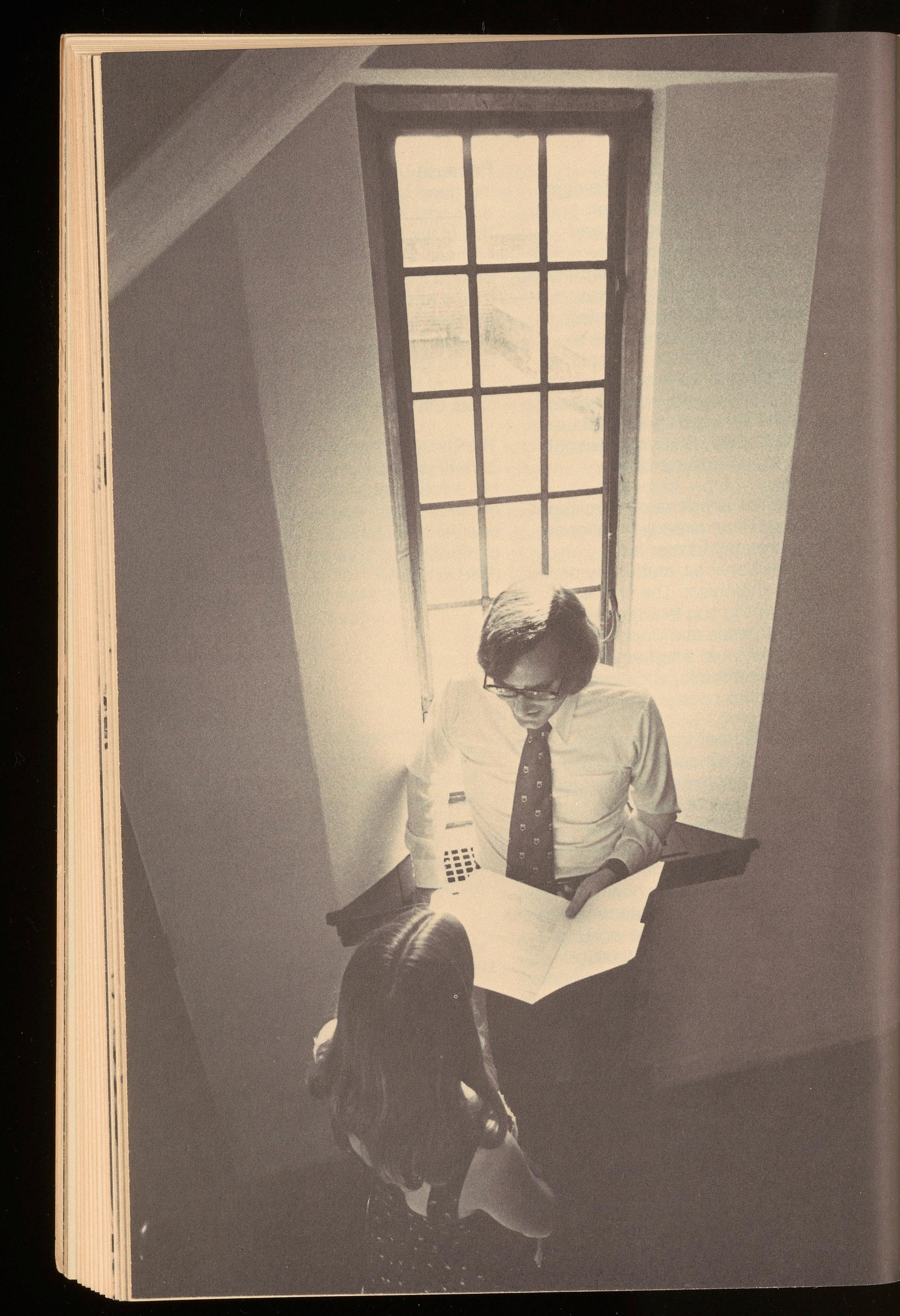
Admission,Costs and FinancialAid

One of the problems in presenting an authentic picture of the University of Richmond is that some prospective students-reading of its superior faculty, handsome facilities and diverse cocurricular activities-might readily dismiss UR as an unaffordable institution.
Today, no college education is inexpensive. However, the same financial support from alumni and friends that helps us construct new buildings, install new equipment and retain eminent professors at UR, also helps us to keep tuition costs down (Our students actually pay only 52% of the true cost of their education.) We enjoy excellent endowment. Our emphasis on strict financial planning enables us to make the most of it so when your costs are computed you receive maximum benefits both educationally and financially.
For the year 1979-1980 , basic annual costs of attending UR are:
Total basic costs $4,900.00-$5 , 105.00
To this amount, you will add $150-$200 for books, the cost of transportation to and from your home, and a weekly allowance for incidentals and recreation.
If that figure seems beyond the reach of you and your family, then perhaps UR can help. About 40% of all UR students receive some form of financial assistance. Last year alone, 1,300 UR students received financial aid amounting to over $1,500 ,000. Total aid packages (combining a variety of sources) range
from $200 to $4,000, and all awards are made without regard to sex, religion, race, color, age or national or ethnic origin.
Specifically, UR financial aid packages may include one or more of the following:
• Scholarships-Some are based exclusively on financial need; some are competitive (you evidence special talents or skills through high school grades, standardized test scores and recommendations).
• Grants-The government awards some, the University others. All grants are based on need
• Loans-Again government funds account for some; others are private or sponsored by the University.
• Jobs-There are both on-campus and off-campus opportunities to add to your personal income.
On pages 44-45 is a list of financial assistance available at UR. To be eligible for such aid, disclosure of resources is required to assure fair distribution of financial aid funds. Therefore , you must submit a Parents Confidential Statement (PCS) or a Financial Aid Form (FAF) to the College Scholarship Service. You must also file the University's Application for Student Financial Aid with UR's Office of Student Financial Aid.
Although we extend the opportunity of quality education to as many deserving students as possible, it remains our philosophy that the family and the student should assume primary responsibility for school costs. Therefore, we expect that if you qualify for financial aid, you will work to offset some of your expenses. The University sponsors programs to
Admission, Costs and Financial Aid
NAMEOFAID
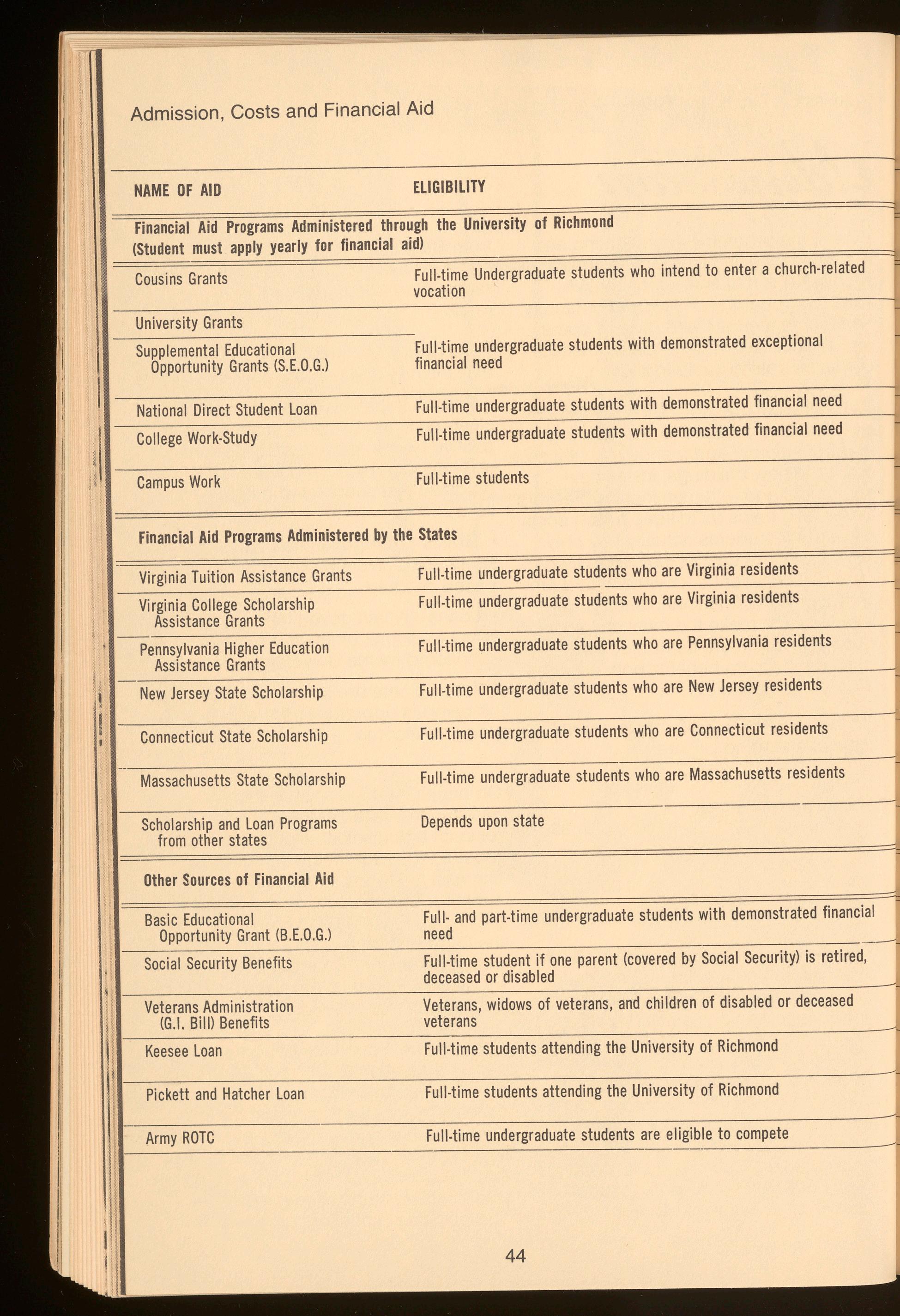
ELIGIBILITY
FinancialAid ProgramsAdministeredthroughthe Universityof Richmond (Studentmustapplyyearlyfor financialaid)
CousinsGrants
UniversityGrants
SupplementalEducational OpportunityGrants(S.E.O.G.l
NationalDirectStudentLoan CollegeWork-Study
CampusWork
Full-timeUndergraduatestudentswho intendto entera church-related vocation
Full-timeundergraduatestudentswith demonstratedexceptional financialneed
Full-timeundergraduatestudentswith demonstratedfinancialneed
Full-time undergraduatestudentswith demonstratedfinancialneed
Full-time students
FinancialAidProgramsAdministeredbythe States
VirginiaTuitionAssistanceGrants
VirginiaCollegeScholarship
Full-timeundergraduatestudentswhoare Virginiaresidents
Full-timeundergraduatestudentswhoare Virginiaresidents AssistanceGrants
PennsylvaniaHigherEducation AssistanceGrants
NewJerseyStateScholarship
ConnecticutStateScholarship
MassachusettsStateScholarship
ScholarshipandLoanPrograms fromotherstates
OtherSourcesof FinancialAid
BasicEducational OpportunityGrant(B.E.O.G.)
SocialSecurityBenefits
VeteransAdministration (G.I.Bill) Benefits
KeeseeLoan
PickettandHatcherLoan ArmyROTC
Full-timeundergraduatestudentswhoare Pennsylvaniaresidents
Full-timeundergraduatestudentswhoare NewJerseyresidents
Full-timeundergraduatestudentswhoare Connecticutresidents
Full-timeundergraduatestudentswhoare Massachusettsresidents
Dependsuponstate
Full- andpart-timeundergraduatestudentswith demonstratedfinancial need
Full-time studentif oneparent(coveredby SocialSecurity)is retired, deceasedor disabled
Veterans,widowsof veterans,andchildrenof disabledor deceased veterans
Full-timestudentsattendingthe Universityof Richmond
Full-timestudentsattendingthe Universityof Richmond
Full-timeundergraduatestudentsare eligibleto compete
Admission, Costs and Financial Aid
FINANCIALVALUE

HOWTOAPPLY
$1,000annually
Upto $1,000annually
$200to $1,500annually (Award mustbe matchedby other aid in the financialaid package.)
$200 to $1,250annually
$300andupwardannually. Paidby the hour.
$300andupwardannually. Paidby the hour.
Upto $600 annually
$200to $800annuallydependinguponneed
$100to $800annuallydependinguponneed
Upto $500annually
$200to $900annuallydependinguponneed
$300to $9.00annuallydependinguponneed
Varies,dependinguponstate
Contactthe UniversityChaplain
1. Completean applicationfor financialaid by March1.
2. Completean FAF(availablefrom your guidanceoffice)with a requestthat a copybe sent to the Universityof Richmond. (Virginiaresidentsshouldcompletethe VFAF.l
Completean on-campusemploymentapplication.
Completea TAGPapplicationby June1
1. Completea VFAFby March1.
2. Requesta copyof yourVFAFbe sentto CSAP(CSScode0068).
Obtainan applicationfrom PHEAA(TowneHouse,Harrisburg,PA17102).
Obtainan applicationfrom StateScholarshipCommissionDepartment of HigherEducation(225W. StateStreet,Trenton,NJ08620).
Obtainapplicationfrom Commissionfor HigherEducation(P.O.Box1320, Hartford,CT06101).
Obtainapplicationfrom MassachusettsBoardof HigherEducation (182TremontSt., Boston , MA0211ll.
Inquirethroughyour high schoolor state Departmentof Education.
$200to $1,800annually
Varies
Varies
Upto $1,250annually
Upto $1,500annually
Approximately$3,000 annually
Obtainapplicationfrom highschoolandcompleteas directed.
ContactSocialSecurityoffice in your area
ContactVeteransAdministrationoffice in your area.
Obtainapplicationfrom the Chas.B. KeeseeEducationalFund (P.O Box3748 , Martinsville,VA24112).
Obtainapplicationfromthe PickettandHatcherEducationalFund (P.0. Box2128,Columbus,GA31902)
ContactMilitary ScienceDepartment,Universityof Richmond , VA23173
Admission,Costs and FinancialAid
help you find suitable employment. There is a College Work-Study Program; a UR Work Program placing students in campus positions; and an active Placement Office directing students who wish parttime , off-campus job openings
To be considered for Regular Admission , you have a deadline of February 15 for submitting your application. You will be notified of acceptance around April 1 .
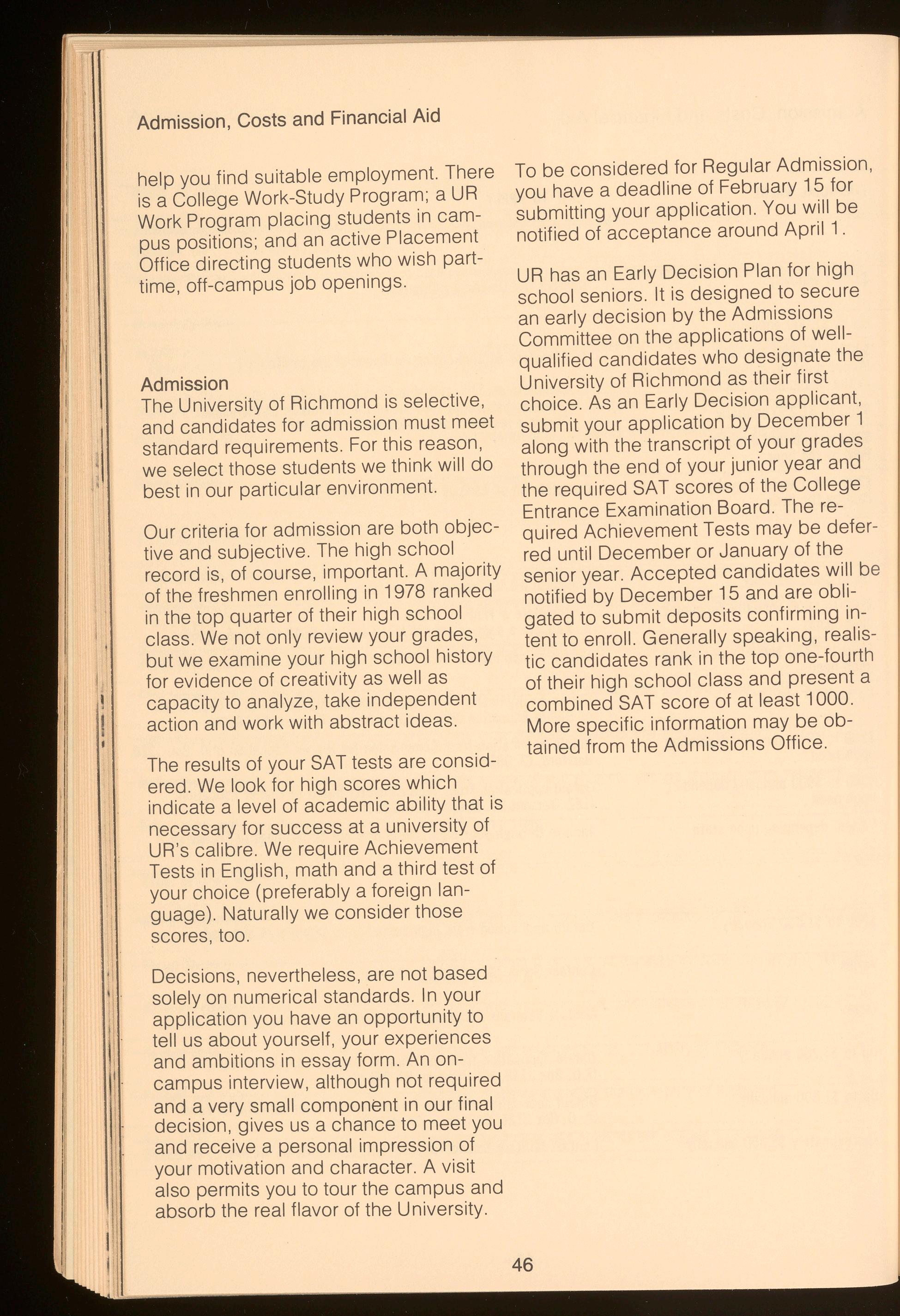
Admission
The University of Richmond is selective , and candidates for admission must meet standard requirements For this reason , we select those students we think will do best in our particular environment.
Our criteria for admission are both objective and subjective. The high school record is , of course, important. A majority of the freshmen enrolling in 1978 ranked in the top quarter of their high school class. We not only review your grades , but we examine your high school history for evidence of creativity as well as capacity to analyze , take independent action and work with abstract ideas
The results of your SAT tests are considered . We look for high scores which indicate a level of academic ability that is necessary for success at a university of UR's calibre. We require Achievement Tests in English , math and a third test of your choice (preferably a foreign language) . Naturally we consider those scores, too.
Decisions, nevertheless , are not based solely on numerical standards. In your application you have an opportunity to tell us about yourself , your experiences and ambitions in essay form. An oncampus interview , although not required and a very small component in our final decision, gives us a chance to meet you and receive a personal impression of your motivation and character. A visit also permits you to tour the campus and absorb the real flavor of the University.
UR has an Early Decision Plan for high school seniors. It is designed to secure an early decision by the Admissions Committee on the applications of wellqualified candidates who designate the University of Richmond as their first choice . As an Early Decision applicant, submit your application by December 1 along with the transcript of your grades through the end of your junior year and the required SAT scores of the College Entrance Ex amination Board . The required Achievement Tests may be deferred until December or January of the senior year . Accepted candidates will be notified by December 15 and are obligated to submit deposits confirming intent to enroll. Generally speaking, realistic candidates rank in the top one-fourth of their high school class and present a combined SAT score of at least 1000 More specific information may be obtained from the Admissions Office .
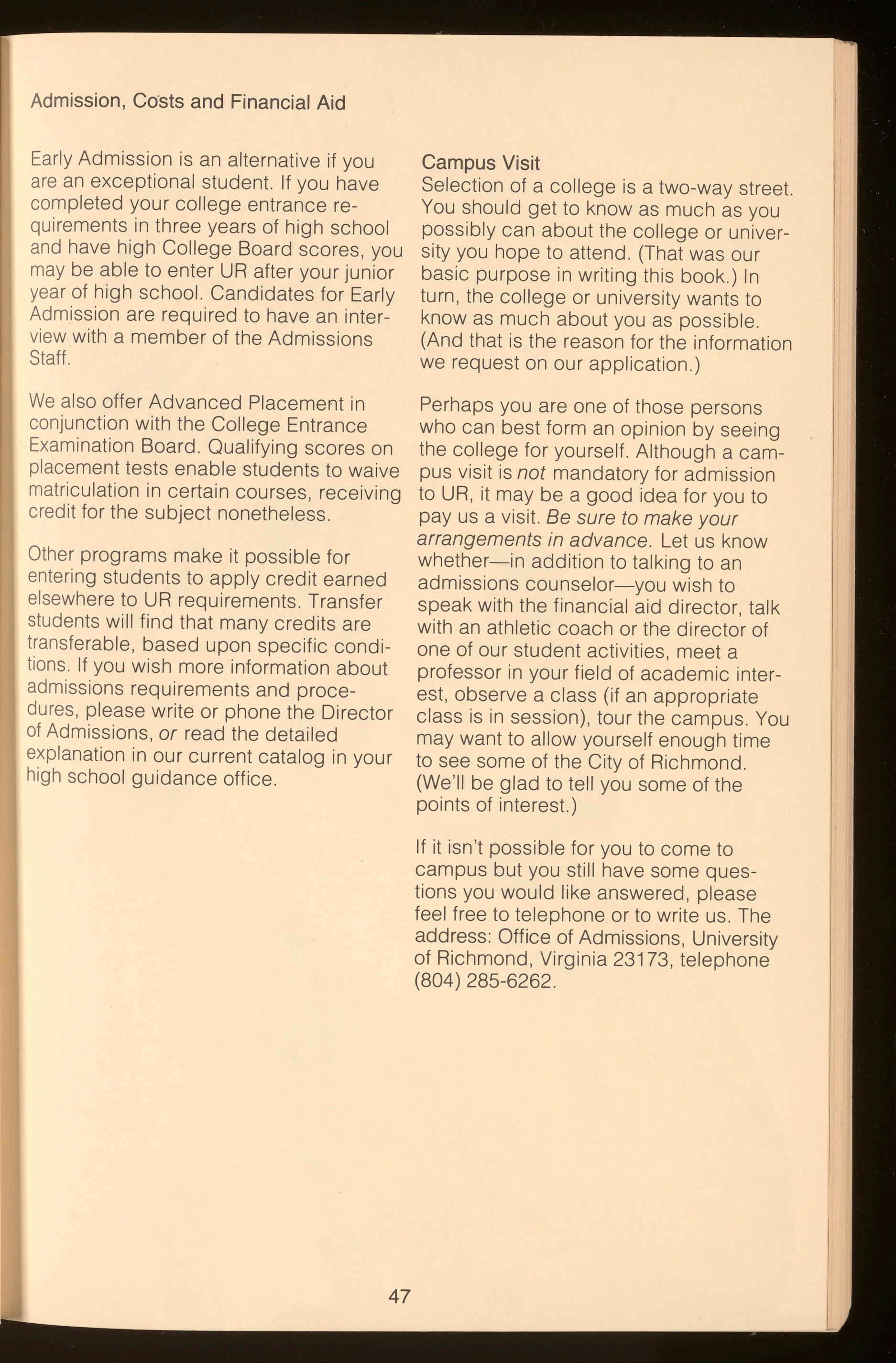
Admission, and Financial Aid
Early Admission is an alternative if you are a n ex ceptional student. If you hav e comp leted your college entrance require ment s in three years of high school and have high College Board scores , you may b e able to enter UR after your junior year of high school. Candidates for Early Adm ission are required to have an interview with a member of the Admissions Staff.
We also offer Advanced Placement in conj unct ion with the College Entrance Examination Board Qualifying scores on place ment tests enable students to waive matriculation in certain courses , receiving cred it for the subject nonetheless.
Other programs make it possible for entering students to apply credit earned elsewhere to UR requirements Transfer students will find that many credits are transferable, based upon specific conditions. If you wish more information about admissions requirements and procedures, please write or phone the Director of Ad missions , or read the detailed explanation in our current catalog in your high sc hool guidance office.
Campus Visit
Selection of a college is a two-way street . You should get to know as much as you possibly can about the college or university you hope to attend (That was our basic purpose in writing this book.) In turn , the college or university wants to know as much about you as possible. (And that is the reason for the information we request on our application )
Perhaps you are one of those persons who can best form an opinion by seeing the college for yourself. Although a campus visit is not mandatory for admission to UR, it may be a good idea for you to pay us a visit Be sure to make your arrangements in advance. Let us know whether-in addition to talking to an admissions counselor-you wish to speak with the financial aid director , talk with an athletic coach or the director of one of our student activities , meet a professor in your field of academic interest , observe a class (if an appropriate class is in session) , tour the campus. You may want to allow yourself enough time to see some of the City of Richmond. (We ' ll be glad to tell you some of the points of interest.)
If it isn 't possible for you to come to campus but you still have some questions you would like answered , please feel free to telephone or to write us. The address : Office of Admissions, University of Richmond , Virginia 23173 , telephone (804) 285-6262 .
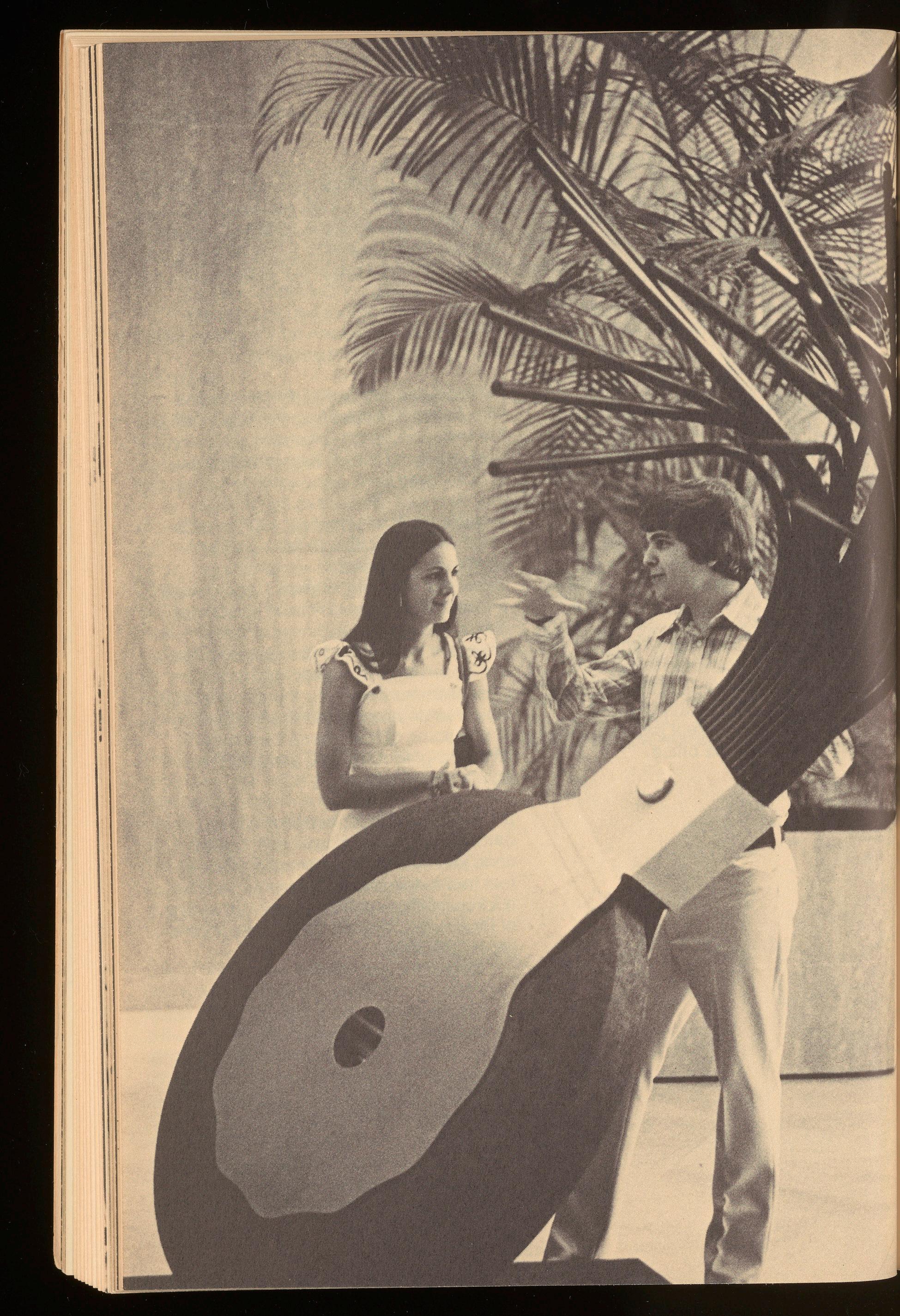
UniversityProfile .

·1(?-~
The University of Richmond, founded in Modlin Fine Arts Center (with the Camp 1830, is a small, private university. UR Memorial Theater); Boatwright Memorial ac cepts qualified students without regard Library (to which a $4-m1ll1onadd1t1onhas to sex, religion, race, color, or national or been built) ethnic origin.
Location
In t he suburbs of Richmond, Virginia , the state capital with a metropolitan population of 500 ,000. Richmond is two hours f rom Washington, D.C., one hour from Charlottesville and Williamsburg.
Organization
The University is made up of six colleges Ric hmond College and Westhampton College , liberal arts colleges for men and women respectively ; the School of Business Administration; T. C. Williams Sc hool of Law ; Graduate School; and University College, UR's summer school and continuing education division.
StudentBody
Richmond College enrolls 1,300 full-time male students ; Westhampton , 900 female students ; School of Business Administration, 300 men and women. Over 40% of all students are from out of state , and 80% live on campus.
Campus
The University ' s 350-acre campus , located six miles west of the center of Ric hmond , surrounds a 10-acre lake. Adding to the beauty of the campus are rolling hills , tall pines , and over 46 major fac ilities, including the $10-million Robins Center for athletics; the $8-million Science Center; a $4.5-million University Commons (student center); the Jenkins Greek Theatre; Cannon Memorial Chapel;
Academically, the University of Richmond adheres to the liberal arts tradition , seeking to provide the basis of sound learning and teaching , and opportunities in research for the intellectual development of its students and faculty.
Degree Programs
UR offers programs leading to the Associate of Applied Studies , Bachelor of Applied Studies , Bachelor of Arts , Bachelor of Science , Bachelor of Science in Business Administration , Bachelor of Music, Bachelor of Music Education , Master of Arts , Master of Business Administration, Master of Education , Master of Humanities , Master of Science and Juris Doctor.
Majors Offered
. UR students may major in accounting , American studies , art (art history and studio art) , biology , chemistry , classical civilization , classical studies , econom ics , education (early childhood , elementary , and secondary), English , finance, health and physical education, history , interdisciplinary studies , journalism, management systems , marketing , mathematics , modern foreign languages (French , German or Spanish) , music (music education , music history and theory, and performance), philosophy , physics , political science , psychology , religion , Russian area studies , sociology , speech communication and theatre arts and urban studies.
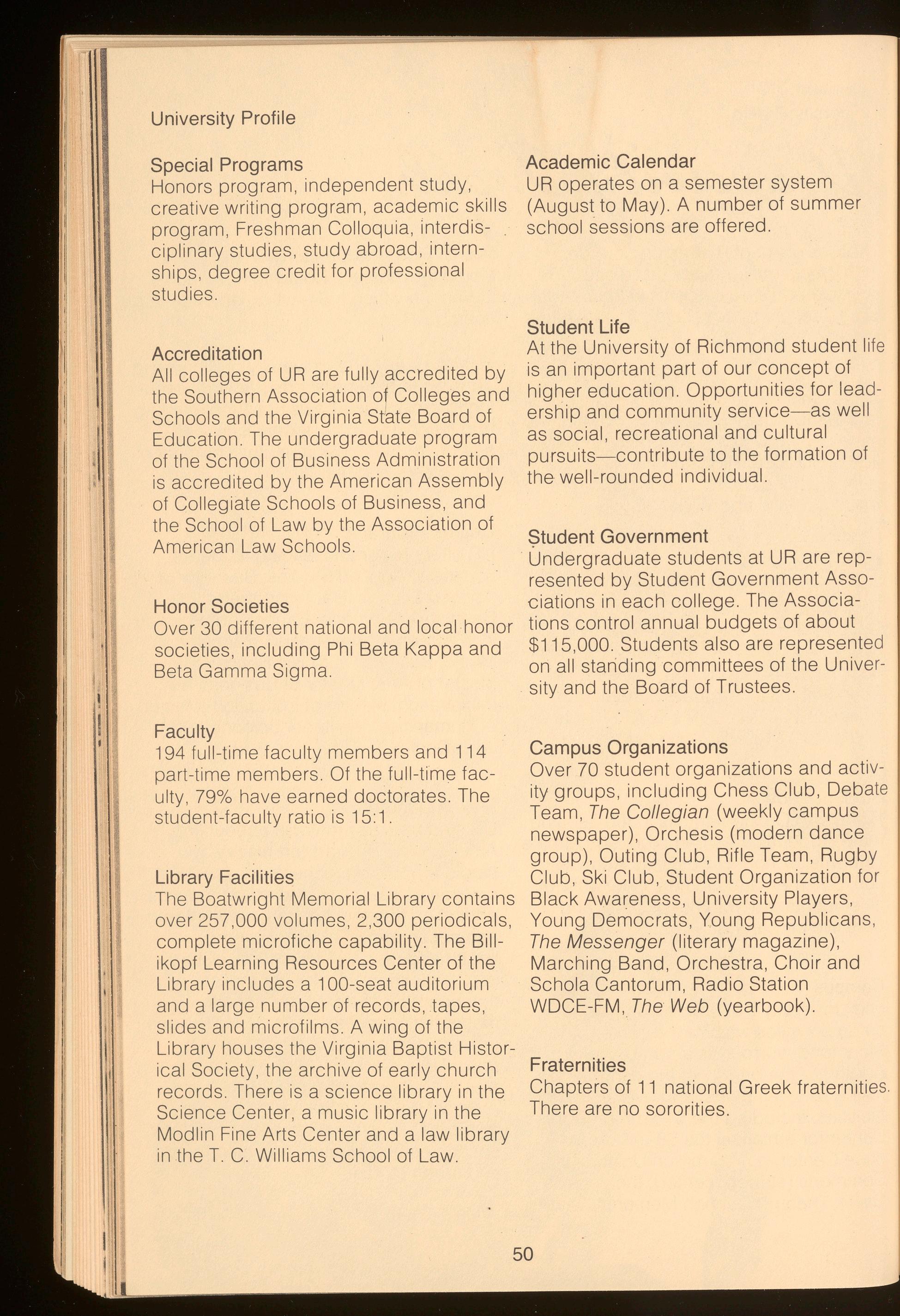
UniversityProfile
Special Programs
Honors program, independent study, creative writing program, academic skills program , Freshman Colloquia, interdisciplinary studies, study abroad, internships, degree credit for professional studies.
Accreditation
All colleges of UR are fully accredited by the Southern Association of Colleges and Schools and the Virginia State Board of Education. The undergraduate program of the School of Business Administration is accredited by the American Assembly of Collegiate Schools of Business , and the School of Law by the Association of American Law Schools.
Honor Societies
Over 30 different national and local honor societies, including Phi Beta Kappa and Beta Gamma Sigma.
Faculty
194 full-time faculty members and 114 part-time members. Of the full-time faculty, 79% have earned doctorates. The student-faculty ratio is 15: 1.
LibraryFacilities
The Boatwright Memorial Library contains over 257,000 volumes, 2,300 periodicals, complete microfiche capability. The Billikopf Learning Resources Center of the Library includes a 100-seat auditorium and a large number of records, tapes , slides and microfilms. A wing of the Library houses the Virginia Baptist Historical Society, the archive of early church records. There is a science library in the Science Center, a music library in the Modlin Fine Arts Center and a law library in the T. C Williams School of Law.
Academic Calendar
UR operates on a semester system (August to May). A number of summer school sessions are offered.
Student Life
At the University of Richmond student life is an important part of our concept of higher education. Opportunities for leadership and community service-as well as social, recreational and cultural pursuits -c ontribute to the formation of the well-rounded individual.
$tudent Government
Undergraduate students at UR are represented by Student Government Associations in each college. The Associations control annual budgets of about $115,000. Students also are represented on all standing committees of the Unive rsity and the Board of Trustees.
Campus Organizations
Over 70 student organizations and activity groups , including Chess Club , Debate Team , The Collegian (weekly campus newspaper), Orchesis (modern dance group), Outing Club, Rifle Team, Rugby Club , Ski Club, Student Organization for Black Awareness , University Players , Young Democrats, Young Republicans , The Messenger (literary magazine), Marching Band , Orchestra, Choir and Schola Cantorum, Radio Station WDCE-FM, The Web (yearbook).
Fraternities
Chapters of 11 national Greek fraternities There are no sororities.
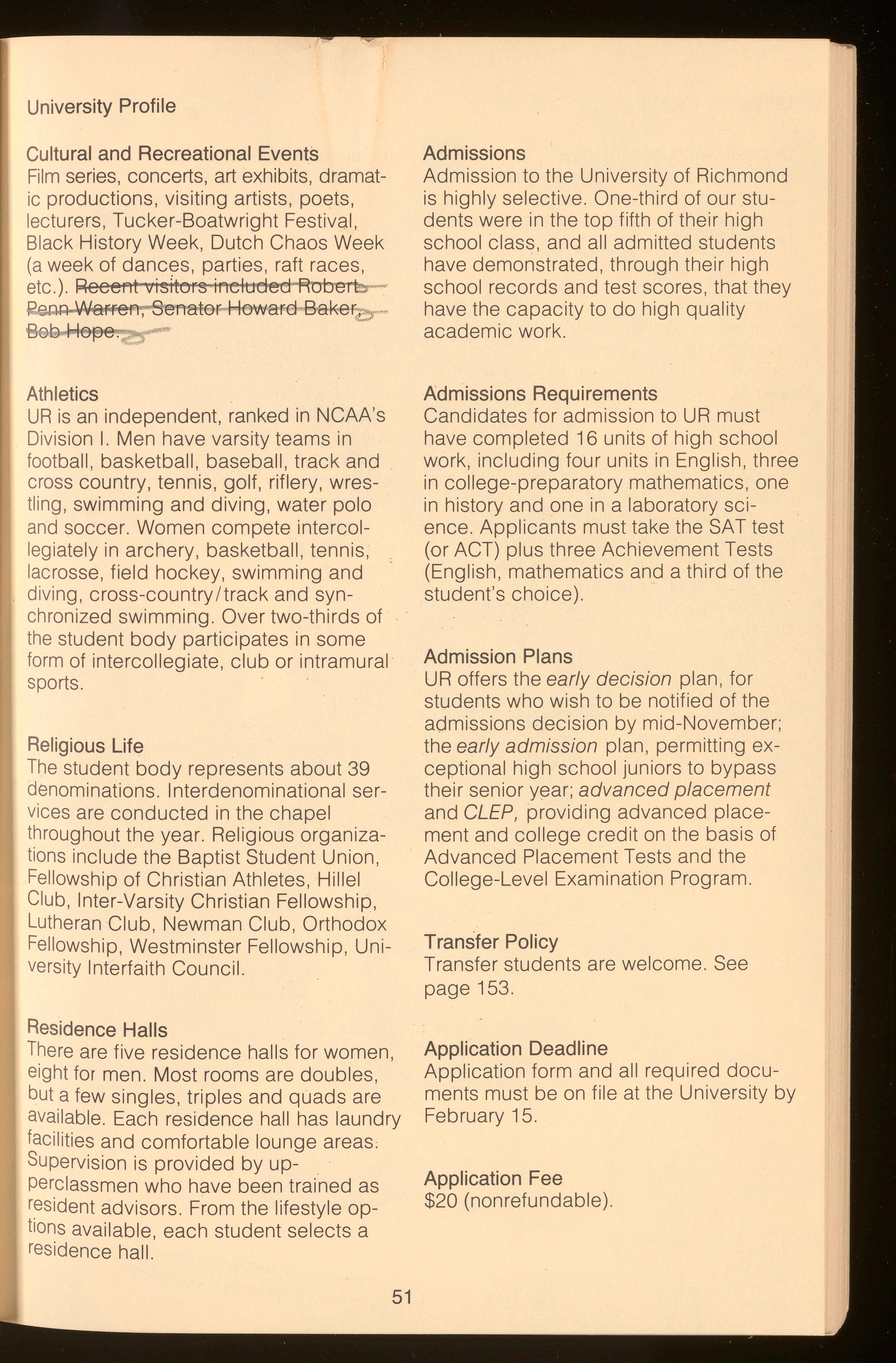
UniversityProfile
Culturaland Recreational Events
Film series, concerts, art exhibits, dramatic productions, visiting artists, poets, lecturers, Tucker-Boatwright Festival , Black History Week , Dutch Chaos Week (a week of dances , parties, raft races , etc.) ~ce1 ,t visitorsineluded Fmberb ~e~inJNer-~e ~ Bftator- Howar&Ba~e "bBeM-i,~ ~
Athletics
UR is an independent, ranked in NCAA's Division I. Men have varsity teams in football , basketball, baseball, track and cross country, tennis , golf, riflery, wrestling , swimming and diving, water polo and soccer Women compete intercollegiately in archery, basketball , tennis, lacrosse, field hockey, swimming and diving, cross-country / track and synchronized swimming. Over two-thirds of the student body participates in some form of intercollegiate , club or intramural sports
Religious Life
The student body represents about 39 denominations. Interdenominational services are conducted in the chapel throughout the year. Religious organizations include the Baptist Student Union , Fellowship of Christian Athletes, Hillel Club, Inter-Varsity Christian Fellowship, Lutheran Club , Newman Club , Orthodox Fellowship, Westminster Fellowship , University Interfaith Council.
Residence Halls
There are five residence halls for women , eight for men. Most rooms are doubles, but a few singles, triples and quads are available. Each residence hall has laundry facilities and comfortable lounge areas , Superv ision is provided by upperclassmen who have been trained as resid ent advisors. From the lifestyle opt,ons available, each student selects a residence hall.
Admissions
Admission to the University of Richmond is highly selective. One-third of our students were in the top fifth of their high school class , and all admitted students have demonstrated, through their high school records and test scores , that they have the capacity to do high quality academic work.
AdmissionsRequirements
Candidates for admission to UR must have completed 16 units of high school work , including four units in English, three in college-preparatory mathematics , one in history and one in a laboratory science. Applicants must take the SAT test (or ACT) plus three Achievement Tests (English, mathematics and a third of the student's choice).
AdmissionPlans
UR offers the early decision plan , for students who wish to be notified of the admissions decision by mid-November ; the early admission plan , permitting exceptional high school juniors to bypass their senior year ; advanced placement and CLEP, providing advanced placement and college credit on the basis of Advanced Placement Tests and the College-Level Examination Program.
Transfer Policy
Transfer students are welcome. See page 153.
ApplicationDeadline
Application form and all required documents must be on file at the University by February 15.
ApplicationFee
$20 (nonrefundable).
University Profile
Deposit Upon Acceptance
$125. There is an additional $125 residence hall fee deposit. Deposits on either the general fee or residence hall fee are non-refundable.
Campus Visit
Prospective students are strongly encouraged to visit campus , tour the facilities and talk with professors in their field of interest.
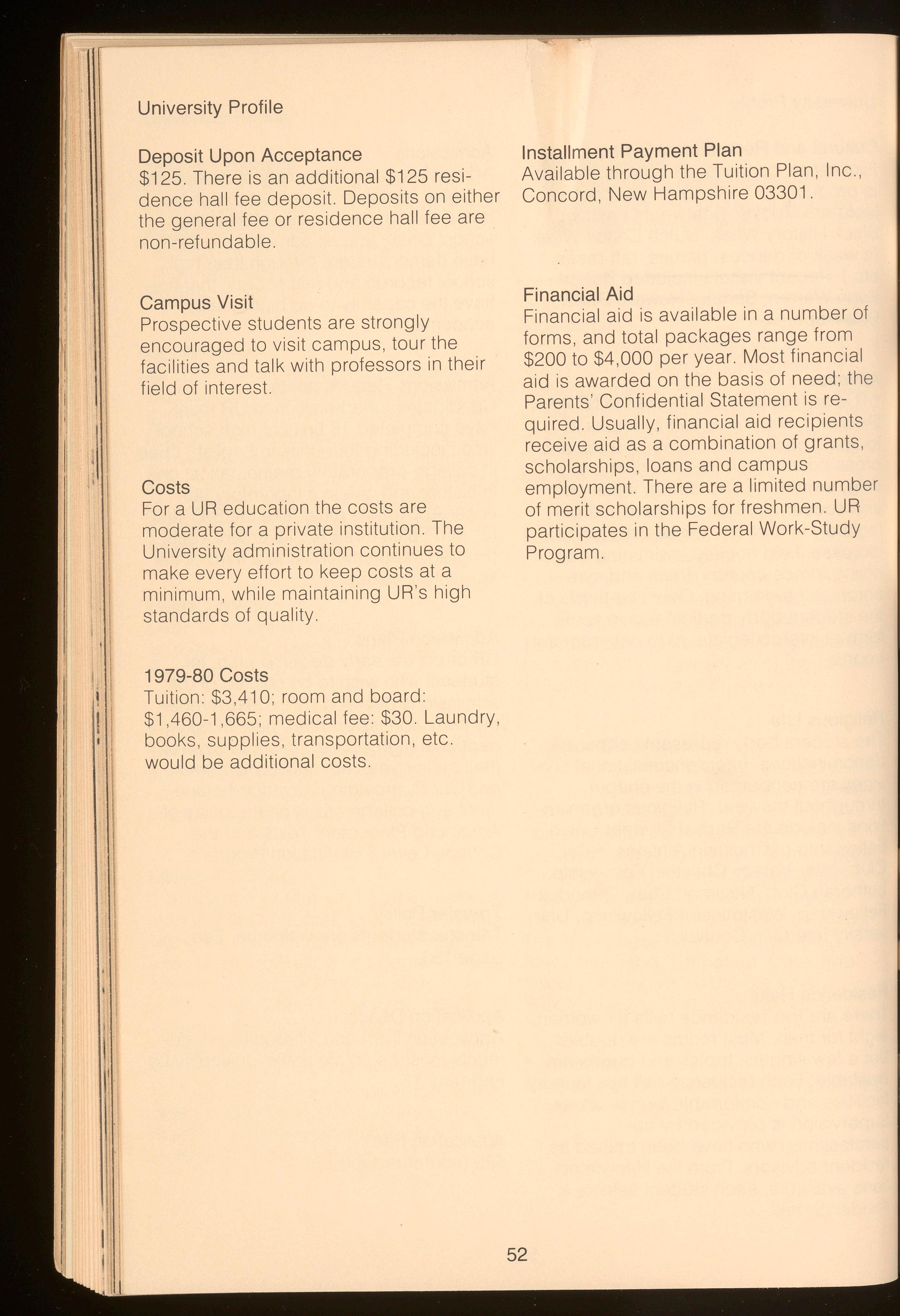
Costs
For a UR education the costs are moderate for a private institution. The University administration continues to make every effort to keep costs at a minimum , while maintaining UR's high standards of quality.
1979-80 Costs
Tuition $3,41 0; room and board:
$1,460-1 ,665 ; medical fee: $30. Laundry , books, supplies , transportation, etc. would be additional costs.
Installment Payment Plan
Available through the Tuition Plan , Inc. , Concord, New Hampshire 03301.
Financial Aid
Financial aid is available in a number of forms, and total packages range from $200 to $4,000 per year. Most financial aid is awarded on the basis of need; the Parents ' Confidential Statement is required. Usually, financial aid recipients receive aid as a combination of grants , scholarships, loans and campus employment. There are a limited number of merit scholarships for freshmen. UR participates in the Federal Work-Study Program.
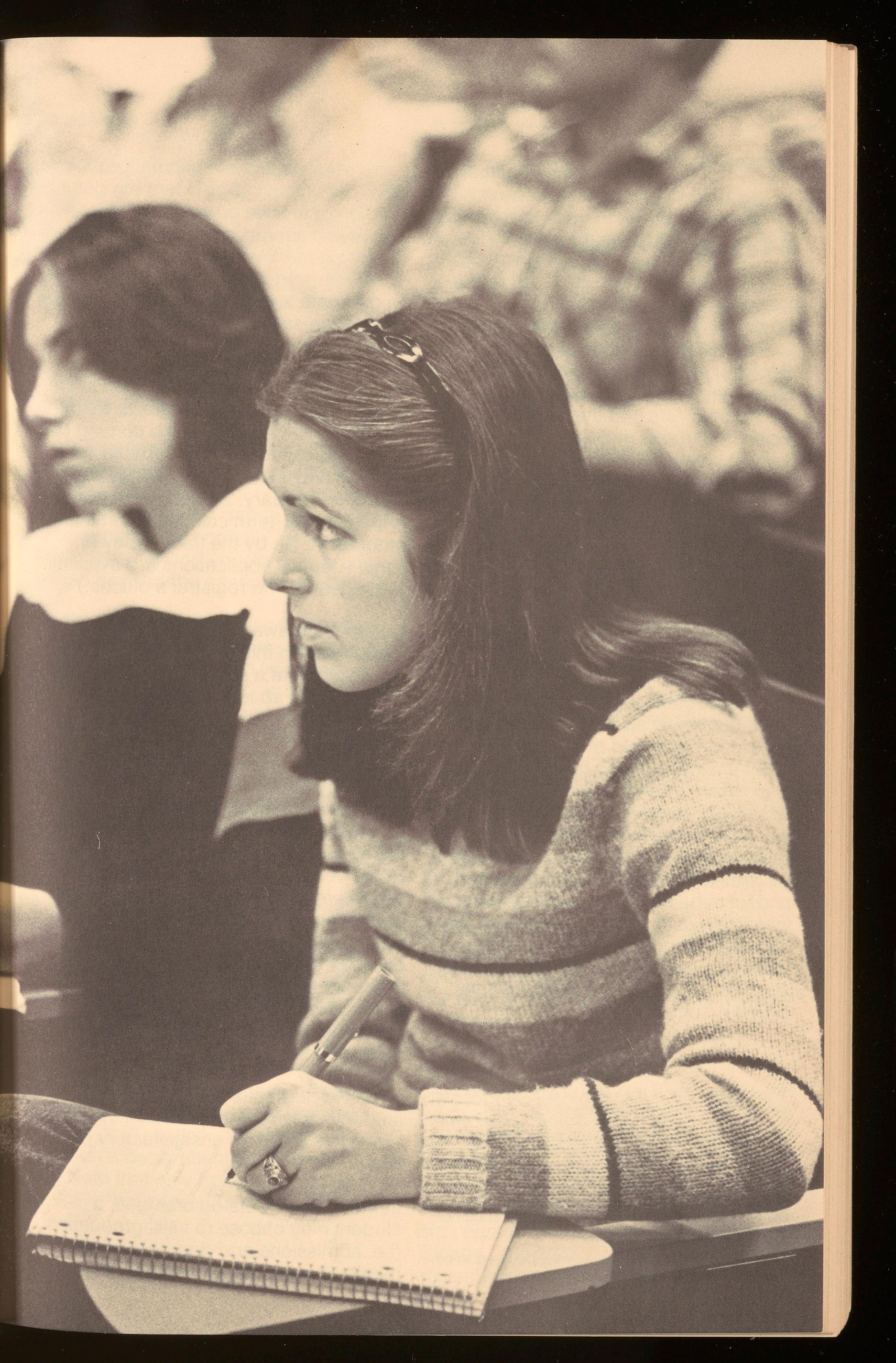
Academics

Degrees
To graduate a student must file a degree application and participate in commencement: Richmond College and Westhampton College offer the Bachelor of Arts, the Bachelor of Science and the Bachelor of Music degrees. Candidates for the Degree applications must be filed in the Bachelor of Arts and the Bachelor of Office of the University Registrar by the Science degrees must complete satisfac-first Friday in October for the coming May torily at least 120 semester hours of work, or August commencement. Those not including physical education ac-enrolled only in the spring , file by the first tivities courses, and earn a grade point Friday in February. Students enrolled only average of not less than 2.000 1 on all in the summer term culminating in their work attempted. Candidates for the graduation, file by the third Friday in Bachelor of Music degree must complete June. (Degree applications are available satisfactorily at least 126 semester hours in the deans' and registrar's offices.) of work, not including physical education activities courses, and earn a grade point average of not less than 2 .000. 1
For af"1ydegree in either college, a candidate must satisfy proficiency, distributional2 and field of concentration requirements outlined below and must also receive credit for attendance at Assemblies and Convocations. In addition, course work not found in the catalog of Richmond and Westhampton College courses and not comparable in intent and/ or subject matter to course work in that listing shall not comprise more than 24 semester hours of a Richmond or Westhampton College degree. Transfer students should check the conditions stated on page 153.
'A semester hour is the value of one class hour of work a week through the semester.
Grade points are given to each semester hour according to the following scale: A-4, B-3, C-2, D- 1, and F-0. The grade point average is determined by dividing the total number of grade points earned by the total r.•_11T1berof academic hours attempted. Each of these totals is accumu-
Degrees are awarded in person. No deviation from this requirement is permitted except that a student may request graduation in absentia by stating in writing the very unusual circumstance that prevents participation in commencement. This request must be received by the University Registrar no later than eight working days before the ceremony . The registrar will administer the policy in consultation with the appropriate dean and notify the student. A candidate for graduation who does not participate in the commencement ceremony, unless approved as "in absentia", does not graduate. Such student may graduate by again filing a degree application and by observing the policy stated above concerning participation in commencement.
Note: No degree is conferred if the student's financial responsibilities to the University are in an unsatisfactory condition.
In the event of catalog changes, a student may choose to fulfill graduation lated term by term.
2 No University College course may be used to meet (i.e. admissions and degree) requireproficiency or distributional requirements. ments of a subsequent catalog provided

Academics
all the requirements of the chosen catalog are met. The University provides an academic advising system to help students plan their programs; however, the final responsibility for meeting the requirements of a chosen program of study lies with the individual student.
Bachelor of Arts
I. Proficiency and Basic Knowledge
Courses to satisfy these requirements may not be used to meet distributional requirements for the degree. Proficiency requireme nts are normally met in the freshman year and should not be postponed beyond the sophomore year.
A. English Composition and Literature
A student may demonstrate proficiency in English composition and literature by: (1) passing English 101-102 or English 103, (2) presenting a score on the CEEB tests or on the Advanced Placement test acceptab le to the Department of English , or (3) passing a proficiency test administered by the Department to eligible students. Note that options (2) and (3) do not carry semester-hours credit toward a degree.
B. Foreign Language (Second College Year)
In both Richmond College and Westhampton College a student may demonstrate proficiency in a modern foreign language or in an ancient language by (1) passing the 104 level of one language, or (2) presenting a score on the CEEB Language Achievement Test acceptable to the language faculty concerned, or (3) making an acceptable score on a departmental placement test. Note that only option (1) carries semester-hours credit toward a degree.
Bachelor of Arts
C. Mathematics
In Richmond College and Westhampton College a student may demonstrate proficiency by: (1) passing six semester hours in Mathematics selected from courses 101, 102, 103, 104, 151, 229, 251 and 252, or (2) presenting a score on the CEEB Mathematics Achievement Test (Level I or 11), acceptable to the Mathematics Department. Note that only option (1) carries semester-hours credit toward a degree.
D. Western Civilization
In Richmond College and Westhampton College a student may demonstrate proficiency by: (1) passing History 105106 or History 115-116, (2) presenting a score on the CEEB European History Achievement Test acceptable to the History Department, or (3) passing a comprehensive examination given by the History Department and taken during the student's freshman or sophomore year. Note that only option (1) carries semester-hours credit toward a degree.
II. DistributionalRequirements
A. Division I (Social Sciences)
Economics , Education, Political Science, Psychology, Sociology, Military Science. Six semester hours in courses other than Military Science.
B. Division II (Natural Sciences and Mathematics)
Biology, Chemistry, Physics , Mathematics. Eight semester hours in a natural science.
C. Division Ill (Humanities A)
Art, History, Journalism , Music, Philosophy, Religion, Speech Communication and Theatre Arts, Classics 301303 (see "Classics in English"). Six semester hours. This distributional requirement may not be satisfied by taking 100-level History courses, or any Journalism courses, or applied courses in Art, Theatre , and Music, or Music performing ensembles.
Academics
D. Division IV (Humanities B, Literature and Languages)
Classical Studie s, Engli s h , Modern Foreign Languages. Six semester hours. This requirement ma y not be satisfied by 100-level courses in any of the three departments or by Classics 301-303 (see " Classics in English " ) , or b y c ourses used to demonstrate proficiency in English Composition and Literature .
E. Division V
Health and Physical Education The satisfactory completion of four semester hours of required physical education (usually taken in the freshman and sophomore years) is required for graduation Please see requirements specified under Health and Physical Education Department listing.
Ill. The Interdisciplinary Alternative
Four semesters of 200-level Interdisciplinary Studies courses , normally to be taken in the freshman and sophomore years Satisfactory completion of four semesters of 200-level Interdisciplinar y Studies courses , combined with satisfactory completion of the Division V requirement as stated abo v e , may be taken as an alternative to fulfilling the distributional requirements set forth in Section 11
IV. Concentration
A major consists of at least 24 semester hours in the primary field of concentration By fulfilling the requirements in two departments , a student may declare two majors . No department may require a student to take more than 32 hours above the 100 level in the major , although a student may elect to take additional hours in the department. At least 60 semester hours of academic work must be outside of the student's major department , and at least 42 semester hours must be outside of the major division. Related courses may be required by the student's major department. For specific
Bachelor of Science
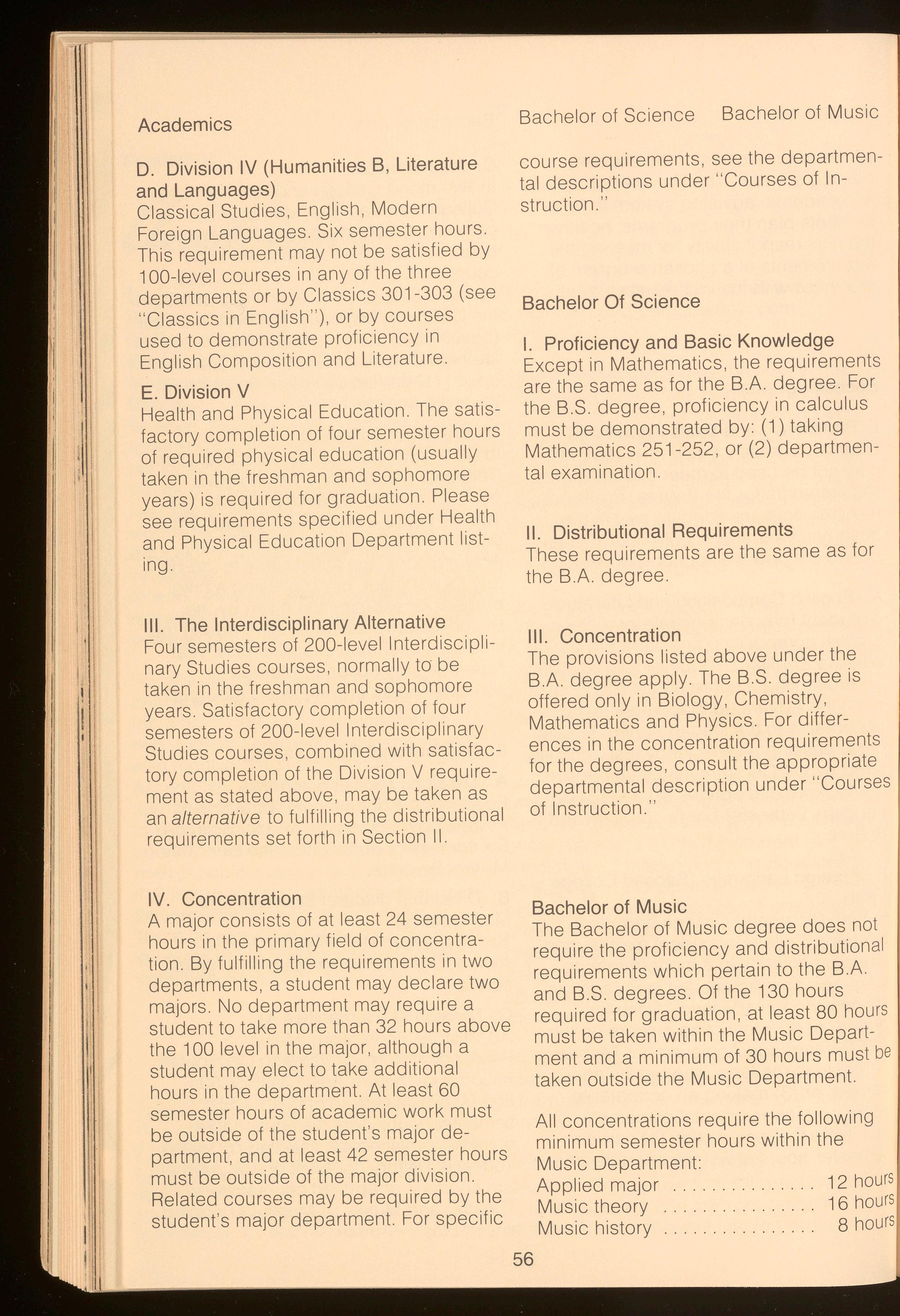
Bachelor of Music
course requirements , see the departmental descriptions under " Courses of Instruction. "
Bachelor Of Science
I. Proficiency and Basic Knowledge
Except in Mathematics , the requirements are the same as for the BA degree . For the B S. degree , proficiency in calculus must be demonstrated by (1) taking Mathematics 251-252 , or (2) departmental examination.
II. Distributional Requirements
These requirements are the same as for the BA degree.
111 Concentration
The provisions listed above under the BA degree apply. The B.S. degree is offered only in Biology , Chemistry , Mathematics and Physics. For differences in the concentration requirement s for the degrees, consult the appropriate departmental description under " Courses of Instruction. "
Bachelor of Music
The Bachelor of Music degree does not require the proficiency and distributional requirements which pertain to the BA and B.S. degrees. Of the 130 hours required for graduation , at least 80 hours must be taken within the Music Department and a minimum of 30 hours must be taken outside the Music Department.
All concentrations require the following minimum semester hours within the Music Department: Applied major . . . .. . .. . Music theory ..... . Music history .... 12 hours 16 hours 8 hours
Instrumental or vocal organizations
Accompanying and ensemble 6 hours 4 hours
All concentrations require the following minimum semester hours outside the Music Department: English composition and literature .
6 hours History 3 hours Physical education Please see requirements specified under Health and Physical Education Department listing.
For differences in the concentration requirements for the degree, consult the appropriate departmental description under "Courses of Instruction "
SpecialPrograms
Degree Credit Allowed For ProfessionalStudies
Professional studies in medicine , dentistry, forestry, 1 or law may be substituted for the fourth year of academic work under the following conditions:
1 At the end of the sophomore year, the student must have completed 60 semester hours of academic work with at least 180 grade points.
2 Before registering for the third year in Richmond College or Westhampton College, the student's course of study must be approved by the Academic Council of the Faculty of Arts and Sciences.
Special Programs
3. At the end of the junior year the student must have completed 100 semester hours of academic work with at least 300 grade points .
4. During the first year in a professional school, the student must make satisfactory progress toward achieving the professional degree as certified by the professional school.
Under the above conditions, the student's professional work may be offered in lieu of certain degree requirements A candidate for the B.A. degree may, for example, offer the first year's work in an accredited law school in lieu of 18 hours of related subjects in the field of concentration and 6 hours of elective subjects. A candidate for the B.S. degree may substitute the first year's work in an accredited medical or dental school for a maximum of 8 hours in the area of concentration and the remaining work for elective courses.
InterdisciplinaryStudies
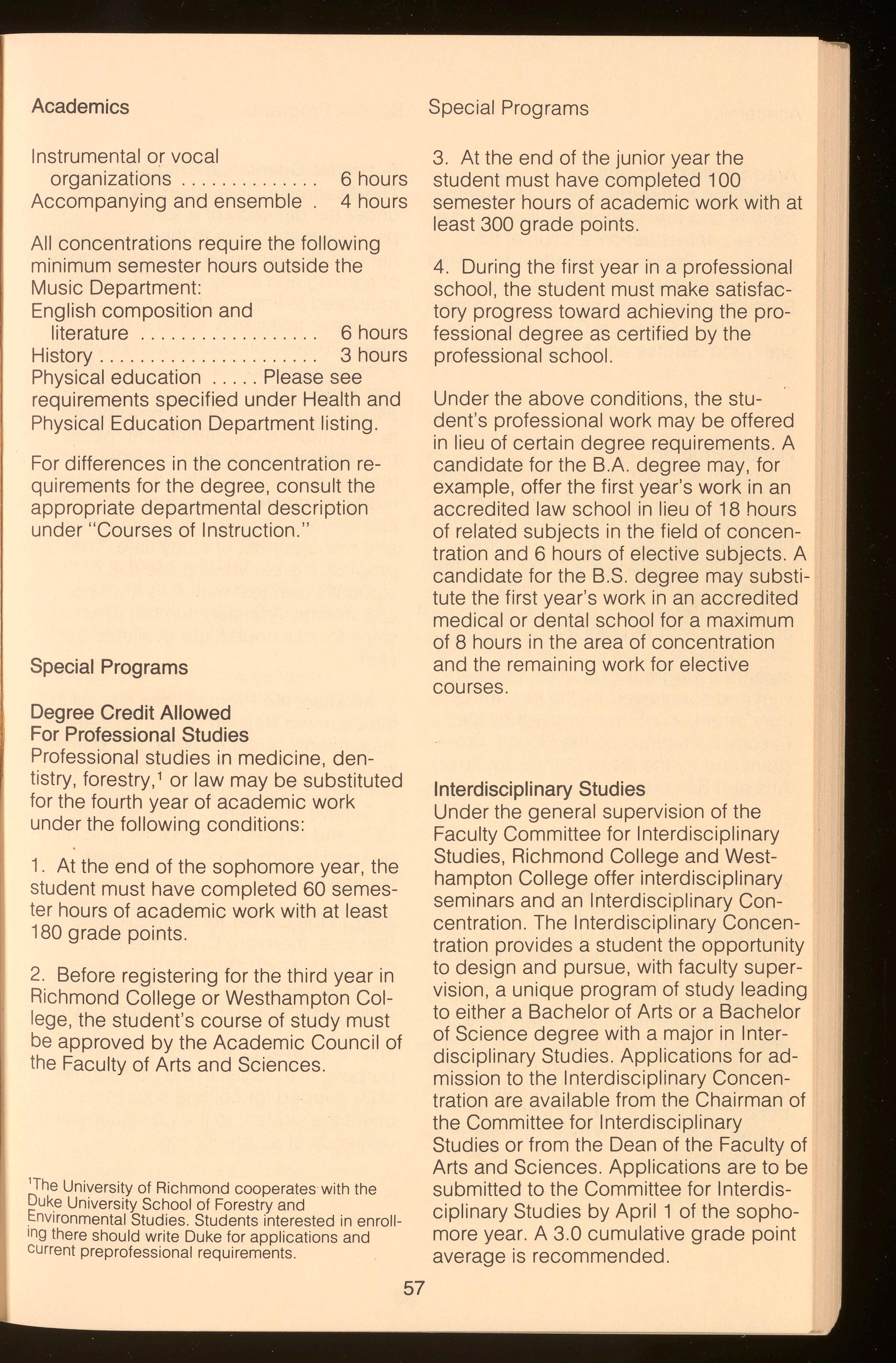
' The University of Richmond cooperates with the Duke University School of Forestry and Environmental Studies. Students interested in enrolling there should write Duke for applications and c urrent preprofessional requirements.
Under the general supervision of the Faculty Committee for Interdisciplinary Studies, Richmond College and Westhampton College offer interdisciplinary seminars and an Interdisciplinary Concentration The Interdisciplinary Concentration provides a student the opportunity to design and pursue, with faculty supervision, a unique program of study leading to either a Bachelor of Arts or a Bachelor of Science degree with a major in Interdisciplinary Studies. Applications for admission to the Interdisciplinary Concentration are available from the Chairman of the Committee for Interdisciplinary Studies or from the Dean of the Faculty of Arts and Sciences. Applications are to be submitted to the Committee for Interdisciplinary Studies by April 1 of the sophomore year. A 3.0 cumulative grade point average is recommended.
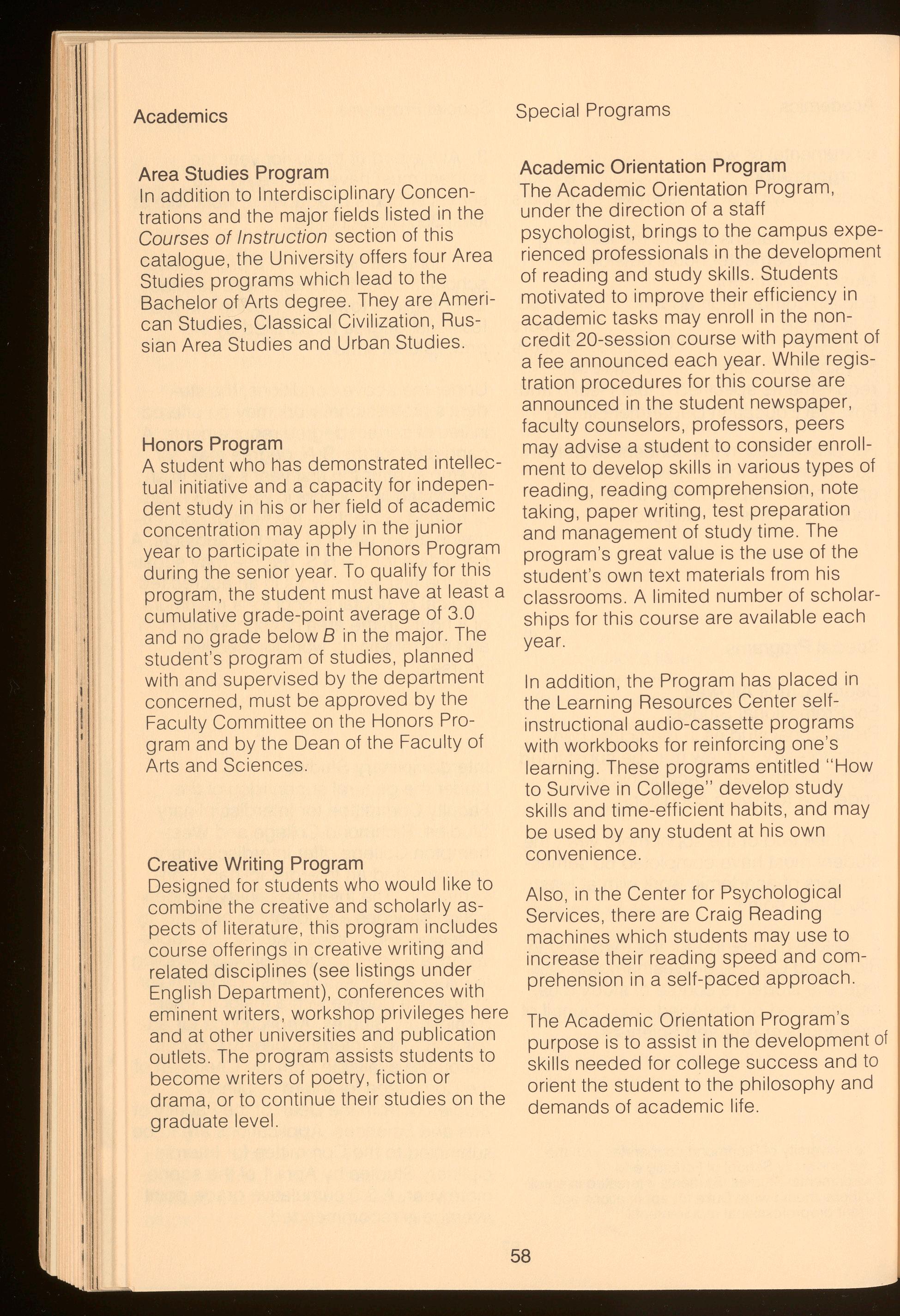
Area Studies Program
In addition to Interdisciplinary Concentrations and the major fields listed in the Courses of Instruction section of this catalogue, the University offers four Area Studies programs which lead to the Bachelor of Arts degree They are American Studies, Classical Civilization, Russian Area Studies and Urban Studies.
Honors Program
A student who has demonstrated intellectual initiative and a capacity for independent study in his or her field of academic concentration may apply in the junior year to participate in the Honors Program during the senior year To qualify for this program , the student must have at least a cumulative grade-point average of 3.0 and no grade below B in the major . The student's program of studies, planned with and supervised by the department concerned, must be approved by the Faculty Committee on the Honors Program and by the Dean of the Faculty of Arts and Sciences.
Creative Writing Program
Designed for students who would like to combine the creative and scholarly aspects of literature , this program includes course offerings in creative writing and related disciplines (see listings under English Department), conferences with eminent writers , workshop privileges here and at other universities and publication outlets. The program assists students to become writers of poetry , fiction or drama , or to continue their studies on the graduate level.
Special Programs
Academic Orientation Program
The Academic Orientation Program , under the direction of a staff psychologist, brings to the campus experienced professionals in the development of reading and study skills. Students motivated to improve their efficiency in academic tasks may enroll in the noncredit 20-session course with payment of a fee announced each year While registration procedures for this course are announced in the student newspaper , faculty counselors, professors , peers may advise a student to consider enrollment to develop skills in various types of reading, reading comprehension , note taking , paper writing , test preparation and management of study time. The program 's great value is the use of the student's own te xt materials from his classrooms . A limited number of scholarships for this course are available each year.
In addition, the Program has placed in the Learning Resources Center selfinstructional audio-cassette programs with workbooks for reinforcing one ' s learning . These programs entitled " How to Survive in College" develop study skills and time-efficient habits , and may be used by any student at his own convenience .
Also , in the Center for Psychological Services , there are Craig Reading machines which students may use to increase their reading speed and comprehension in a self-paced approach.
The Academic Orientation Program 's purpose is to assist in the development of skills needed for college success and to orient the student to the philosophy and demands of academic life
Academics

To maximize a student's chance for success in required freshman courses, the Departments of Mathematics and English offer tutorial classes run by members of those departments.
StudyAbroad
Since 1963 , the University of Richmond has included in its Summer School, under the direction of its faculty, a Studies Abroad Program with courses in art appreciation, English literature and d rama, French language and civilization , Spanish language and literature , and European history. The object of the Program is to encourage serious students to combine disciplined study with the enjoyment and educational value of travel to relevant places.
A student interested in a semester or session of study abroad should consult with the Associate Dean of the Faculty for information on programs and on procedures for University approval.
Work Taken Elsewhere
The regulations governing work taken elsewhere while actively pursuing a deg ree at the University of Richmond are as follows :
Credits but not grade points earned in courses or programs taken at selected institutions in this country may be accepted toward the University of Ric hmond degree if approvals are received in advance from the Dean of the student 's college and the academic departments concerned . If such courses or programs are not offered at the University of Richmond, an additional prior approval may be requested to allow grade points and credit to be accepted; thus, this
Academic Procedures
work would be reflected in the student's grade-point average. Credits with grade points approved under this provision shall not exceed 25% of a student's concentration requirement nor 15 hours of the 60-hour, residency-credit requirement.
Courses that are approved for credit but not with grade points will be accepted subject to the same policies governing transfer credit Approval forms and further information are available from the Registrar 's Office .
Courses or programs taken abroad must be coordinated beforehand with those responsible for study abroad. Please see the Study Abroad section above. Depending on the circumstances approved, work abroad may be accepted with credit alone or credit and grade points.
No credit will be awarded for work taken elsewhere until an acceptably complete official transcript is received by the University Registrar directly from the institution providing the instruction or the approved agency coordinating the instruction .
Academic Procedures
Grading Policies
The standing of students in classwork and examinations is indicated by letters. A (excellent), B (good) , C (average) and 0 (poor) indicate that the work has been passed. P shows credit has been earned in a Pass-Fail course , and Z shows that a course was audited . S and U indicate satisfactory or unsatisfactory performance in nonacademic courses. Without permission of the appropriate Dean , a student may not repeat for credit any course previously passed or audited. W
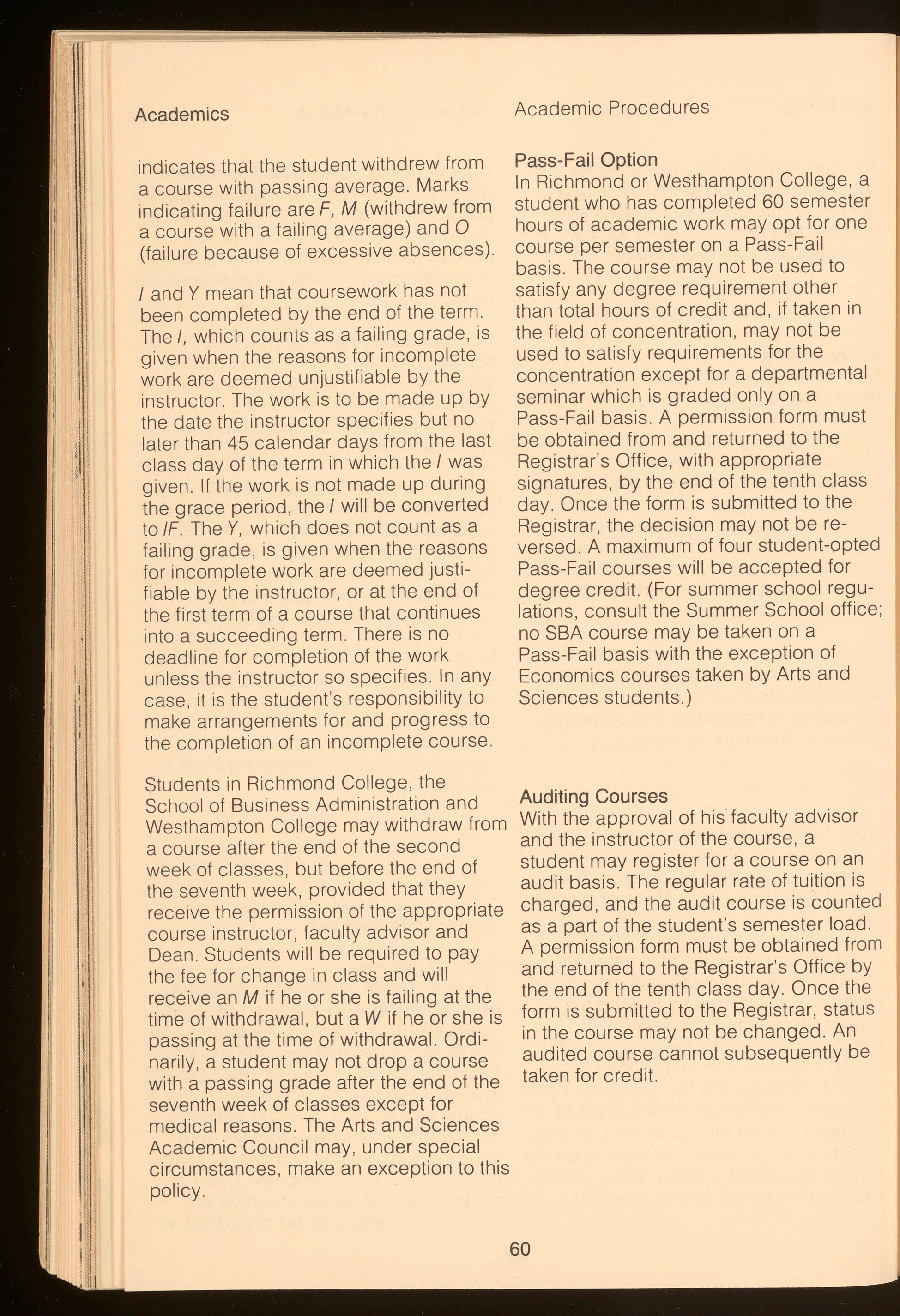
rindicates that the student withdrew from a course with passing average. Marks indicating failure are F, M (withdrew from a course with a failing average) and 0 (failure because of excessive absences).
/ and Y mean that coursework has not been completed by the end of the term. The/, which counts as a failing grade, is given when the reasons for incomplete work are deemed unjustifiable by the instructor. The work is to be made up by the date the instructor specifies but no later than 45 calendar days from the last class day of the term in which the/ was given. If the work is not made up during the grace period, the/ will be converted to IF. The Y, which does not count as a failing grade, is given when the reasons for incomplete work are deemed justifiable by the instructor, or at the end of the first term of a course that continues into a succeeding term. There is no deadline for completion of the work unless the instructor so specifies. In any case, it is the student's responsibility to make arrangements for and progress to the completion of an incomplete course.
Students in Richmond College, the School of Business Administration and Westhampton College may withdraw from a course after the end of the second week of classes, but before the end of the seventh week, provided that they receive the permission of the appropriate course instructor, faculty advisor and Dean. Students will be required to pay the fee for change in class and will receive an M if he or she is failing at the time of withdrawal, but a W if he or she is passing at the time of withdrawal. Ordinarily, a student may not drop a course with a passing grade after the end of the seventh week of classes except for medical reasons. The Arts and Sciences Academic Council may, under special circumstances, make an exception to this policy.
Academic Procedures
Pass-Fail Option
In Richmond or Westhampton College, a student who has completed 60 semester hours of academic work may opt for one course per semester on a Pass-Fail basis. The course may not be used to satisfy any degree requirement other than total hours of credit and, if taken in the field of concentration, may not be used to satisfy requirements for the concentration except for a departmental seminar which is graded only on a Pass-Fail basis. A permission form must be obtained from and returned to the Registrar's Office, with appropriate signatures, by the end of the tenth class day. Once the form is submitted to the Registrar, the decision may not be reversed. A maximum of four student-opted Pass-Fail courses will be accepted for degree credit . (For summer school regulations, consult the Summer School office; no SBA course may be taken on a Pass-Fail basis with the exception of Economics courses taken by Arts and Sciences students.)
AuditingCourses
With the approval of his faculty advisor and the instructor of the course, a student may register for a course on an audit basis. The regular rate of tuition is charged, and the audit course is counted as a part of the student's semester load. A permission form must be obtained from and returned to the Registrar's Office by the end of the tenth class day. Once the form is submitted to the Registrar, status in the course may not be changed. An audited course cannot subsequently be taken for credit.
Academics
Examinations
Most classes have examinations at the close of the first and second semesters, according to a schedule which shall be published each semester .
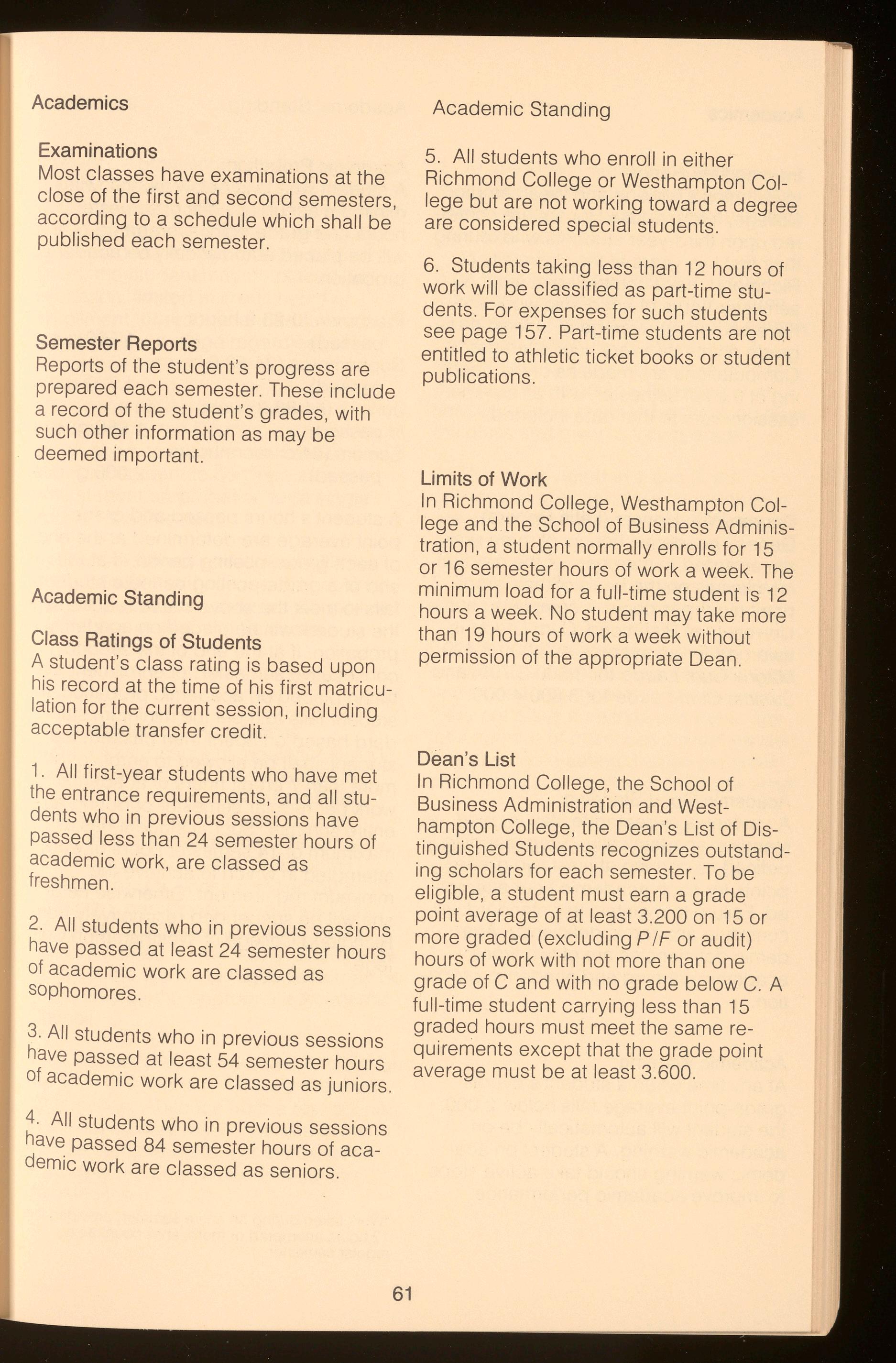
Semester Reports
Reports of the student's progress are prepared each semester . These include a record of the student's grades, with such other information as may be deemed important.
AcademicStanding
Class Ratings of Students
A student's class rating is based upon his record at the time of his first matriculation for the current session, including acceptable transfer credit.
1. All first-year students who have met the entrance requirements, and all students who in previous sessions have passed less than 24 semester hours of acade mic work, are classed as freshmen.
2. All students who in previous sessions have passed at least 24 semester hours of academic work are classed as sophomores .
3. All students who in previous sessions have passed at least 54 semester hours of academic work are classed as juniors.
4. All students who in previous sessions have passed 84 semester hours of academic work are classed as seniors.
Academic Stand ing
5. All students who enroll in either Richmond College or Westhampton College but are not working toward a degree are considered special students.
6. Students taking less than 12 hours of work will be class ified as part-time students. For expenses for such students see page 157. Part-time students are not entitled to athletic ticket books or student publications.
Limitsof Work
In Richmond College, Westhampton College and the School of Business Administration, a student normally enrolls for 15 or 16 semester hours of work a week. The minimum load for a full-time student is 12 hours a week. No student may take more than 19 hours of work a week without permission of the appropriate Dean.
Dean's List
In Richmond College, the School of Business Administration and Westhampton College, the Dean's List of Distinguished Students recognizes outstanding scholars for each semester. To be eligible, a student must earn a grade point average of at least 3.200 on 15 or more graded (excluding P I F or audit) hours of work with not more than one grade of C and with no grade below C. A full-time student carrying less than 15 graded hours must meet the same requirements except that the grade point average must be at least 3 .600.
Intermediate Honors
In Richmond College and Westhampton College, Intermediate Honors are conferred upon third-year students who, during their first two years at the University of Richmond, have completed at least 60 semester hours of academic work and have earned an average of at least three grade points for every hour attempted. Computations are made as of the opening of the fall semester, with all summer session work to that date included.
Degree With Honors (Latin Honors)
General academic honors of three ranks are awarded to members of the graduating classes on the basis of their grade point averages on work completed at the University of Richmond. Cum Laude is awarded for an average of 3.200-3.499 , Magna Cum Laude for 3 .500-3.799, and Summa Cum Laude for 3.800-4.000.
Academic Good Standing
A student is expected to stay in good standing academically. Good standing is defined as earning at least two grade points for each academic hour attempted. Failure to maintain this standard will constitute academic deficiency. Academic deficiencies are of two types: academic warning and academic probation.
Academic Warning
At any time when a student's overall grade-point average falls below 2.000, the student will automatically be on academic warning. A student on academic warning should take active steps to improve academic performance.
Academic Standing
Academic Probation
A student who falls below the following minimum accumulations of semester hours and grade point average (g. p.a.) will be placed automatically on academic probation:
Freshmen (0-23.9 hours passed)
Sophomores (24-53.9 hours passed)
Juniors (54-83.9 hours passed)
1.500 g.p.a
1.700 g.p.a .
1.850 g. p. a
Seniors (84 or more hours passed) 2.000 g. p. a
A student's hours passed and gradepoint average are determined at the end of each grade-posting period. If at the end of a grade-posting period a student fails to meet the above stated requirement , the student will be placed on academic probation. If at the end of the second consecutive semester* of enrollment after being placed on academic probation, the student fails to meet the minimum standard based on hours then passed, the student shall be allowed to enroll for no more than 7 credit hours of academic work per regular semester or during an entire summer. Such a student has a maximum of 14 semester hours of work attempted in which to achieve the minimum requirement. Otherwise he or she will be suspended respectively from Richmond College or Westhampton College.

*Work taken during an entire summer, provided it is 12 hours attempted or more, shall count as a regular semester.
The above provisions notwithstanding, at t he end of any semester if a student's record reveals such significant deterioration in performance that extraordinary action is deemed appropriate by the Dean , the student may be placed on p robation, limited in credit hours of enrollment, or recommended for suspension from the college regardless of g rade-point average.
The above provisions further notwithstanding, the Dean, in circumstances which seem to warrant such action, may allow the student to continue as a fulltime student on probation for a single additional semester.
A p peals of rulings associated with the administration of these regulations shall be directed to the Academic Council of the Faculty of Arts and Sciences.
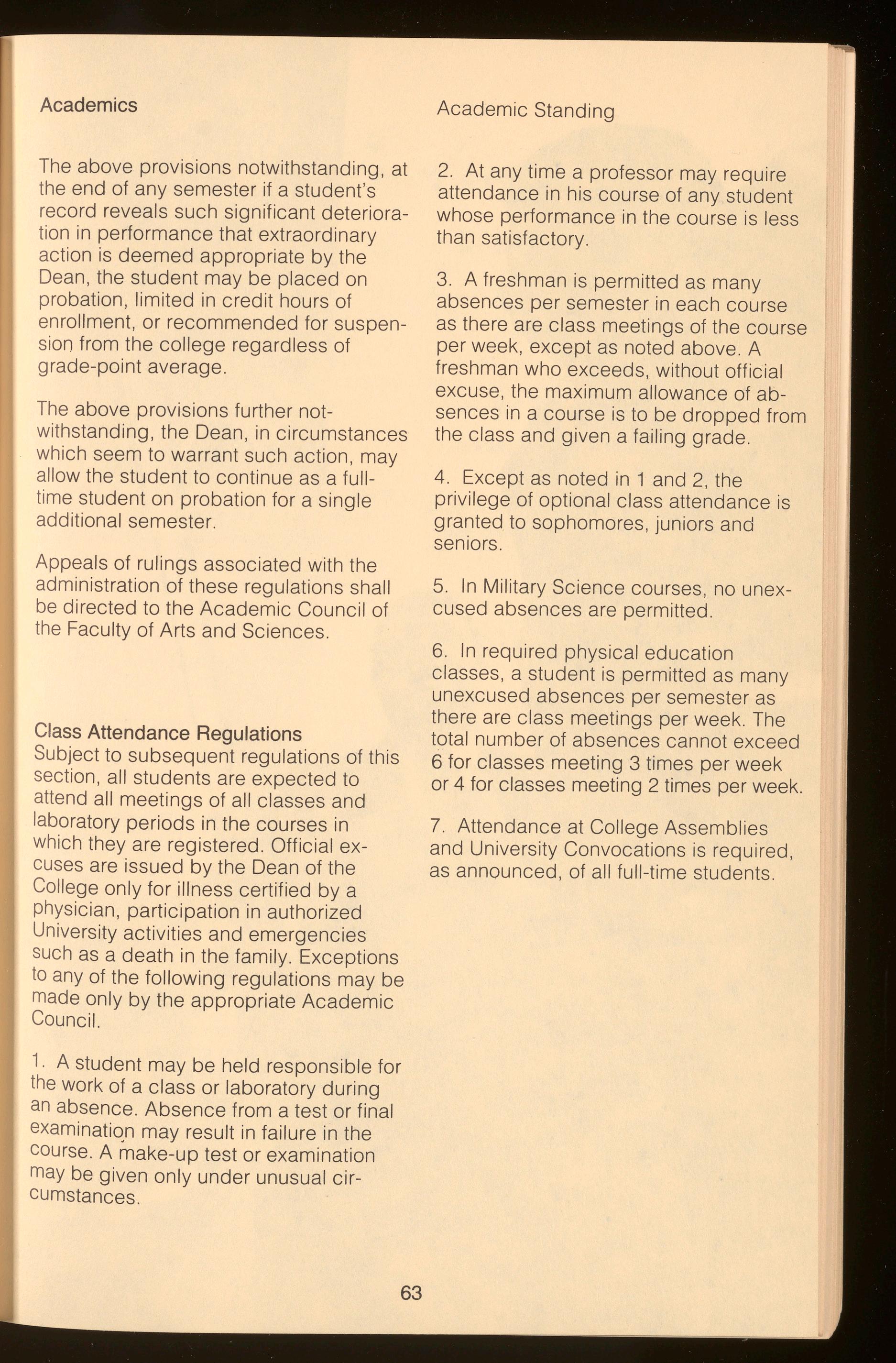
Class Attendance Regulations
Subject to subsequent regulations of this section , all students are expected to attend all meetings of all classes and laboratory periods in the courses in which they are registered. Official excuses are issued by the Dean of the College only for illness certified by a physician , participation in authorized University activities and emergencies such as a death in the family . Exceptions to any of the following regulations may be made only by the appropriate Academic Council.
1. A student may be held responsible for the work of a class or laboratory during an absence. Absence from a test or final examinatiqn may result in failure in the course. A make-up test or examination may be given only under unusual circ umstances.
Academic Standing
2. At any time a professor may require attendance in his course of any student whose performance in the course is less than satisfactory.
3 A freshman is permitted as many absences per semester in each course as there are class meetings of the course per week , except as noted above. A freshman who exceeds , without official excuse, the maximum allowance of absences in a course is to be dropped from the class and given a failing grade .
4. Except as noted in 1 and 2 , the privilege of optional class attendance is granted to sophomores, juniors and seniors .
5. In Military Science courses , no unexcused absences are permitted.
6. In required physical education classes , a student is permitted as many unexcused absences per semester as there are class meetings per week. The total number of absences cannot exceed 6 for classes meeting 3 times per week or 4 for classes meeting 2 times per week.
7. Attendance at College Assemblies and University Convocations is required, as announced , of all full-time students .
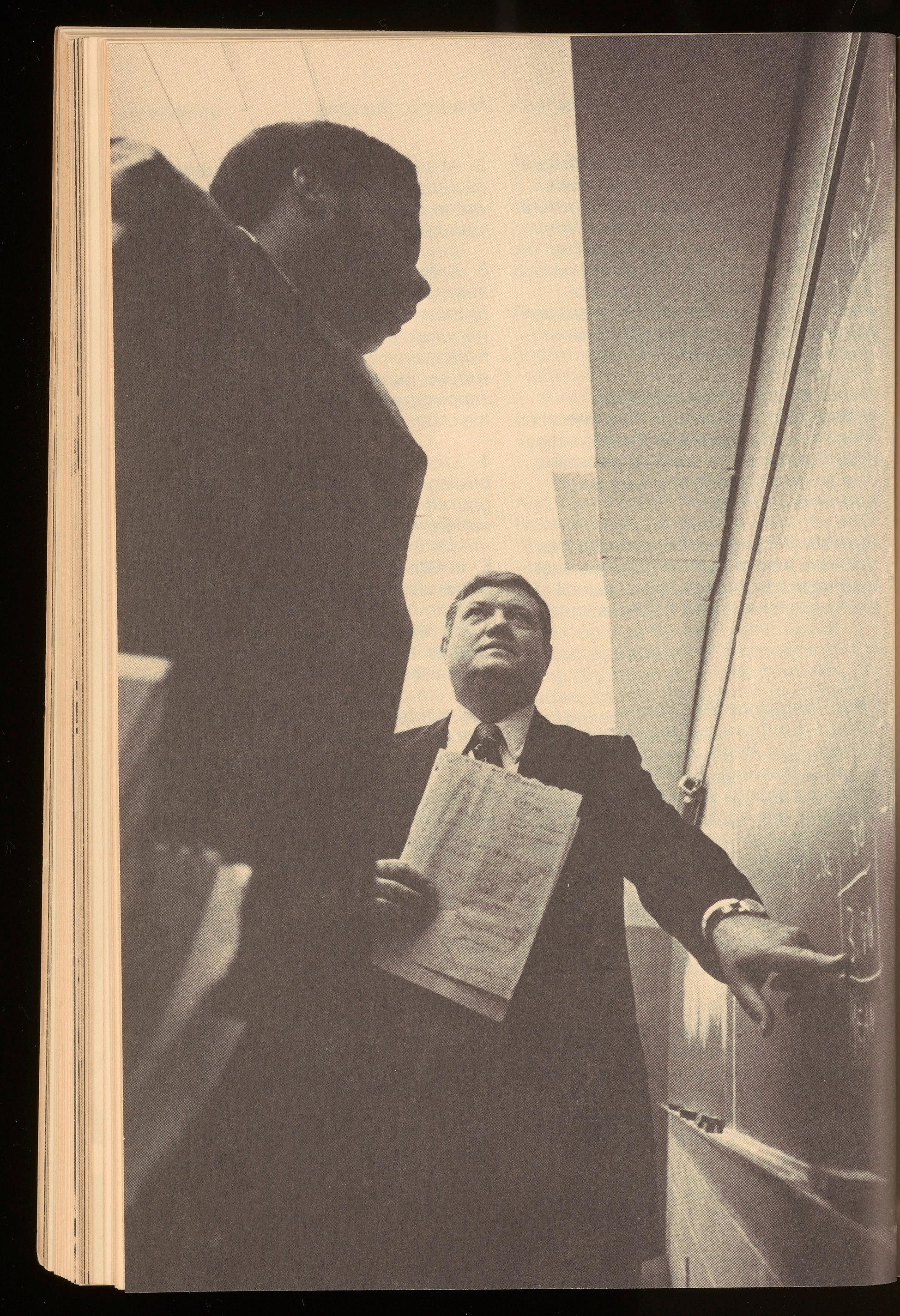
1~1{/4
Courses enclosed in brackets [ ] will not be offered in 1979-80, and the right is reserved to withdraw any course for due ca use. The numbers in parentheses following course titles indicate semester hours of credit. Where a two-semester co urse is followed by numbers separated by a hyphen, either half of the course may be taken independently for credit and in any order unless a prerequisite is stated. Where a two-semester course is followed by one number, both semesters of the course must be taken to receive cred it toward graduation.
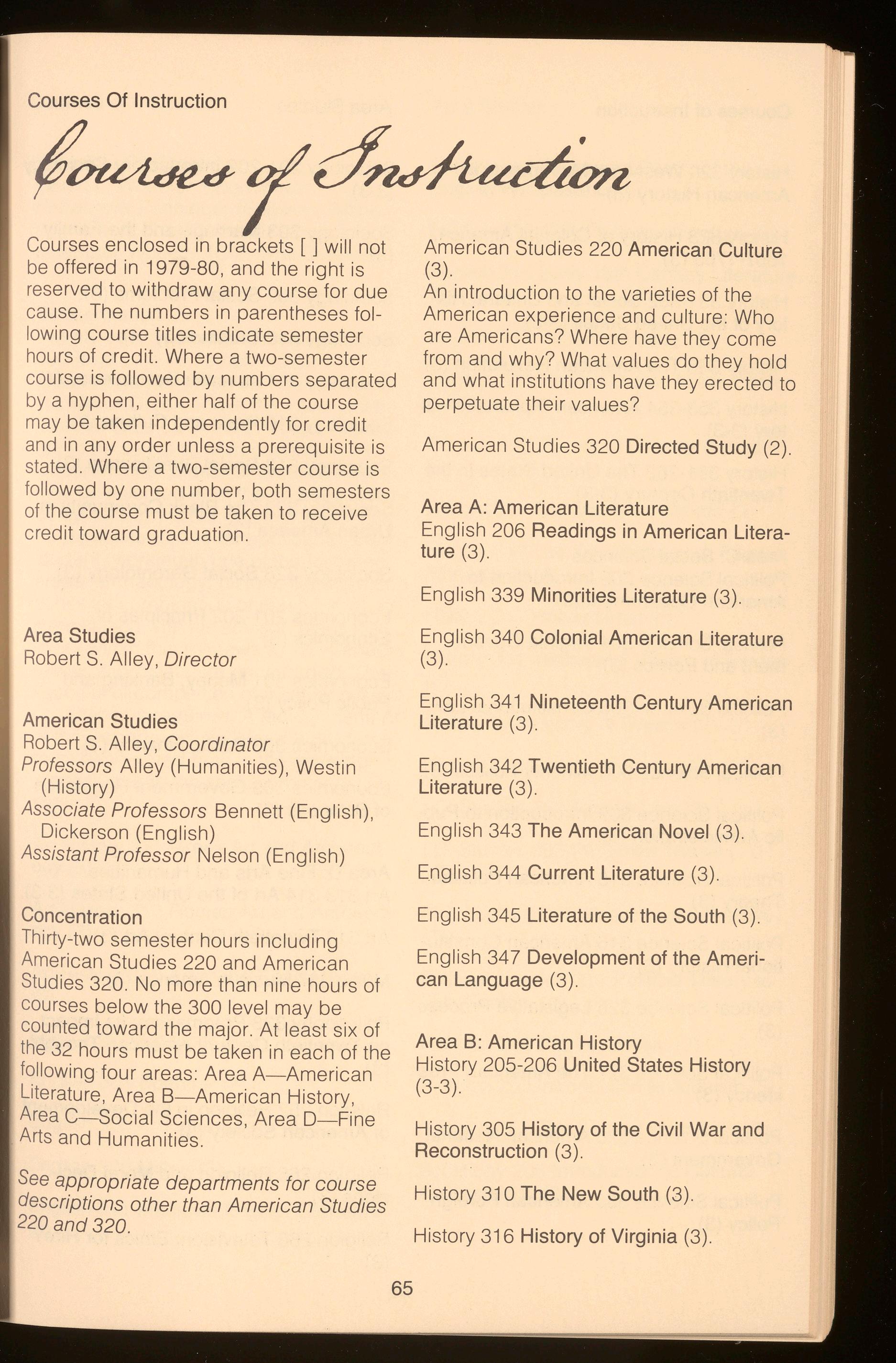
Area Studies
Robert S Alley, Director
AmericanStudies
Robert S. Alley, Coordinator Professors Alley (Humanities), Westin (History)
Associate Professors Bennett (English), Dickerson (English)
Assistant Professor Nelson (English)
Concentration
Thirty-two semester hours including American Studies 220 and American Studies 320. No more than nine hours of courses below the 300 level may be counted toward the major. At least six of the 32 hours must be taken in each of the following four areas: Area A-American Literature, Area B-American History, Area C-Social Sciences, Area D-Fine Arts and Humanities.
See appropriate departments for course descriptions other than American Studies 220 and 320.
American Studies 220 American Culture (3).
An introduction to the varieties of the American experience and culture: Who are Americans? Where have they come from and why? What values do they hold and what institutions have they erected to perpetuate their values?
American Studies 320 Directed Study (2).
Area A: American Literature
English 206 Readings in American Literature (3)
English 339 MinoritiesLiterature(3)
English 340 Colonial American Literature (3).
English 341 Nineteenth Century American Literature(3).
English 342 Twentieth Century American Literature(3).
English 343 The American Novel (3).
English 344 Current Literature(3).
English 345 Literatureof the South (3).
English 347 Development of the American Language (3).
Area B: American History
History 205-206 United States History (3-3).
History 305 History of the Civil War and Reconstruction(3).
History 310 The New South (3).
History 316 History of Virginia (3).

Courses of Instruction
History 320 Westward Movements in American History (3).
History 323 Historyof ColonialAmerica, 1607-1763 (3) .
History 331-332 Social and Cultural History of the United States (3-3).
History 336 The American Revolution(3)
History 353-354 American DiplomaticHistory (3-3).
History 361-362 The United States in the Twentieth Century (3-3).
Area C: Social Sciences
Political Science 205 Introductionto AmericanGovernment (3) .
Political Science 304 VirginiaGovernment and Politics(3)
Political Science 305 ConstitutionalLaw (3).
Political Science 308 MinorityPolitics(3).
Political Science 309 Introductionto Public Administration(3).
Political Science 315 American Political Theory (3).
Political Science 316 American Constitutional History(3).
Political Science 326 LegislativeProcess (3).
Political Science 327 The American Presidency (3) .
Political Science 328 American National Government(3).
Political Science 350 American Foreign Policy (3).
Area Studies
Sociology 201-202 IntroductorySociology (3-3) .
Sociology 303 Marriage and the Family (3)
Sociology 309 Social Problems (3).
Sociology 310 Criminology(4).
Sociology 311 Juvenile Delinquency(4) .
Sociology 316 Race and Culture (3).
Sociology 318 Social Stratification(3).
Sociology 323 The Black Communityin Urban America (3).
Sociology 328 Social Gerontology(3).
Economics 201-202 Principlesof Economics(6)
Economics 301 Money, Banking and Public Policy (3) .
Economics 303 Public Finance (3) .
Economics 309 Government Regulation of Business(3).
Area D: Fine Arts and Humanities
Art 313-314 Art of the United States (3-3 ).
Art 318 Twentieth Century Art (3).
Music 337 Music in America (3).
Philosophy 338 Pragmatism:Its Impact on Twentieth Century American Thought (3) .
Religion 252 Religion in the Development of American Society (3).
Religion 265 Religion and Moral Decisions (3)
Religion 266 Television: Ethicsfor Hire? (3).
Coursesof Instruction
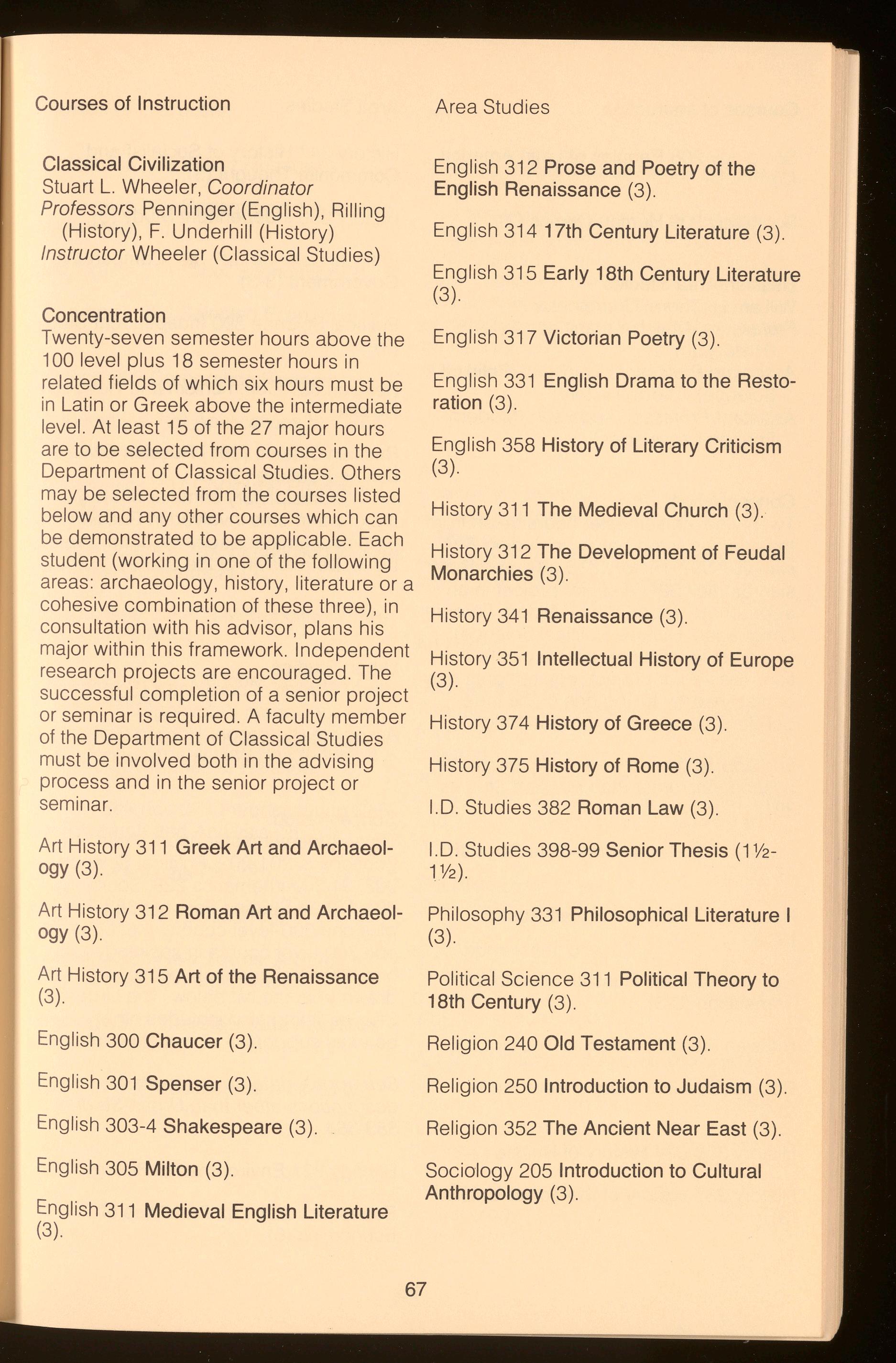
ClassicalCivilization
Stuart L. Wheeler, Coordinator
Professors Penninger (English), Rilling (History) , F Underhill (History)
Instructor Wheeler (Classical Studies)
Concentration
Twenty-seven semester hours above the 100 level plus 18 semester hours in related fields of which six hours must be in Latin or Greek above the intermediate level. At least 15 of the 27 major hours a re to be selected from courses in the Department of Classical Studies. Others may be selected from the courses listed b elow and any other courses which can b e demonstrated to be applicable Each student (working in one of the following areas: archaeology, history , literature or a c ohesive combination of these three) , in co nsultation with his advisor, plans his major within this framework. Independent research projects are encouraged The suc cessful completion of a senior project or seminar is required. A faculty member of the Department of Classical Studies must be involved both in the advising process and in the senior project or se minar .
Art History 311 Greek Art and Archaeology (3) .
Art History 312 Roman Art and Archaeology (3)
Art History 315 Art of the Renaissance (3).
English 300 Chaucer (3).
English 301 Spenser (3).
English 303-4 Shakespeare (3).
English 305 Milton (3).
English 311 Medieval EnglishLiterature (3) .
Area Studies
English 312 Prose and Poetry of the EnglishRenaissance (3).
English 314 17th Century Literature(3).
English 315 Early 18th Century Literature (3).
English 317 Victorian Poetry (3)
English 331 EnglishDrama to the Restoration (3).
English 358 Historyof LiteraryCriticism (3)
History 311 The Medieval Church (3)
History 312 The Developmentof Feudal Monarchies(3).
History 341 Renaissance (3).
History 351 IntellectualHistoryof Europe (3).
History 374 Historyof Greece (3).
History 375 Historyof Rome (3).
I.D . Studies 382 Roman Law (3).
I.D . Studies 398-99 Senior Thesis (1 ½1 ½)
Philosophy 331 PhilosophicalLiterature I (3) .
Political Science 311 PoliticalTheory to 18th Century (3)
Religion 240 Old Testament (3).
Religion 250 Introductionto Judaism (3)
Religion 352 The Ancient Near East (3).
Sociology 205 Introductionto Cultural Anthropology(3).
Courses of Instruction
Sociology 208 Peoples of Latin America (3).
Sociology 209 Human Origins (3).
Russian Area Studies
William H. Thorn, Coordinator
Professors Alley (Humanities) , Ryle (History)
Associate Professors Gunlicks (Political Science) , Thorn (History)
Assistant Professor Anderson (Modern Foreign Languages)
Concentration
Twenty-seven semester hours taken from the courses listed below , including Russian 201-202, History 333-334 , and Russian Studies 381; a senior project in an appropriate department (Modern Foreign Languages, History , Political Science) ; and a senior comprehensive examination . The senior project requirements may be satisfied by taking one of the independent study offerings listed below.
See appropriate departments for course descriptions other than Russian Studies 381.
Russian 103-104 Intermediate Russian (3-3) .
Russian 201-202 Advanced Russian (3-3)
Russian 325-326 Russian Literature in Translation (3-3).
Russian 327-328 Selected Topics (3-3).
Russian 395-396 Independent Study (3-3).
History 333-334 Historyof Russia (3-3).
History 337 History of the Soviet Union (3).
Area Studies
History 34 7 History of Socialistand CommunistThought (3).
History 390 Independent Study (3)
Political Science 321-322 Comparative Government (3-3)
Political Science 390 Independent Study (3)
Religion 357 Communism and Religion in Russia (3).
Russian Studies [381] Russian Civilization and Culture (3).
An interdisciplinary seminar offered by the departments involved in Russian Are a Studies: seminar paper required. Prerequisite: permission of the course director

Urban Studies
Henry Stewart, Coordinator (Sociology) Professor Sartain (Sociology)
Associate Professors Horgan (Political Science) and Whitaker (Economics)
Concentration
Thirty-three semester hours including Economics 201-202 , Political Science 303 , 310, Mathematics 229, Sociology 301 , Urban Studies Seminar 383-384 , plus one 300 - level course in economics , one 300-level course in sociology and one 300-level course in political science drawn from the list below. The Urban Studies listing also includes other courses supportive of this concentratio n
See appropriate departments for course descriptions other than Urban Studies 383-384.
Biology 221 EnvironmentalBiology (3).
Economics 201-202 Principlesof Economics(6).
Coursesof Instruction
Economics 303 Public Finance (3).
Economics 309 Government Regulation of Business(3).
Economics 314 Labor Economics(3).
Economics 320 Selected Economic Topics(3).
Finance 365 CorporationFinance (3).
Mathematics 229 Applicationsof Statistics (3).
Mathematics 297 Computer Programming I (3).
Art
383-384 Urban Studies Senior Seminar (3-3). '
This two-semester seminar is designed to integrate the Urban Studies Program. Such topics as transportation, housing, public services , the future of urban areas, and architecture would be studied. Important aspects of these seminars would be field experiences , internships , and guest lectures.

Art
Charles W. Johnson, Chairman Associate Professors Johnson, Mavroudis
Political Science 207 Introductionto State Assistant Professor J . B. Campbell and Local Government (3). Instructors Frederick, McWilliams
Political Science 303 MetropolitanProblems and Politics(3).
Political Science 309 Introductionto PublicAdministration(3) .
Political Science 31 O PublicAdministration: IntergovernmentalRelations (3).
Political Science 371 Introductionto Political Research and Analysis (3).
Soc iology 301 The City (3)
Sociology 315 Population(3)
Sociology 320 New Towns: A Study of EnvironmentalManagement (3).
Sociology 323 The Black Communityin Urban America (3).
Soc iology 325 SociologicalMethod (3).
Art History
Concentrationin Art History
Twenty-eight semester hours , including Art History 221-222, 315,316,317,318, 365 and five semester hours of applied art; three semester hours from the following courses: 311,312,313 , 314,360 , 366 and 373. In related fields, 18 semester hours
373 Philosophyof Art (3). (See Philosophy 373.)
212 Appreciationof Art (3).
An introduction to the arts designed to broaden the background of freshman and sophomore students
221-222 Historyand Appreciationof Art (3-3) . .
A survey of Western art from prehistoric times to the present designed for the general student and the art major.
311-312 Greek and Roman Art and Archaeology(3-3) (See Classics 301-302 .)
Courses of Instruction
313-314 Art of the United States (3-3).
North American art from colonial beginnings. Folk art and crafts, regionalism, romanticism, social protest and surrealism plus forms from 1945 to now.
315 Art of the Renaissance (3). Italian and Northern Renaissance art.
316 Mannerismand the Baroque (3). European art of the sixteenth and seventeenth centuries.
317 Nineteenth Century Art (3).
Major art trends during the nineteenth century.
318 Twentieth Century Art (3).
Major movements and developments on the Continent and in America are analyzed through current United States trends.
[319] Crosscurrentsin MediterraneanArt and Archaeology(3).
(See Classics 303.)
320 Seminar in ContemporaryArt (3).
A study of major developments in contemporary art from 1945 to the present. Prerequisites: Art 221-222, Art 212, or permission of the instructor .
360 Historyand Aestheticsof Film (3).
(See English 360.)
365 Thesis (2).
Required tor majors in their senior year.
366 Film Studies (3) . (See English 366 )
395A-396A IndependentStudy (1-1 ).
Art
395C-396C Independent Study (3-3). An individually designed program under faculty supervision. Prerequisite: prior approval of the Department.
StudioArt
Concentrationin Studio Art
Thirty semester hours , including 24 semester hours in Studio Art and six semester hours in Art 221-222; in addition , 18 semester hours in related fields
Any 300-level Art History course will count toward related field concentration in Studio Art.
101-102 Elementary Drawing (2-2). Drawing in various media from the living model, landscape , still lite ; composition Four studio hours a week.
103-104 Introductionto Sculpture (3-3) Theory and principles of threedimensional design. Experimentation in various media. Six studio hours a week
105-106 Introductionto Painting (3-3). Techniques of oil and acrylic painting. Four studio hours a week
107-108 Crafts (3-3).
Through individual projects that can be adapted to classroom situations , students explore a variety of twodimensional and three-dimensional media chosen from fabric design, banners , leather tooling, Egyptian paste jewelry , jewelry casting, porcelain, slipcasting, wood-turning forms , enamellin g and batik.
An individually designed program under faculty supervision. Prerequisite: prior approval of the Department.
395B-396B IndependentStudy (2-2).
An individually designed program under faculty supervision. Prerequisite: prior approval of the Department.
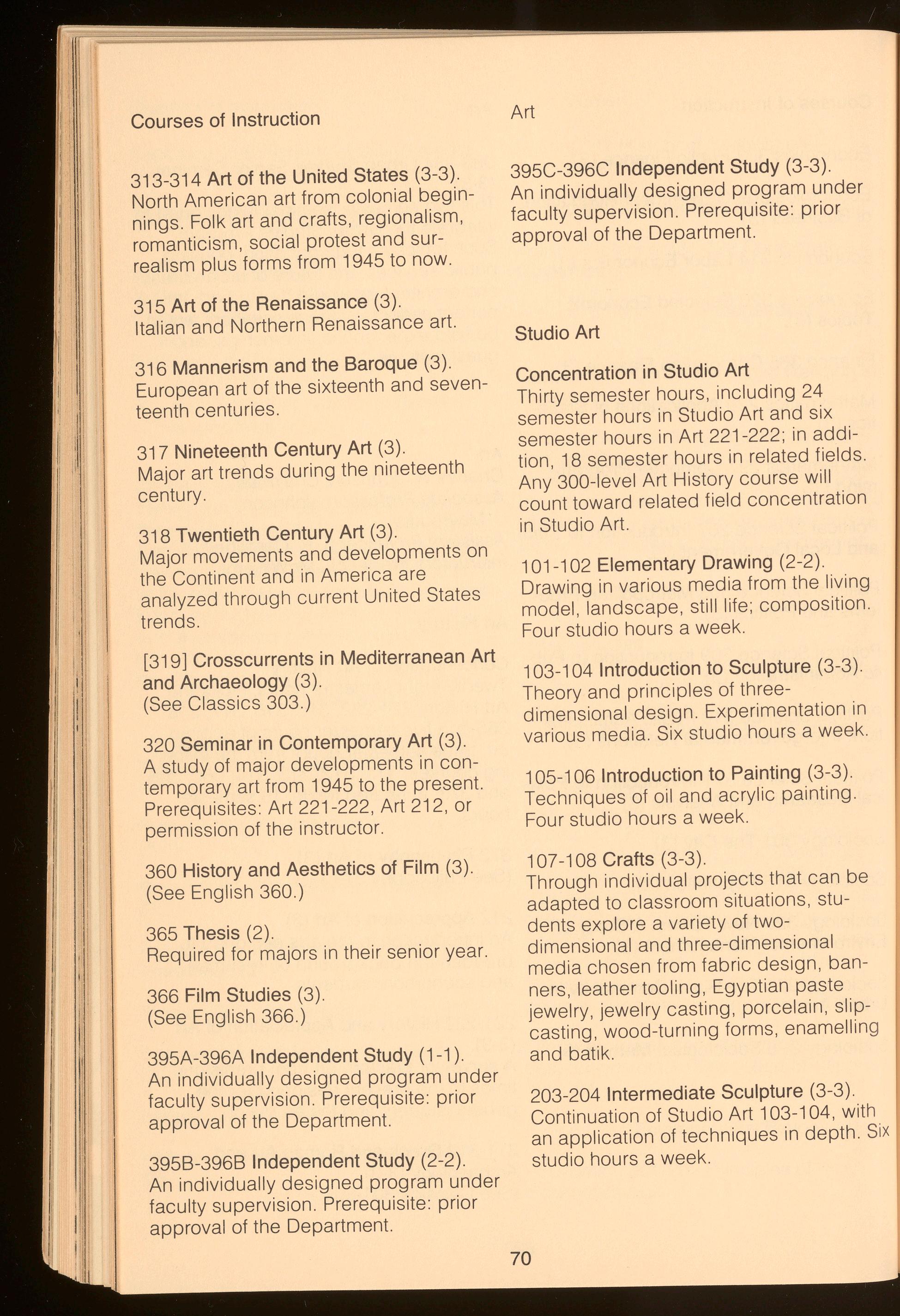
203-204 Intermediate Sculpture (3-3). Continuation of Studio Art 103-104, with an application of techniques in depth. Six studio hours a week.
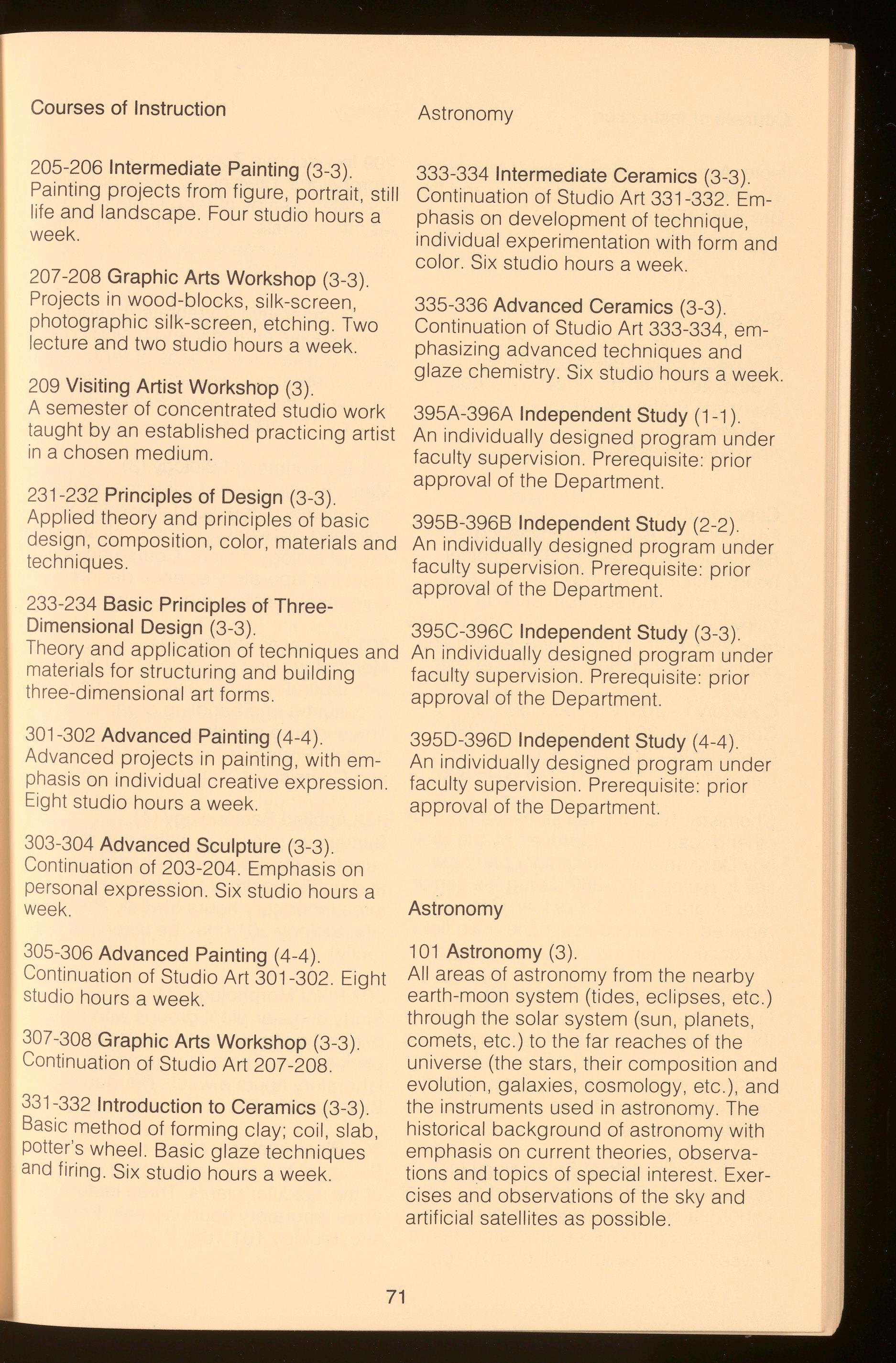
Courses of Instruction
205-206 Intermediate Painting (3-3) . Painting projects from figure, portrait, still life and landscape. Four studio hours a week.
207-208 Graphic Arts Workshop (3-3). Projects in wood-blocks , silk-screen , photographic silk-screen , etching. Two lecture and two studio hours a week .
209 VisitingArtist Workshop (3) . A semester of concentrated studio work taught by an established practicing artist in a chosen medium
231-232 Principlesof Design (3-3) App lied theory and principles of basic des ign , composition , color, materials and tec hniques.
233-234 Basic Principlesof ThreeDimensional Design (3-3) . Theory and application of techniques and materials for structuring and building three-dimensional art forms.
301-302 Advanced Painting (4-4 ) . Adva nce d projects in painting , with emphasis on individual creative e x pre ssion Eight studio hours a week
303-304 Advanced Sculpture (3-3). Continuation of 203-204. Emphasis on personal ex pression Six studio hours a week.
305-306 Advanced Painting (4-4 ). Continuation of Studio Art 301-302. Eight studio hours a week
307-308 Graphic Arts Workshop (3-3). Continuation of Studio Art 207-208
331-332 Introductionto Ceramics (3-3)
Basic method of forming clay; coil, slab , potter's wheel. Basic glaze techniques and firing Six studio hours a week.
Astronomy
333-334 Intermediate Ceramics (3-3).
Continuation of Studio Art 331-332. Emphasis on development of technique , individual experimentation with form and color . Six studio hours a week.
335-336 Advanced Ceramics (3-3).
Continuation of Studio Art 333-334 , emphasizing advanced techniques and glaze chemistry. Six studio hours a week.
395A-396A Independent Study (1-1 )
An individually designed program under faculty supervision Prerequisite : prior approval of the Department.
3956-396B Independent Study (2-2)
An individually designed program under faculty supervision. Prerequisite : prior appro v al of the Department .
395C-396C Independent Study (3-3) . An individually designed program under faculty supervision. Prerequis ite : prior approval of the Department.
395D-396D IndependentStudy (4-4 )
An individually designed program under facult y super v is ion Prerequi s ite: prior appro v al of th e Department.
Astronomy
101 Astronomy(3)
All areas of astronomy from the nearby earth-moon system (tides , eclipses, etc ) through the solar system (sun , planets , comets, etc .) to the far reaches of the universe (the stars , their composition and evolution , gala xies , cosmology , etc.) , and the instruments used in astronomy. The historical background of astronomy with emphasis on current theories , observations and topics of special interest. Exercises and observations of the sky and artificial satellites as possible.
Courses of Instruction
Note: Astronomy Workshops for teachers are offered by University College and the Graduate School.
Biology
209 InvertebrateZoology (4)
Morphology, physiology, development and relationships of representative invertebrate animals. Three lecture and three laboratory hours a week. Prerequisite: Biology 101-102.
Biology
Warwick R. West Jr., Chairman
Professors F. B Leftwich, Reams, Strickland, Tenney, West, Woolcott
Associate Professors Bishop, Decker , Towle
Assistant Professor Platt
Concentration
For either the Bachelor of Science or Bachelor of Arts degree, 32 semester hours, including Biology 101-102 and one or more courses from each of the following four categories , with one course from 207, 209, 210, 312 or 328, and one course from 303, 305, 306,310 or 3~6;
Category 1-209, 210, 303, 305, 311
Category 11-301, 321, 336, 337, 339
Category 111-306, 328 , 330, 335, 338
Category IV-207, 310,312,314,326
210 ComparativeVertebrate Anatomy (4). Comparative anatomy and biology of the several systems of organs of representative vertebrates. Two lecture and four laboratory hours a week. Prerequisite: Biology 101-102.
221 EnvironmentalBiology(3).
Man's position in and influence on the ecosystems of the world viewed biologically 9nd physically. Open to all student s except biology majors. Course does not meet the laboratory science degree requirement; elective credit only.
301 Biologyof Bacteria (4).
Morphology and physiology of bacteria , with laboratory emphasis on techniques of culturing and handling organisms . Three lecture and three laboratory hours a week. Prerequisites: Biology 101-102 and Chemistry 103-104.
Chemistry 103-104; ten semester hours in other departments approved by the Biology Department; satisfactory participation in Biology 361-362 during the senior year. A grade of not less than C is required in each course in the main field of concentration.
101-102 Principlesof Biology(8).
Fundamental principles of biology and their application to man. Designed tor the nonscience major and as an introduction tor the student of science. Three lecture and two laboratory hours a week. 101 is prerequisite to 102 .
207 Fundamentalsof Entomology(4).
Basic insect biology and a brief survey of important orders and families of insects. Three lecture and three laboratory hours a week. Prerequisite: Biology 101-102.
302 Applied Bacteriology(4).
Bacteria in relation to water and milk supplies, food preservation and personal and public health. Three lecture and three laboratory hours a week. Prerequisite: Biology 301 (may be taken concurrently).
303 Plant Morphology(4).
Study of major plant groups with emphasis on structures, life histories and phylogenies. Three lecture and three laboratory hours a week. Prerequisite: Biology 101-102.
305 Plant Anatomy (4).
Survey of the major vegetative structures of the vascular plants. Three lecture and three laboratory hours a week . Prerequisite: Biology 101-102.

Courses of Instruction
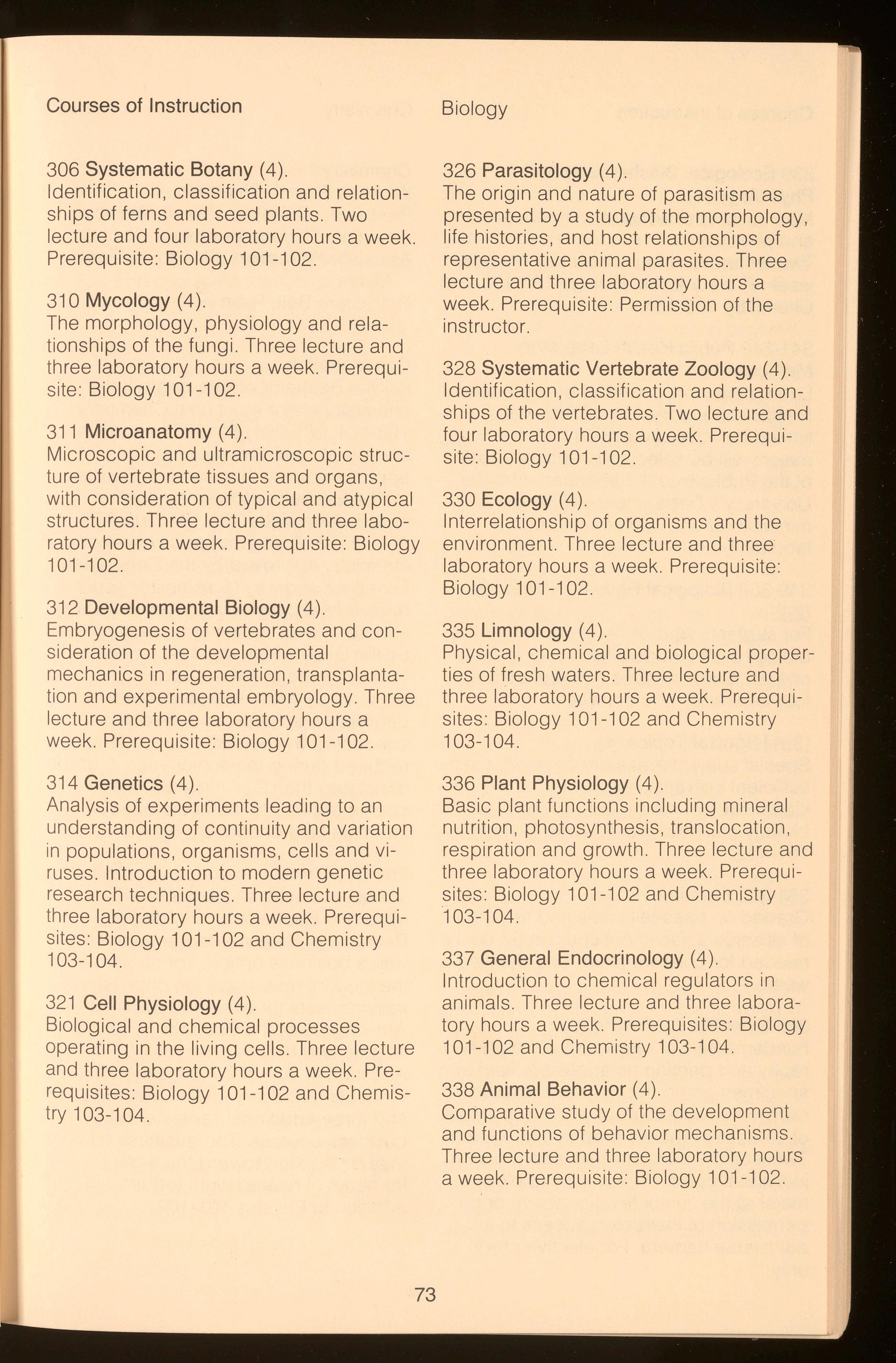
306 Systematic Botany (4).
Identification, classification and relationships of ferns and seed plants. Two lecture and four laboratory hours a week. Prerequisite: Biology 101-102.
310 Mycology (4).
The morphology, physiology and relationships of the fungi. Three lecture and three laboratory hours a week. Prerequisite: Biology 101-102.
311 Microanatomy (4).
Microscopic and ultramicroscopic structure of vertebrate tissues and organs, with consideration of typical and atypical structures. Three lecture and three laboratory hours a week. Prerequisite Biology 101-102.
312 Developmental Biology(4)
Embryogenesis of vertebrates and consideration of the developmental mechanics in regeneration, transplantation and experimental embryology. Three lecture and three laboratory hours a week. Prerequisite: Biology 101-102.
314 Genetics (4).
Analysis of experiments leading to an understanding of continuity and variation in populations , organisms , cells and viruses. Introduction to modern genetic research techniques. Three lecture and t hree laboratory hours a week. Prerequisites: Biology 101-102 and Chemistry 103-104.
321 Cell Physiology(4).
Biological and chemical processes o perating in the living cells. Three lecture and three laboratory hours a week. Prerequisites: Biology 101-102 and Chemistry 103-104.
Biology
326 Parasitology(4).
The origin and nature of parasitism as presented by a study of the morphology, life histories, and host relationships of representative animal parasites. Three lecture and three laboratory hours a week. Prerequisite: Permission of the instructor.
328 Systematic Vertebrate Zoology (4 ).
Identification, classification and relationships of the vertebrates. Two lecture and four laboratory hours a week. Prerequisite Biology 101-102.
330 Ecology (4).
Interrelationship of organisms and the environment. Three lecture and three laboratory hours a week. Prerequisite: Biology 101-102.
335 Limnology(4).
Physical , chemical and biological properties of fresh waters. Three lecture and three laboratory hours a week. Prerequisites: Biology 101-102 and Chemistry 103-104.
336 Plant Physiology(4).
Basic plant functions including mineral nutrition , photosynthesis, translocation , respiration and growth . Three lecture and three laboratory hours a week. Prerequisites: Biology 101-102 and Chemistry 103-104.
337 General Endocrinology(4).
Introduction to chemical regulators in animals. Three lecture and three laboratory hours a week. Prerequisites: Biology 101-102 and Chemistry 103-104.
338 Animal Behavior (4)
Comparative study of the development and functions of behavior mechanisms. Three lecture and three laboratory hours a week. Prerequisite Biology 101-102.

Coursesof
Instruction
339 EcologicalBiochemistryand
Physiology(4) . Mechanisms of adaptation to chemical and physical factors in the environment. Two lecture and four laboratory hours a week. Prerequisites : Biology 101-102 and Chemistry 103-104
341-342 PublicHealth Laboratory
Methods(4-4)
Laboratory work provided by the Public Health Laboratory , City of Richmond. A limited number of qualified biology majors will be selected by the joint staffs of the Public Health Laboratory and the University ' s Department of Biology. A minimum of one conference and 12 laboratory hours a week
349-350 BiologicalResearch Methods (2-2)
For students who, in the judgment of the biology staff , are qualified to undertake original research . One conference and four laboratory hours a week .
[351] Special Topics (4)
Special subject areas are covered when sufficient interest is ex pressed Considers subject matter not covered in other biology courses Prerequisite : Biology 101-102 .
361-362 Seminar (1-1)
Graded on pass-fail basis and required of all seniors Does not count in 32 hours needed for concentration One meeting a week
385 ScientificIllustrating(2).
Fundamentals of black and white photography and printing as applied to field and specimen photography , macrophotography , microphotography and copy work of student - prepared graphs and figures. Two lecture hours a week: laboratory on individual basis . Prerequisite: Biology major at the Junior level or above or by permission of instructor : access to an adjustable camera . For elective credit only .
Chemistry
Chemistry
W Allan Powell, Chairman
Professors Gillespie , Powell, Worsham
Associate Professors Mateer, Topham Assistant Professors Clough, DeToma, Myers
Instructors Bell, Ryan
Concentration
For the Bachelor of Arts degree, the chemistry major must take Chemistry 103-104 , 205-206 , 301, 307 and four additional semester hours in chemistry approved by the Department. Courses for the Bachelor of Science degree include Chemistry 103-104, 205-206 , 301 , 309-310 and four additional hours in chemistry approved by the Department. For either degree, 16 semester hours in related fields , including Physics 101-102 and additional semester hours approved by the Department must be completed Two full years of either biology or physics are strongly recommended For either degree , participation in a weekly seminar conducted by the staff and students is required during the senior year . A grade of not less than C is required in each course appl ied to the hours needed in the main field of concentration
The Department , in cooperation with the School of Business Administration , offers either the Bachelor of Arts degree or the Bachelor of Science degree in chemistry with a business option. For this program , the student must meet the chemistry requirements for either the Bachelor of Arts degree or the Bachelor of Science degree and take Economics 201-202 , Accounting 301-302, Marketing 321, Management Systems 341, Finance 365 and three additional semester hours in business courses . The business course s may be applied toward the eight semester hours of related work required in addition to Physics 101-102
Courses of Instruction

If students are to be certified by the Chemistry Department for meeting the minimum requirements for professional training of chemists, they must meet the requirements for the Bachelor of Science degree and complete the following courses: Chemistry 302, 319, and 325; two years of German, French or Russian (evidence of a reading knowledge of scientific German, French or Russian is acceptable). Two years of another of the three foreign languages are advised. Economics 201-202, Mathematics 253 and Mathematics 303 are recommended.
103-104 Fundamentals of Chemistry (8).
Principles of chemistry, including atomic and molecular structure, chemical bonding, the periodic table, the states of matter, reaction rates, chemical equilibria, electrochemistry and energy relationships. A systematic study of the families of elements is conducted. Laboratory work includes inorganic qualitative analysis. Designed for science-oriented students but may be taken by other interested persons. It meets the requirement for the chemistry major and serves as a prerequisite for medical, dental or related studies. Three lecture and three laboratory hours a week. Previous knowledge of chemistry is not required. Prerequisites: high school algebra and geometry. 103 is prerequisite to 104.
105-106 Chemistry for Nonscience Majors
(8)
Princip les and concepts of chemistry emphasiz ing their development, their relationship to the cultural environment, mutual influences between science and society and consumer protection methods. Designed for nonscience majors. It will not meet requirements for medical or dental school nor serve as basis for further work in science. Three lecture and three laboratory hours a week. 105 is prerequisite to 106.
Chemistry
205-206
Organic Chemistry (8).
The chemistry of the compounds of carbon, which is fundamental to an understanding of both chemistry and biology. The organic structure, nomenclature, reactions and reaction mechanisms of hydrocarbons are examined in the first semester. A similar study of the organic compounds containing halogens, oxygen, nitrogen and sulfur, including those which form the fundamental building blocks of the macromolecules of living systems, is covered second semester. Three lecture and three laboratory hours a week. Prerequisite : Chemistry 103-104 205 is prerequisite to 206.
301 Analysis I (4).
Survey of the principles, methods and techniques of gravimetric, volumetric, spectrophotometric, fluorometric, atomic absorption and potentiometric analysis. Two lecture and six laboratory hours a week. Prerequisite: Chemistry 103-104.
302 Analysis 11(4).
Principles, methods and techniques of selected instrumental methods of analysis, emphasizing application of instrumental methods, as well as classical methods to qualitative and quantitative analysis of organic compounds. Two lecture and six laboratory hours a week. Prerequisite: Chemistry 205-206 and 301.
307 Physical Chemistryfor the Life Sci-
ences (4).
A study of selected principles of physical chemistry chosen for their applicability to biology and medicine, mathematical preparation as needed, gas laws, chemical thermodynamics, equilibria, electrolytes, electrochemical potentials, rates of chemical reactions, enzymes and macromolecules. An effort is made to choose examples from biological systems for class and laboratory practice. Elementary computer programming is included in laboratory sessions. Three lecture and
Courses
of Instruction
three laboratory hours a week Prerequisites: Chemistry 103-104 and Physics 101-102 (may be taken concurrently).
309-310 Physical Chemistry (8)
Introduction to the principal laws and theories of chemistry - gas laws and kinetic molecular theory , classical and statistical thermodynamics , wa v e mechanics and molecular structure, chemical kinetics The principles and properties of liquids , solids and solutions and phase equilibria are examined along with electrochemistry, catalysis , polymers and computer programming as needed
Three lecture and three laborator y hours a week . Prerequisites : Chemistry 103104, Physics 101-102 and Mathematics 251-252 . 309 is prerequisite to 310.
314 Chemical Bibliography(1 ) .
One lecture hour a week
319 Advanced InorganicChemistry (3).
Physical chemical principles are applied in the stud y of bonding , st ructure , properties and reactions in selected inorganic systems , with emphasis on current literature. Three lecture hours a week Prerequisite : Chemi s tr y 309-310 (ma y be taken concurrentl y with 31 0) .
320A Introductionto Research (2).
Six laboratory hours a week
320B Introductionto Research (3)
Nine laboratory hours a week .
321 -322 Seminar (1-1 ).
One class hour a week .
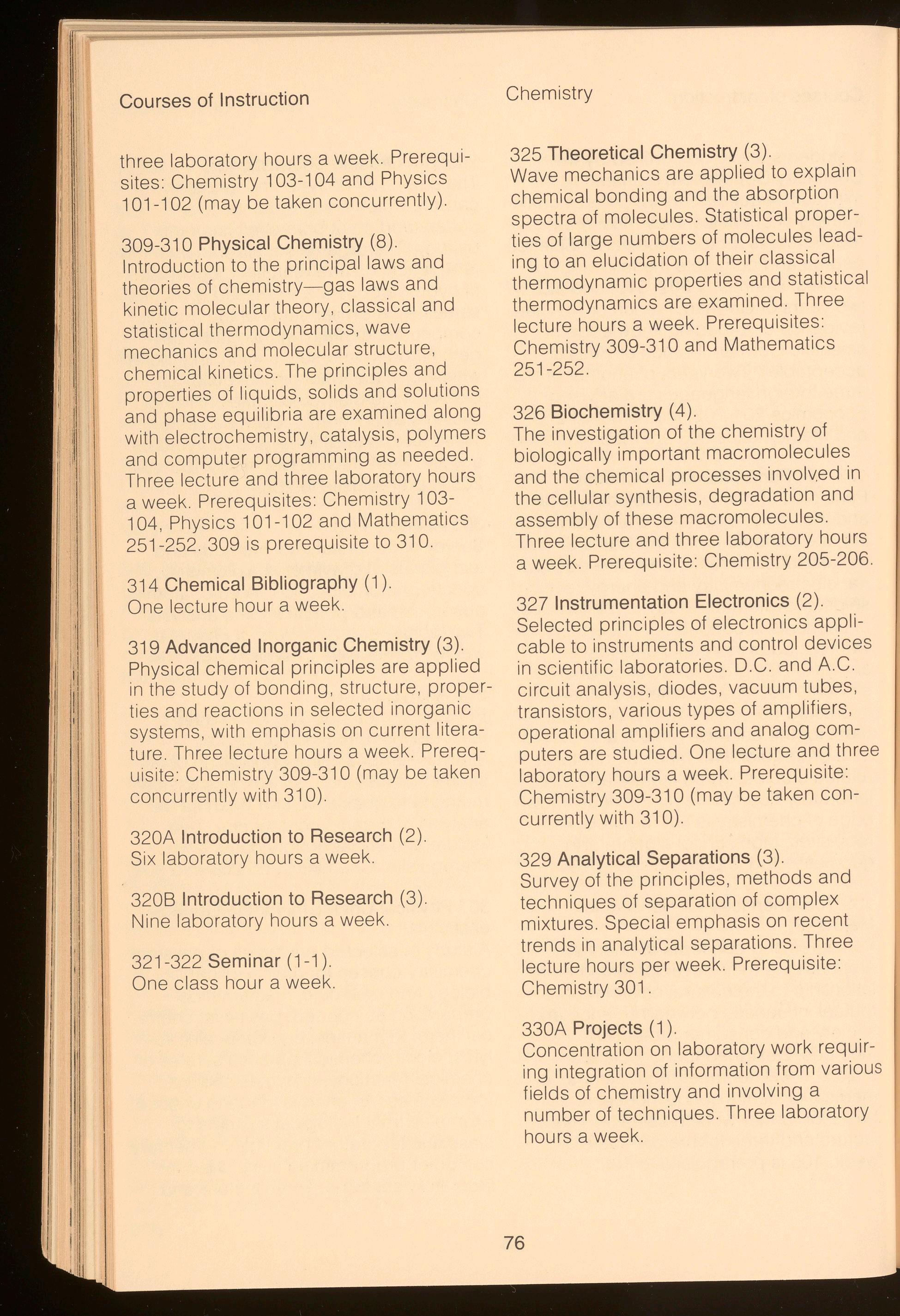
Chemistry
325 Theoretical Chemistry (3)
Wave mechanics are applied to explain chemical bonding and the absorption spectra of molecules Statistical properties of large numbers of molecules leading to an elucidation of their classical thermodynamic properties and statistical thermodynamics are examined. Three lecture hours a week. Prerequisites : Chemistry 309-310 and Mathematics 251-252.
326 Biochemistry(4) .
The investigation of the chemistry of biologically important macromolecules and the chemical processes involved in the cellular synthesis, degradation and assembly of these macromolecules
Three lecture and three laboratory hours a week. Prerequisite : Chemistry 205-206
327 InstrumentationElectronics(2).
Selected principles of electronics applicable to instruments and control devices in scientific laboratories. D .C. and A.C. circuit analysis , diodes , vacuum tubes , transistors , various types of amplifiers , operational amplifiers and analog computers are studied . One lecture and three laboratory hours a week . Prerequisite : Chemistry 309-310 (may be taken concurrently with 31 0)
329 AnalyticalSeparations (3).
Survey of the principles , methods and techniques of separation of complex mixtures Special emphasis on recent trends in analytical separations . Three lecture hours per week. Prerequisite: Chemistry 301.
330A Projects (1 ) .
Concentration on laboratory work requiring integration of information from variou s fields of chemistry and involving a number of techniques Three laboratory hours a week.

Courses of Instruction
330B Projects (2)
Six laboratory hours per week.
331 Physical Organic Chemistry (3).
Study of the tools used by the physical o rganic chemist to in v estigate organic reaction mechanisms. Kinetics , linear f re e energy relationships and bonding theory are examined. Three lecture hours a week. Prerequisites Chemistry 205-206 and 323-324 (may be taken concurrently w ith 324)
333 Special Topics (3).
Special subject areas are covered when t he re is sufficient demand. Three lecture ho urs a week.
334 Advanced Synthesis (3).
Three lecture hours a week. Prerequis ites : Chemistry 205-206 and 309 (may b e taken concurrently) .
34 2 Chemical Thermodynamics(3)
St udy of the energies of chemical syste ms . The principles derived are applied to understanding and predicting the behav ior of practical systems . Three lecture hou rs a week. Prerequisite : Chemistry 309 -310.
349 Chemical Kinetics and Dynamic Processes(3)
Covers descriptions and theories of simp le, isothermal reactions and multistep , reve rsible processes Interest broadens to non-isothermal systems and to mathematical modeling of dynamic process es such as pharmacodynamics of d rug distribution , ecological systems and c hemical industrial processes Throughout , the emphasis is on principles the student will use in analyzing systems of interest to him. Instruction and practice in the use of small-and medium-sized Digital Computers as well as Analog Computers are included Three lecture hours a week. Prerequisite: Chemistry 309-310.
Classical Studies
Classical Studies
Joseph S . White , Chairman Professor Selby Associate Professor White Instructor S. L. Wheeler
Greek
Concentration
Twenty-four semester hours above the elementary level ; 18 semester hours in related fields , of which six semester hours must be in Latin above the elementary level; the successful completion of a comprehensive examination covering the areas of Greek studies or a senior thesis.
101-102 Elementary Greek (6).
College credit only when followed by Greek 103-104, or when offered for elective credit. 101 is prerequisite to 102
103-104 Introductionto Greek Literature, Prose and Poetry (3-3).
Review of grammar, study of selections from Herodotus, Plato or Lucian and a play by Sophocles or Euripides. 103 is prerequisite to 104
(203] The New Testament (3).
A survey of the New Testament in the original language . Prerequisites Greek 103-104 or the equivalent. (May be included in a concentration in religion .)
(301] Greek Literatureof the Fifth Century: Drama (3)
Prerequisites Greek 103-104 or permission of the Department.
302 Greek Literatureof the Fifth Century: History (3).
Prerequisites Greek 103-104 or permission of the Department
(303] Greek PhilosophicalProse (3) .
Prerequisites: Greek 103-104 or permission of the Department.
Courses of Instruction
[304] Greek Orators and Historiansof the Fourth Century and Later (3). Prerequisites: Greek 103-104 or permission of the Department.
305 HellenisticPoetry (3)
Prerequisites: Greek 103-104 or permission of the Department .
[306] Lyric Poetry (3) . Prerequisites: Greek 103-104
[307-308] Homer (3-3).
A study of readings from the Iliad and Odyssey . Prerequisites : Greek 103-104
[309] The Greek Language (3).
The historical development of language, advanced grammar and composition. Prerequisites: Elementary Latin and Greek 104 or the equivalent.
399 IndependentStudy (3).
Content is adapted to the requirements and interests of the participants
Latin
Concentration
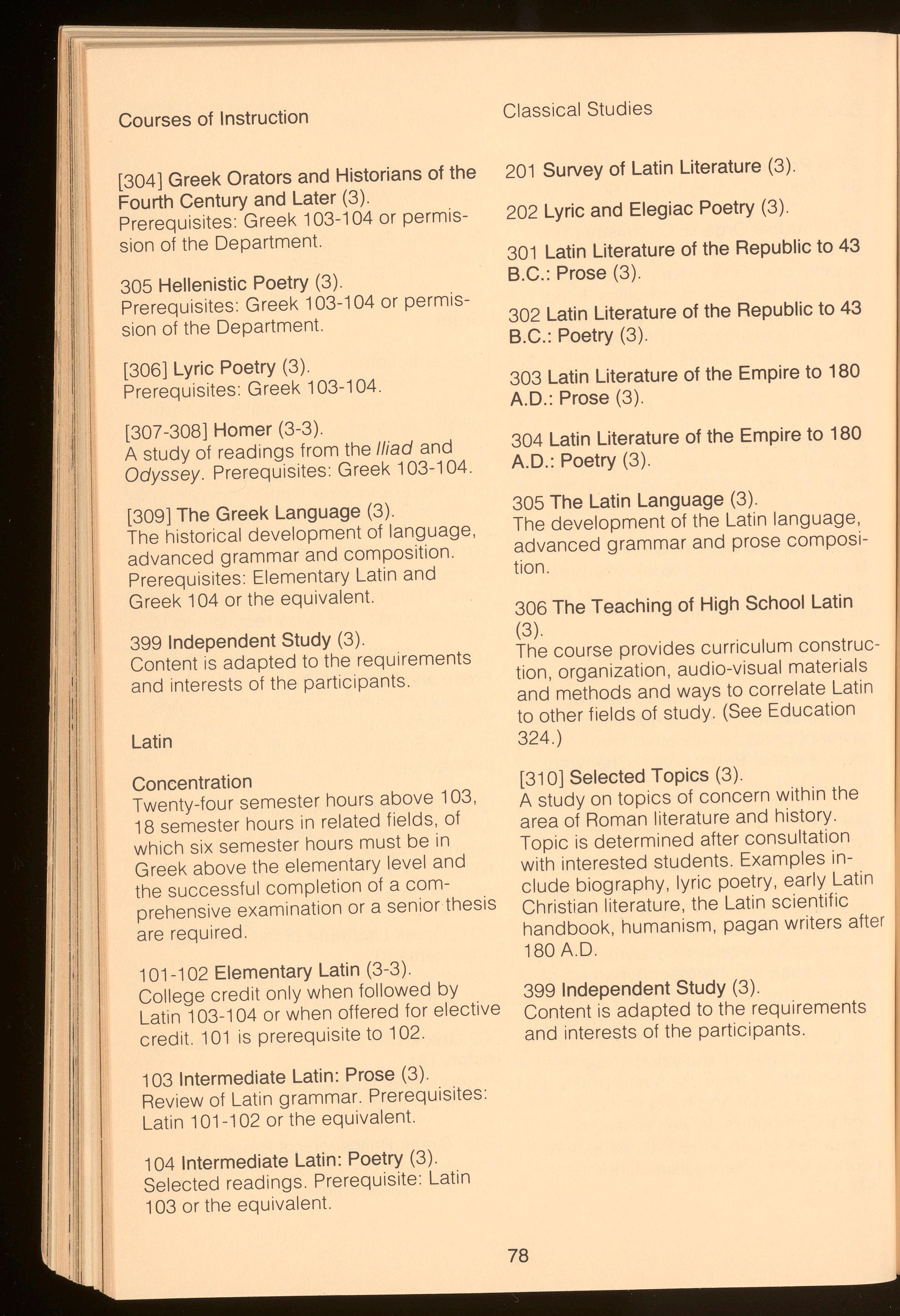
Classical Studies
201 Survey of Latin Literature (3).
202 Lyricand Elegiac Poetry (3) .
301 Latin Literatureof the Republicto 43 B.C.: Prose (3).
302 Latin Literatureof the Republicto 43 B.C.: Poetry (3)
303 Latin Literatureof the Empire to 180 A.D.: Prose (3).
304 Latin Literatureof the Empire to 180 A.D.: Poetry (3).
305 The Latin Language (3).
The development of the Latin language, advanced grammar and prose composition .
306 The Teaching of High School Latin (3)
The course provides curriculum construction , organization , audio-visual materials and methods and ways to correlate Latin to other fields of study (See Education 324.)
[31 O] Selected Topics (3).
Twenty-four semester hours above 103 , 18 semester hours in related fields, of which six semester hours must be in Greek above the elementary level and the successful completion of a comprehensive e x amination or a senior thesis are required .
101 - 102 Elementary Latin (3-3). College credit only when followed by Latin 103-104 or when offered for elective credit. 101 is prerequisite to 102 .
103 IntermediateLatin: Prose (3) . Review of Latin grammar. Prerequisites : Latin 101-102 or the equivalent.
104 IntermediateLatin: Poetry (3). Selected readings Prerequisite: Latin 103 or the equivalent.
A study on topics of concern within the area of Roman literature and history. Topic is determined after consultation with interested students. Examples include biography , lyric poetry, early Latin Christian literature, the Latin scientific handbook, humanism , pagan writers aft er 180 A.O.
399 Independent Study (3)
Content is adapted to the requirements and interests of the participants.
Courses of Instruction
ClassicsIn English
The following courses are designed for t he student who is interested in the c ultures and literature of Greece and Rome Knowledge of Greek or Latin is not required. While they may not be used for f ulfillment of language requirement, 201205 meet distributional requirement IV a nd 301-303 meet distributional requirement Ill.
101 Classical Elements in the English Language (3) .
Designed to aid the student in developing his vocabulary and use of English th rough a study of Greek and Latin e lements in English-derivatives , roots an d loan words . Some emphasis is p laced on the special vocabularies of the sc iences
201 Classical Literaturein Translation(3) .
A s urvey of the major classical authors and their contributions to modern tho ught and literary forms
[202] The Greek Drama (3)
O rigins and influences of Greek drama on modern drama
[203] Greek and Roman Historians(3).
A st udy of Herodotus , Thucydides , Caes ar , Sallust , Livy and Tacitus and an exa mination of the influence of Greek historiography on Roman historians , esp ecially in the field of biography .
[204] Greek and Roman Epic Literature (3).
An examination of the rise of epic poetry in Greece and its predecessors in the Near East. Emphasis is placed on reading s from Homer and Vergil and minor epi c writers.
205 Greek and Roman Mythology(3)
A study of selected mythic themes in Greek and Roman literature from Homer to Ovid. Emphasis is placed on myths prominent in Western literature.
Colloquium Program for Freshmen
301-302 Greek and Roman Art and Archaeology(3-3) .
First semester focuses on the prehistoric and classical monuments of Greece.
Second semester concentrates on Italy , the Etruscan and Roman rema i ns (May be included in a concentration in Art . See Art 311-312.)
[303] Crosscurrentsin MediterraneanArt and Archaeology(3) .
Artistic and archaeological problems resulting from the confluence of Eastern and Western traditions. Prerequisite: Classics 301 or 302 . (See Art 319 )

ColloquiumProgram For Freshmen
The Freshman Colloquium Program provides an opportunity for the student to ex plore selected topics not found in typical courses of instruction. These courses , generally taught on a seminar basis with enrollment limited to ten to fifteen freshmen , focus on current problems and stress student participation through oral and written expression.
Courses may be taken during either semester of the freshman year All are of three semester hou rs elective credit and do not have prerequisites The Colloquia listed below are typical of those that will be offered The student should ascertain which courses are to be offered in any given semester and make his selection accordingly .
102 Our SpaceshipEarth (3).
Consideration of our planet as a closed system and the necessity for understanding the various dependent subsystems Primary emphasis on the use of our natural resources.
Colloquium Program for Freshmen
Courses of Instruction
103 The Religious Dimensions of Western Art Forms (3) .
Discussions of selections from the visual arts , cinema, theater and literature, with emphasis on religious themes e x pressed either directly or indirectly.
104 Cold War and Detente (3)
The ideological and political confrontation between Soviet Communism and the Western powers , including Nazi and Fascist dictatorships and democracy. Discussion of conflict and cooperation since the outbreak of World War II with special attention to the current situation and its background
105 So Help Us God-Religion and Politics (3) .
The interplay of religion and politics and the role of " civil religion ." Extensive reading and practical investigation of current political campaigns .
107 Western Imperialism, The Past Hundred Years (3).
A study of the development and eventual decline of colonial empires through consideration of the doctrines and justifications for imperial activity , impact of foreign control upon non-Western societies and imperialism ' s legacy to the contemporary world
108 The Heroic Quest in Modern Fiction (3) .
An inquiry into characters and themes that challenge or extend the traditional concept of the hero and heroism.
109 The Woman Writer in the Twentieth Century : Problems and Productions (3).
11O The Crusades (3).
A study of the inspiration, achievements and final failure of the crusading movement. Political , economic , and religious elements are explored.
111 Future Policy (3).
Introduces the concept and discipline of " futurism, " and concentrates on anticipating developments likely to create issues for public policy during the next 25 years
112 " I" and "You" (3).
The impact of the image of " self " on communication and creative expression.
113 Big Bangs, Black Holes, and All That (3).
The physical universe, including early as well as modern ideas about its history and structure, why the stars shine and the overall picture of the cosmos. Topics of contemporary interest such as black holes , quasars , pulsars and life on other planets
114 Ethics and the Life Sciences (3). Ethical questions raised by controversial approaches to the control of human life and death. Consideration of such topics as gene therapy , embryo and organ transplant , asexual cloning and chemical modification of behavior.
115 Literature of Peace and War (3) .
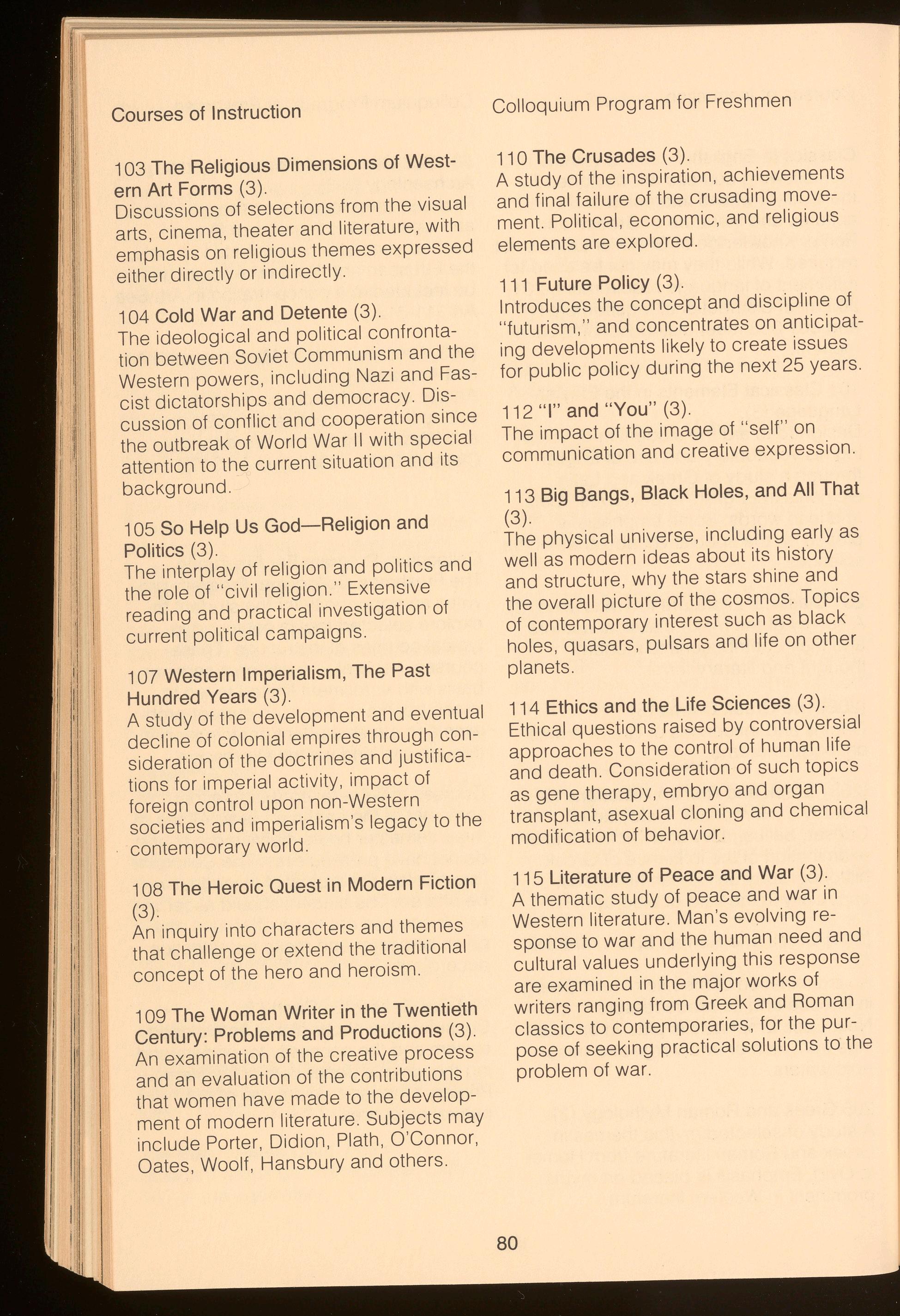
An examination of the creative process and an evaluation of the contributions that women have made to the development of modern literature . Subjects may include Porter, Didion , Plath , O'Connor, Oates, Woolf , Hansbury and others .
A thematic study of peace and war in Western literature. Man's evolving response to war and the human need and cultural values underlying this response are examined in the major works of writers ranging from Greek and Roman classics to contemporaries , for the purpose of seeking practical solutions to the problem of war.
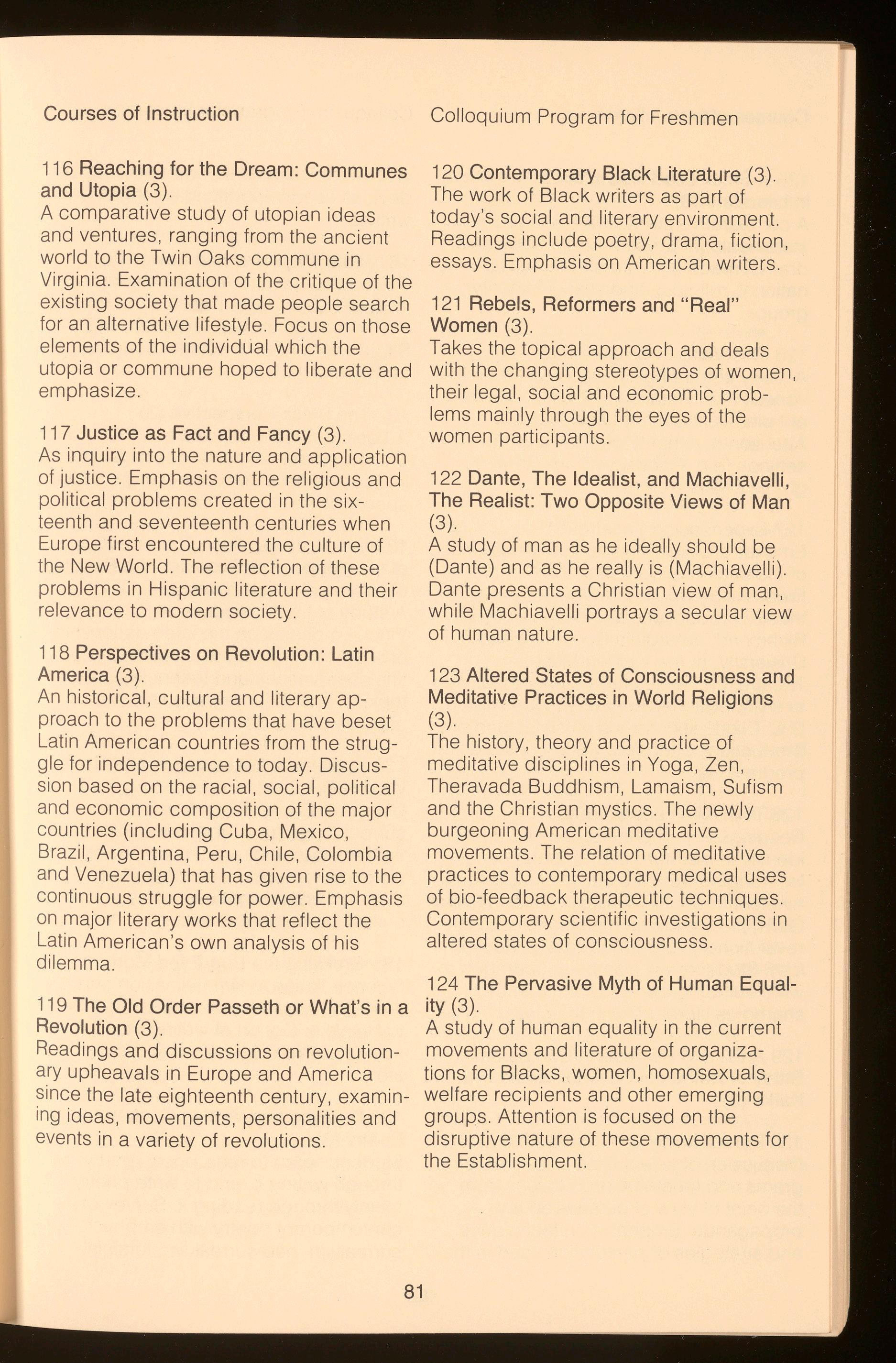
Courses of Instruction
116 Reaching for the Dream: Communes and Utopia (3).
A c omparative stud y of utopian ideas a nd ventures, ranging from the ancient w orld to the Twin Oaks commune in Virginia . Ex amination of the critique of the exi sting society that made people search for an alternative lifestyle. Focus on those e lements of the individual which the ut o pia or commune hoped to liberate and em phasize
117 Justice as Fact and Fancy (3)
A s inquiry into the nature and application o f justice Emphasis on the religious and po litical problems created in the si xtee nth and seventeenth centuries when Eu rope first encountered the culture of t he New World. The reflection of these pro blems in Hispanic literature and their relev ance to modern society
118 Perspectives on Revolution: Latin America (3)
A n hi storical, cultural and literary appro ach to the problems that have beset Latin American countries from the strugg le for independence to today Discuss io n based on the racial , social , political an d economic composition of the major co untries (including Cuba , Mexico , Brazil , Argentina, Peru, Chile, Colombia and Venezuela) that has given rise to the co ntinuous struggle for power. Emphasis on major literary works that reflect the Lat in American's own analysis of his d ile mma
119 The Old Order Passeth or What's in a Revolution (3) . Readings and discussions on revolutionary upheavals in Europe and America s ince the late eighteenth century , e x amining ideas, movements, personalities and eve nts in a variety of revolutions
Colloquium Program for Freshmen
120 Contemporary Black Literature (3)
The work of Black writers as part of today 's social and literary en v ironment . Readings include poetry , drama , fiction, essays Emphasis on American writers.
121 Rebels, Reformers and "Real" Women (3)
Takes the topical approach and deals with the changing stereotypes of women , their legal , social and economic problems mainly through the eyes of the women participants
122 Dante, The Idealist, and Machiavelli, The Realist: Two Opposite Views of Man (3)
A study of man as he ideally should be (Dante) and as he really is (Machiavelli). Dante presents a Christian view of man , while Ma c hiavelli portrays a secular view of human nature.
123 Altered States of Consciousness and Meditative Practices in World Religions (3) .
The history , theory and practice of meditative disciplines in Yoga , Zen, Theravada Buddhism , Lamaism, Sufism and the Christian mystics. The new ly burgeoning American meditative movements. The relation of meditative practices to contemporary medical uses of bio-feedback therapeutic techniques. Contemporary scientific investigations in altered states of consciousness.
124 The Pervasive Myth of Human Equality (3).
A study of human equality in the current movements and literature of organizations for Blacks, women , homosexuals , welfare recipients and other emerging groups. Attention is focused on the disruptive nature of these movements for the Establishment .

Courses of Instruction
125 A Small Loud Voice: MinorityVoices in Literature(3).
A comparative study of the imaginative statements (in prose fiction, poetry and drama) made by writers from racial, national, religious and sexual minority groups.
126 This Various Language (3).
A study of the English language in the various manifestations as used in different places at different social levels. Attention to minority groups in urban settings (e.g. Cockney, Black English, ghetto English, etc.) .
127 ExperiencingTheatre (3).
Emphasis on differentiating the response of the audience from that of the critic. Frequent group attendance of films and theatre productions at the University of Richmond, at Virginia Commonwealth University, at the Virginia Museum Theatre , and at selected dinner theatres and professional theatres in Washington, D.C . Class discussions on styles and on productions attended ; written critiques on productions.
128 The Self in Literature(3) .
Readings will emphasize the search for identity in literature and for purpose in life , ranging from the autobiography of a nineteenth-century Russian writer (Maxim Garby) to the prison memoirs of a Black revolutionary (Eldridge Cleaver, Soul on Ice). Students will also be encouraged to write autobiographies which can be shared as literature with the class.
129 Artistand Recluse: A Comparative Study of Nathaniel Hawthorneand Franz Kafka (3)
130 Persuasionin the Visual Arts (3). Discussion of select films , television programs and theatrical productions from the point of view of persuasion and propaganda. Emphasis on techniques and strategies of persuasion used in the
Colloquium Program for Freshmen
visual arts; comparison with persuasive devices used in public speaking and in writing.
131 Plots, Passions and Power (3). The course will examine the drama and intrigue of the Tudor period as mirrored in the lives of Henry VIII , Elizabeth, Mary Stuart and a host of colorful nonroyal men and women.
132 The Black Perspective(3) .
A basic course in Black life in Richmond . The day-to - day experiences of Blacks as interpreted by a community organization specialist.
133 Leonardoda Vinci:The Investigator of the Human Conditionand the Recorder of Universal Experience (3)
A study of the Notebooks of Leonardo da Vinci . Emphasis on the interrelationship of subjects-humanistic themes, scientific observations and technological topics-and the integration of various aspects of knowledge
134 Richmond:Preservationand Conservation (3).
Using the City of Richmond and its surroundings as a laboratory , a study of the importance of preserving our old and historic structures, districts and artifacts , and of maintaining the integrity and flavo r of existing neighborhoods.
135 Grokkingthe Bug-Eyed Monsters (3) . Science fiction in film , television and literature Modern writers from Bradbury to Heinlein Option of writing your own science-fiction film (television) script or story .
136 Reading and Writing Contemporary Poetry (3).
Students learn to read poetry partly through writing it, and to write poetry mainly through reading it. Survey of contemporary poetry with emphasis on surrealism , neo-surrealism, feminist

Courses of Instruction
poetry, New York School poetry, minority poetry and the prose-poem.
137 In Search of King Arthur (3).
A study of the persistence of the legends about King Arthur and the Knights of the Round Table. The exploration will begin with the twentieth century material: " Camelot, " the Mary Stewart novels and others, and will work backward to the earliest Arthurian legends and to the historical Arthur.
138 Freedom of Dissent in America (3). Tactics, strategy and objectives of American dissent from the Alien and Sedition Acts crisis to the twentieth century, with emphasis on the nineteenth and twentieth centuries. Confrontations over First Amendment liberties in Jacksonian America, the antislavery movement, labor radicalism , agrarian insurgency, suppression of liberties during World War I, and the question of making war itself in the Vietnam War.
139 Finding the Self: Racial and Sexual Factors in an Age of Technology (3).
A careful exploration of the changing roles of race and sex in determining who and what we are in the late twentieth century. Readings and discussion including Simone de Beauvoir , Jean Paul Sartre, Norman Mailer, and Kierkegaarde, as well as Plato on the equality of women
140 Literature of the First World War (3).
An investigation of the attitudes and v alues reflected in literature written during and / or concerned with this bloody and bewildering turning point in early twentieth-century reality.
141 Literature Into Film (3)
Comparison of film adaptations of short stories , novels and plays with their originals in order to explore the techniques writers and filmmakers use to convey their ideas and attitudes.
Colloquium Program for Freshmen
142 The Social Crystal (3).
Examination of crystalline materials, both natural and man-made, which have played an influential role in the economic and social affairs of men for at least several thousand years.
143 Archetypal Symbols in Literature, Mythology& Folklore (3).
Designed to introduce students to the archetypal symbols most widely found in literature, mythology, and folklore and which provide much of the vitality of dreams, history and religion .
144 Psychologyand Literature (3).
Exploration of how the study of the mind promotes an understanding of artistic creation and interpretation. Multiple art forms , including painting, film and music, will be compared with literature as expressions of the unconscious.
145 Punishment (3).
Guided discussion on some of the main problems revolving around the issue of punishment by the law Consideration will be given to views of punishment as retribution, as deterrence, and as rehabilitation , and to certain questions of current public concern
146 PoliticalCorruption (3).
Exploration of the psychological, institutional , and moral dimensions of political corruption with emphasis on the moral structures of decisions and their impact on our style of living. Special consideration will be given to the paradoxes of corruption in a democratic society.
147 The Sister Arts and Civilized Values (3).
Examination of how literature , painting , architecture and music have served both to express and to define important values in various periods of European and American civilization.
Coursesof Instruction
148 The Many Faces of Eden (3) . Examination of the potentials and limitations of a variety of perspectives on the natural world Study and active creation in such modes of e x pression as painting , poetry , lore , music , architecture and science in relation to a natural setting visited by the class
149 The Bomb on the Street Corner: HistoricalPerspectiveson Terrorism(3) . Examination of the theoretical rationale for terrorism, past and present. An attempt will be made to distinguish among the "official " terrorism of a Stalin, Hitler or ldi Amin, the "revolutionary " terrorism of a Nechaev or Arafat, and the " nonpolitical " terrorism of hijackings or kidnappings
Economics
N F. Edwards , Chairman Professors Edwards , Jung , Sanders
Associate Professor Whitaker
Assistant Professors Cone, Fraser, Nicholson , Stout
Concentration
Twenty-seven semester hours in Economics courses numbered 200 or higher with a C average in these courses , and including Economics 201, 202 , 312 , 313 and Business Administration 307 ; and 18 semester hours in closely related fields .
For a description of Economics courses, see the listing in the School of Business Administration section , pages 146-14 7
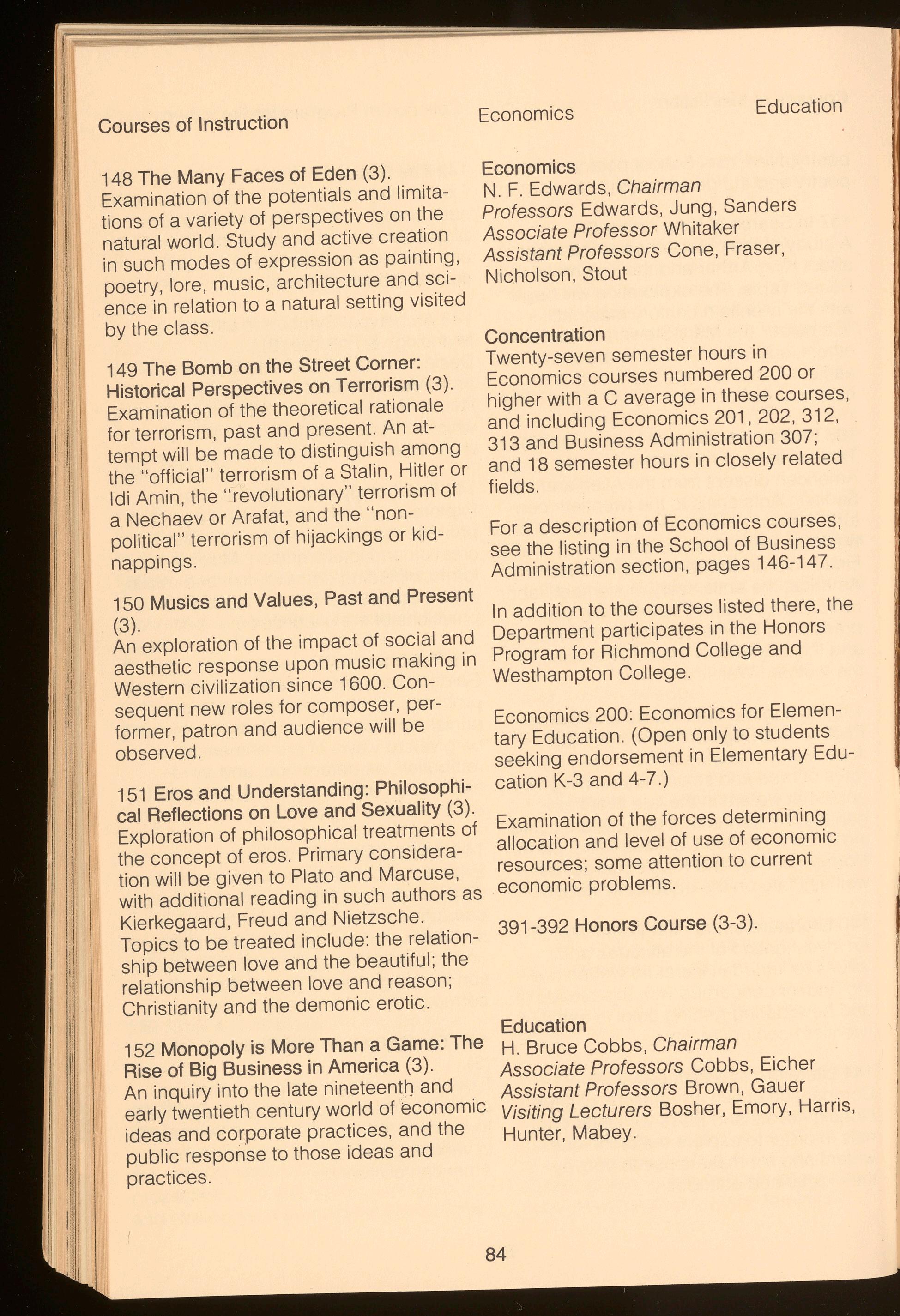
150 Musicsand Values, Past and Present (3) . An exploration of the impact of social and aesthetic response upon music making in Western civilization since 1600 Consequent new roles for composer, performer, patron and audience will be observed .
151 Eros and Understanding:Philosophical Reflectionson Love and Sexuality(3). Exploration of philosophical treatments of the concept of eras. Primary consideration will be given to Plato and Marcuse , with additional reading in such authors as Kierkegaard, Freud and Nietzsche Topics to be treated include : the relationship between love and the beautiful; the relationship between love and reason; Christianity and the demonic erotic.
152 Monopolyis More Than a Game: The Rise of Big Businessin America (3)
An inquiry into the late nineteenth and early twentieth century world of economic ideas and corporate practices, and the public response to those ideas and practices.
In addition to the courses listed there, the Department participates in the Honors Program for Richmond College and Westhampton College.
Economics 200 : Economics for Elementary Education . (Open only to students seeking endorsement in Elementary Education K-3 and 4-7.)
Examination of the forces determining allocation and level of use of economic resources; some attention to current economic problems
391-392 Honors Course (3-3)
Education
H . Bruce Cobbs, Chairman
Associate Professors Cobbs, Eicher
Assistant Professors Brown, Gauer
Visiting Lecturers Basher, Emory, Harris, Hunter , Mabey .

Courses of Instruction
Concentration
(a) Early childhood education (N-K-3): 33 semester hours, including Education 301, 302,303,304, 326,331,339-K, 350,351 and 357; (b) elementary education (4-7) : 33 semester hours, including Education 306,307,308, 309,326,331,339-E,350, 351 or 352 and 357; in addition to the above, the following academic courses to meet the Virginia State Approved Teacher Preparation Program leading to the Virginia Collegiate Professional Certificate : Economics, Geography, Speech, U.S History, American Literature, Laboratory Science, Mathematics, Advanced Grammar, Health, Art, Music and Physical Education.
Students desiring to teach in the secondary school must have a major in an academic field and take the following professional courses to meet requirements for the Virginia Collegiate Professional Certificate: 323 , 324, 326 or 332 and 339-S. In addition to the above, the following academic courses are required to meet the Virginia State Approved Preparation Program leading to the Virginia Collegiate Professional Certificate: American History, Physical Education 355 or 356, and Speech.
No grade lower than C may be accepted in the field of concentration or in education courses
Teacher Preparationand Certification
The Teacher Preparation Program at the University of Richmond includes the preparation of teachers for three levels: early childhood (N-K-3); elementary (4-7); and secondary (8-12), with endorsements in certain academic areas . If endorsements are desired in two areas, such as early childhood education (N-K-3; and upper elementary (4-7), the student may meet the requirements of the second area of endorsement by completing one curriculum
Education
course and by having a student teaching experience at that particular grade level.
The basic assumptions of each of the existing programs are that: (1) it is consistent with the overall goals and purposes of the institution; (2) adequate support is given the program by administration, faculty and students; (3) close community relationships are fostered by the cooperative relationships developed between school systems and the University in the observation and student teaching programs; (4) a Teacher Preparation Program is needed in order to meet the needs of our students as well as to supply qualified educational personnel to our democratic society
The Teacher Preparation Program at the University of Richmond is structured so as to develop the following specific objectives: (1) to orient students to the profession of education : its principles, foundations, obligations and opportunities; (2) to develop an understanding of the philosophical, sociological, psychological and historical foundations of education; (3) to develop an understanding and appreciation of the school and its total program in American society.
State Approved Program of Teacher Education
·The initial endorsement of an Approved Teacher Preparation Program of the Virginia State Board of Education was received in 1972. In 1975, the Department of Education was granted an Approved Program status for an additional five-year period extending from 19751980.
The Approved Program permits qualified institutions the rights and responsibilities to recommend candidates for initial certification. Graduates of approved programs enjoy a reciprocity of certification with about three-fourths of the states.
Coursesof Instruction
Early Childhood ....
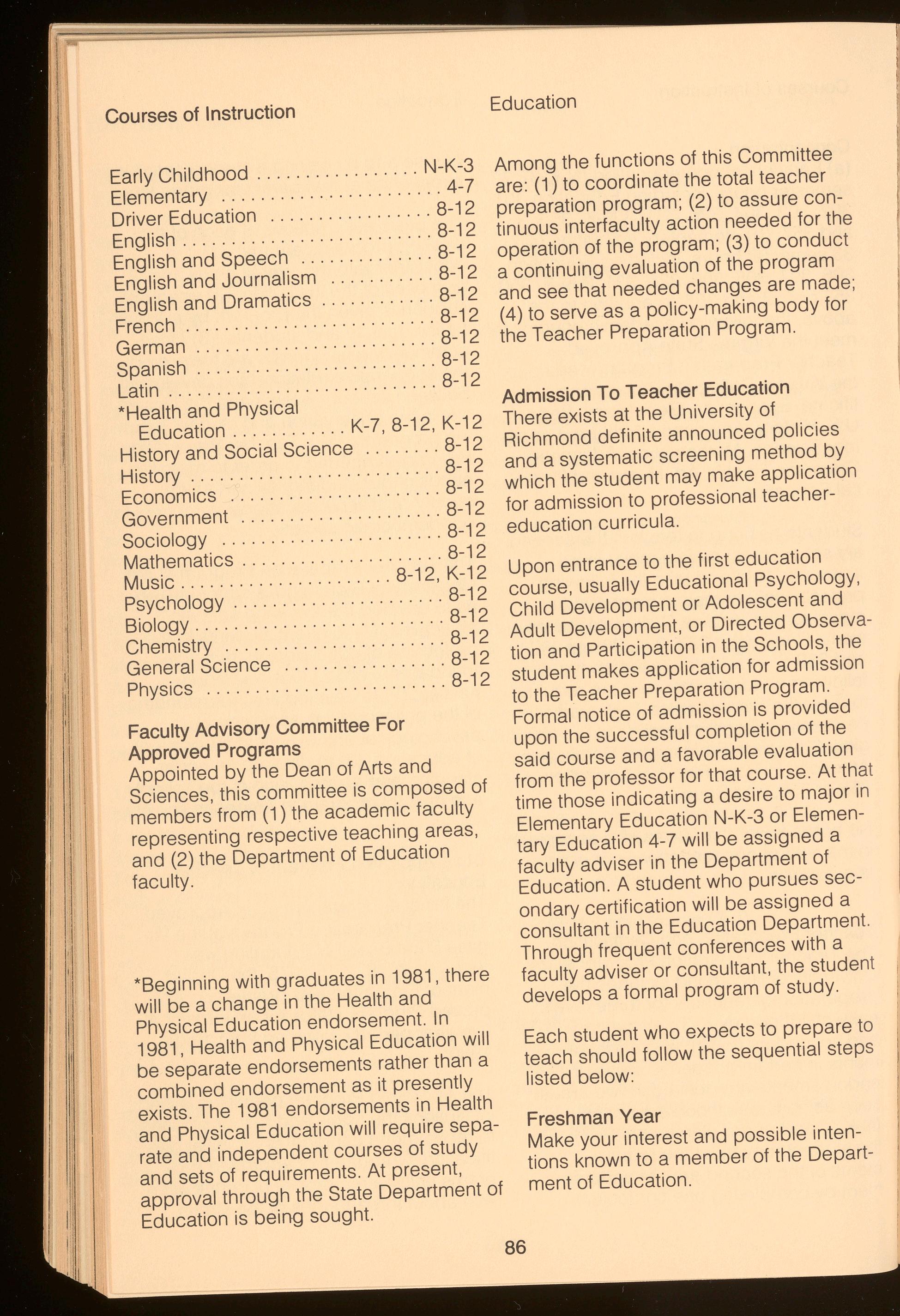
N-K-3
4-7
Driver Education ... ......... .. ... 8-12
English and Speech ..
English and Journalism .. . .
English and Dramatics ........ .
French
German ...
Spanish
Latin .
8-12
8-12
. 8-12
. 8-12
8-12
8-12
8-12
. 8- 12
Education
Among the functions of this Committee are : (1) to coordinate the total teacher preparation program; (2) to assure continuous intertaculty action needed for the operation of the program ; (3) to conduct a continuing evaluation of the program and see that needed changes are made ; (4) to serve as a policy-making body tor the Teacher Preparation Program
AdmissionTo Teacher Education
. 8-12
*Health and Physical Education . . ......... . K-7, 8-12 , K-12 History and Social Science
8-12
8-12 Government
Sociology .
... 8-12
There exists at the University of Richmond definite announced policies and a systematic screening method by which the student may make application for admission to professional teachereducation curricula .
. 8-12 Mathematics
. 8-12
8-12, K-12 Psychology .
. 8-12
8-12 Biology .
8-12
8-12
8-12
FacultyAdvisoryCommitteeFor ApprovedPrograms
Appointed by the Dean of Arts and Sciences , this committee is composed of members from (1) the academic faculty representing respective teaching areas, and (2) the Department of Education faculty.
Upon entrance to the first education course, usually Educational Psychology , Child Development or Adolescent and Adult Development , or Directed Observation and Participation in the Schools , the student makes application for admission to the Teacher Preparation Program
*Beginning with graduates in 1981 , there will be a change in the Health and Physical Education endorsement. In 1981, Health and Physical Education will be separate endorsements rather than a combined endorsement as it presently exists . The 1981 endorsements in Health and Physical Education will require separate and independent courses of study and sets of requirements . At present, approval through the State Department of Education is being sought.
Formal notice of admission is provided upon the successful completion of the said course and a favorable evaluation from the professor for that course . At that time those indicating a desire to major in Elementary Education N-K-3 or Elementary Education 4-7 will be assigned a faculty adviser in the Department of Education A student who pursues secondary certification will be assigned a consultant in the Education Department. Through frequent conferences with a faculty adviser or consultant, the studen t develops a formal program of study.
Each student who expects to prepare to teach should follow the sequential step s listed below:
FreshmanYear
Make your interest and possible intentions known to a member of the Department of Education .
Coursesof Instruction
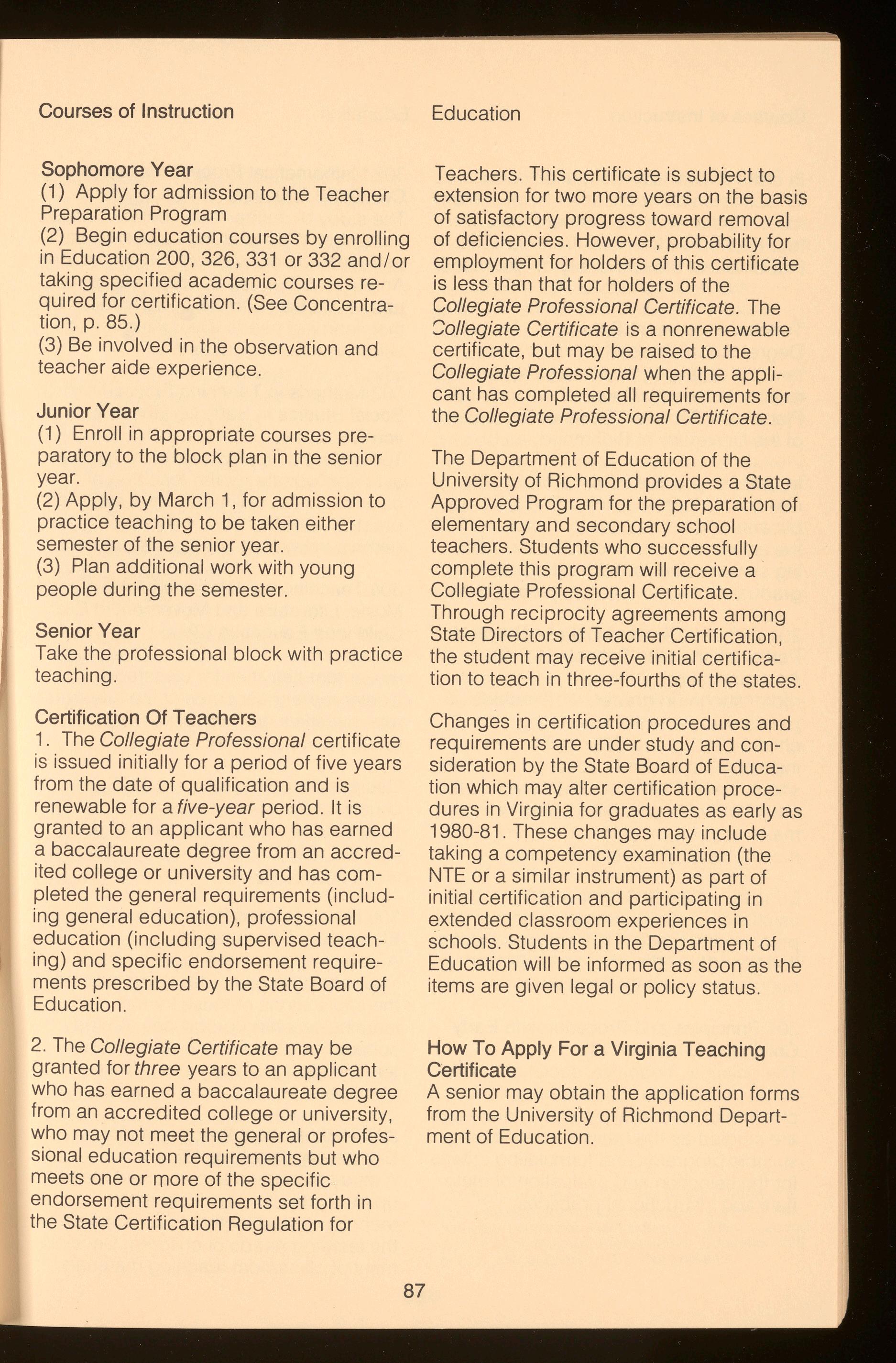
Education
SophomoreYear
(1) Apply for admission to the Teacher Preparation Program
(2) Begin education courses by enrolling in Education 200, 326, 331 or 332 and / or taking specified academic courses required for certification (See Concentration, p. 85.)
(3) Be involved in the observation and teacher aide experience.
JuniorYear
(1) Enroll in appropriate courses preparatory to the block plan in the senior year .
(2) Apply, by March 1, for admission to practice teaching to be taken either semester of the senior year.
(3) Plan additional work with young people during the semester .
Senior Year
Take the professional block with practice teaching
CertificationOf Teachers
1. The Collegiate Professional certificate is issued initially for a period of five years from the date of qualification and is renewable for a five-year period It is granted to an applicant who has earned a baccalaureate degree from an accredited college or university and has completed the general requirements (including general education), professional education (including supervised teaching) and specific endorsement requirements prescribed by the State Board of Education.
2 The Collegiate Certificate may be g ranted for three years to an applicant who has earned a baccalaureate degree from an accredited college or university, who may not meet the general or professional education requirements but who meets one or more of the specific endorsement requirements set forth in the State Certification Regulation for
Teachers. This certificate is subject to extension for two more years on the basis of satisfactory progress toward removal of deficiencies . However, probability for employment for holders of this certificate is less than that for holders of the Collegiate Professional Certificate The Sollegiate Certificate is a nonrenewable certificate, but may be raised to the Collegiate Professional when the applicant has completed all requirements for the Collegiate Professional Certificate.
The Department of Education of the University of Richmond provides a State Approved Program for the preparation of elementary and secondary school teachers. Students who successfully complete this program will receive a Collegiate Professional Certificate . Through reciprocity agreements among State Directors of Teacher Certification, the student may receive initial certification to teach in three-fourths of the states .
Changes in certification procedures and requirements are under study and consideration by the State Board of Education which may alter certification procedures in Virginia for graduates as early as 1980-81 . These changes may include taking a competency examination (the NTE or a similar instrument) as part of initial certification and participating in extended classroom experiences in schools . Students in the Department of Education will be informed as soon as the items are given legal or policy status .
How To Apply For a VirginiaTeaching Certificate
A senior may obtain the application forms from the University of Richmond Department of Education.
Courses of Instruction
In order to provide information needed for acting on an application, applicants must register with the Career Planning and Placement Services, Teacher Placement of the University of Richmond.
Teacher Placement Service
Degree candidates who desire assistance in obtaining teaching positions must register with Career Planning and Placement Services, Teacher Placement of the University of Richmond.
In order to provide information usually needed by inquiring school officials, applicants should register by October 10 of the academic year (including the following summer session) during which graduation requirements are completed.
201-202-203 Directed Observation and Participation in the Schools (1-2-3).
An examination of the role of the classroom teacher in grades N-12 includes a practical experience interacting with children in a group setting. The format incorporates a weekly seminar. Students should have a two-hour block of time for each hour of credit they desire. A maximum of three semester hours credit may be selected from these courses.
Education 301, 303, 304 and 339K are usually taken concurrently as part of the professional block. Prerequisites: Education 301, 326, 331, 350, 351, 357 and permission of the Department.
301 Principles and Procedures in Early Childhood Education (3).
Education
302 Mathematical Procedures in Early Childhood Education (3).
The study of mathematics content which comprises the curriculum and materials and methods of teaching young children. An emphasis on the developmental nature of children and the concreteness of their learning needs. Designing and developing teaching materials.
303 Methods in Teaching Science and Social Studies in Early Childhood Education (3).
Topical areas, methods and instructional aids appropriate for the teaching of science and social studies are explored ; practical experiences in developing and demonstrating activities are employed.
304 Teaching the Integrated Arts-Crafts, Music, Literature and Movement in Early Childhood Education (2).
Development of art, music, literature and movement activities for classroom use. Contemporary concepts of the integrated arts, materials and processes appropriate to the young child are treated.
Courses 306, 308, 309 and 339E are usually taken concurrently as part of the professional block. Prerequisites: Education 307, 326, 331, 350, 351, or 352, 357 and permission of the Department.
306 Principles and Procedures of Elementary Education (3).

The physical, cognitive, social and emotional needs, interests and experiences of children of kindergarten and primary age are studied as the basis for developing suitable programs and formulating criteria for the selection and evaluation of materials and instructional practices.
An examination of the factors which influence curriculum development and the implications of these factors in the learning-teaching processes. A study of school and classroom organizational patterns, lesson planning and classroom management.
307 Mathematical Procedures for Elementary Teachers (3)
A study of mathematics content making up the curriculum and teaching techniques and materials appropriate to the learning needs of children. Development of classroom teaching materials.
308 Methods in Teaching Science and Social Studies for ElementaryTeachers (3).
A study of methods and materials for teaching the social studies and sciences with an emphasis on the inquiring process . The organization and development of learning materials
309 Teaching the IntegratedArts-Crafts, Music, Literatureand Movementfor ElementaryTeachers (2).
The development of materials and activities which emphasizes creative expression using the media of art, literature, movement and music
31 0 Characteristicsof Childrenwith LearningDisabilities(3).
(See Psychology 310.)
312-313-314 IndependentStudy in Education (1-2-3)
The primary use of this course will be for special projects and practical experience in education programs. Weekly seminar is required.
315 Remedial Teaching Techniquesfor ElementarySchool Mathematics(3)
A study and application of diagnostic techniques and the use of remedial approaches and materials is ex amined
322 The ExceptionalChild (4).
(See Psychology 322.)
323 Principlesof Secondary Education (3)*.
Characteristics, objectives and scope of secondary education; its attempts to meet the needs of adolescents through administrative, curricular and e x tra class activities; selected court decisions concerning education, especially tort liability of teacher ' s professional ethics.
Education
324 Teaching in the Secondary School (3)*.
Instructional procedures, discipline, evaluation of pupil progress, participation in the total school program, community responsibilities, professional ethics, criterion referenced evaluation, micro teaching using video tapes.
326 EducationalPsychology(3).
Problems in child development in relation to educational needs and school procedures, with special emphasis on the learning process. Includes a laboratory experience. Prerequisites: Introduction to Psychology. (See Psychology 326.)
329 EducationalSociology(3).
(See Sociology 329 )
331 Child Development (4) (See Psychology 331 )
332 Adolescentand Adult Development (4 ).
(See Psychology 332.)
335 Tests and Measurements(4).
(See Psychology 335 .)
[337) Philosophyof Education(3).
A philosophical analysis of such concepts as " knowledge ," " belief ," " self ," and " society " as applied and used in institutionalized learning . Philosophical systems of primary influence in American education are emphasized.
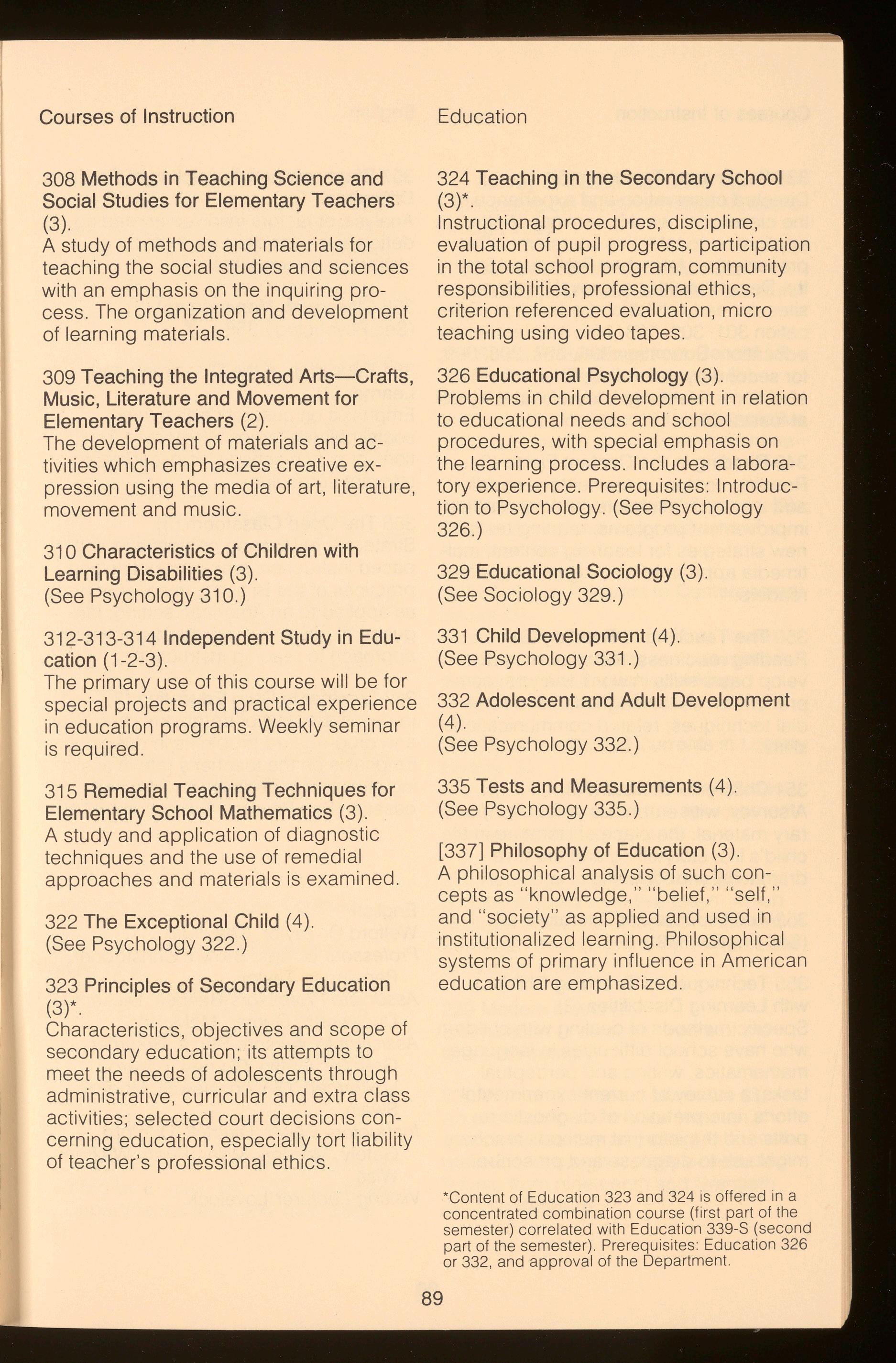
89
*Content of Education 323 and 324 is offered in a concentrated combination cour se (first part of the semester) correlated with Educat ion 339-S (sec o nd part of the seme ster) Prerequisites: Education 326 or 332 , and appro v al of the Department.
Courses of Instruction
339 SupervisedTeaching (6).
Directed observation and experience in the classroom; weekly seminar. Written application to take this course must be presented no later than February 15 to the Department for approval. Prerequisites: for early childhood education: Education 301, 302, 303, 304; for elementary education: Education 306, 307, 308, 309; for secondary education: Education 330; also, a cumulative grade point average of at least 2.200.
349 Reading in the Content Fields (3).
Reading content in elementary, middle and secondary schools. Various reading improvement programs, reading tests, new strategies for teaching content, multimedia approach, working with reluctant readers.
350 The Teaching of Reading (3).
Reading readiness; techniques to develop basic skills in word analysis; comprehension skills; diagnostic and remedial techniques; related communications skills.
351 Children'sLiterature(3).
A survey, with emphasis on contemporary material; the place of literature in a child's life; storytelling and creative dramatics; wide reading.
352 Adolescenceand Literature(3). (See English 349.)
355 Techniques of Teaching Children with Learning Disabilities(3).
Specific methods of dealing with children who have school difficulties in language, mathematics, writing and perceptual tasks; a survey of current experimental efforts, interpretation of diagnostic reports and the informal methods teachers might use to diagnose and prescribe.
English
357 Diagnosisand Correctionof Reading Difficulties(3).
Analysis of factors involved in reading deficiencies; emphasis on practical classroom procedures.
358 Classroom Management (3). (See Psychology 358.)
384 Educationof the Disadvantaged Learner (3).
Emphasis on cultural deprivation; social-cultural forces influencing the functions of public schools; implications for a relevant curriculum.
386 The Open Classroom (3).
Strategies of learning centers and selfpaced instruction in an informal setting; practices of the British primary schools as applied to an American setting; language experience and interdisciplinary approach to reading instruction.
387 Seminar in Drug Education(3).
In-depth analysis of drugs, the drug user, and drug-related problems in our society. Emphasis on the teacher's role in assisting students in decision-making processes. (See Physical Education 387.)

English
Welford D. Taylor, Chairman
Professors Boggs, Brown, Christopher, Penninger, Taylor
Associate Professors Bennett, Dickerson, Duckworth, Gunter, McMurtry
Assistant Professors Barza, Braymer, Gregory, Griffin, Gurney, Hilliard, Loxterman, Nelson, Newell, Oberg, Swain
Instructors Baker, Dietrick, Dunford, Gately, Mardan, Miller, Pugh, Waxman, Wise
Visiting Lecturer Lovelock
Coursesof Instruction
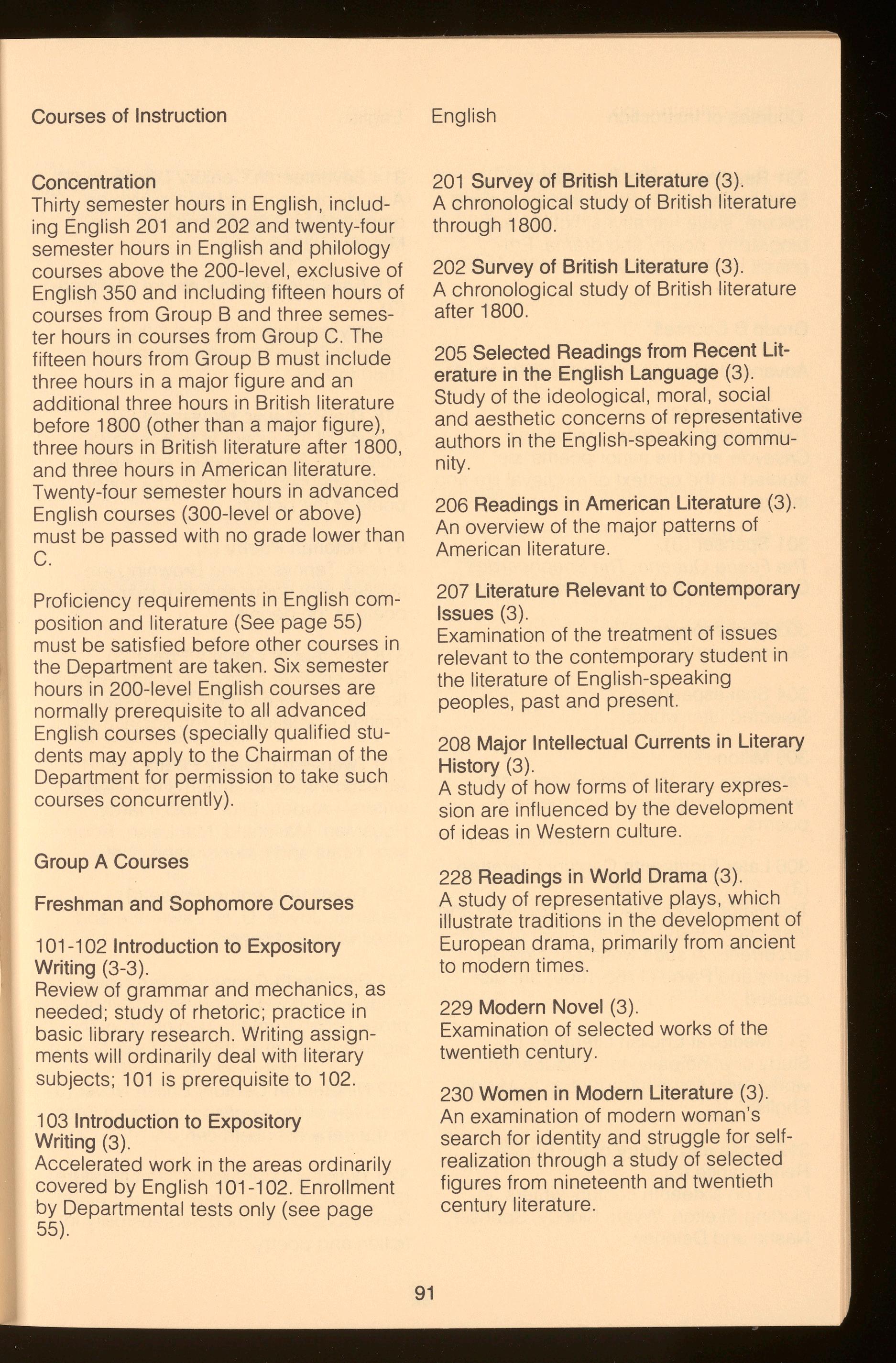
Concentration
Thirty semester hours in English, including English 201 and 202 and twenty-four semester hours in English and philology courses above the 200-level, exclusive of English 350 and including fifteen hours of courses from Group Band three semester hours in courses from Group C . The f ifteen hours from Group B must include three hours in a major figure and an additional three hours in British literature before 1800 (other than a major figure) , three hours in British literature after 1800 , and three hours in American literature Twenty-four semester hours in advanced English courses (300-level or above) must be passed with no grade lower than C .
Proficiency requirements in English composition and literature (See page 55) must be satisfied before other courses in t he Department are taken. Six semester hours in 200-level English courses are normally prerequisite to all advanced English courses (specially qualified stud ents may apply to the Chairman of the Department for permission to take such c ourses concurrently) .
GroupA Courses
Freshmanand SophomoreCourses
101-102 Introductionto Expository Writing(3-3).
Review of grammar and mechanics , as needed ; study of rhetoric ; practice in basic library research. Writing assignments will ordinarily deal with literary subjects; 101 is prerequisite to 102 .
103 Introductionto Expository Writing(3).
Accelerated work in the areas ordinarily covered by English 101-102. Enrollment by Departmental tests only (see page 55)
English
201 Survey of BritishLiterature(3)
A chronological study of British literature through 1800.
202 Survey of BritishLiterature(3).
A chronological study of British literature after 1800
205 Selected Readingsfrom Recent Literature in the EnglishLanguage(3) .
Study of the ideological, moral, social and aesthetic concerns of representative authors in the English-speaking community
206 Readingsin AmericanLiterature(3)
An overview of the major patterns of American literature
207 LiteratureRelevantto Contemporary Issues (3).
Examination of the treatment of issues relevant to the contemporary student in the literature of English-speaking peoples, past and present.
208 Major IntellectualCurrentsin Literary History(3)
A study of how forms of literary expression are influenced by the development of ideas in Western culture
228 Readingsin World Drama (3).
A study of representative plays, which illustrate traditions in the development of European drama, primarily from ancient to modern times.
229 Modern Novel (3)
Examination of selected works of the twentieth century
230 Women in Modern Literature(3).
An examination of modern woman 's search for identity and struggle for selfrealization through a study of selected figures from nineteenth and twentieth century literature.
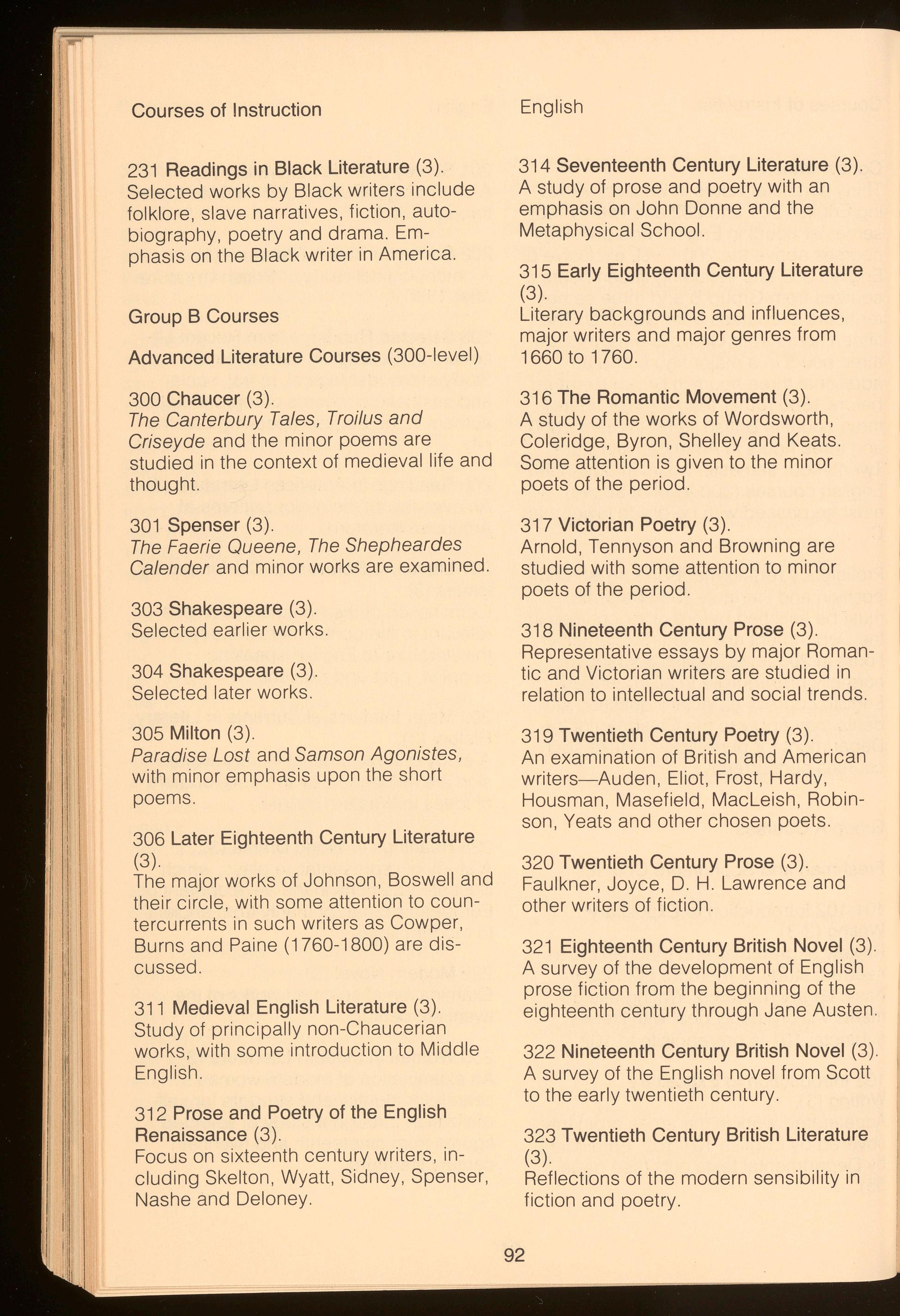
Courses of Instruction
231 Readings in Black Literature(3).
Selected works by Black writers include folklore, slave narratives, fiction , autobiography, poetry and drama. Emphasis on the Black writer in America.
Group B Courses
Advanced LiteratureCourses (300-level)
300 Chaucer (3).
The Canterbury Tales, Troilus and Criseyde and the minor poems are studied in the context of medieval life and thought.
301 Spenser (3).
The Faerie Queene, The Shepheardes Calender and minor works are examined.
303 Shakespeare (3). Selected earlier works.
304 Shakespeare (3) . Selected later works.
305 Milton (3).
Paradise Lost and Samson Agonistes, with minor emphasis upon the short poems.
306 Later EighteenthCentury Literature (3).
The major works of Johnson , Boswell and their circle, with some attention to countercurrents in such writers as Cowper, Burns and Paine (1760-1800) are discussed .
311 Medieval EnglishLiterature(3).
Study of principally non-Chaucerian works, with some introduction to Middle English
312 Prose and Poetry of the English Renaissance (3)
Focus on sixteenth century writers, including Skelton, Wyatt, Sidney, Spenser, Nashe and Deloney .
English
314 Seventeenth Century Literature(3) .
A study of prose and poetry with an emphasis on John Donne and the Metaphysical School.
315 Early Eighteenth Century Literature (3).
Literary backgrounds and influences, major writers and major genres from 1660 to 1760 .
316 The Romantic Movement (3).
A study of the works of Wordsworth, Coleridge, Byron, Shelley and Keats
Some attention is given to the minor poets of the period.
317 Victorian Poetry (3).
Arnold, Tennyson and Browning are studied with some attention to minor poets of the period.
318 Nineteenth Century Prose (3) . Representative essays by major Romantic and Victorian writers are studied in relation to intellectual and social trends.
319 Twentieth Century Poetry (3)
An examination of British and American writers - Auden, Eliot, Frost, Hardy , Housman , Masefield , MacLeish , Robinson , Yeats and other chosen poets
320 Twentieth Century Prose (3). Faulkner, Joyce , D H. Lawrence and other writers of fiction.
321 EighteenthCentury BritishNovel (3) .
A survey of the development of English prose fiction from the beginning of the eighteenth century through Jane Austen
322 Nineteenth Century BritishNovel (3 ).
A survey of the English novel from Scott to the early twentieth century
323 Twentieth Century BritishLiterature (3)
Reflections of the modern sensibility in fiction and poetry.
Courses of Instruction
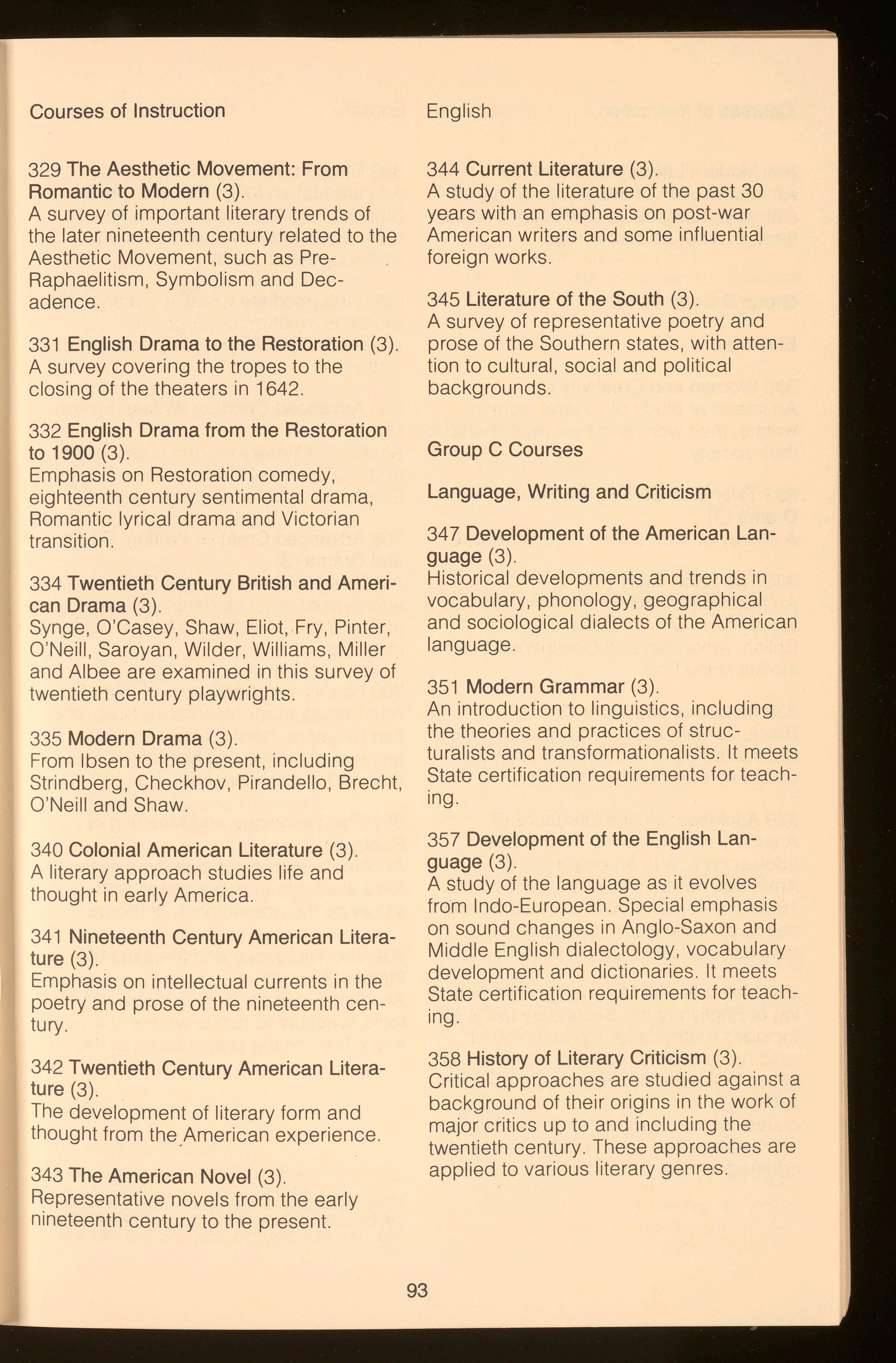
329 The Aesthetic Movement: From Romantic to Modern (3).
A survey of important literary trends of the later nineteenth century related to the Aesthetic Movement, such as PreRaphaelitism, Symbolism and Decadence.
331 English Drama to the Restoration (3).
A survey covering the tropes to the closing of the theaters in 1642 .
332 English Drama from the Restoration to 1900 (3).
Emphasis on Restoration comedy, eighteenth century sentimental drama, Romantic lyrical drama and Victorian transition.
334 Twentieth Century British and American Drama (3) . Synge, O'Casey , Shaw, Eliot, Fry, Pinter, O'Neill, Saroyan , Wilder , Williams, Miller and Albee are examined in this survey of twentieth century playwrights
33 5 Modern Drama (3).
From Ibsen to the present, including Strindberg, Checkhov, Pirandello, Brecht , O'Neill and Shaw.
340 Colonial American Literature (3).
A literary approach studies life and tho ught in early America
341 Nineteenth Century American Literature (3)
Emphasis on intellectual currents in the poetry and prose of the nineteenth century.
342 Twentieth Century American Literature (3).
The development of literary form and thought from the American experience .
343 The American Novel (3).
R_epresentative novels from the early nineteenth century to the present.
English
344 Current Literature (3).
A study of the literature of the past 30 years with an emphasis on post-war American writers and some influential foreign works.
345 Literature of the South (3).
A survey of representative poetry and prose of the Southern states, with attention to cultural, social and political backgrounds.
Group C Courses
Language, Writing and Criticism
34 7 Development of the American Language (3)
Historical developments and trends in vocabulary, phonology, geographical and sociological dialects of the American language.
351 Modern Grammar (3).
An introduction to linguistics, including the theories and practices of structuralists and transformationalists. It meets State certification requirements for teaching.
357 Development of the English Language (3)
A study of the language as it evolves from Inda-European . Special emphasis on sound changes in Anglo-Saxon and Middle English dialectology, vocabulary development and dictionaries. It meets State certification requirements for teaching.
358 History of Literary Criticism (3).
Critical approaches are studied against a background of their origins in the work of major critics up to and including the twentieth century These approaches are applied to various literary genres.
Coursesof Instruction
359 Modern LiteraryCriticism(3)
An examination of twentieth century social , psychological and structural crit ics through a series of readings
Group D Courses
Electives
330 Women and Creativity(3)
An intensive study of several women writers , their work and their relationship to their society
333 TwentiethCenturyContinental Drama (3) . A survey of drama from Ibsen to Sartre.
338 The Short Story (3)
An historical survey of the short story as a literary form with intensive study of British , American and Cont inental short stories since Poe .
339 MinoritiesLiterature(3)
Black , Jewish , Indian and women writers are examined in relation to mainstream concerns of American literature .
349 Adolescenceand Literature(3) .
A survey of literature for and about adolescents , with an emphasis on American novels and short stories since 1945 . The reading interests, habits , and needs of adolescents are carefully considered (See Education 352)
350 Methodsand Materialsfor the Teaching of Englishat the SecondaryLevel (3) . Includes methods for the teaching of reading, grammar , composition and literature ; bibliography; adolescent literature and use of community resources . Required for teacher certification in English at the secondary level , but may not be counted for required hours in the major . English
353 Creative Writing* (3) . An introduction to general principles Students' poetry , fiction or drama will receive a critical evaluation through workshops and conferences.
[354] IntermediateCreative Writing* (3)
Students ' writings undergo a critical evaluation . Enrollment is by consent of instructor.
355 AdvancedCreative Writing:Fiction (3) . Analysis of literary models . Discussion and evaluation of students' own fiction . Enrollment is by consent of instructor
356 AdvancedCreative Writing:Poetry and Drama (3)
Analysis of literary models. Discussion and evaluation of students ' own poetry and drama. Enrollment is by consent of instructor .
360 Historyand Aestheticsof Film (3) . Attendance at representative films (chosen by genre, historical period and technique) is followed by class discussion and written reviews
361 The Technique and Meaning of Poetry (3)
An intensive study of how the creative tools available to poets shape and influence the presentation of theme .
362 The Techniqueand Meaning of Fiction(3) .
An intensive study of how the creative tools available to fiction writers shape and influence the presentation of theme
94
*Courses of special interest to students enrolled in the Program in Creative Writing are English 319 , 338 , 343 , 353,354 , 355 , 356 , 358,359 , 361 and 362
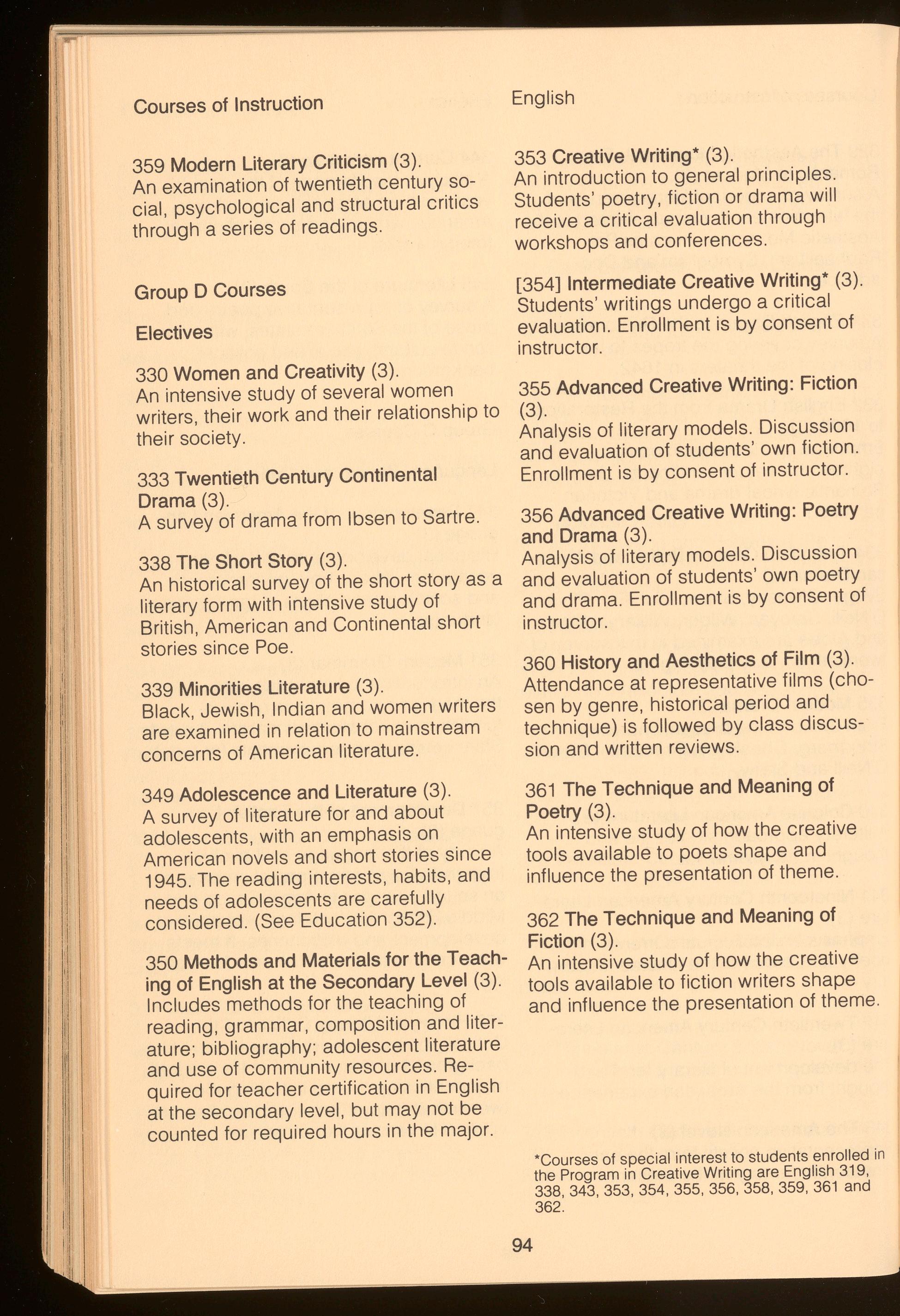
Courses of Instruction
363 Special Studies Seminar (3) . _
An invest igat ion of special interest topics which differ in content each semester , to be arranged at the discretion of the Department . No student may offer mo re t han six hours in such seminars in the basic thirty hours required for the major .
364IndependentStudy(1 , 2 , 3) .
A tutor ial course designed for selected students . Enrollment is by permission of the Chairman of the Department.
365 Advanced Composition(3)
Various theories of rhetoric are applied to actual writing problems Ancillary material for composition classes.
366 Film Studies (3).
Emphasis on the aesthetics of the short su bject , newsreels , documentaries , educ at ional films and ex perimental f ilms
367 Writingfor Businessand the Professions(3)
Communication for the professional world , examined with emphasis on the memorandum , report and business letter .
370 Bibliographyand Research (1 )
An intensive introduction to the tools of research in literature . This course is especially recommended for students ex pecting to undertake graduate work.
3 71 Bibliographyand Research (3)
In an individual bibliographical project, this course provides an intensive use of scholarly tools.
Group E Courses
Honors
390 Honors Course (3) .
A read ings course designed for selected juniors. Admission by invitation of the Department.
Geography
391-392 Honors Course (3-3)
A tutorial program offered to selected students by invitation of the Department .
393-394 Honors Course (3-3).
A read ings course designed for selected students and by i nvitation of the Department.
Geography
201 World Geography (3) .
A study of the world by regions, with emphasis on the cultural differences among nations .
301 EconomicGeography (3)
A study of the distribution of economic resources , the trade result ing from these sources, their cause and effect .

Health and Physical Education
Richard E Humbert , Chairman Professors Humbert , McNeal Associate Professors Chapman , Eastman , Hardy , Jordan , McMoran, Pate, Rohaly Instructors Doyle , Higgins , Hotchk iss
Health Educationconcentrationfor the VirginiaCollegiate ProfessionalTeaching CertificateNK-12
(1) Twenty-seven semester hours in HPE to include the following courses: 231 , 332,355 , 356,357 , 365 , 370 , 371 , 387 .
(2) Nineteen semester hours in the sciences to include the following : Biology 101-102, 301 , and Chem istry 103-104
(3) Fourteen semester hours in Behavioral and Social Sciences to include the following : Psychology 101 , 331 , 332 and Sociology 201 (4) Twelve semester hours in Education to include the following: Education 323 , 324 , 339 (5) For
Courses of Instruction
certification to teach driver education
HPE 348 and 360 must be taken (6)
University -wide proficiency, basic knowledge and distributional requirements are as designated for the Bachelor of Arts degree but must include the following:
History 205 or 206 and Speech. No grade lowe r than C in the twenty-seven semester hours of HPE course work A cumulative grade point average of at least 2 .200 is required for admission to practice teaching program.
PhysicalEducationconcentrationfor the
VirginiaCollegiateProfessionalTeaching
CertificateK-12
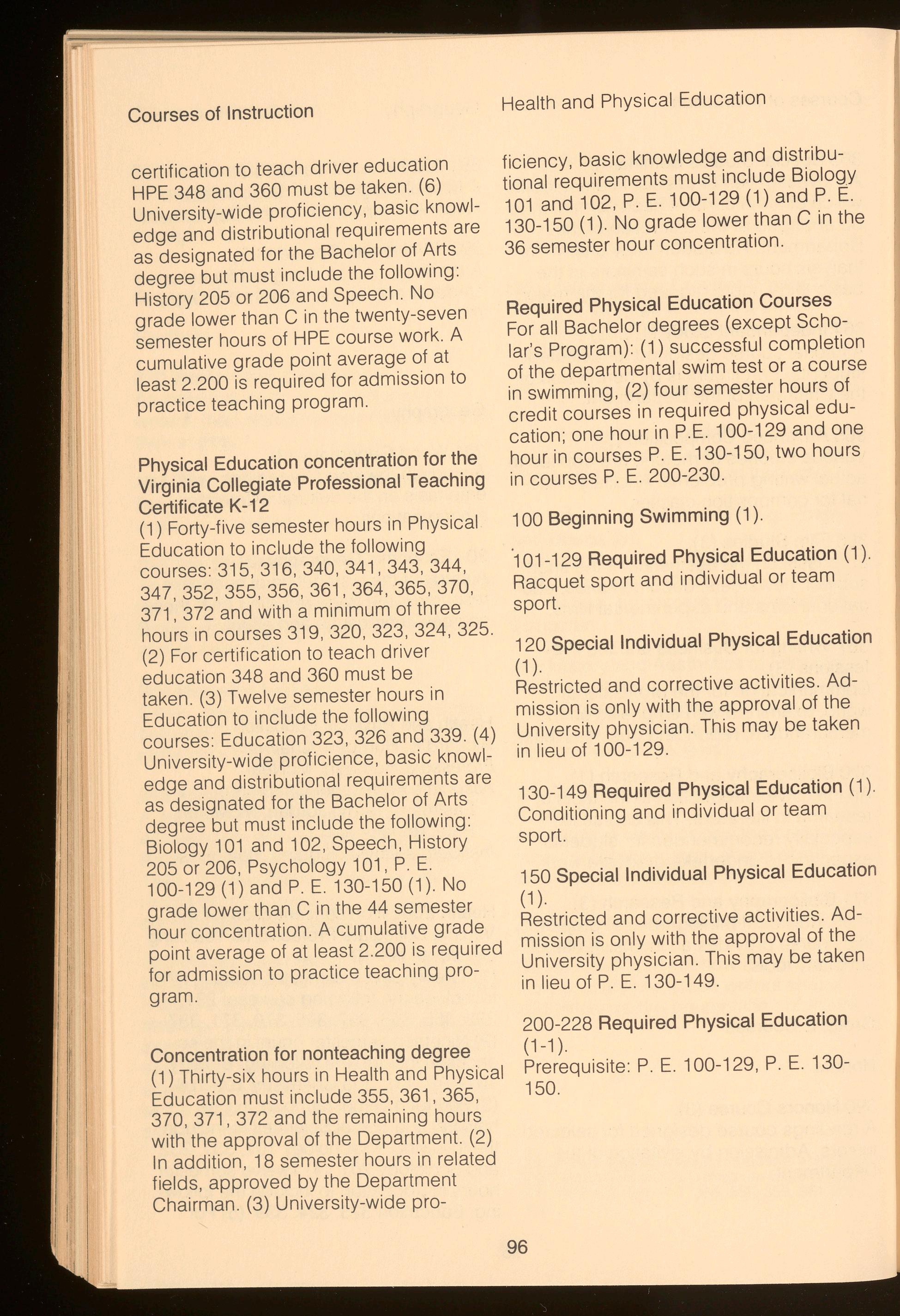
Health and Physical Education
ficiency, basic knowledge and distributional requirements must include Biology 101 and 102 , P E. 100-129 (1) and P . E 130-150 (1 ) No grade lower than C in the 36 semester hour concentration .
RequiredPhysical EducationCourses
For all Bachelor degrees (except Scholar' s Program) : (1) successful completion of the departmental swim test or a course in swimming, (2) four semester hours of credit courses in required physical education; one hour in P .E 100-129 and one hour in courses P. E 130-150, two hours in courses P. E. 200-230.
100 BeginningSwimming(1).
(1) Forty-five semester hours in Physical Education to include the following courses : 315 , 316 , 340 , 341 , 343,344 , 347 , 352 , 355 , 356 , 361 , 364 , 365 , 370 , 371 , 372 and with a minimum of three hours in courses 319 , 320 , 323 , 324 , 325 (2) For ce rtific ation to tea c h dri ver educ ation 348 and 360 mu st be tak e n (3) Twelve semester hours in Education to inc lude the following courses : Education 323 , 326 and 339 (4) University-wide proficience, basic knowledge and distributional requirements are as de signated for the Bachelor of Arts degree but mu st include the following : Biology 101 and 102, Speech , History 205 or 206 , Psychology 101 , P E. 100-129 (1) and P E. 130-150 (1) . No grade lowe r than C in the 44 semeste r hour c oncentrati o n A cumulative grade point average of at least 2 200 is required for admission to prac t ice te ac hing program .
Concentration for nonteaching degree
(1) Thirty-si x hours in Health and Physical Education mu st include 355 , 361 , 365 , 370 , 371 , 372 and the remaining ho urs with the approval of the Department. (2) In addition , 18 semester hours in related fields , approved by the Department Chairman (3) University-wide pro-
101- 129 Required PhysicalEducation(1 ) . Racquet sport and individual or team sport.
120 Special IndividualPhysical Education (1).
Restricted and corrective activities. Admission is only with the approval of the University physician. This may be taken in lieu of 100 - 129
130-149 Required PhysicalEducation (1) Conditioning and individual or team sport.
150 Special IndividualPhysicalEducation ( 1).
Restricted and corrective activities. Admission is only with the approval of the University physician. This may be taken in lieu of P E 130-149 .
200-228 Required PhysicalEducation (1-1)
Prerequisite : P. E 100-129, P. E 130150
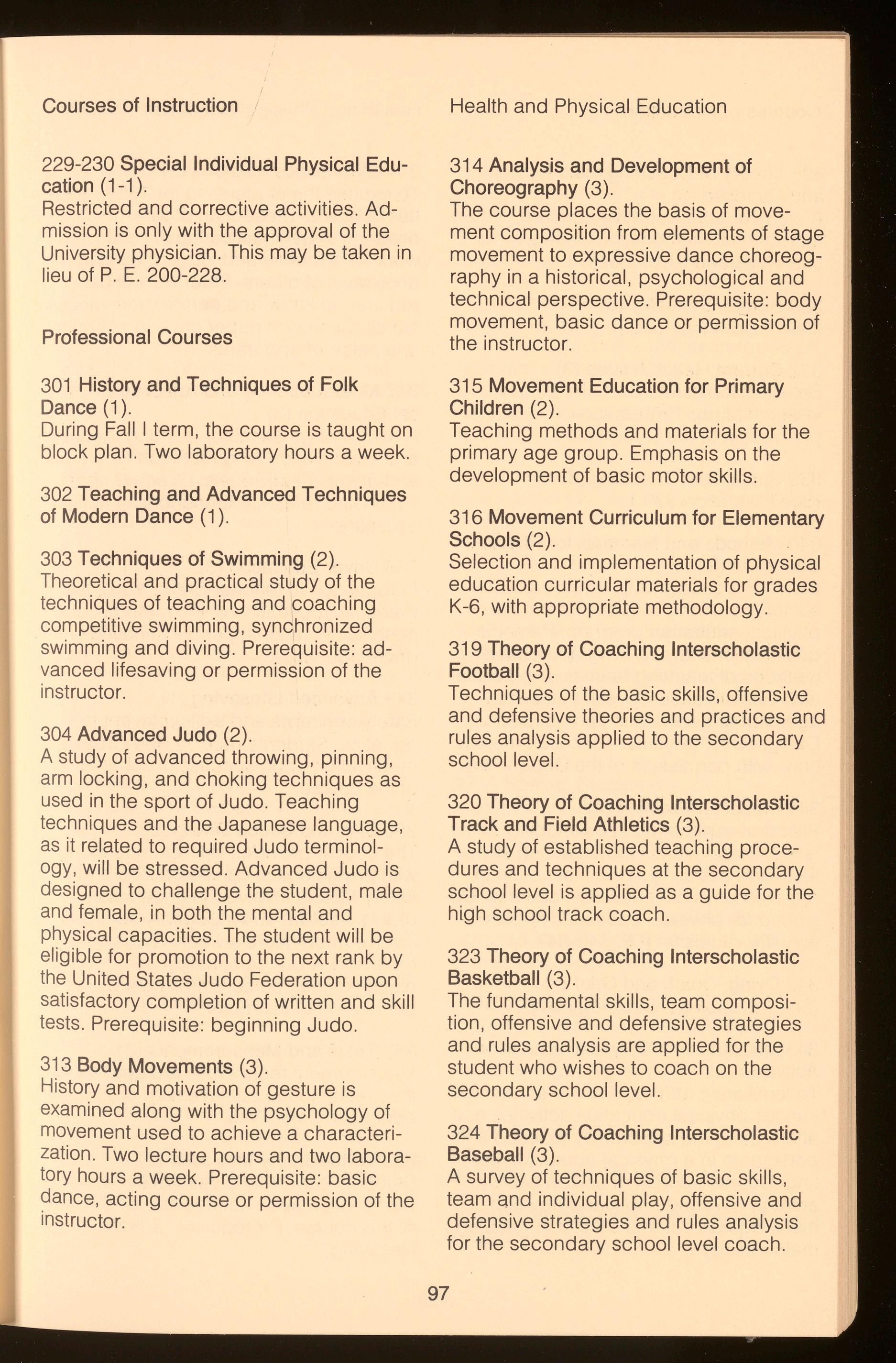
Coursesof Instruction
229-230 Special IndividualPhysicalEducation(1-1) . Restricted and corrective activities . Adm ission is only with the approval of the University physician. This may be taken in lieu of P E 200 -228 .
ProfessionalCourses
3 01 Historyand Techniquesof Folk Dance (1 ) .
Du ring Fall I term , the course is taught on bl ock plan . Two laboratory hours a week .
302 Teaching and AdvancedTechniques of Modern Dance ( 1) .
303 Techniquesof Swimming(2)
Theo retical and practical study of the tec hniques of teaching and coaching com petitive swimming, synchronized swi mming and diving Prerequisite : advan ced lifesaving or permission of the inst ructor.
304 AdvancedJudo (2) .
A st udy of advanced throwing , pinning, arm locking , and choking techniques as used in t h e sport of Judo . Teaching tech niques and the Japanese language, as it related to required Judo terminology, will be stressed . Advanced Judo is desi gned to challenge the student , male and f emale, in both the mental and phy s ical capac ities . The student will be eligib le for promotion to the next rank by the United States Judo Federation upon satisfactory completion of written and skill tests . Prerequisite : beginning Judo
313 Body Movements(3)
Histo ry and motivation of gesture is exami ned along with the psychology of movement used to achieve a characterization Two lecture hours and two laboratory ho urs a week Prerequisite : basic dance, act i ng course or permission of the instructor.
Health and Physical Education
314 Analysisand Developmentof Choreography(3).
The course places the basis of movement composition from elements of stage movement to expressive dance choreography in a historical, psychological and technical perspective. Prerequisite : body movement, basic dance or permission of the instructor.
315 Movement Educationfor Primary Children(2)
Teaching methods and materials for the primary age group. Emphasis on the development of basic motor skills .
316 Movement Curriculumfor Elementary Schools(2) .
Selection and implementation of physical education curricular materials for grades K-6, with appropriate methodology
319 Theory of Coaching Interscholastic Football(3)
Techniques of the basic skills, offensive and defensive theories and practices and rules analysis applied to the secondary school level.
320 Theory of Coaching Interscholastic Track and Field Athletics(3) .
A study of established teaching procedures and techniques at the secondary school level is applied as a guide tor the high school track coach
323 Theory of Coaching Interscholastic Basketball(3)
The fundamental skills , team composition, offensive and defensive strategies and rules analysis are applied tor the student who wishes to coach on the secondary school level.
324 Theory of Coaching Interscholastic Baseball(3) .
A survey of techniques of basic skills , team and individual play , offensive and defensive strategies and rules analysis for the secondary school level coach .
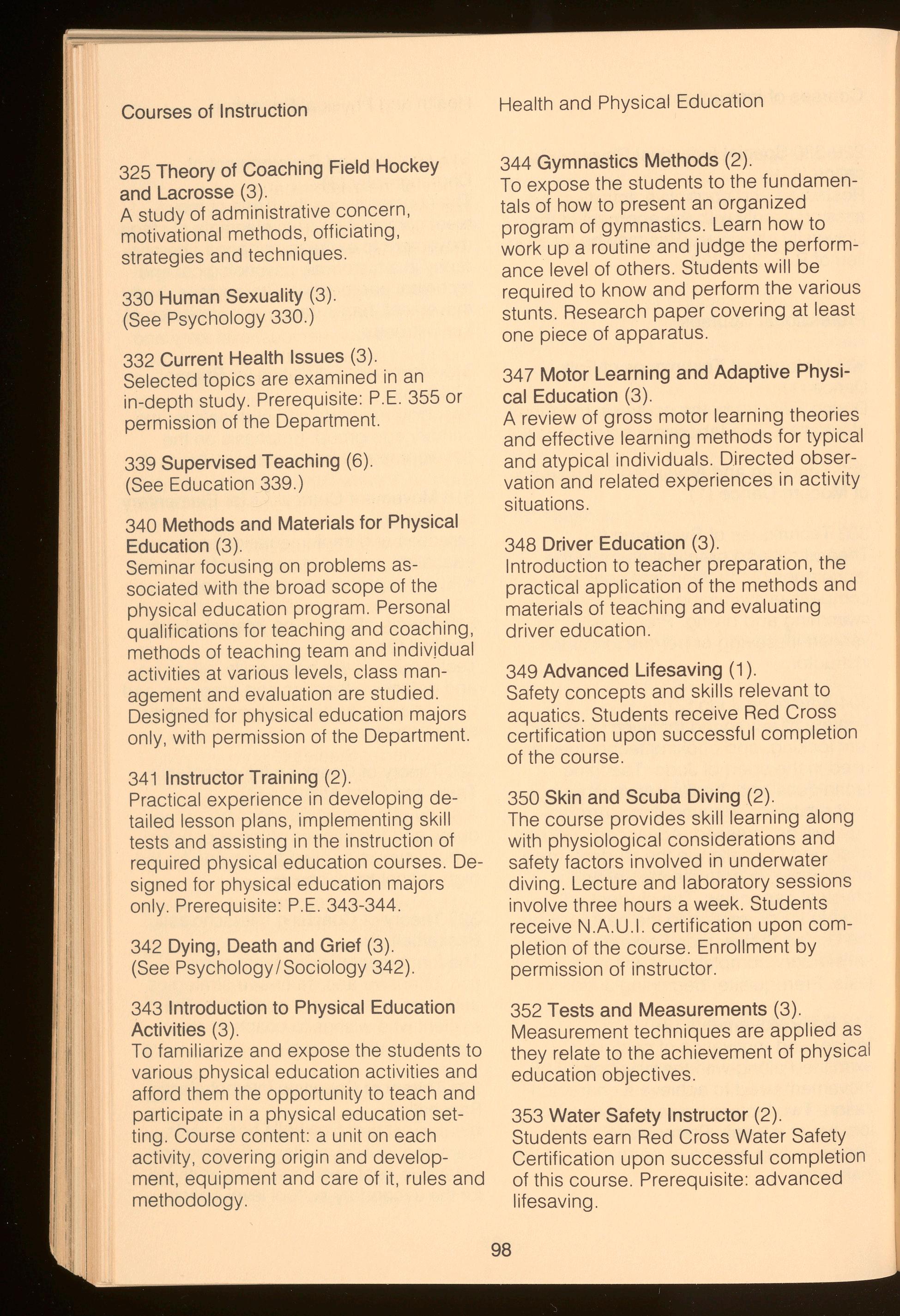
Coursesof Instruction
325 Theory of CoachingField Hockey and Lacrosse(3) .
A study of administrative concern , motivational methods , officiating, strategies and techniques.
330 Human Sexuality(3) . (See Psychology 330 )
332 Current Health Issues (3)
Selected topics are e x amined in an in-depth study . Prerequisite: P E. 355 or permiss ion of the Department.
339 SupervisedTeaching (6).
(See Education 339 )
340 Methodsand Materialsfor Physical Education(3) .
Seminar focusing on problems assoc iated w ith the broad scope of the physical educat ion program . Personal qualifications for teaching and coaching , methods of teaching team and indiv i dual activities at various levels , class management and evaluation are studied . Designed for physical education majors only , with permission of the Department.
341 InstructorTraining (2)
Practical e x perience in developing detailed lesson plans , implementing skill tests and assisting in the instruction of required physical education courses . Designed for physical education majors only. Prerequisite : P.E. 343-344
342 Dying, Death and Grief (3).
(See Psychology / Sociology 342) .
343 Introductionto PhysicalEducation Activities(3)
To fami l iarize and e x pose the students to various physical educat ion activities and afford them the opportunity to teach and participate in a physical education setting Course content: a unit on each activity , covering origin and development, equipment and care of it , rules and methodology .
Health and Physical Education
344 GymnasticsMethods (2) .
To e x pose the students to the fundamentals of how to present an organized program of gymnastics. Learn how to work up a routine and judge the performance level of others Students will be required to know and perform the various stunts Research paper covering at least one piece of apparatus .
34 7 Motor Learningand Adaptive Physical Education(3)
A review of gross motor learning theories and effective learning methods for typical and atypical individuals. Directed observation and related experiences in activity situations
348 Driver Education (3).
Introduction to teacher preparation , the pract ical application of the methods and materials of teaching and evaluating dr iver education
349 Advanced Lifesaving(1 )
Safety concepts and skills relevant to aquatics Students receive Red Cross certification upon successful completion of the course
350 Skin and Scuba Diving (2)
The course provides skill learning along with physiological considerations and safety factors involved in underwater diving Lecture and laboratory sessions involve three hours a week Students receive NAU .I. certification upon completion of the course. Enrollment by permission of instructor
352 Tests and Measurements (3)
Measurement techniques are applied as they relate to the achievement of physic al education objectives .
353 Water Safety Instructor(2).
Students earn Red Cross Water Safety Certification upon successful completion of this course . Prerequisite: advanced lifesaving.

Coursesof Instruction
354 Aquatics Programmingand Management ( 1 ) .
Advanced concepts in the operation of aquatics programs and theory of coaching swimming. Prerequisite: Water Safety Instructor Certification or permission of the instructor .
355 Health Problems (3).
Study of the physical, emotional and social health problems facing individuals in society.
356 Principlesof Health (3)
This course provides foundations for administration, curriculum development and teaching techniques in school health programs .
357 CommunityHealth (3).
A study of the fundamentals of public health practices . Emphasis on community health problems of economic and social significance on the local, state and national levels; programs and agencies designed to assist in solving these problems.
360 General Safety (3).
Discussion of the basic problems, principles and programs of safety
361 Principlesof PhysicalEducation(3).
Survey of the historical development and examination of the contemporary purposes of physical education.
364 Organizationand Administrationof PhysicalEducationand Athletics(3).
Study of the administrative and organizational problems peculiar to physical education and athletics
365 FirstAid and Preventionand Treatmentof Athletic Injuries(3).
Training in the prevention, treatment and care of athletic injuries and Red Cross standard first aid.
Health and Physical Education
370 Human Anatomy (3).
Study of the anatomical structure of human bodily systems, with particular emphasis on aspects of the human anatomy utilized in exercise situations
371 Physiologyof Exercise (3) .
Functional study of the circulatory, digestive , respiratory, nervous , excretory and muscular systems of the human body and an examination of the physiological responses related to physical activities and sports training.
372 Kinesiology(3).
Study of the skeletal, nervous and muscular systems and their relationship to body movement in sport and exercise. Principles of physics are utilized to aid in analyzing sports activities.
387 Seminar in Drug Education(3).
In-depth analysis of drugs, the drug user, and drug-related problems in our society. Emphasis on the teacher's role in assisting students in decision-making processes. (See Education 387).
390A Special Studies (1 ).
Independent study or research on selected topics. Enrollment is by permission of the Department .
390B Special Studies (2).
Independent study or research on selected topics. Enrollment is by permission of the Department.
390C Special Studies (3).
Independent study or research on selected topics. Enrollment is by permission of the Department.
IntercollegiateAthletics
021-022 Varsity Football(1-1 ).
023-024 Varsity Cross Countryand Track (1-1).
Coursesof Instruction
025-026 Varsity Basketball( 1-1) .
028 Varsity Baseball (1).
029-030 Varsity Rifle (1-1).
031-032 VarsityTennis (1-1).
033-034 Varsity Golf ( 1-1) .
035-036 Varsity Swimming(1-1)
037-038 Varsity Wrestling(1-1).
039 VarsitySoccer (1).
041-042 Orchesis( 1-1) .
043-044 Aquanettes(1-1).
045 Field Hockey (1)
048 Lacrosse( 1) .
050 Archery( 1) .

History
J. R Rilling, Chairman
Professors Bolt , Gregory, Rilling, Ryle, Underhill, Ward, Westin
Associate Professor Thorn
Assistant Professors Bak, Bogle , Evans, Gordon
Instructor H. West
Concentration
Twenty-seven semester hours in history, excluding History 105-106 and 115-116, are required, with a grade of C or better in each course. At least six hours must be in U.S. history and six hours in non-U.S history . The history major may satisfy requirements through course work or by successfully passing appropriate departmental "Credit by Examination" tests, or presenting a score of 4 or 5 on the Advanced Placement Examination. The distributional requirement in U.S
History
history may be satisfied without credit by presenting CEEB scores of 600 or above. Any history course except Honors and Independent Study courses may, at the. instructor's prerogative, require prerequisites or the instructor's permission. Some students may be advised to take a survey course before beginning a 300-level course.
105-106 Ideas and Institutionsof Western Civilization(3-3) .
A topical study of the European heritage. The first semester covers classical Greece through the Reformation, while in the second semester students examine the Age of Absolutism to the present. No student may take both History 105-106 and History 115-116 for credit.
115-116 The Developmentof Modern EuropeanCivilization(3-3) . .
The intellectual, institutional and pol1t1cal sources of the modern world. In the first semester, students study the Renaissance through the Napoleonic Era: the second semester covers the Congress of Vienna to the present. No student may take both History 105-106 and History 115-116 for credit.
205-206 United States History (3-3).
A survey of the discovery of the New World to the Civil War is covered in the first semester: the Civil War to the present is examined in the second semester.
[228] ContemporaryProblems (1 ). Discussion meetings center on current issues in their historial setting.
[271] Introductionto Asian Civilization(3).
A study of the development of Oriental civilization up to the nineteenth century .
[272] Modern Historyof Asia (3) . Examination of political, social and economic development during the nineteenth and twentieth centuries.
Coursesof Instruction
[301) Historyof Latin America to 1810 (3).
The discoveries, the native populations and cultures , the European background, the conquest, the transfer of institutions, the Enlightenment in Latin America , and the background to Independence.
[302) Historyof Latin America Since 1810 (3)
Study of the Independence movements, thei r legacy and the interplay of personality, institutions, events and ideals in the ma king of modern Latin America.
305 Historyof the Civil War and Reconstruction (3).
Focus on slavery and the sectional controversy, secession and the war and the po lit ical , economic and social problems of Reconstruction Prerequisite : History 205-206.
307 Topics in Nineteenth Century European History(3) .
Intensive examination of historical problems from the period 1815 to 1914, selec ted on the basis of student interest.
[309 ) The Old South (3).
Study of the political, economic , social and c ultural developments in the South, with emphasis on the period from 1790 to 1850. Prerequisite: History 205-206.
310 The New South (3)
A su rv ey of the life in the former slave states from the end of Reconstruction to the middle of the twentieth century. Prerequisite : History 206 .
311 The Medieval Church (3).
Cultu ral , social and political aspects of relig ious life in the Middle Ages .
[312) The Development of Feudal Monarchies(3).
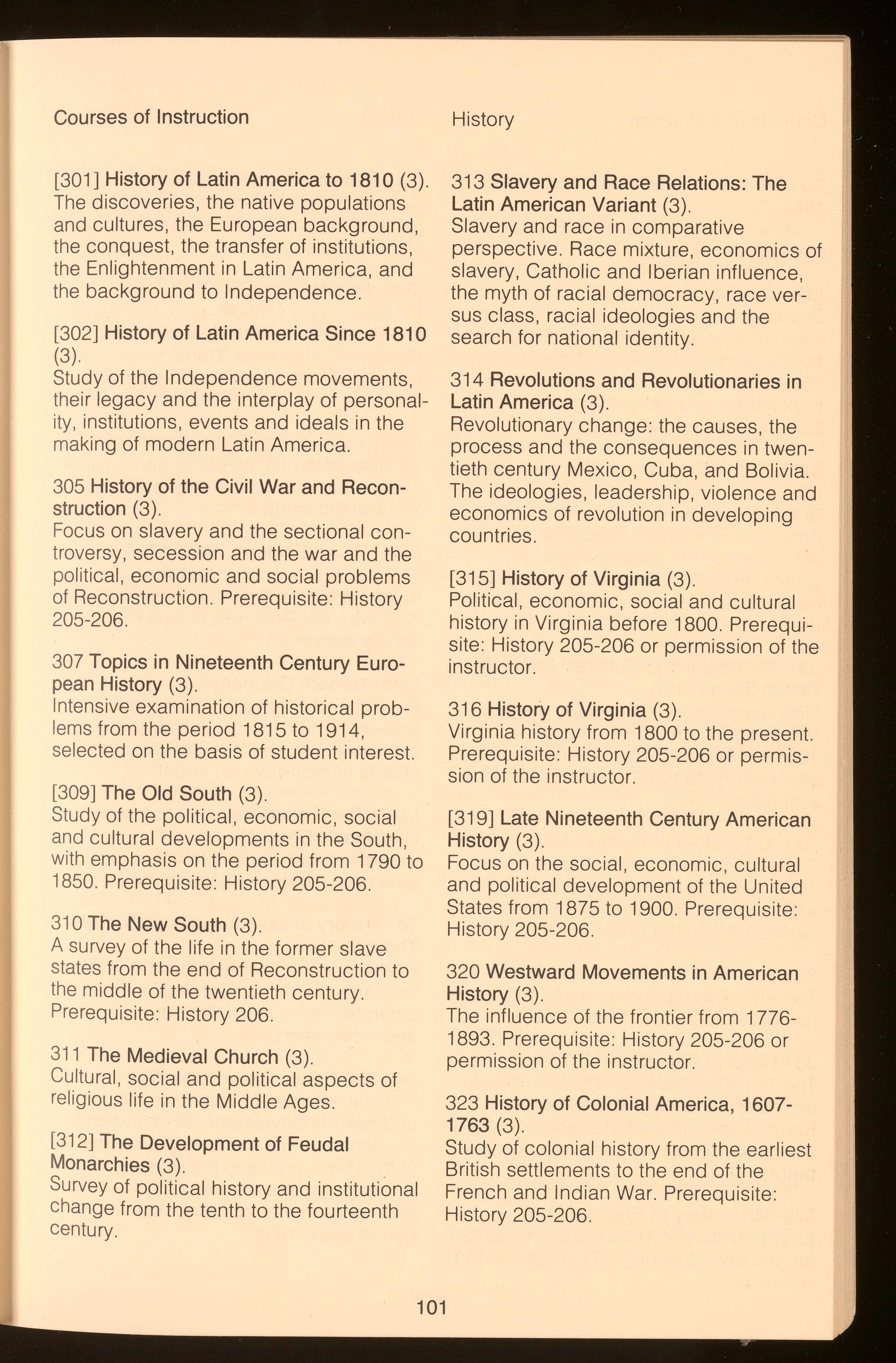
.
Survey of political history and institutional cha nge from the tenth to the fourteenth cent ury .
History
313 Slavery and Race Relations:The Latin American Variant (3)
Slavery and race in comparative perspective Race mixture, economics of slavery , Catholic and Iber ian influence , the myth of racial democracy, race versus class, racial ideologies and the search for national identity.
314 Revolutionsand Revolutionariesin Latin America (3).
Revolutionary change: the causes, the process and the consequences in twentieth century Mexico , Cuba , and Bolivia
The ideologies, leadership , violence and economics of revolution in developing countries.
[315) Historyof Virginia (3) .
Political, economic, social and cultural history in Virginia before 1800. Prerequisite: History 205-206 or permission of the instructor.
316 Historyof Virginia (3) . Virginia history from 1800 to the present. Prerequisite : History 205-206 or permission of the instructor .
[319) Late Nineteenth Century American History(3).
Focus on the social , economic , cultural and political development of the United States from 1875 to 1900. Prerequisite: History 205-206
320 Westward Movements in American History(3)
The influence of the frontier from 17761893. Prerequisite: History 205-206 or permission of the instructor .
323 Historyof Colonial America, 16071763 (3) .
Study of colonial history from the earliest British settlements to the end of the French and Indian War Prerequisite : History 205-206.

Courses of Instruction
[326) American IntellectualHistorySince 1865 (3). Ideas and their impact on the development of American life .
[328] Historyof Canada (3).
Deve lopment of Canad ian soc iety and state , emphasizing fa c tors of geography , politics and econo m ics ; influen c es from France and Great Britain , problems of regiona l ism and nationalism , and Canadian-American relations .
[330] BritishEmpire and Commonwealth (3)
British imperialism from the end of the American Revolution through the development of the modern Commonwealth . Areas of prin c ipal coverage will be Canada , India , Australia , Afr ica and the Middle East .
331 -332 Social and CulturalHistoryof the UnitedStates (3-3)
First semester students study colonial times to 1865; in the second semester 1865 to the present is covered Prerequisite: History 205-206 or permission of the instructor.
333-334 Historyof Russia (3-3)
The establishment of the Kievan state to 1855 is examined in the first semester , while the second semester covers the period 1855 to the present .
336 The American Revolution(3)
The War of Independence and the formation of the Republic, 1763 - 1788 .
337 Historyof the Soviet Union (3).
The Tsarist collapse and Bolshevik victory , Stalin' s rise in influence and Khrushchev ' s rise and fall are examined with an emphasis on domestic policies before 1967 .
339-340 Historyof England(3-3)
English history to 1603 in the first semester: the period since 1603 in the second semester.
History
[341] Renaissance (3).
Culture , politics , religions, economics, modern science and overseas expansion of the Renaissance.
[342] Reformation(3).
Protestant and Catholic reformations and their impact on pol itical , social and economic cond itions . Considerable attention is given to religious and political thought.
[343] Tudor England, 1485-1603 (3)
Political , institutional , social and cultural study emphasizing the reigns of Henry VIII and Elizabeth I
[344] Stuart England, 1603-1714 (3)
Emphasis on a conflict between the Stuarts and Parliament, Cromwell and th e Civil War , the Restoration , and Revolutionary settlement.
[345] Modern Germany (3) . Prussia and Germany from 1848 to the present. Emphasis on unification political movements, Nazism and origins and effects of World Wars I and 11
[346] The French Revolutionaryand NapoleonicEras (3) . Intensive examination of the French experience and its impact on Europe.
34 7 Historyof Communistand Socialist Thought (3) . Examination of Utopian Socialism, Marxism, Anarchism and Communism concentrates on nineteenth century theories and movements
349-350 Britain Since 1714 (3-3)
Political , economic, social, coi1stitutional and cultural developments in England, Scotland and Ireland from the accessio n of the Hanoverians to the present. First semester covers the period 1714-1832 : second semester concentrates on the period since 1832
Coursesof Instruction

[351) IntellectualHistoryof Europe (3).
The impact of ideas on European life from the Enlightenment to the Russian Revolution.
353-354 American DiplomaticHistory (3-3).
Study of American foreign relations from colonial times stressing popular reactions and diplomacy. Second semester focuses on the twentieth century.
355 The Modern Middle East (3).
A survey of the Middle East from the last years of the Ottoman Empire to the present. Emphasis on culture, Zionism, Arab nationalism, diplomacy and the Arab-Israeli conflict.
[357-358) American Church History(3-3). Religious institutions and activities are studied in relation to the social, economic and political environment. First semester examines church history to 1830; second semester covers the period since 1830.
359-360 Historyof Early Modern Europe, 1600-1789 (3-3) . The secularization of European thought and institutions, the centralization of the absolutist states and the influence of the new science on intellectual and cultural change . First semester includes the period 1600-1688; second semester covers 1688-1789.
361-362 The United States in the TwentiethCentury(3-3).
Survey of domestic history from the Progressive Era to the present. First semester emphasizes internal reform and economic and political events to 1932; second semester concentrates on Roosevelt and the postwar era. Prerequisite: History 206.
History
[363) The United States and East Asia (3).
American-East Asian relations from the eighteenth century to the present with emphasis on the interaction of peoples and governments.
365 Research Seminar (3).
Research is offered for majors in either American or European history in alternate semesters.
367-[368] Historyof TwentiethCentury Europe (3-3)
Topical examination of significant developments and trends in Europe and the world. First semester examines diplomacy since Bismarck; second semester emphasizes personalities .
[369] Americansfrom Africa (3).
Survey of American history with emphasis on the role in American life of persons with African origins.
[371-372) Introductionto Chinese Civilization and Historyof Modern China (3-3). First semester examines China to the mid-nineteenth century; second semester covers the nineteenth century to the present.
374 Historyof Greece (3).
Survey of Greek history from the Bronze Age to the Roman conquest. Emphasis on the development of Greek institutions, especially the Athenian democracy.
375 Historyof the Roman Republicand Empire (3) .
Survey of Roman history from the founding of Rome to the collapse of the Empire. Emphasis on the development of Roman institutions from city state to empire.
377 Introductionto Japanese Civilization (3).
Development of Japan to the nineteenth century.
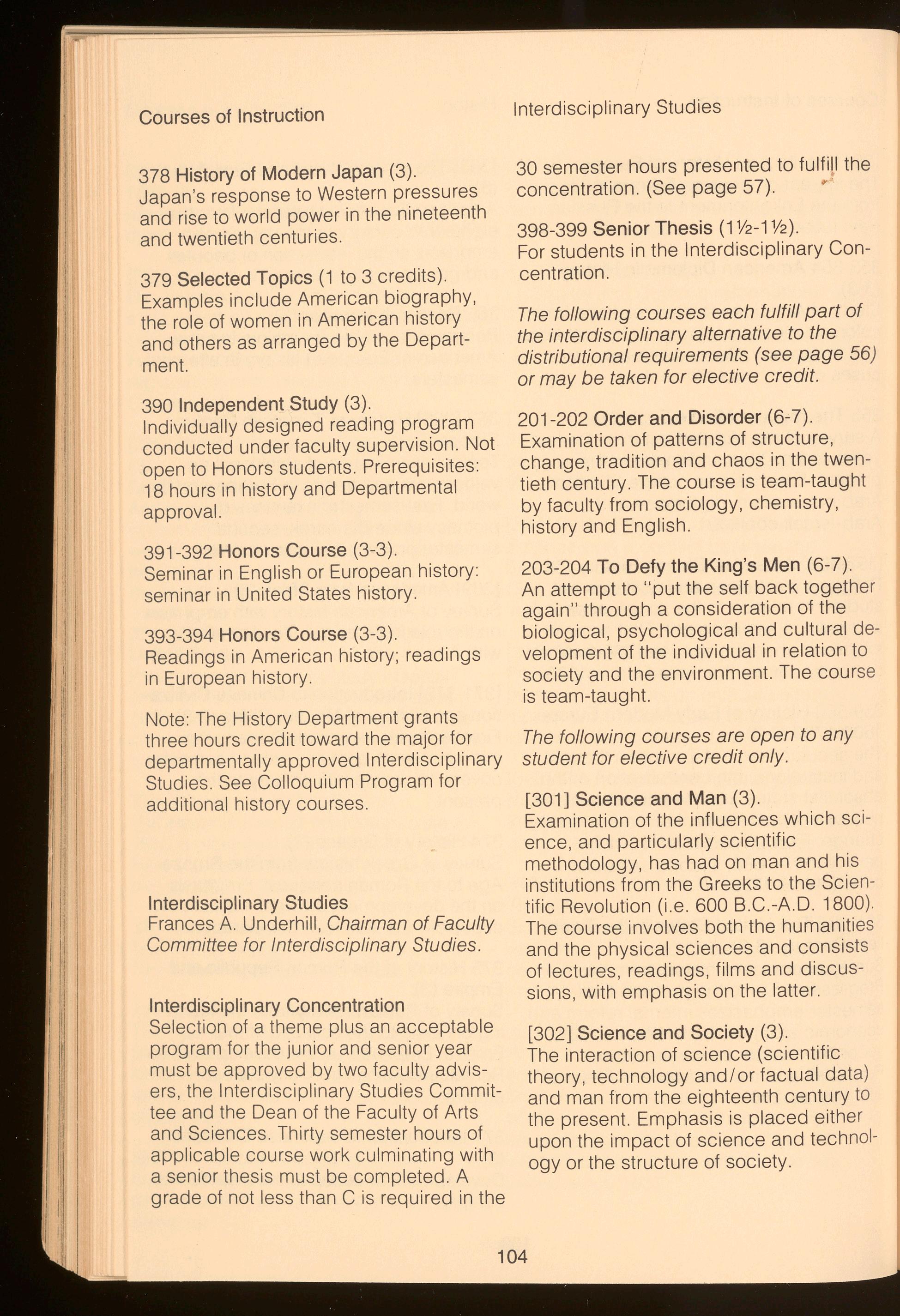
Coursesof Instruction
378 Historyof ModernJapan (3). Japan's response to Western pressures and rise to world power in the nineteenth and twentieth centuries.
379 Selected Topics (1 to 3 credits). Examples include American biography, the role of women in American history and others as arranged by the Department.
390 IndependentStudy (3).
Individually designed reading program conducted under faculty supervision. Not open to Honors students. Prerequisites: 18 hours in history and Departmental approval.
391-392 HonorsCourse (3-3).
Seminar in English or European history: seminar in United States history.
393-394 HonorsCourse (3-3).
Readings in American history; readings in European history.
Note: The History Department grants three hours credit toward the major for departmentally approved Interdisciplinary Studies. See Colloquium Program for additional history courses.
InterdisciplinaryStudies
Frances A. Underhill, Chairman of Faculty Committee for Interdisciplinary Studies.
InterdisciplinaryConcentration
Selection of a theme plus an acceptable program for the junior and senior year must be approved by two faculty advisers, the Interdisciplinary Studies Committee and the Dean of the Faculty of Arts and Sciences. Thirty semester hours of applicable course work culminating with a senior thesis must be completed. A grade of not less than C is required in the
Interdisciplinary Studies
30 semester hours presented to fulfill the concentration. (See page 57). ,.
398-399 Senior Thesis ( 1½-1 ½).
For students in the Interdisciplinary Concentration.
The following courses each fulfill part of the interdisciplinary alternative to the distributional requirements (see page 56) or may be taken for elective credit.
201-202 Order and Disorder (6-7).
Examination of patterns of structure, change, tradition and chaos in the twentieth century. The course is team-taught by faculty from sociology, chemistry, history and English.
203-204 To Defy the King's Men (6-7).
An attempt to "put the self back together again" through a consideration of the biological, psychological and cultural development of the individual in relation to society and the environment. The course is team-taught.
The following courses are open to any student for elective credit only.
[301] Science and Man (3).
Examination of the influences which science, and particularly scientific methodology, has had on man and his institutions from the Greeks to the Scientific Revolution (i.e. 600 B.C.-A.D. 1800). The course involves both the humanities and the physical sciences and consists of lectures, readings, films and discussions, with emphasis on the latter.
[302] Science and Society (3).
The interaction of science (scientific theory, technology and/or factual data) and man from the eighteenth century to the present. Emphasis is placed either upon the impact of science and technology or the structure of society.
Coursesof Instruction
(311] Reading Science Fiction(3).
How accurate is the science? How believable is the fiction? Is science fiction only an escape or does it represent a projection for the future and a mirror for the present? Discussion of science-fiction literature, films and television programs.
312 Tolkien'sTrilogy and Modern Myth (3).
Tolkien's works are used as a vehicle for explor ing significant myths, motifs and cultura l themes from representative civilizatio ns.
(314] Anticipating2000: The Study of the Future(3) .
An exploration of the issues, concepts and methodologies of futurism
316 Where Angels Fear to Tread: Modern Incompetence(3).
An examination of incompetence as a major force in twentieth-century developme nt. Incompetent types are analyzed in social, religious and political spheres.
328 EnglishLegal History(2).
Survey of the rise and development of legal institutions and common law in England from 1066 to about 1800. Focus on var ious legal aspects of the English constitution within this period. Designed to furnish an historical perspective for study of modern American legal and Constitutional problems.
364 Texture of the Medieval World (3)
A study of the visual aspects of the Middle Ages and their interrelationships: the land, towns, churches and cathedrals, roads and rivers.
[375] Law and Medicine (2).
Examination of -tort liability of the physician and the problems of abortion, artificial insemination and voluntary steriliza- tion.
Journalism
382 Roman Law (2).
The rise and development of the Roman law from its beginnings in Republican Rome through its development into a highly sophisticated legal system during the Principate, its codification under Justinian, its revival in medieval Italy and France, its reception into Germany in the sixteenth to eighteenth centuries and its spread into Latin America.
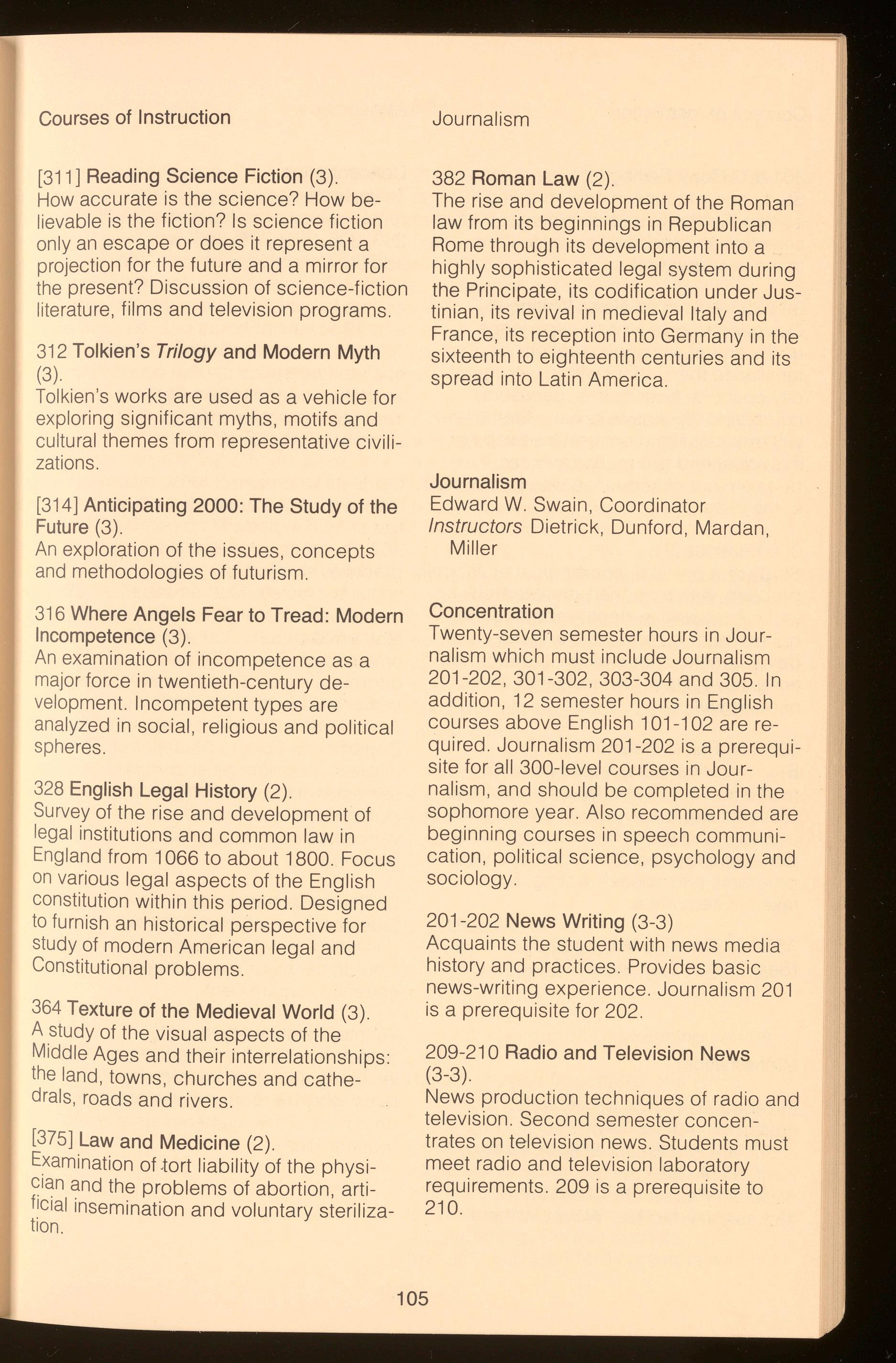
Journalism
Edward W. Swain, Coordinator Instructors Dietrick, Dunford, Mardan, Miller
Concentration
Twenty-seven semester hours in Journalism which must include Journalism 201-202, 301-302, 303-304 and 305. In addition, 12 semester hours in English courses above English 101-102 are required. Journalism 201-202 is a prerequisite for all 300-level courses in Journalism , and should be completed in the sophomore year. Also recommended are beginning courses in speech communication, political science, psychology and sociology.
201-202 News Writing (3-3)
Acquaints the student with news media history and practices. Provides basic news-writing experience. Journalism 201 is a prerequisite for 202.
209-210 Radio and Television News (3-3).
News production techniques of radio and television. Second semester concentrates on television news. Students must meet radio and television laboratory requirements. 209 is a prerequisite to 210.
Courses of Instruction
301-302 Copy Editing(6).
Study and practice in copy reading, editing, fundamentals of makeup, picture selection and the libel laws. Must be taken in sequence.
303-304 Advanced News Writing (6).
Designed to give writing experience under actual working conditions and to familiarize the student with coverage of city councils, boards of supervisors, courts and legislative bodies. Stories are written on assignment and followed by individual and group conferences. May be taken out of sequence with permission of the instructor.
305 Seminar (3)
Study of a political, sociological or ethical problem, with emphasis on research techniques and in-depth reporting. Required reading includes the history and development of journalism, current practices, newspaper law and other aspects of news writing.
307-308 Public Relations(6).
Brief historical perspective on public relations-its philosophy and practices. Practical exercises include preparation of publicity and press releases, annual reports, employee publications, identity programs and speech writing. Must be taken in sequence.
353-354 Creative Writing (3-3).
(See English 353 and 354.)

Mathematics
Elizabeth 8. Taylor, Chairman Professors Atkins, Taylor
Associate Professors Bowen, Grable, Kent, Monk, Stokes
Assistant Professors Charlesworth, McLaughlin, McRae, Willett, Withers
Mathematics
Concentration
Thirty semester hours in mathematics are required including Mathematics 251-252 , 253, 305, 306, 320, 398, and nine additional semester hours at the 300 level, including at least one three hour course for which 320 is a prerequisite and 18 semester hours in a related field. A grade of not less than C is required in each mathematics course counted toward the concentration. The entire concentration program must have departmental approval.
Students who expect to be recommended for graduate study in mathematics should include Mathematics 3'52 and 362. Students who wish to pursue graduate study in computer science should complete Mathematics 297-298 by the end of their junior year; also Mathematics 328, 329 and 352 are recommended For the Bachelor of Arts degree, a student must complete six semester courses in the same or in closely related fields, as approved by the Department. For the Bachelor of Science degree, a student must complete six semester courses in laboratory sciences , including at least two semesters of advanced science approved by the Department.
52 Plane Geometry (O).
Selected topics from Euclidean geometry. May be required of students who do not meet the mathematics entrance requirement.
75 Intermediate Algebra (0).
Selected topics from high school algebra including sets, logic and number systems. May be required of students who do not meet the mathematics entrance requirement.
Coursesof Instruction

10 1 FiniteMathematics I (3)
Topic s in finite mathematics appropriate for Bachelor of Arts degree candidates and a n introduction to computer programming Not open to students who have six or more semester hours college credi t in calculus
102 Finite Mathematics II (3).
Addition al topics in finite mathematics designe d to demonstrate the power of mathematical reasoning and some applications to natural and social sciences . Not op e n to students who have six or more semester hours college credit in calcu lus.
103 Intuitive Calculus (3).
Elementary concepts of differential and integral c alculus and their uses in selected ap plications. Only open to students who have not completed a 200level co urse.
104 Elementary Probabilityand Statistics (3).
Probability sufficient to provide an introduction to statistics, descriptive statistics , binomial and normal distributions and hypothes is testing. Not open to students who have completed a statistics course at the co llege level.
151 Pre-CalculusMathematics (3).
Properties of the real numbers, functions , topics from analytic trigonometry and analytic geometry.
203 Mathematicsof Finance (3) .
The theo ry of interest and discount, annuities and amortization, sinking funds, bond valuation , depreciation and life insuranc e Prerequisite: Mathematics 101 or 151.
Mathematics
205 Mathematicsfor Elementary Education (3)
. Introduction to the abstract concept of number , numeration and the mathematical development of number systems. An investigation of the mathematical concepts , which are basic in the elementary school curriculum. Prerequisite: sophomore standing or permission of the instructor.
229-230 Applicationsof Statistics(3-3)
Introduction to statistical methods with applications selected from many areas. Major topics include sampling, hypothesis testing, regression and analysis of variance. Optional use of the computer facilities offers flexibility for students of varied backgrounds . Prerequisites: si x semester hours of mathematics at the 100 level or three semester hours of calculus numbered 251 or above . Not open to students who have completed a statistics course above the 100 level . Mathematics 229 is prerequisite to 230
251-252 Calculus I and II (3-3)
Differential and integral calculus of functions of one independent variable. Prerequisite : Mathematics 151 or the equivalent. Mathematics 251 is prerequisite to 252.
253 Calculus Ill (4)
A study of the calculus of functions Qf several variables Prerequisite : Mathematics 252.
297-298 Computer ProgrammingI and II (3-3).
Algorithms and flowcharts. The BASIC language, including file processing. Standard FORTRAN : subroutines and function subprograms. Computers and computer systems Introduction to an assembly language . Elementary standard COBOL , with emphasis on structured programming. Course is concerned primarily with standard concepts which
Courses of Instruction
have wide applicability Projects often illustrate fundamental applications: students are encouraged to replace one or more of the assigned projects with projects from their own area of interest. Prerequisite : Calculus I or permission of the instructor. Mathematics 297 is prerequisite to 298 .
303 DifferentialEquations(3)
Methods of solution , ex istence and uniqueness theory and the qualitative approach in determining behavior of solutions Prerequisite : Mathematics 253
305 Linear Algebra (3)
A study of vector spaces, matrices , systems of linear equations and linear transformations Prerequisite : Mathematics 252.
306 Modern Algebra (3)
Introduction to basic algebraic systems , including groups , rings and fields. Prerequisite: Mathematics 305 .
311 Higher Geometry (3) .
Synthetic and analytic projective geometry , groups of transformations , collineations and correlations, and the relationship of non-Euclidean to projective geometry. Prerequisite : Mathematics 305 or permission of the instructor .
312 Non-EuclideanGeometry (3)
A xioms for Euclidean and non-Euclidean geometries, plane hyperbolic and elliptic geometries and the relationship of nonEuclidean to projective geometry Prerequisite : Mathematics 311
320 IntermediateAnalysis (4).
A study of elementary set theory, the real numbers , sequences, infinite series and power series. Prerequisite: Mathematics 253 .
Mathematics
328 Introductionto Numerical Analysis (3).
An introduction to the theory and practi ce of modern computing methods; selected algorithms, error analysis and coding. Prerequisites: Mathematics 320 and Mathematics 297 or equivalent computer programming experience.
329-330 Introductionto Mathematical Statistics(3-3).
Descriptive statistics for experimental data, combinatorial analysis and probability, probability distribution functions , introduction to the problems of estimation and the testing of hypotheses. Prerequisite : Mathematics 320. Mathematics 329 is prerequisite to 330 .
340 Directed Independent Study (1 , 2 , 3).
Designed primarily to enable wellqualified students who have completed basic requirements for the major to work independently in areas not included in the curriculum. Prerequisite: Permission of the Department Chairman and the instructor.
352 Advanced Calculus (3) .
A rigorous study of the properties of real-valued functions of real variables. Prerequisite: Mathematics 320.
362 Complex Analysis (3).
An introduction to the calculus of functions of a single complex variable, including series, calculus of residues and conformal mapping. Prerequisite: Mathematics 320.
395-396 Selected Topics (3-3).
Intended primarily for students concentrating in mathematics, two or three topics each semester provide introductions to branches of mathematics not covered in other courses Prerequisite s: Mathematics 320 and permission of the instructor.

Coursesof Instruction
398 Seminar (1 )
Topics of interest are provided for students concentrating in mathematics Prerequisite : permission of the Department (pass-fail)

Military Science
George N. Ivey, Colonel , US. Army, Chairman
Professor Ivey
Associate Professor Meybin
Assistant Professors Bridewell , Campbell, Carfagna
Instructors Gillikin , Wilson
Objectives
Teaching methods concentrate on principles of management and leadership to provide a foundation for civilian or military careers. Graduates are eligible for appointment as commissioned officers in the U.S Army Reserves. Qualified senio rs may apply for commissions in the Regular Army.
Scholarships
Any student may compete for Army scholarships .
Courses
In general Military Science curriculum , the fi rst two years constitute the basic course and the last two years the advanced course. All courses carry academic credit. There is no Army service commitment for basic course students, nor is there any obligation to enroll for successive offerings . Basic Military Science courses are restricted to freshmen and sophomores. Advance standing may be granted to veterans and junior ROTC graduates . Compression of courses in certain cases may be approved by the Chairman of the Department. Students
Military Science
who enroll in the ROTC program must be approved by the Chairman of the Department. Advanced course students must meet certain academic and physical criteria Advanced course students receive a monthly subsistence of $100 .00.
Uniformsand Equipment
All uniforms and equipment are furnished by the U.S . Government without cost to the individual.
101-102 Basic Military Science (2-2).
A study of American military history, the evolution of weapons and warfare , the principles of war , the U.S. defense establishment and leadership development. Two class hours and one laboratory hour a week.
201-202 Basic MilitaryScience (2-2)
Students learn military geography , map and aerial photograph analysis, the fundamentals of military operations and leadership development Two class hours and one laboratory hour a week
301-302 Advanced MilitaryScience (0-3)
An examination of management principles and leadership , instructional methods , the organization and function of Army branches , the theory and dynamics of unit operations and the exercise of command . First semester, one class hour and one laboratory hour; second semester, three class hours and two laboratory hours a week.
303-304 Advanced MilitaryScience (0-3).
Students learn staff organization and procedures , orders and operations , training management, logistics, military law and the exercise of command. First semester , one class hour and one laboratory hour ; second semester, three class hours and one laboratory hour a week.

Coursesof Instruction
306 MilitaryScience
(3)
The ROTC Advanced Camp Summer
Practicum is six weeks long . In individual and group experience , students apply their leadership training Students are constantly exposed to leadership situations which require decis ions made under physical and mental stress conditions Prerequisite : completion of MS Ill.
ModernForeignLanguages
Rose Marie Marcone, Chairman
Professors Gray, MacDonald, Marcone
Associate Professors Adrean , Cardounel , Dawson, Larkin, Marr, Terry
Assistant Professors Anderson , Bowling , Ravaux, Reisler
Instructors Dunham , Francis , Ostroski, Throne
Concentration
Twenty-four semester hours in one language above the level of Modern Foreign Languages 103-104 are required and at least 12 semester hours must be at the 300 level. When study of the language is begun in college , the Department may permit counting Modern Foreign Languages 103-104. A grade of not less than C must be earned in each course taken to satisfy the concentration requirement. Eighteen semester hours in related subjects approved by the Chairman of the Department or the major adviser designated by the Chairman are required . In the senior year , the student must successfully complete a comprehensive examination in the field of concentration .
Study and travel abroad, whether engaged in formally or informally, is not required but strongly encouraged . When transfer credit is desired for work done abroad, prior approval of the Chairman of the Department is necessary .
Modern Foreign Languages
A student, who desires to continue study of a language begun elsewhere or spoken as a native tongue , will be advised concerning suitable placement, which may require a placement test.
French
101-102 ElementaryFrench (3-3) . Three lecture-recitation hours plus language laboratory work
103-104 IntermediateFrench (3-3) Review of grammar with composition, reading and conversation Three lecturerecitation hours plus language laboratory work
201-202 French Conversation(3-3) . Recommended for majors and students committed to continuing their study in the language . Prerequisite: French 103104 with a grade of not less than 8, the equivalent or permission of the Department.
211 FrenchCultureand Civilization(3).
A survey of French history , architecture, painting, sculpture and music from the Middle Ages to the twentieth century. Prerequisite : French 103-104, the equivalent or permission of the Department.
221-222 Survey of FrenchLiterature (3-3).
An introduction to French literature and literary-critical analysis The course is taught in French , provid ing opportunities for oral and written practice Prerequisite : French 103-104 with a grade of not less than 8 , the equivalent or permission of the Department.
301 FrenchPhonetics(3) . Prerequisite : French 103-104, the equivalent or permission of the Department.
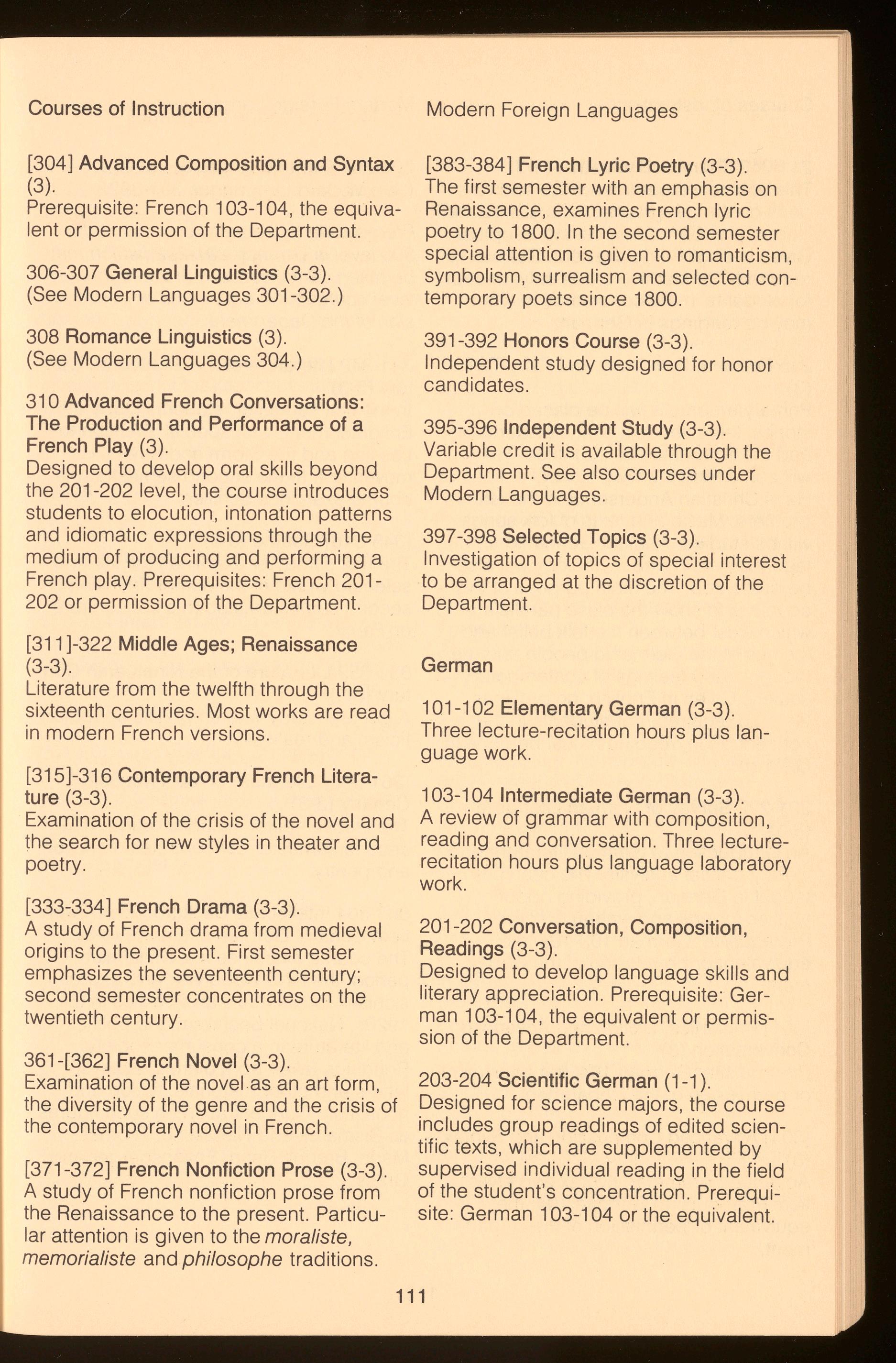
Coursesof Instruction
[304] Advanced Compositionand Syntax (3).
Prerequisite : French 103-104, the equivalent or permission of the Department.
306-307 General Linguistics(3-3) (See Modern Languages 301-302.)
308 Romance Linguistics(3). (See Modern Languages 304 .)
31 O Advanced French Conversations: The Productionand Performanceof a French Play (3).
Designed to develop oral skills beyond the 201-202 level, the course introduces students to elocution, intonation patterns and idiomatic expressions through the medium of producing and performing a French play . Prerequisites: French 201202 or permission of the Department.
[311 ]-322 Middle Ages; Renaissance (3-3).
Literature from the twelfth through the sixteenth centuries Most works are read in modern French versions.
[315]-316 ContemporaryFrench Literature (3-3).
Examination of the crisis of the novel and the search for new styles in theater and poetry.
[333-334] French Drama (3-3)
A study of French drama from medieval origins to the present. First semester emphasizes the seventeenth century ; second semester concentrates on the twentieth century.
361-(362] French Novel (3-3).
Examination of the novel as an art form, the diversity of the genre and the crisis of the contemporary novel in French
[371-372] French NonfictionProse (3-3)
A study of French nonfiction prose from the Renaissance to the present. Particular attention is given to the moraliste, memorialiste and phi/osophe traditions.
Modern Foreign Languages
[383-384] French Lyric Poetry (3-3).
The first semester with an emphasis on Renaissance, examines French lyric poetry to 1800. In the second semester special attention is given to romanticism, symbolism, surrealism and selected contemporary poets since 1800.
391-392 HonorsCourse (3-3)
Independent study designed for honor candidates
395-396 IndependentStudy (3-3).
Variable credit is available through the Department. See also courses under Modern Languages.
397-398 Selected Topics (3-3)
Investigation of topics of special interest to be arranged at the discretion of the Department.
German
101-102 ElementaryGerman (3-3).
Three lecture-recitation hours plus language work
103-104 IntermediateGerman (3-3)
A review of grammar with composition, reading and conversation. Three lecturerecitation hours plus language laboratory work
201-202 Conversation,Composition, Readings(3-3)
Designed to develop language skills and literary appreciation . Prerequisite: German 103-104, the equivalent or permission of the Department.
203-204 ScientificGerman (1-1 ).
Designed for science majors, the course includes group readings of edited scientific texts, which are supplemented by supervised individual reading in the field of the student's concentration . Prerequisite: German 103-104 or the equivalent.
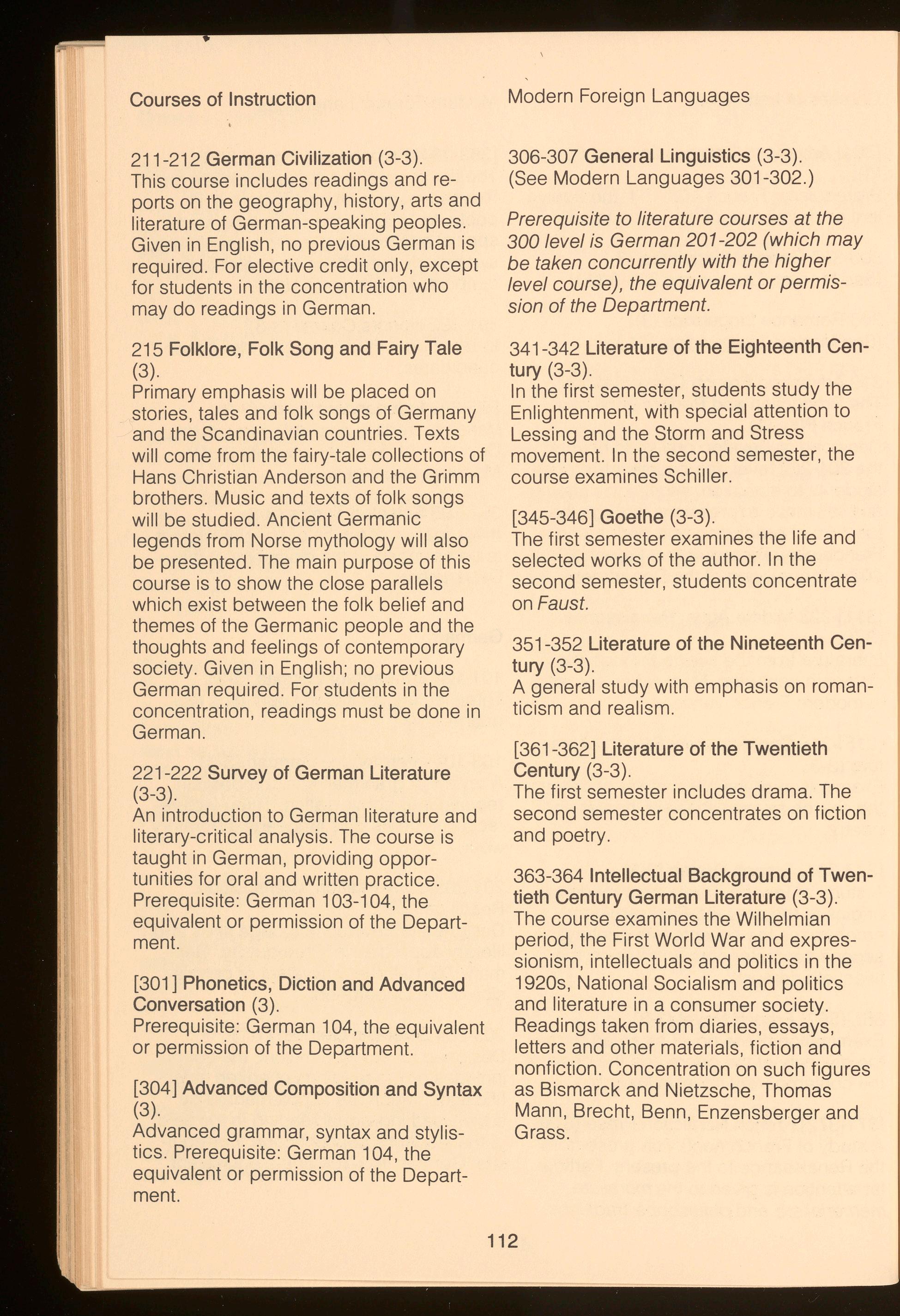
Coursesof Instruction
211-212 German Civilization{3-3)
This course includes readings and reports on the geography , history , arts and literature of German-speaking peoples. Given in English, no previous German is required . For elective credit only , except for students in the concentration who may do readings in German.
215 Folklore,Folk Song and Fairy Tale (3).
Primary emphasis will be placed on stories, tales and folk songs of Germany and the Scandinavian countries. Texts will come from the fairy-tale collections of Hans Christian Anderson and the Grimm brothers . Music and texts of fo l k songs will be studied Ancient Germanic legends from Norse mythology will also be presented The main purpose of this course is to show the close parallels which exist between the folk belief and themes of the Germanic people and the thoughts and feelings of contemporary society. Given in English; no previous German required . For students in the concentration, readings must be done in German.
221-222 Survey of German Literature {3-3).
An introduction to German literature and literary-critical analysis. The course is taught in German, providing opportunities for oral and written practice
Prerequisite: German 103-104, the equivalent or permission of the Department.
[301] Phonetics,Dictionand Advanced Conversation(3).
Prerequisite: German 104, the equivalent or permission of the Department.
[304] AdvancedCompositionand Syntax (3).
Advanced grammar, syntax and stylistics. Prerequisite : German 104, the equivalent or permission of the Department.
Modern Foreign Languages
306-307 General Linguistics{3-3) (See Modern Languages 301-302.)
Prerequisite to literature courses at the 300 level is German 201-202 (which may be taken concurrently with the higher level course), the equivalent or permission of the Department.
341-342 Literatureof the EighteenthCentury {3-3)
In the first semester , students study the Enlightenment , with special attention to Lessing and the Storm and Stress movement. In the second semester , the course examines Schiller .
[345-346] Goethe {3-3)
The first semester examines the life and selected works of the author In the second semester, students concentrate on Faust.
351-352 Literatureof the NineteenthCentury {3-3)
A general study with emphasis on romanticism and realism .
[361-362] Literatureof the Twentieth Century{3-3) .
The first semester includes drama. The second semester concentrates on fiction and poetry .
363-364 IntellectualBackgroundof Twentieth CenturyGerman Literature{3-3)
The course examines the Wilhelmian period , the First World War and expressionism, intellectuals and politics in the 1920s, National Socialism and politics and literature in a consumer society
Readings taken from diaries, essays, letters and other materials, fiction and nonfiction . Concentration on such figures as Bismarck and Nietzsche, Thomas Mann, Brecht, Benn , Enzensberger and Grass
Courses of Instruction
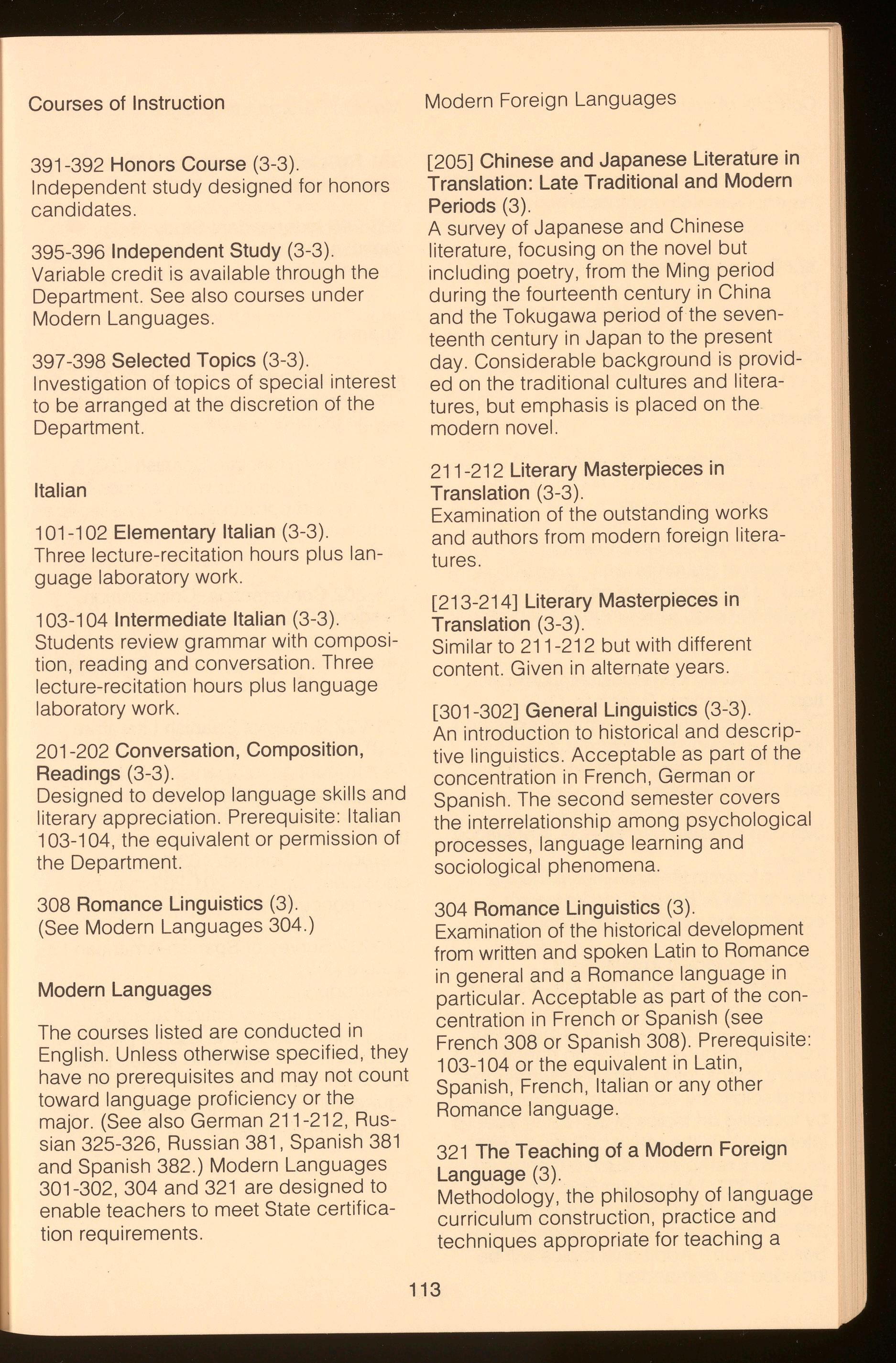
391 -392 Honors Course (3-3)
Independent study designed for honors candidates.
395-396 IndependentStudy (3-3) .
Variable c redit is availabl e through the Department. See also courses under Modern Languages
397-398 Selected Topics (3-3).
Investigation of topics of special interest to be arranged at the dis c retion of the Department .
Italian
101-102 Elementary Italian (3-3) . Three lecture-recitation hours plus language laboratory work
103-104 IntermediateItalian (3-3).
Students review grammar with composition , reading and conversation Three lecture-recitation hours plus language laboratory work .
201-202 Conversation , Composition , Readings (3-3)
Designed to develop language skills and literary appreciation. Prerequisite : Italian 103-104 , the equivalent or permission of the Department.
308 Romance Linguistics(3). (See Modern Languages 304.)
Modern Languages
The courses listed are conducted in English Unless otherwise specified , they have no prerequisites and may not count toward language proficiency or the major . (See also German 211-212, Russian 325-326 , Russian 381 , Spanish 381 and Spanish 382 .) Modern Languages 301-302 , 304 and 321 are designed to enable teachers to meet State certification requirements.
Modern Foreign Languages
[205] Chinese and Japanese Literaturein
Translation:Late Traditionaland Modern Periods (3)
A survey of Japanese and Chinese literature, focusing on the novel but including poetry , from the Ming period during the fourteenth century in China and the Tokugawa period of the seventeenth century in Japan to the present day . Considerable background is provided on the traditional cultures and literatures , but emphasis is placed on the modern novel.
211-212 LiteraryMasterpiecesin
Translation(3-3) . Ex amination of the outstanding works and authors from modern foreign literatures
[213-214] Literary Masterpiecesin
Translation(3-3)
Similar to 211-212 but with different content. Given in alternate years.
[301-302] General Linguistics(3-3)
An introduction to historical and descriptive linguistics. Acceptable as part of the concentration in French, German or Spanish The second semester covers the interrelationship among psychological processes, language learning and sociological phenomena
304 Romance Linguistics(3)
Examination of the historical development from written and spoken Latin to Romance in general and a Romance language in particular. Acceptable as part of the concentration in French or Spanish (see French 308 or Spanish 308) . Prerequisite : 103-104 or the equivalent in Latin, Spanish, French , Italian or any other Romance language.
321 The Teaching of a Modern Foreign Language (3).
Methodology, the philosophy of language curriculum construction, practice and techniques appropriate for teaching a
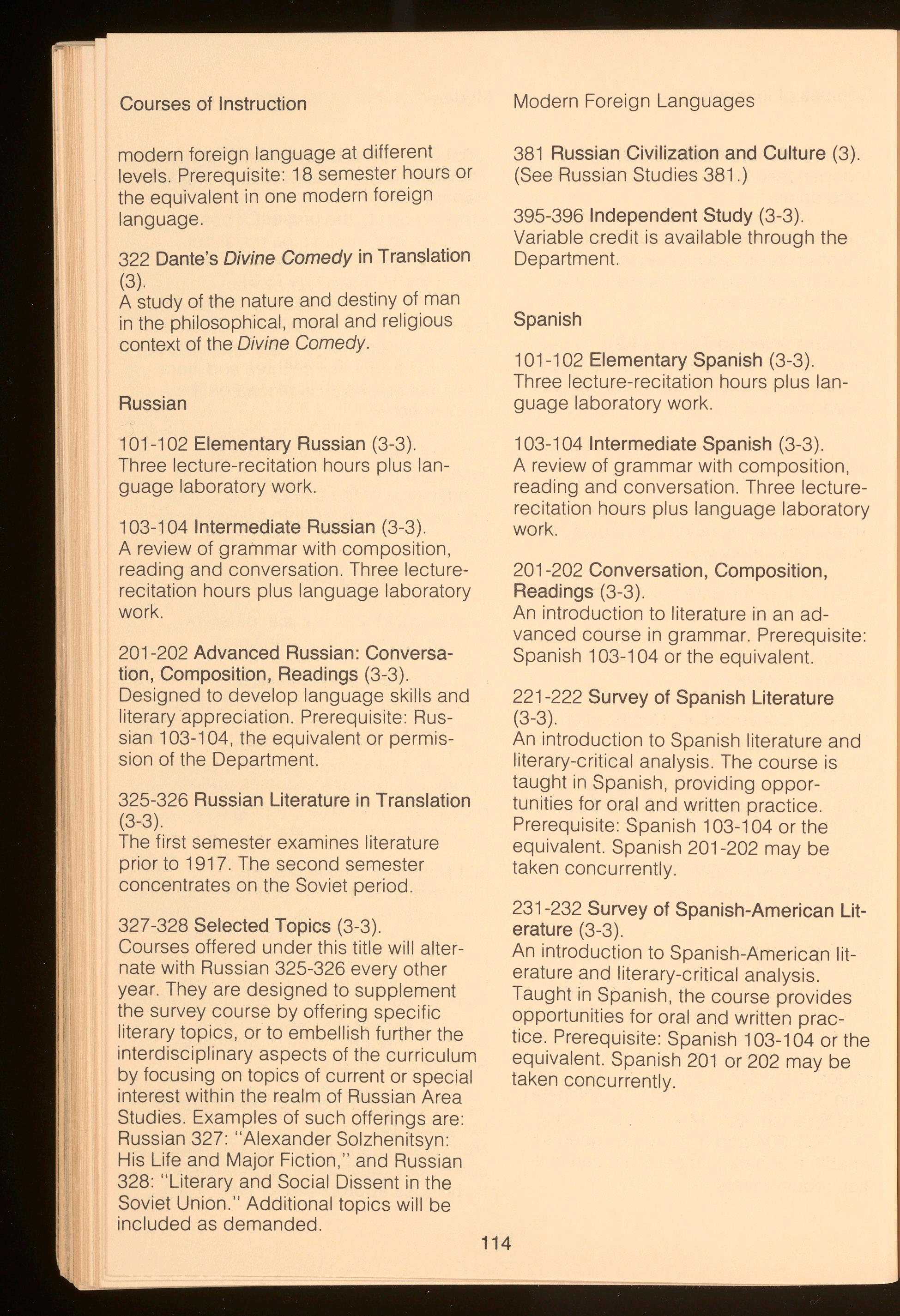
Courses of Instruction
modern foreign language at different levels . Prerequisite: 18 semester hours or the equivalent in one modern foreign language .
322 Dante'sDivine Comedy in Translation (3) .
A study of the nature and destiny of man in the philosophical, moral and religious context of the Divine Comedy.
Russian
101-102 Elementary Russian(3-3) .
Three lecture-recitation hours plus language laboratory work.
103-104 IntermediateRussian(3-3).
A review of grammar with composition , reading and conversation Three lecturerecitation hours plus language laboratory work.
201-202 Advanced Russian:Conversation, Composition,Readings (3-3).
Designed to develop language skills and literary appreciation. Prerequisite : Russian 103-104 , the equivalent or permission of the Department.
325-326 Russian Literaturein Translation (3 -3)
The first semester examines literature prior to 1917. The second semester concentrates on the Soviet period.
327-328 Selected Topics (3-3).
Courses offered under this title will alternate with Russian 325-326 every other year They are designed to supplement the survey course by offering specific literary topics, or to embellish further the interdisciplinary aspects of the curriculum by focusing on topics of current or special interest within the realm of Russian Area Studies. Examples of such offerings are : Russian 327 : "Alexander Solzhenitsyn : His Life and Major Fiction," and Russian 328: "Literary and Social Dissent in the Soviet Union." Additional topics will be included as demanded.
Modern Foreign Languages
381 Russian Civilizationand Culture (3). (See Russian Studies 381.)
395-396 IndependentStudy (3-3)
Variable credit is available through the Department.
Spanish
101-102 Elementary Spanish (3-3).
Three lecture-recitation hours plus language laboratory work.
103-104 IntermediateSpanish (3-3) .
A review of grammar with composition, reading and conversation Three lecturerecitation hours plus language laboratory work .
201-202 Conversation,Composition, Readings (3-3)
An introduction to literature in an advanced course in grammar . Prerequisite: Spanish 103-104 or the equivalent.
221-222 Survey of Spanish Literature (3-3).
An introduction to Spanish literature and literary-critical analysis . The course is taught in Spanish, providing opportunities for oral and written practice . Prerequisite : Spanish 103-104 or the equivalent. Spanish 201-202 may be taken concurrently
231-232 Survey of Spanish-AmericanLiterature (3-3).
An introduction to Spanish-American literature and literary-critical analysis. Taught in Spanish, the course provides opportunities for oral and written practice . Prerequisite: Spanish 103-104 or the equivalent. Spanish 201 or 202 may be taken concurrently.
Courses of Instruction
[301] Advanced Conversation(3).
Supervised discussions of assigned topics and related vocabulary e xercises with attention g iven to phonetics and diction Prerequisite: Spanish 103-104 , the equivalent or 201 or 202 .
[304] Advanced Syntax and Composition (3)
Students discuss comple x points of grammar , correct e x pression and receive writing practice Prerequisite: Spanish 103-104 , the equivalent or 201 or 202
[306-307] General Linguistics(3-3) .
308 Romance Linguistics(3).
(See Modern Languages 304.)
Prerequisite to courses 311 through 372 is Spanish 221-222 , Spanish 231-232 or the equivalent . Either 221-222 or 231-232 may be taken concurrently with the higher level course, if the student has previously passed 201 , 202 or the equivalent
311 Literatureof the Middle Ages (3)
Readings of works from the eleventh century into the fourteenth century in modern Spanish versions . Provides introductory ex perience in Old Spanish
[322) Literatureof the Fourteenthand FifteenthCenturies (3).
Special attention given to Juan Ruiz , La Celestina and ballads .
[331-332) The Golden Age (3-3)
A general study of the sixteenth and seventeenth centuries, with special attention on Cervantes , Calderon and other major writers.
351-352 Spanish Literatureof the Eighteenthand Nineteenth Centuries (3-3) .
Neoclassicism , romanticism, realism and naturalism are examined
Music
361-362 Spanish Literatureof the Twentieth Century (3-3)
Spans the generation of '98 and modernism to the present.
[371-372] Spanish-AmericanLiteratureof the Twentieth Century (3-3).
A general study , with special attention given the novel and poetry
[381 J The Arts in Spain (3) .
Emphasis is given to architecture , sculpture , painting and music with some attention to applied arts. No prerequisite is necessary .
382 The History of Spain (3) .
A study of personalities , ideas and institut ions emphasizes the confluence of Christian , Moslem and Jewish civilizations and the life and problems of modern Spain . No prerequisite is necessary
391-392 Honors Course (3-3) . Independent study designed for honors candidates .
395-396 Independent Study (3-3)
Variable credit available through the Department. See also courses under Modern Languages
397-398 Selected Topics (3-3)
Investigation of topics of special interest to be arranged at the discretion of the Department.
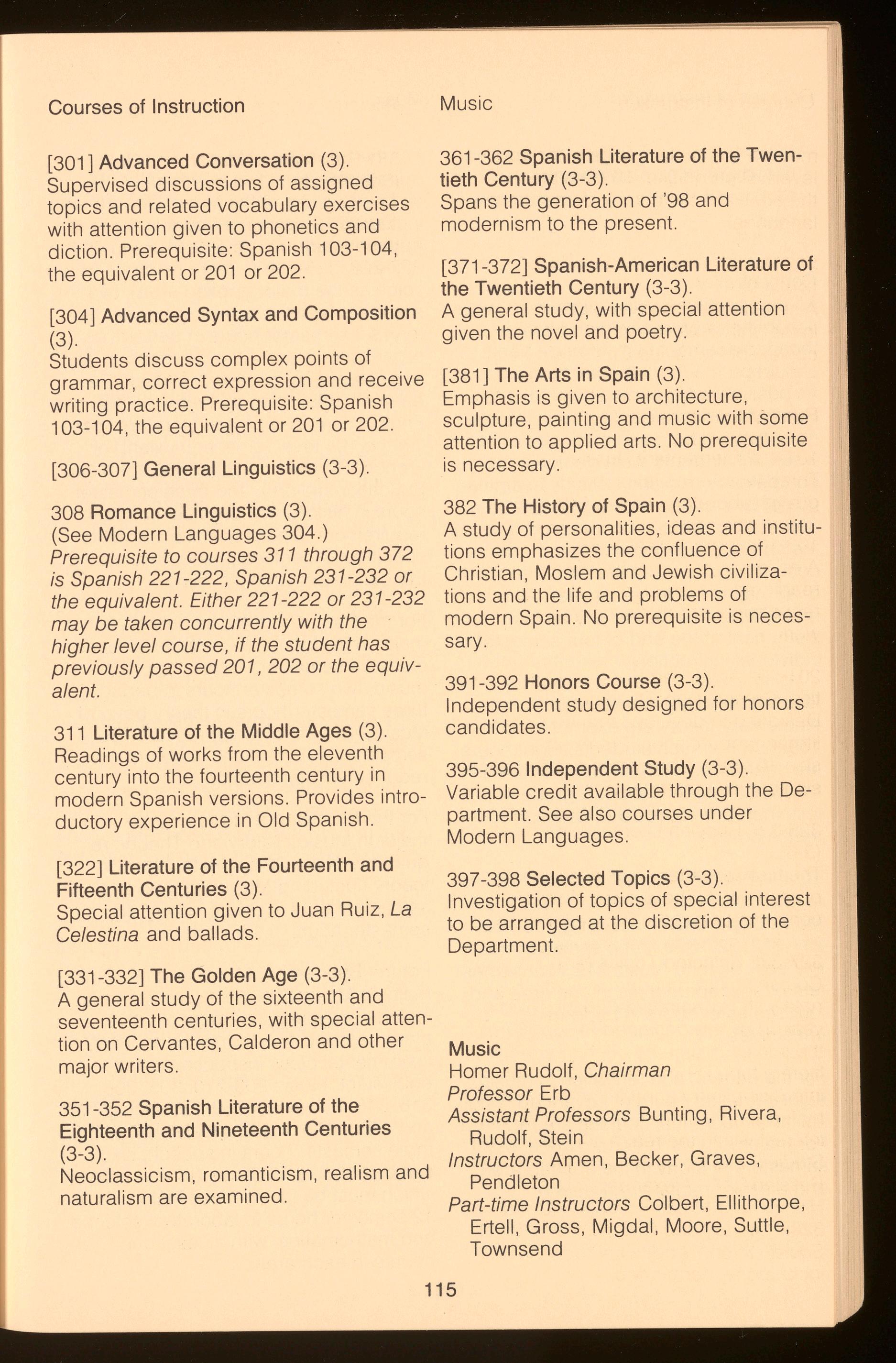
Music
Homer Rudolf , Chairman Professor Erb
Assistant Professors Bunting , Rivera , Rudolf , Stein Instructors Amen, Becker , Graves , Pendleton
Part-time Instructors Colbert , Ellithorpe , Ertel!, Gross, Migdal, Moore , Suttle, Townsend
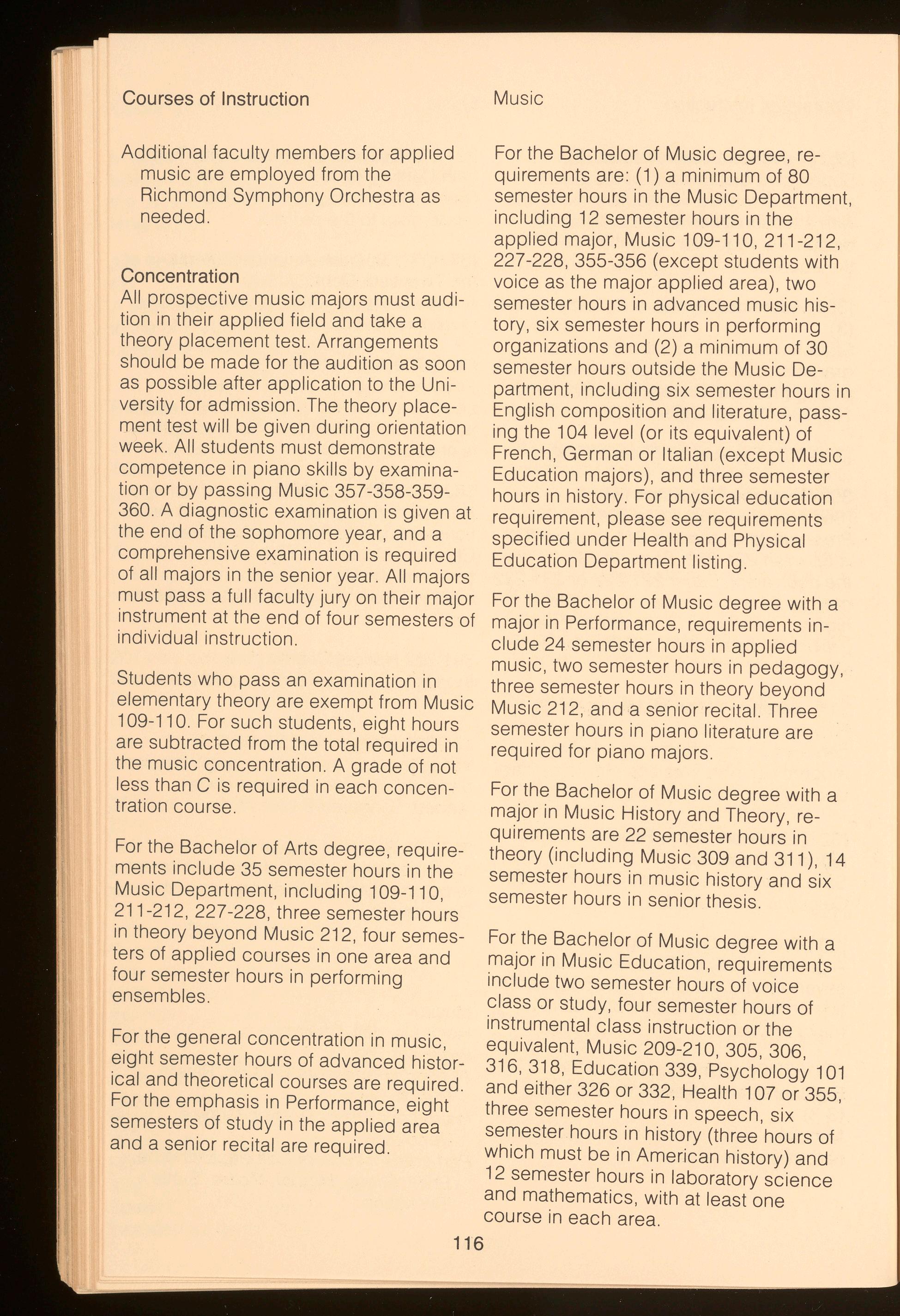
Courses of Instruction
Additional faculty members for applied music are employed from the Richmond Symphony Orchestra as needed.
Concentration
All prospective music majors must audition in their applied field and take a theory placement test. Arrangements should be made for the audition as soon as possible after application to the University for admission. The theory placement test will be given during orientation week. All students must demonstrate competence in piano skills by examination or by passing Music 357-358-359360. A diagnostic examination is given at the end of the sophomore year, and a comprehensive examination is required of all majors in the senior year. All majors must pass a full faculty jury on their major instrument at the end of four semesters of individual instruction.
Students who pass an examination in elementary theory are exempt from Music 109-110. For such students, eight hours are subtracted from the total required in the music concentration. A grade of not less than C is required in each concentration course.
For the Bachelor of Arts degree, requirements include 35 semester hours in the Music Department , including 109-110, 211-212, 227-228, three semester hours in theory beyond Music 212, four semesters of applied courses in one area and four semester hours in performing ensembles
For the general concentration in music, eight semester hours of advanced historical and theoretical courses are required. For the emphasis in Performance, eight semesters of study in the applied area and a senior recital are required.
Music
For the Bachelor of Music degree, requirements are: (1) a minimum of 80 semester hours in the Music Department, including 12 semester hours in the applied major, Music 109-110, 211-212, 227-228, 355-356 (except students with voice as the major applied area) , two semester hours in advanced music history, six semester hours in performing organizations and (2) a minimum of 30 semester hours outside the Music Department, including six semester hours in English composition and literature, passing the 104 level (or its equivalent) of French, German or Italian (except Music Education majors), and three semester hours in history. For physical education requirement, please see requirements specified under Health and Physical Education Department listing.
For the Bachelor of Music degree with a major in Performance, requirements include 24 semester hours in applied music, two semester hours in pedagogy, three semester hours in theory beyond Music 212, and a senior recital. Three semester hours in piano literature are required for piano majors.
For the Bachelor of Music degree with a major in Music History and Theory, requirements are 22 semester hours in theory (including Music 309 and 311), 14 semester hours in music history and six semester hours in senior thesis.
For the Bachelor of Music degree with a major in Music Education, requirements include two semester hours of voice class or study, four semester hours of instrumental class instruction or the equivalent, Music 209-210 , 305, 306, 316, 318, Education 339, Psychology 101 and either 326 or 332, Health 107 or 355, three semester hours in speech, six semester hours in history (three hours of which must be in American history) and 12 semester hours in laboratory science and mathematics, with at least one course in each area.
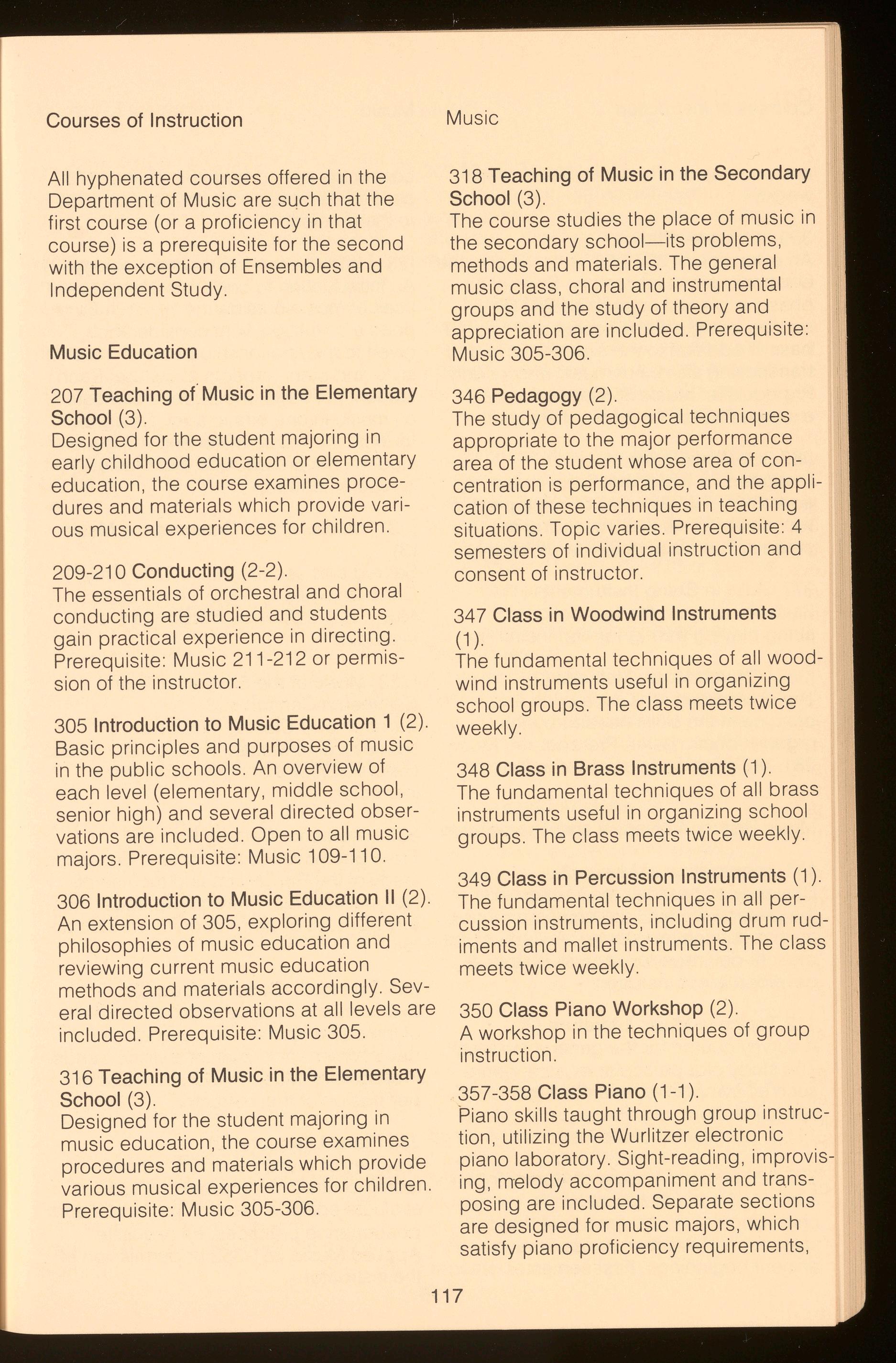
Courses of Instruction
All hyphenated courses offered in the Department of Music are swch that the first course (or a proficiency in that course) is a prerequisite for the second with the exception of Ensembles and Independent Study.
Music Education
207 Teaching of Music in the Elementary School (3)
Designed for the student majoring in early childhood education or elementary education, the course examines procedures and materials which provide various musical experiences for children .
209-21 O Conducting(2-2)
The essentials of orchestral and choral conducting are studied and students gain practical experience in directing . Prerequisite: Music 211-212 or permission of the instructor
305 Introductionto Music Education 1 (2).
Basic principles and purposes of music in the public schools. An overview of each level (elementary , middle school , senior high) and several directed observations are included Open to all music majors . Prerequisite: Music 109-110
306 Introductionto Music EducationII (2) .
An extension of 305 , exploring different philosophies of music education and reviewing current music education methods and materials accordingly . Several directed observations at all levels are included . Prerequisite: Music 305 .
316 Teaching of Music in the Elementary School (3)
Designed for the student majoring in music education , the course examines procedures and materials which provide various musical experiences for children . Prerequisite : Music 305-306.
Music
318 Teaching of Music in the Secondary School (3).
The course studies the place of music in the secondary school-its problems, methods and materials . The general music class , choral and instrumental groups and the study of theory and appreciation are included Prerequisite : Music 305 -306
346 Pedagogy (2).
The study of pedagogical techniques appropriate to the major performance area of the student whose area of concentration is performance, and the application of these techniques in teaching situations . Topic varies . Prerequisite : 4 semesters of individual instruction and consent of instructor
34 7 Class in Woodwind Instruments ( 1).
The fundamental techniques of all woodwind instruments useful in organizing school groups. The class meets twice weekly.
348 Class in Brass Instruments(1 ).
The fundamental techniques of all brass instruments useful in organizing school groups. The class meets twice weekly .
349 Class in PercussionInstruments(1 ) .
The fundamental techniques in all percussion instruments , including drum rudiments and mallet instruments. The class meets twice weekly.
350 Class Piano Workshop (2)
A workshop in the techniques of group instruction
357-358 Class Piano (1-1 ) .
Piano skills taught through group instruction , utilizing the Wurlitzer electronic piano laboratory . Sight-reading, improvising, melody accompaniment and transposing are included. Separate sections are designed for music majors, which satisfy piano proficiency requirements,
Courses of Instruction
and nonmajors. The class meets twice weekly.
359-360 Class Piano (1-1 ).
An extension of 357-358 , also utilizing the electronic piano laboratory. Special emphasis is placed on reading SATB scores, string quartet scores and figured bass in addition to the sight-reading and transposing skills . For music majors only. Prerequisite: Music 358 or proficiency examination for the appropriate level.
367-368 Class Voice (1-1 ).
Designed for the specialist in music education , the elements of voice production, vowel forms and vocalizing are studied. The class meets twice weekly.
377 Class in String Instruments(1 ).
Students acquire the foundations of string playing through group instruction.
(387] Church Music Methods (2).
The course provides instruction and practice in the skills needed by the organist-choirmaster. Prerequisite: Music 281-282 or permission of the instructor.
Music History, Literatureand Appreciation
111 Appreciationof Music (3).
Designed to broaden the background of the general student, the course provides an introduction to listening. A study of the present-day repertory and its historical development is included .
112 Topics in Music Literature(3).
A survey course for the general student . The study of a particular musical genre such as symphonic, chamber, piano, or opera literature, etc Prerequisite: Music 111 or permission of the instructor.
Music

227-228 General Historyof Music (3-3)
A survey for the music major. A chronological study is made of the development of Western music from its ancient beginnings. First semester
covers the period from antiquity to 1750; second semester concentrates on 1750 to the present.
(231] Introductionto Ethnomusicology(3).
An introduction to concepts and practices of music outside the Western European art tradition, with consideration given to the relationship between musical style and other aspects of culture Each student presents one paper a semester on music in one ethnic area. Designed for both the music major and the general student. No prerequisite, but Music 111 is recommended.
(331 ] Medieval and Renaissance Music (3).
Sacred and secular music from early Christian times to 1600 . Prerequisite: Music 227-228 or permission of the instructor.
(332] Music of the Seventeenth and EighteenthCenturies (3).
Baroque and Classic music from Monteverdi to Mozart. Prerequisite: Music History 227-228 or permission of the instructor.
333 Nineteenth-CenturyMusic (2).
From Beethoven to Mahler and Strauss , a study of the Romantics and the rise of national schools . Prerequisite : Music History 227-228 or permission of the instructor .
334 Twentieth-CenturyMusic (2)
Examination of the principal composers of the contemporary scene and the development of important stylistic trends. Prerequisite : Music History 227-228 or permission of the instructor.
335 Piano Literature (3).
A survey of piano music from the seventeenth century to the present. Students evaluate editions, recordings, books and performance practices. Prerequisite: Applied Music 351-352 or permission of the instructor.
Courses of Instruction
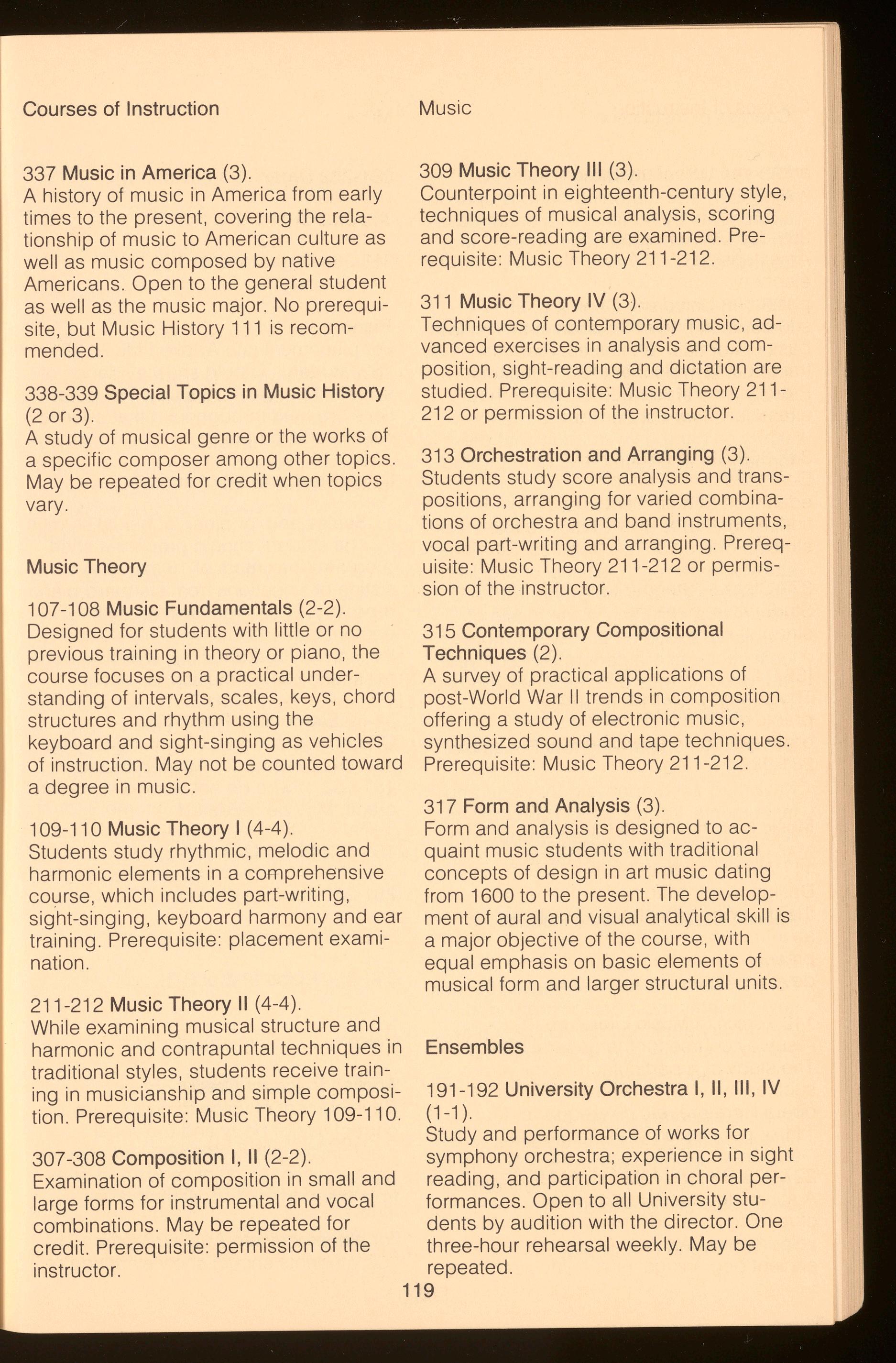
337 Music in America (3) .
A history of music in America from early times to the present, covering the relationship of music to American culture as well as music composed by native Americans. Open to the general student as well as the music major. No prerequisite , but Music History 111 is recommended.
338-339 Special Topics in Music History (2 or 3)
A study of musical genre or the works of a specific composer among other topics . May be repeated for credit when topics vary .
Music Theory
107-108 Music Fundamentals(2-2) . Designed for students with little or no previous training in theory or piano , the course focuses on a practical understanding of intervals, scales , keys , chord structures and rhythm using the keyboard and sight-singing as vehicles of instruction May not be counted toward a degree in music.
109-110 Music Theory I (4-4) . Students study rhythmic, melodic and harmonic elements in a comprehensive course , which includes part-writing, sight-singing, keyboard harmony and ear training Prerequisite : placement ex amination .
211-212 Music Theory II (4-4) . While examining musical structure and harmonic and contrapuntal techniques in traditional styles, students receive training in musicianship and simple composition . Prerequisite : Music Theory 109-110 .
307-308 CompositionI, II (2-2).
Examination of composition in small and large forms for instrumental and vocal combinations. May be repeated for credit. Prerequisite : permission of the instructor.
Music
309 Music Theory Ill (3).
Counterpoint in eighteenth-century style, techniques of musical analysis , scoring and score-reading are examined. Prerequisite: Music Theory 211-212
311 Music Theory IV (3) .
Techniques of contemporary music , advanced e xercises in analysis and composition, sight-reading and dictation are studied. Prerequisite: Music Theory 211212 or permission of the instructor.
313 Orchestrationand Arranging(3).
Students study score analysis and transpositions , arranging for varied combinations of orchestra and band instruments , vocal part-writing and arranging. Prerequisite : Music Theory 211-212 or permission of the instructor
315 ContemporaryCompositional Techniques (2)
A survey of practical applications of post-World War II trends in composition offering a study of electronic music , synthesized sound and tape techniques. Prerequisite: Music Theory 211-212 .
317 Form and Analysis (3)
Form and analysis is designed to acquaint music students with traditional concepts of design in art music dating from 1600 to the present. The development of aural and visual analytical skill is a major objective of the course , with equal emphasis on basic elements of musical form and larger structural units.
Ensembles
191-192 UniversityOrchestra I, II, 111,IV (1 - 1)
Study and performance of works for symphony orchestra ; experience in sight reading, and participation in choral performances. Open to all University students by audition with the director. One three-hour rehearsal weekly May be repeated

Coursesof Instruction
193-194 UniversityBand I, II, 111,IV (1-1)
A concert and marching band is open to all students by audition with the director. Three one-hour rehearsals weekly May be repeated .
195-196 UniversityChoir I, II, Ill, IV (1-1)
Membership is by audition in this mixed chorus of 60 to 80 voices. Students study and perform primarily, but not exclusively, choral literature of Western art tradition . Two concerts are performed yearly on campus with additional performances and tours. May be repeated
197-198 Schola Cantorum(1-1).
Membership is by invitation to this small mixed chorus of 16-20 voices. Students study and perform classical choral literature appropriate to the group from A.O. to the present including some music of popular or exotic origin Two or more local concerts are performed each year , with periodic trips on special assignment. The course may be repeated.
355-356 Accompanyingand Ensemble (2-2).
Keyboard accompanying for voice and instruments Techniques in sonatas, trios and larger chamber music groups for pianists, string and wind players
AppliedMusic (IndividualInstruction)
Organ
For admission to Applied Music 181-182 new students must demonstrate in a preliminary audition their ability to play technical studies and works from the simpler piano repertory.
81-82 ElementaryOrgan (0).
Offered without credit for students who are either not prepared for Applied Music 181-182, or who do not wish to study for credit. May be repeated.
181-182 Organ (1-1 or 3-3).
Music
281-282 Organ (1 ½-1 ½ or 3-3).
381-382 Organ (2-2 or 3-3).
383-384 Organ (2-2 or 3-3)
Piano
For placement into Applied Music 151152, students should show evidence of sufficient preparatory study. Piano auditions are held throughout the academic year for this purpose .
Suggested content of audition:
1 Scales and/ or other technical studies. 2 The student should prepare a short program (maximum of 15 minutes) consisting of selections from standard piano repertmy The pieces selected should demonstrate the student's musicianship through keyboard facility, stylistic awareness, and overall musical potential.
51-52 ElementaryPiano (0).
Offered without credit for students who are not prepared for Applied Music 151-152 or who do not wish to study for credit. May be repeated.
151-152 Piano (1-1 or 3-3).
251-252 Piano (1 ½-1 ½ or 3-3).
351-352 Piano (2-2 or 3-3)
353-354 Piano (2-2 or 3-3)
Voice
AppliedVoice for Credit
Development of voice through study of correct use of body and the vocal mechanism ; study of vowel and consonant formation; study of songs and arias from the standard vocal repertoire
For placement into Applied Music 161162, students should show evidence of 120
Music
Coursesof Instruction
sufficient musical experience Voice audi-141-142 or who do not wish to study for tions are held throughout the academic credit. May be repeated. year for this purpose
For audition student should :
1 Be able to show ability to read a simple song
2 . Have prepared two songs in English.
If student has studied previously , one song in Italian may be presented also
61-62 ElementaryVoice (0)
Offered without credit for students-who are not prepared for Applied Music 161-162 or who do not wish to study for credit. May be repeated
161-162 Voice (1-1 or 3-3).
261-262 Voice (1 ½ -1 ½ or 3-3).
361-362 Voice (2-2 or 3-3).
363-364 Voice (2-2 or 3-3).
StringInstruments
71-72 ElementaryString Instruments(0)
Offered without credit for students who are not prepared for Applied Music 171-172 or who do not wish to study for credit. May be repeated .
171-172 String Instruments(1-1 or 3-3).
271-272 String Instruments(1 ½-1 ½ or 3-3) .
371-372 String Instruments(2-2 or 3 -3)
373-374 String Instruments(2-2 or 3 -3).
Woodwindand Brass Instruments
141-142 Wind Instruments(1-1 or 3-3) .
241-242 Wind Instruments(1½-1 ½ or 3-3)
341-342 Wind Instruments(2-2 or 3-3).
343-344 Wind Instruments(2-2 or 3-3)
MiscellaneousInstruments
These include instruments not mentioned above for which there is classical solo or ensemble literature. For example, the classical guitar, lute or orchestral percussion instruments qualify
21-22 MiscellaneousInstruments(0) Offered without credit for students who are not prepared for Applied Music 121-122 or who do not wish to study for credit. May be repeated .
121-122 MiscellaneousInstruments(1- 1 or 3-3).
221 -222 MiscellaneousInstruments (1½-1½ or 3-3)
321-322 MiscellaneousInstruments(2-2 or 3-3).
323-324 MiscellaneousInstruments(2-2 or 3-3) ._
HonorsCourses
391-392 Honors Course (3-3)
393 -394 Honors Course (3-3) .
395-396-397 IndependentStudy (1-2-3). Directed research by selected students by invitation of the Department.

41-42 ElementaryWind Instruments(0) . Offered without credit for students who are not prepared for Applied Music
\i

Courses of Instruction
Philosophy
James H. Hall, Chairman
Professors Hall , Mucklow , Ri ley
Assistant Professor , Simpson
Concentration
Twenty-five semester hour s, including Philosophy 251 , the senior conference , and ordinarily Philosoph y 383 and 384 plus up to 18 approved semester hours in related fields .
All 200-level courses are open to freshmen , without prerequisite
Courses listed without description are not currently offered.
AlternativeIntroductions
200 PhilosophicalArgument(3).
A general introduction to ph ilosophy as a working discipline, with emphasis on the analysis of conceptual problems and proposed solutions to them Sample topics: is there a thing which can be called the self? What is the meaning of life? What is the relationship between knowledge and opinion? Can man be held responsible for his actions?
220 ContemporaryMoral Issues(3) .
A course for students more concerned about thinking " philosophically" than about philosophy as such Discussion of pressing moral issues as presented by contemporary writers of great philosophical skill: sex perversion / preference , lawlessness, criminal punishment, race and se x discrimination , political chauvinism, killing
230 PhilosophicalClassics(3) .
Discussion of selected passages from the works of philosophers which have become part of the currency of our intellectual life. Examples: Socrates on obedience: Aristotle on excuses : Hobbes
Philosophy
on the state of nature : Descartes on doubt: Locke on property: Hume on ex planation : Mill on pleasure : Sartre on a man's nature .
251 Elementary Logic (3) .
Learning to prove that good arguments are good , and bad ones bad. Fallacies and syllogisms . Main emphasis on formal proofs (propositional and predicate). No mathematical applications . A skills course .
IntermediateCourses
331-332 PhilosophicalLiterature(3-3)
A survey of this history of philosophy with selected writings of philosophical and literary merit.
338 Pragmatism:Its Impact on Twentieth CenturyAmerican Thought (3) .
The major themes of pragmatism, primarily Peirce , James and Dewey , are ex amined with special attention to their origins in classical European thought and their conclusions reflected in twentieth century literary , religious and scientific American thought, Open to sophomores , juniors and seniors .
351 SymbolicLogic (3)
360-361 Ethics (3-3)
An inquiry focusing on the question "What Shall I do?" Normative proposals by egoists, utilitarians and others about how to decide, various metaethical views about the roles of reason, emotion, convention and taste in arriving at decisions . The proposals and views are applied to some special topic such as war , abortion or suicide . Prerequisite: one previous philosophy course
Courses of Instruction

G63 Philosophyand Society (3).
irhe limits of an individual's liberty or, looking at it the other way, the limits of a ociety's authority. Close examination of uch limits and their possible grounds, means of enforcement, and justification. Prerequisite: one previous philosophy course.
Courses in Applied PhilosophicalAnalysis
Designed for juniors and seniors majoring in certain disciplines or having certain postgraduate goals, each of these courses examines some of the basic assumptions, troublesome concepts and internal structure of the subject discipline or profession. The courses are usually offered only in alternate years.
350 Philosophyof Natural Science (3).
A general introduction to the philosophy of science dealing with the structure of scientific theories, the nature of scientific activity and the scientific world picture.
352 Philosophyof Life Science (3).
An introduction to the philosophy of biology, concentrating on the nature of explanation in the biological sciences and of the problems attendant to the reduction of biology to physics and chemistry
362 PoliticalPhilosophy(3).
Problematic beliefs and misleading concepts of political discourse. Are there good grounds for obedience to law, for civil disobedience or for radical disobedience? Is there an equal right of all men to equal freedom? What does justice require? Are liberty, equality and justice compat ible? Prerequisite : One previous philosophy course or, for political science majors, permission of the department. (May be credited as Political Science 362.)
Philosophy
364 Philosophyof Law (3).
The concept of law is studied. Problems such as the rationale of legal punishment and the nature and criteria of the judicial decision-making process are included. Prerequisite: one previous philosophy course, preferably Philosophy 362. (May be credited as Political Science 364.)
[366] Philosophyof Education(3).
(See Education 337.)
368 Legal Thinking (3).
Designed for all students to learn more about the law, the course examines how the law operates and how lawyers and judges think. It covers the processes of the civil law and provides students with an opportunity to see whether a career in law is for them. It is taught by a lawyer who is a full-time faculty member of the T. C. Williams School of Law. Philosophy 200 is recommended, but the only prerequisite is sophomore standing.
371 Philosophyof Religion (3).
Is there such a thing as religious knowledge? Can a rational individual believe in God(s)? Alternative conceptions of the use and meaning of theological language (description, ritual, belief formation, moral persuasion) Transcendence. Mysticism and logic. Prerequisite : One previous philosophy course or, for religion majors, permission of the department.
373 Philosophyof Art (3).
An examination of conceptual problems about art, the artist, and esthetic judgement. The role of intention, intellect, and inspiration in both creation and craft. Is objective judgement and criticism possible? Prerequisite: One previous philosophy course or, for Art History majors, permission of the department. (May be credited as Art 373.)
374 Philosophyof Man (3).
Courses of Instruction
Advanced Seminars and Tutorials
Primarily for those including Philosoph y in their concentration , all of the following courses require the permission of the Department to enroll.
381 IndependentStudy (3)
A faculty member directs the student's reading and study.
383 Seminar: Analysis (3).
A study of problems in philosophy of language and the application of analytic technique .
384 Seminar: Epistemology(3)
An examination of problems in knowledge theory.
385 Seminar: Topics (3).
A detailed examination of a problem, issue, philosopher or philosophical movement. Recent topics have included Russell, Persons and medical ethics. May be repeated once for credit.
H391 HonorsTutorial: Historical(3)
Directed research is selected by the student
H392 Honors Tutorial:Systematic (3).
Directed research is selected by the student .
397-398 Senior Conference (1).
Includes a discussion of current journals , local colloquia and conferences with visiting philosophers . Physics
Jackson J. Taylor, Chairman
Professors A.O Campbell , Major
Associate Professors Seaborn , Taylor
Adjunct Associate Professor (Astronomy) Knappenberger
Part-time Instructor King
Physics
Concentration
For the Bachelor of Arts degree, the requirements are 24 semester hours in physics courses approved by the Department which include not more than eight semester hours of 100-level courses and Physics 205-206 and 321. Eighteen semester hours in courses outside of physics must be as approved by the Department and include Mathematic s 252. A grade of not less than C must be maintained in each physics course counted toward the concentration. This degree is offered primarily for students who wish to prepare for interdisciplinary or medical sciences studies, secondary school teaching or earn a cultural degree
For the Bachelor of Science degree , requirements are Physics 205-206 plus 18 additional semester hours in 300-level physics courses, including 303, 305 , 321 and one lecture course numbered above 370. Eighteen semester hours in courses outside physics must be approved by the Department and include Mathematics 303 and Chemistry 103-104. A grade of not less than C must be maintained in each physics course counted toward the concentration.
101-102 General Physics (4-4 ).
This basic course without calculus is for students whose major falls within the Division of Natural Sciences and Mathematics , including premedical science students. Mechanics, heat , sound, magnetism , electricity , light and modern physics are studied Physics 101 is not a prerequisite to 102. Three lecture hours and three laboratory hours a week. Prerequisites: algebra and trigonometry.
111-112 Physicsfor Liberal Arts (4-4).
An introductory course designed for students whose major falls outside the Division of Natural Sciences and Mathematics The approach to the principles of physics is essentially concep-
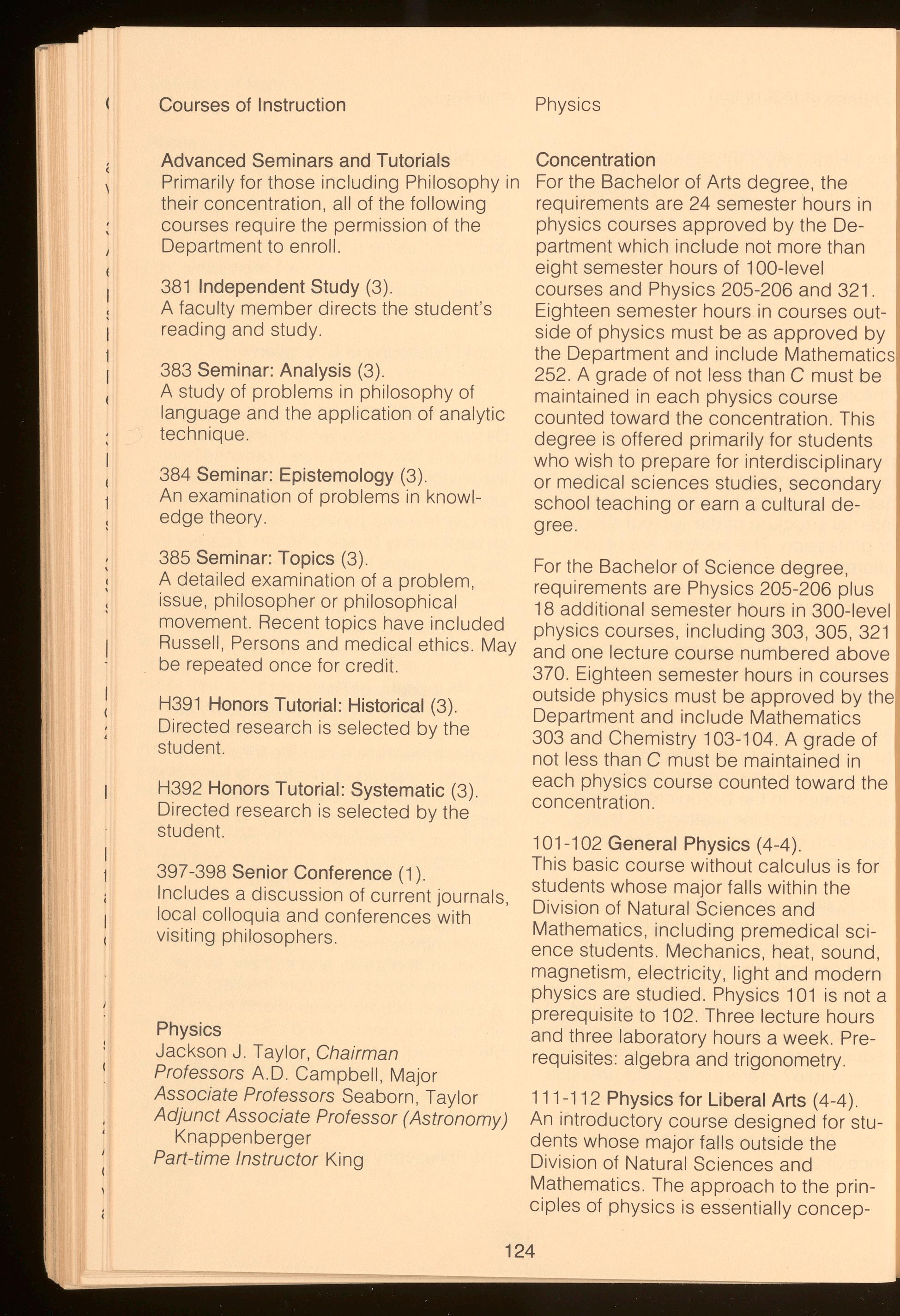
Courses of Instruction

tual rather than mathematical with emphasis placed on understanding the physica l environment. This course satisfies the distributional requirement in he field of natural science. A mathematics background equivalent to admission requirement is adequate. Physics 111 is not a prerequisite to 112. Six hours of integrated lecture, discussion and laboratory a week.
121-122 Introductionto Astrophysics (4-4).
A course designed for students whose major falls outside the Division of Natural Sciences and Mathematics. A study of celestial motions, stellar structure and evolution and related problems including appropriate concepts of elementary physics. Six hours of combined lecture, laboratory and discussion a week. The course satisfies the distributional requirement for laboratory science. A mathematics background equivalent to admission requirement is adequate.
205-206 Introductionto Modern Physics (3-3).
Key concepts which have transformed physics in the twentieth century: special relativity, quantization of matter and energy, waves vs. particles, atomic spectra and analysis of the hydrogen atom, nuclear physics and elementary particles. Open to qualified freshmen and satisf ies distributional requirement for natura l science when followed by Physics 321. Three hours lecture-discussion a week. Prerequisites: Physics 101-102 or permission of the Department: Mathematics 251-252 (may be taken concurrently). Physics 205 is prerequisite to Physics 206.
Physics
303 Mechanics (3). Mathematical analysis of physical laws pertaining to the dynamics of a particle and rigid bodies. Introduction to moving coordinate systems and Lagrange's and Hamilton 's methods. Prerequisites : Physics 101-102 or equivalent, and Mathematics 252.
305-306 Electricityand Magnetism (3-3).
Direct-current and alternating-current circuits, transient currents, electrostatic fields and potentials, dielectrics, magnetic fields and potentials and magnetic materials; Maxwell's equations. Prerequisites: Physics 101-102 or equivalent, and Mathematics 252 (may be taken concurrently). Physics 305 and Mathematics 253 are prerequisite to Physics 306.
308 Statistical Physics (3).
Application of statistical methods to a description of physical systems. Statistical calculation of thermodynamic quantities, the laws of thermodynamics, simple spin systems, statistical distributions and classical and quantum statistics of ideal gases will be included. Prerequisites: Physics 303 and Mathematics 253.
321-322 Intermediate Laboratory(2-2).
Experiments in classical and modern physics, with emphasis on independent work. Six laboratory hours a week. Prerequisite: Physics 101-102 or equivalent. Both courses are offered each semester.
[339] Theory and Applicationof Radionuclides(4).
Radioactivity, nuclear radiation, atomic structure, interaction of radiation with matter, radiation measuring instruments, statistics of counting, dosage and radiological safety, radionuclides in research, N.R.C. regulations, properties of nuclei. Three lecture and three laboratory hours a week. Prerequisites: Physics 101-102 and Mathematics 252 (may be taken concurrently).
Courses of Instruction
371-372 Quantum Mechanics (3-3).
Wave mechanics and quantization , the Schroedinger equation for a variety of potentials , the hydrogen atom in detail , perturbation methods. Prerequisites Physics 205-206 , 303 and Mathematics 253
374 Theoretical Physics (3) .
The application of mathematics to selected topics. Prerequisites : Physics 303 , 306 and Mathematics 303.
375 Introductionto Nuclear Physics (3)
Nuclear size and composition ; forces between nucleons; independent-particle and liquid-drop models of nuclei ; nuclear energy levels , spins, and parities; nuclear reactions. Prerequisites: Physics 205206 , 305 and Mathematics 303
376 Solid State (3).
Direct and reciprocal lattice structures and lattice dynamics, energy band theory , the Fermi surface, analysis of metals, insulators and semiconductors. Prerequisites: Physics 371 and Mathematics 303 .
377 Modern Optics (3).
Application of the Maxwell theory to a study of the wave properties and propagation of light in matter and in vacuum. Thermal radiation , the quantum nature of light, optical spectra and amplification of light (lasers) will also be treated. Prerequisites: Physics 306 and Mathematics 303.
381-382 Research (2-2).
A student who, in the judgment of the staff , is qualified to undertake research may register for this course. Six hours a week of laboratory or independent study.
Political Science
PoliticalScience
Ellis M. West, Chairman
Associate Professors Gunlicks, Horgan, Morris, Outland
Assistant Professors Gilman, West, Whelan
Concentration
Twenty-seven semester hours in Political Science, at least 18 of which must be at the 300-level. Required courses are Political Science 205 and 371. In addition, majors should plan to take courses in American history, economics , philosophy, psychology, sociology and other related fields, as recommended by their departmental adviser. A grade of not less than C is required for each course counted toward the concentration.
200-level courses are open to freshmen on a space available basis.
205 Introductionto American Government (3).
An analysis of the basic roles, structures and functions of American political institutions and an introduction to the American political process.
206 Introductionto Contemporary Political Problems (3).
An analysis of major social problems, especially those facing the American political system, and the public policies, programs, and laws that have been adopted or proposed in response to these problems.
207 Introductionto State and Local Government (3).
The organization , powers and functions of government at the state and local levels.

Courses of Instruction
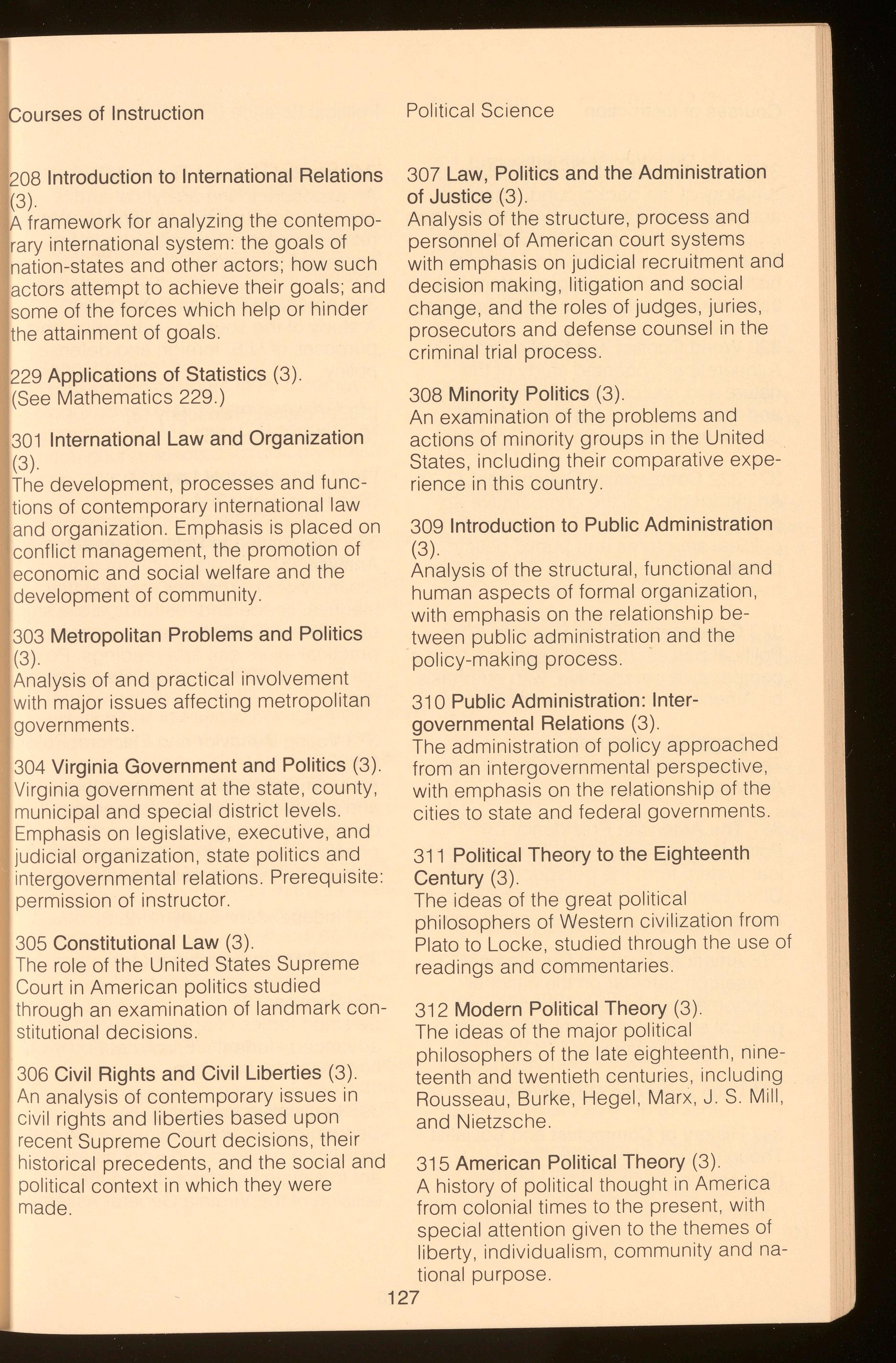
208 Introductionto InternationalRelations (3).
A framework for analyzing the contemporary international system: the goals of nation-states and other actors; how such acto rs attempt to achieve their goals; and some of the forces which help or hinder the attainment of goals
229 Applicationsof Statistics (3). (See Mathematics 229.)
301 InternationalLaw and Organization (3).
The development, processes and functio ns of contemporary international law and organization. Emphasis is placed on con flict management , the promotion of eco nomic and social welfare and the deve lopment of community .
303 Metropolitan Problems and Politics (3).
Ana lysis of and practical involvement with major issues affecting metropolitan gov ernments.
304 Virginia Government and Politics (3).
Virginia government at the state, county, municipal and special district levels. Emphasis on legislative , executive, and jud icial organization, state politics and inte rgovernmental relations. Prerequisite: per mission of instructor.
305 ConstitutionalLaw (3).
The role of the United States Supreme Court in American politics studied thro ugh an examination of landmark constit utional decisions.
306 Civil Rights and Civil Liberties (3).
An analysis of contemporary issues in civil rights and liberties based upon rece nt Supreme Court decisions , their historical precedents, and the social and po litical context in which they were made.
Political Science
307 Law, Politicsand the Administration of Justice (3).
Analysis of the structure, process and personnel of American court systems with emphasis on judicial recruitment and decision making, litigation and social change , and the roles of judges, juries, prosecutors and defense counsel in the criminal trial process.
308 Minority Politics (3).
An examination of the problems and actions of minority groups in the United States , including their comparative experience in this country .
309 Introductionto Public Administration (3).
Analysis of the structural , functional and human aspects of formal organization , with emphasis on the relationship between public administration and the policy-making process.
310 Public Administration:Intergovernmental Relations (3).
The administration of policy approached from an intergovernmental perspective , with emphasis on the relationship of the cities to state and federal governments.
311 PoliticalTheory to the Eighteenth Century (3)
The ideas of the great political philosophers of Western civilization from Plato to Locke, studied through the use of readings and commentaries.
312 Modern PoliticalTheory (3)
The ideas of the major political philosophers of the late eighteenth, nineteenth and twentieth centuries , including Rousseau, Burke , Hegel , Marx, J. S Mill, and Nietzsche.
315 American PoliticalTheory (3)
A history of political thought in America from colonial times to the present , with special attention given to the themes of liberty, indi v idualism , community and national purpose.
Courses of Instruction
316 American ConstitutionalHistory (3).
A history of the background , adoption and development of the Constitution, with emphasis on the role of the Supreme Court and judicial review in American history and on the changing interpretations of key provisions in the Constitution.
320 World Conflictand PublicOrder (3).
A theoretically oriented study of the nature and sources of interstate conflict and the capacity of the international system for dealing with such conflict.
321-322 Comparative Government (3-3).
An introduction to the comparative approach and a survey of political culture , political structures and public policy processes in Great Britain , France , Germany and the Soviet Union
323 Comparative Party Systems (3).
Political parties and party systems from a comparative perspective , with emphasis on American and European parties.
326 LegislativeProcess (3)
The organization and functions of the American Congress.
327 The American Presidency (3)
Political leadership in the American political sy stem from the perspective of the Chief Executive Particular attention to the expansion and use of presidential power.
328 American National Government (3)
A research seminar on the national policy-making process for advanced political science students. Prerequisite: permission of instructor
331 Latin American Government (3)
34 7 Historyof Communistand Socialist Thought (3) (See History 347.)
Political Science
348 Marxist PoliticalTheory (3).
An exposure to the analytical and philosophical thought of Karl Marx as it relates to political phenomena in the contemporary world.
350 American Foreign Policy (3).
A study of the sources , substance and purposes of U.S. foreign and defense policy .
[362) PoliticalPhilosophy(3). (See Philosophy 362.)
[364] Philosophyof Law (3). (See Philosophy 364.)
371 Introductionto PoliticalResearch and Analysis (3).
A survey of approaches , orientations , theories, scope and methods in the study of politics, exemplified primarily through practical exercises and readings. Political Science 229 is a suggested supplement.
373 Voting Behavior and Electoral Politics (3) .
An examination of the major theoretical and substantive issues of modern publi c opinion and voting behavior, with emphasis on various methodologies for understanding voting trends and patterns
390 lndependentStudy(1, 2 , 3).
391-392 Honors Seminar (3-3).
393 Seminar (3).
Selected topics of special interest to advanced students. Enrollment by invitation only.
395 LegislativeInternship(6)
Combines a weekly seminar on the state legislative process and work as an as sist· ant to a state legislator during the session of the Virginia General Assembl y
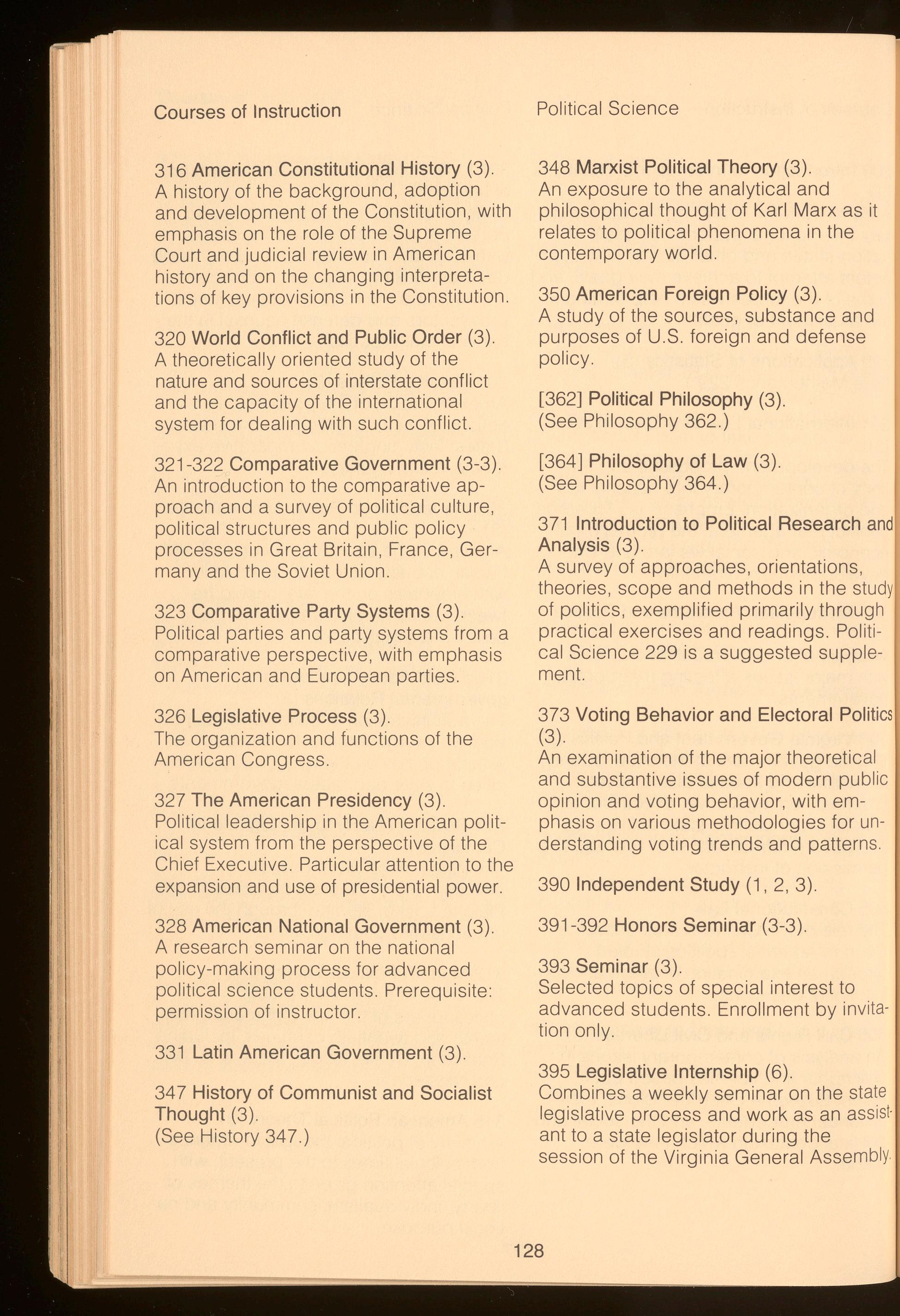
Coursesof Instruction

Psychology
L . James Tromater , Chairman
Professors Blick, Filer
Associate Professors Dickinson, Kozub, Tromater
Assistant Professors Hopkins, Jaremka, Preston , Sholley , Walker
Concentration
Th irty semester hours in Psychology . Required course : Psychology 101. A gra de of not less than C is required in eac h course elected to fulfill the major co ncentration requirement.
101 IntroductoryPsychology(3).
Sc ientific principles of behavior A survey co urse emphasizing psychological methods and research involved in understa nding human behavior Research partic ipation or equivalent required
200 Practical Psychology(3).
This course aims to provide the student w ith findings in Psychology for application to everyday social situations . Course c ontent includes intimacy, personal values, interpersonal change and enhancement of interpersonal skills.
230 Psychologyof Sex Roles (3).
Students analyze sex roles as a function of biological and environmental forces with an emphasis on traditional and mo dern roles. cultural effects on roles and psychological problems unique to women Prerequisite: permission of instructor.
237 StatisticalMethods (4) .
Descriptive , inferential and correlational tec hniques applied to analysis of data , with emphasis on analysis of variance. Three lecture and two laboratory hours a week.
Psychology
301 Experimental Psychology(4).
Introduction to experimental methods and laboratory techniques in the related research literature. Prerequisites: Psychology 101 and 237.
305 Perception(4)
Psychophysics , sensory structure and response , vision, audition , illusions and adaptation. Preparation of laboratory reports involving experiments in above areas Three lecture and two laboratory hours a week . Prerequisites: Psychology 101 and 237 .
306 Social Psychology(4)
The study of man as a social animal , his effects on others and their effects on him. Three lecture and two laboratory hours a week. Prerequisite: Psychology 101 .
307 Abnormal Behavior (3)
Survey of deviant behaviors Study of cases , research and theory. Prerequisite : Psychology 101 , recommended 331 or 332
308 Conceptionsof Personality(3)
Survey of nature , origins and functions of personality conceptions , analysis of research literature on several substantive topics and exposure to some personality theories and models Prerequisite : Psychology 101 .
309 PhysiologicalPsychology(4)
Bodily processes involved in sensorymotor systems. motivation, emotion , learning and memory Preparation of laboratory reports involving experiments in above areas. Three lecture and two laboratory hours a week. Prerequisites : Psychology 101 and 237 . Recommended prerequisite : Psychology 304.
310 Characteristicsof Childrenwith Learning Disabilities(3).
Survey of specific learning disabilities , etiological theories, and remediation methods. Prerequisite: Psychology 101
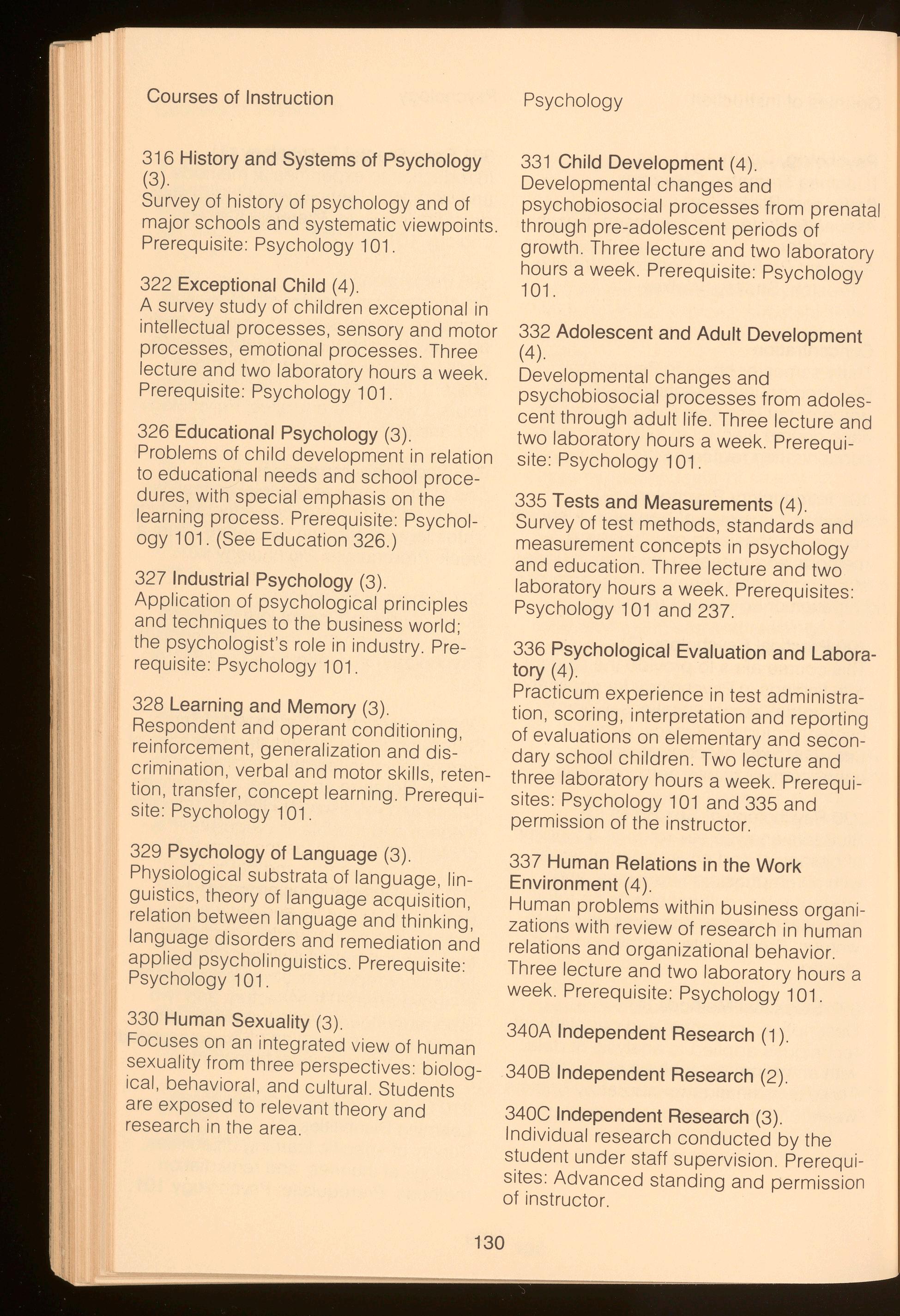
Courses of Instruction
316 Historyand Systems of Psychology (3).
Survey of history of psychology and of major schools and systematic viewpoints. Prerequisite: Psychology 101.
322 ExceptionalChild (4).
A survey study of children exceptional in intellectual processes, sensory and motor processes, emotional processes. Three lecture and two laboratory hours a week. Prerequisite: Psychology 101.
326 EducationalPsychology(3).
Problems of child development in relation to educational needs and school procedures, with special emphasis on the learning process. Prerequisite: Psychol- ogy 101. (See Education 326.)
327 IndustrialPsychology(3).
Application of psychological principles and techniques to the business world; the psychologist's role in industry. Pre- requisite: Psychology 101.
328 Learningand Memory (3).
Respondent and operant conditioning, reinforcement, generalization and discrimination , verbal and motor skills, retention, transfer, concept learning. Prerequi- site: Psychology 101.
329 Psychologyof Language (3).
Physiological substrata of language, linguistics, theory of language acquisition, relation between language and thinking, language disorders and remediation and applied psycholinguistics. Prerequisite: Psychology 101.
330 Human Sexuality (3).
Focuses on an integrated view of human sexuality from three perspectives: biolog- ical, behavioral , and cultural . Students are exposed to relevant theory and research in the area.
Psychology
331 Child Development (4).
Developmental changes and psychobiosocial processes from prenatal through pre-adolescent periods of growth. Three lecture and two laboratory hours a week. Prerequisite: Psychology 101.
332 Adolescent and Adult Development (4 ).
Developmental changes and psychobiosocial processes from adolescent through adult life . Three lecture and two laboratory hours a week. Prerequi- site: Psychology 101.
335 Tests and Measurements (4).
Survey of test methods, standards and measurement concepts in psychology and education. Three lecture and two laboratory hours a week. Prerequisites: Psychology 101 and 237.
336 PsychologicalEvaluationand Laboratory (4).
Practicum experience in test administration, scoring, interpretation and reporting of evaluations on elementary and secondary school children. Two lecture and three laboratory hours a week. Prerequisites: Psychology 101 and 335 and permission of the instructor.
337 Human Relations in the Work Environment(4).
Human problems within business organi- zations with review of research in human relations and organizational behavior. Three lecture and two laboratory hours a week. Prerequisite: Psychology 101.
340A Independent Research (1 ).
340B Independent Research (2).
340C IndependentResearch (3).
Individual research conducted by the student under staff supervision. Prerequisites: Advanced standing and permission of instructor.
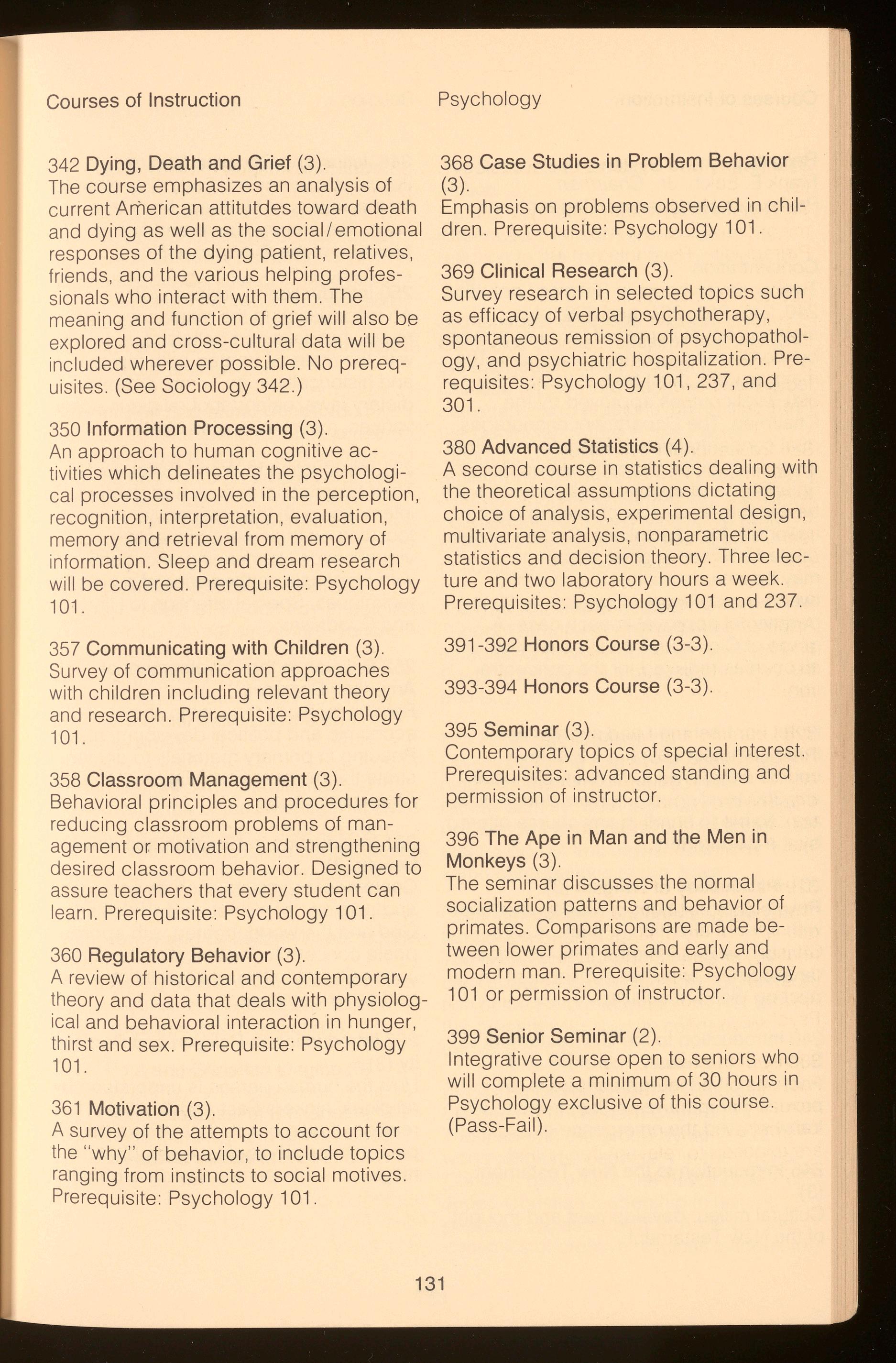
342 Dying, Death and Grief (3).
The course emphasizes an analysis of current American attitutdes toward death and dying as well as the social/emotional responses of the dying patient, relatives, friends, and the various helping professionals who interact with them. The meaning and function of grief will also be explored and cross-cultural data will be included wherever possible. No prerequisites. (See Sociology 342.)
350 Information Processing (3).
An approach to human cognitive activities which delineates the psychological processes involved in the perception, recognition, interpretation, evaluation, memory and retrieval from memory of information. Sleep and dream research will be covered. Prerequisite: Psychology 101.
357 Communicating with Children (3).
Survey of communication approaches with children including relevant theory and research. Prerequisite: Psychology 101.
358 Classroom Management (3).
Behavioral principles and procedures for reducing classroom problems of management or motivation and strengthening desired classroom behavior. Designed to assure teachers that every student can learn. Prerequisite: Psychology 101.
360 Regulatory Behavior (3).
A review of historical and contemporary theory and data that deals with physiological and behavioral interaction in hunger, thirst and sex. Prerequisite: Psychology 101.
361 Motivation (3).
A survey of the attempts to account for the " why" of behavior, to include topics ranging from instincts to social motives. Prerequisite: Psychology 101.
368 Case Studies in Problem Behavior (3).
Emphasis on problems observed in children Prerequisite: Psychology 101.
369 Clinical Research (3).
Survey research in selected topics such as efficacy of verbal psychotherapy, spontaneous remission of psychopathology, and psychiatric hospitalization. Prerequisites: Psychology 101, 237, and 301.
380 Advanced Statistics (4).
A second course in statistics dealing with the theoretical assumptions dictating choice of analysis, experimental design, multivariate analysis, nonparametric statistics and decision theory. Three lecture and two laboratory hours a week. Prerequisites: Psychology 101 and 237 .
391-392 Honors Course (3-3).
393-394 Honors Course (3-3).
395 Seminar (3).
Contemporary topics of special interest. Prerequisites: advanced standing and permission of instructor.
396 The Ape in Man and the Men in Monkeys (3).
The seminar discusses the normal socialization patterns and behavior of primates. Comparisons are made between lower primates and early and modern man. Prerequisite: Psychology 101 or permission of instructor .
399 Senior Seminar (2).
Integrative course open to seniors who will complete a minimum of 30 hours in Psychology exclusive of this course. (Pass-Fail).
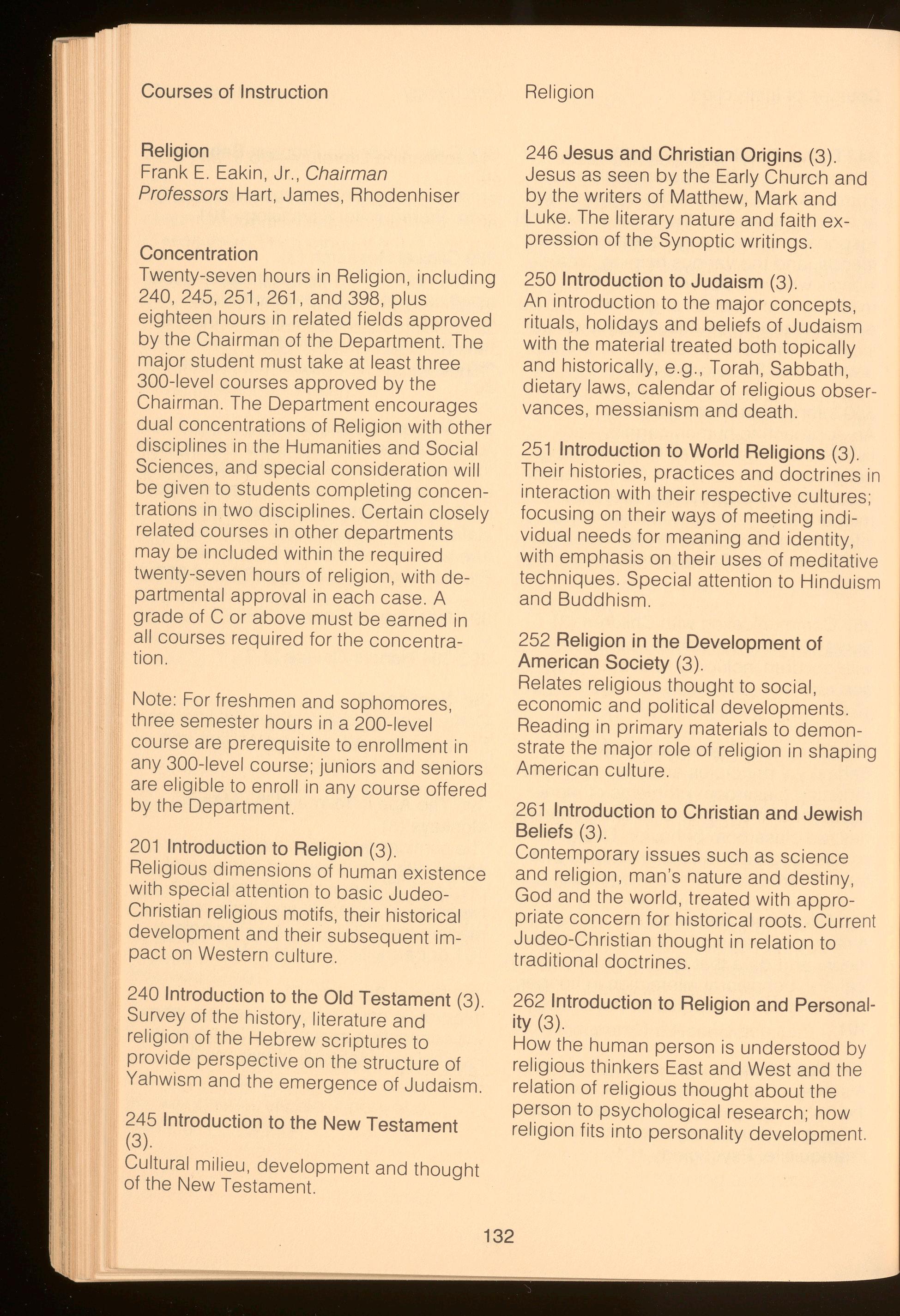
Courses of Instruction
Religion
Frank E. Eakin, Jr., Chairman
Professors
Hart, James, Rhodenhiser
Concentration
Twenty-seven hours in Religion, including 240, 245, 251, 261, and 398, plus eighteen hours in related fields approved by the Chairman of the Department. The major student must take at least three 300-level courses approved by the Chairman. The Department encourages dual concentrations of Religion with other disciplines in the Humanities and Social Sciences, and special consideration will be given to students completing concentrations in two disciplines. Certain closely related courses in other departments may be included within the required twenty-seven hours of religion, with departmental approval in each case. A grade of C or above must be earned in all courses required for the concentration.
Note: For freshmen and sophomores, three semester hours in a 200-level course are prerequisite to enrollment in any 300-level course; juniors and seniors are eligible to enroll in any course offered by the Department.
201 Introductionto Religion (3).
Religious dimensions of human existence with special attention to basic JudeoChristian religious motifs, their historical development and their subsequent impact on Western culture.
240 Introductionto the Old Testament (3). Survey of the history, literature and religion of the Hebrew scriptures to provide perspective on the structure of Yahwism and the emergence of Judaism.
245 Introductionto the New Testament (3).
Cultural milieu, development and thought of the New Testament.
Religion
246 Jesus and ChristianOrigins (3). Jesus as seen by the Early Church and by the writers of Matthew , Mark and Luke. The literary nature and faith expression of the Synoptic writings.
250 Introductionto Judaism (3).
An introduction to the major concepts, rituals, holidays and beliefs of Judaism with the material treated both topically and historically, e.g., Torah, Sabbath, dietary laws, calendar of religious observances, messianism and death.
251 Introductionto World Religions (3). Their histories, practices and doctrines in interaction with their respective cultures; focusing on their ways of meeting individual needs for meaning and identity , with emphasis on their uses of meditative techniques. Special attention to Hinduis m and Buddhism.
252 Religion in the Development of American Society (3).
Relates religious thought to social, economic and political developments. Reading in primary materials to demonstrate the major role of religion in shaping American culture.
261 Introductionto Christianand Jewish Beliefs (3).
Contemporary issues such as science and religion, man's nature and destiny, God and the world, treated with appropriate concern for historical roots. Current Judea-Christian thought in relation to traditional doctrines.
262 Introductionto Religionand Personality (3).
How the human person is understood by religious thinkers East and West and the relation of religious thought about the person to psychological research; how religion fits into personality development.
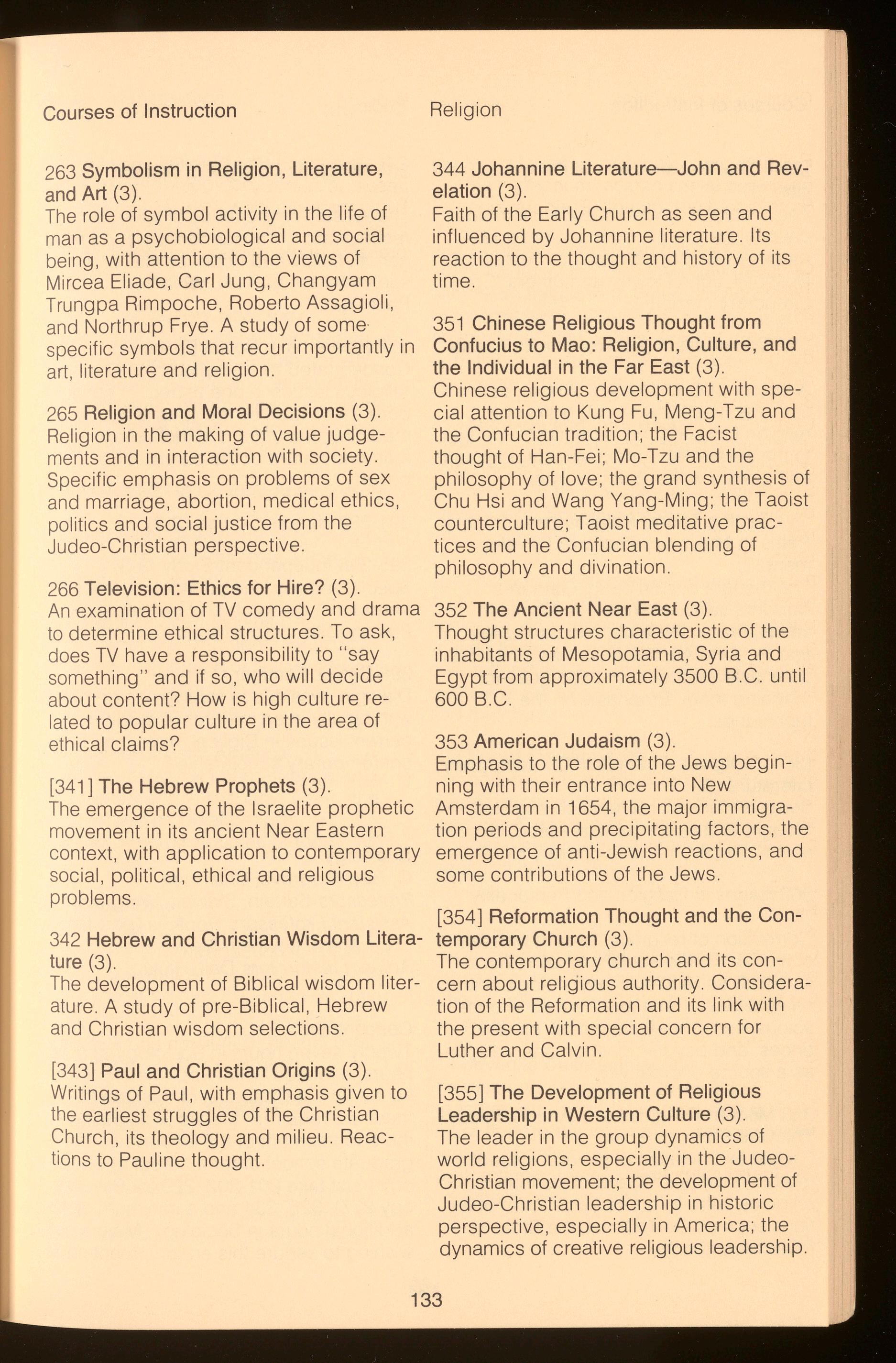
Coursesof Instruction
263 Symbolismin Religion, Literature, and Art (3)
The role of symbol activity in the life of man as a psychobiological and social being, with attention to the views of Mircea Eliade, Carl Jung, Changyam Trungpa Rimpoche, Roberto Assagioli, and Northrup Frye. A study of some spec ific symbols that recur importantly in art, literature and religion.
265 Religionand Moral Decisions (3). Religion in the making of value judgements and in interaction with society. Specific emphasis on problems of sex and marriage, abortion , medical ethics, politics and social justice from the Judea-Christian perspective.
266 Television: Ethicsfor Hire? (3).
An examination of TV comedy and drama to determine ethical structures To ask, does TV have a responsibility to " say something " and if so, who will decide about content? How is high culture related to popular culture in the area of ethica l claims?
(341] The Hebrew Prophets (3).
The emergence of the Israelite prophetic movement in its ancient Near Eastern context, with application to contemporary soc ial, political , ethical and religious prob lems
342 Hebrew and ChristianWisdom Literature (3).
The development of Biblical wisdom literature. A study of pre-Biblical, Hebrew and Christian wisdom selections.
(343] Paul and ChristianOrigins (3). Writings of Paul, with emphasis given to the earliest struggles of the Christian Churc h , its theology and milieu. Reactions to Pauline thought.
Religion
344 Johannine Literature-John and Revelation (3).
Faith of the Early Church as seen and influenced by Johannine literature. Its reaction to the thought and history of its time.
351 Chinese ReligiousThought from Confuciusto Mao: Religion,Culture, and the Individualin the Far East (3).
Chinese religious development with special attention to Kung Fu, Meng-Tzu and the Confucian tradition; the Facist thought of Han-Fei; Mo-Tzu and the philosophy of love; the grand synthesis of Chu Hsi and Wang Yang-Ming; the Taoist counterculture; Taoist meditative practices and the Confucian blending of philosophy and divination .
352 The Ancient Near East (3). Thought structures characteristic of the inhabitants of Mesopotamia, Syria and Egypt from approximately 3500 B.C. until 600 B.C.
353 American Judaism (3).
Emphasis to the role of the Jews beginning with their entrance into New Amsterdam in 1654, the major immigration periods and precipitating factors, the emergence of anti-Jewish reactions, and some contributions of the Jews.
(354] ReformationThought and the Contemporary Church (3).
The contemporary church and its concern about religious authority. Consideration of the Reformation and its link with the present with special concern for Luther and Calvin.
(355] The Development of Religious Leadershipin Western Culture (3).
The leader in the group dynamics of world religions, especially in the JudeaChristian movement; the development of Judea-Christian leadership in historic perspective, especially in America; the dynamics of creative religious leadership.
Courses of Instruction
[356] The Transmissionof ReligiousTradition (3)
The history of Jewish and Christian educational programs, both ancient and modern. The contributions of Pestalozzi, Bushnell, John Dewey and others. Contemporary curricula .
357 Communismand Religionin Russia (3).
A history of Orthodoxy in Russia; delineation of issues between Marxism and religion following the revolution; attention to the spread of Communist ideology and encounters with religious forces.
360 Getting There: Religiousand Secular Paths to Maximum Personal Development (3).
The thought of Carl Jung, Gautama Buddha, various Hindu and Christian saints, Freud , Plotinus, Aldous Huxley and Roberto Assagioli on man's highest potentialities and their techniques for reaching them. Emphasis on the techniques
[361] ReligiousThemes in Contemporary Literature(3).
Some enduring problems of religious thought and action as expressed, directly and indirectly, in contemporary literature.
362 Issues in Religionand Personality (3).
Correlation of religious thought with that of thinkers in the social and behavioral sciences as relates to psychological and religious views of altered states of consciousness , conversion , peak experiences , and psychic phenomena ; religion as a source of creativity.
363 Modern Religiousand Anti-Religious Thinkers (3).
Sociology
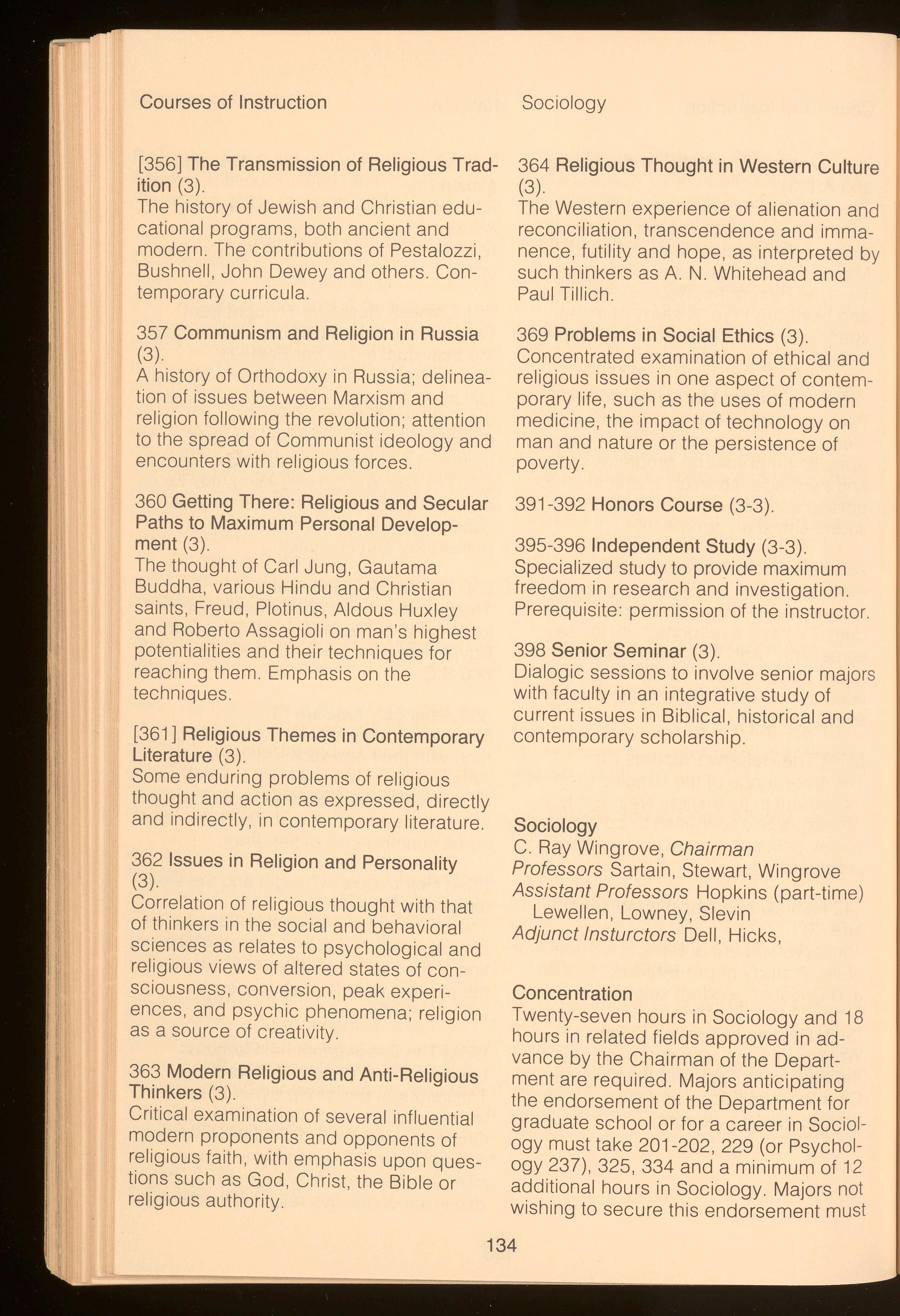
Critical examination of several influential modern proponents and opponents of religious faith, with emphasis upon questions such as God, Christ, the Bible or religious authority.
364 ReligiousThought in Western Culture (3).
The Western experience of alienation and reconciliation, transcendence and immanence , futility and hope , as interpreted b y such thinkers as A. N. Whitehead and Paul Tillich.
369 Problems in Social Ethics (3).
Concentrated examination of ethical and religious issues in one aspect of contemporary life, such as the uses of modern medicine , the impact of technology on man and nature or the persistence of poverty.
391-392 Honors Course (3-3).
395-396 Independent Study (3-3).
Specialized study to provide maximum freedom in research and investigation. Prerequisite: permission of the instructor .
398 Senior Seminar (3).
Dialogic sessions to involve senior major s with faculty in an integrative study of current issues in Biblical, historical and contemporary scholarship.
Sociology
C. Ray Wingrove, Chairman
Professors Sartain , Stewart, Wingrove Assistant Professors Hopkins (part-time) Lewellen, Lowney, Slevin Adjunct lnsturctors Dell, Hicks,
Concentration
Twenty-seven hours in Sociology and 18 hours in related fields approved in advance by the Chairman of the Department are required. Majors anticipating the endorsement of the Department for graduate school or for a career in Sociology must take 201-202, 229 (or Psychology 237), 325, 334 and a minimum of 12 additional hours in Sociology. Majors not wishing to secure this endorsement must

take 201-202, 334 and three semester hours of anthropology beyond 205, plus a minimum of 15 additional hours in Sociology. A grade of not less than C is required in each course in the main field of concentration.
201-202 IntroductorySociology(3-3).
Fundamental concepts and principles of sociology applied to American society: culture; human nature and personality; social progress; communities; social institutions; social class; social change. Prerequisite for 202: Sociology 201.
205 Introductionto Cultural Anthropology (3).
Origins of man; development of transmission of culture; backgrounds of social institutions and organizations.
207 North American Indians (3).
The historical development, variability, and present problems of Native Americans from Rio Grande to the Arctic Circle. No prerequisites.
208 Peoples of Latin America (3).
The anthropology of Latin America: the high cultures of pre-Hispanic times, the conquest and colonial periods, and the tribal and peasant peoples of today. No prerequisites.
209 Human Origins (3).
Evolution, both physical and cultural, is the theme of this introduction to physical anthropology and archaelogy. Subjects include the principles of human evolution, primate behavior, and the development of man and culture during the last two million years. No prerequisites.
229 Applicationsof Statistics(3). (See Mathematics 229.)
301 The City (3).
Development of urban society and metropolitan community. Historical, ecological, and social bases of change, stress-
Sociology
ing those factors which have demonstrable impacts on human social behavior. Prerequisite: Sociology 201-202.
302 ContemporaryUrban Issues (3).
Major issues of the contemporary city, alternative solutions to these problems; human relations, education, finance, government, housing, urban renewal, transportation and pollution. Prerequisite: Sociology 201-202.
303 Marriage and the Family (3).
Premarital sex; factors affecting mate selection; social class, ethnic and racial differences in families; the young family. Prerequisite: Sociology 201-202 or Psychology 101.
304 Religion in Traditional Cultures (3). A survey of the religions of traditional societies. An anthropological perspective is used to analyze religion within its cultural context. Emphasis is placed on the role of the shamans, varieties of ritual and their functions.
309 Social Problems (3).
Personal-social disorganization and maladjustment; physical and mental handicaps; economic inadequacies; programs and methods of social treatment and control. Prerequisite: Sociology 201-202.
310 Criminology(4).
Laws; prevalence and distribution of trends in crime; theories of crime; police actions; court actions; the penal system. Prerequisite: Sociology 201-202.
311 Juvenile Delinquency (4)
The meaning of juvenile delinquency; measurement, prevalence and distribution of and trends in juvenile delinquency; theories of delinquency; police actions; court actions; juvenile institutions. Prerequisite: Sociology 201-202.
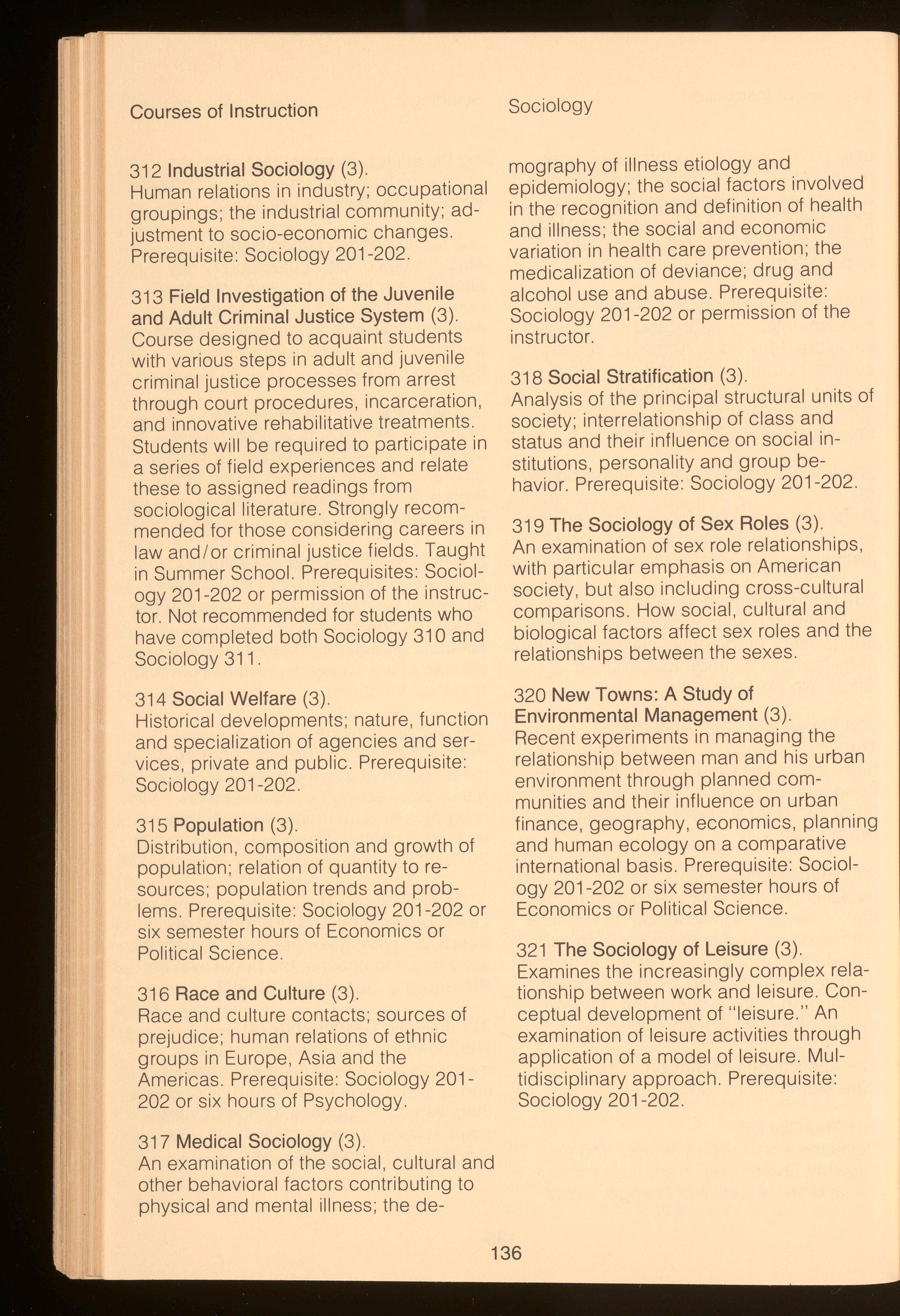
312 IndustrialSociology(3).
Human relations in industry; occupational groupings; the industrial community; adjustment to socio-economic changes. Prerequisite: Sociology 201-202.
313 Field Investigationof the Juvenile and Adult Criminal Justice System (3).
Course designed to acquaint students with various steps in adult and juvenile criminal justice processes from arrest through court procedures, incarceration , and innovative rehabilitative treatments. Students will be required to participate in a series of field experiences and relate these to assigned readings from sociological literature. Strongly recommended for those considering careers in law and / or criminal justice fields. Taught in Summer School. Prerequisites: Sociology 201-202 or permission of the instructor. Not recommended for students who have completed both Sociology 310 and Sociology 311.
314 Social Welfare (3).
Historical developments; nature, function and specialization of agencies and services, private and public. Prerequisite: Sociology 201-202.
315 Population(3).
Distribution, composition and growth of population; relation of quantity to resources ; population trends and problems. Prerequisite: Sociology 201-202 or six semester hours of Economics or Political Science.
316 Race and Culture (3).
Race and culture contacts; sources of prejudice; human relations of ethnic groups in Europe, Asia and the Americas. Prerequisite: Sociology 201202 or six hours of Psychology.
317 Medical Sociology(3)
An examination of the social, cultural and other behavioral factors contributing to physical and mental illness; the de-
Sociology
mography of illness etiology and epidemiology ; the social factors involved in the recognition and definition of health and illness; the social and economic variation in health care prevention; the medicalization of deviance; drug and alcohol use and abuse. Prerequisite: Sociology 201-202 or permission of the instructor.
318 Social Stratification(3).
Analysis of the principal structural units of society; interrelationship of class and status and their influence on social institutions, personality and group behavior. Prerequisite: Sociology 201-202.
319 The Sociologyof Sex Roles (3).
An examination of sex role relationships , with particular emphasis on American society, but also including cross-cultural comparisons. How social , cultural and biological factors affect sex roles and the relationships between the sexes.
320 New Towns: A Study of EnvironmentalManagement (3). Recent experiments in managing the relationship between man and his urban environment through planned communities and their influence on urban finance, geography, economics, planning and human ecology on a comparative international basis. Prerequisite: Sociology 201-202 or six semester hours of Economics Oi Political Science.
321 The Sociologyof Leisure (3).
Examines the increasingly complex relationship between work and leisure. Conceptual development of " leisure." An examination of leisure activities through application of a model of leisure. Multidisciplinary approach. Prerequisite: Sociology 201-202.
Courses of Instruction

322 Collective Behavior (3)
Social interaction in mass behavior; structure and functioning of crowds, audiences, publics and mass movements. Prerequisite: Sociology 201 or 202, or Psycho logy 101 .
323 The Black Community in Urban America (3).
Life as viewed by Black residents: the family, economy, the law, education, health, housing, welfare, recreation, politics and religion. Prerequisites: six hours in the social sciences and permission of the instructor.
324 Sociology of Law (3).
An examination of social and cultural variations within and between legal systems and the social nature of the legal system and legal professions as affected by social class, ethnic and cultural background and perspectives. The course will cover various sociological issues within both civil and criminal law including interactions between individuals within the legal system. Prerequisite: Sociology 201.
325 Sociological Method (3).
Design and methods of sociological study; data collection and analysis; report formulation. Prerequisites: Sociology 201-202 and six additional semester hours in Sociology or in a closely related field.
326-327 Directed Independent Study (3-3)
Prerequisite: permission of the instructor.
328 Social Gerontology (3).
Processes of aging and problems of the aged; social adjustment, retirement, mobility, living arrangements; public and private programs of finance and care. Prerequisite: Sociology 201-202.
Sociology
329 Educational Sociology (3).
Sociological analysis of education and its functions; school and community relationships; problems of social change and educational adjustments. Prerequisite Sociology 201-202 or six hours in Education.
330 Social Change (3)
Examination of sociological theories of change with particular emphasis on social change in the twentieth century. The course will focus on both international and domestic change: the manner in which change within individual societies affects the world system, and likewise, the manner in which change in the international balance of power influences individual societies. Attention will be given to the shifting balance of international economic, political, and cultural relations between core, peripheral, and semi-peripheral societies. Prerequisite Sociology 201-202 or permission of the instructor.
331 Marriage and Kinship: The Anthropological Perspective (3).
A study of the patterns of social organization in technologically primitive societies around the world, including the impact of modernization on traditional forms of kinship and marriage. Prerequisite: three semester hours of anthropology or permission of the instructor.
332 Sociology of Literature (3)
The course will focus upon joining the perspectives of the humanities and sociology in examining literature as a significant feature of modern society. Literature to be examined as social product and social influence. The social organization of art and the role of the artist will also be examined. Prerequisite: Sociology 201-202 or permission of the instructor.
Courses of Instruction
334 Sociological Theory (3) . Development of the science of sociology ; historical antecedents ; recent theories of society. Prerequisites : Sociology 201-202 and six additional hours in Sociology or in a closely related field.
335 Theory in Anthropology (3).
An historical approach to the development of cultural anthropology as a science , including the most recent theories and controversies. Prerequisite : three semester hours of anthropology or permission of the instructor .
342 Dying, Death and Grief (3).
The course emphasizes an analysis of current American attitudes toward death and dying as well as the social / emotional responses of the dying patient , relatives, friends , and the various helping professionals who interact with them. The meaning and function of grief will also be explored and cross-cultural data will be included wherever possible. No prerequisites (See Psychology 342 )
391-392 Honors Course (3-3)
393-394 Honors Course (3-3).

Speech Communication and Theatre Arts
William H. Lockey Jr. , Chairman
Professor Tarver
Associate Professors Graeber, Welsh
Assistant Professors Frank , Lockey
Instructors Craddock , Daniel , Salisbury
Concentration
For Speech Communication majors and Theatre History and Theory majors 24 semester hours are required in Speech Communication and Theatre Arts including Speech 101 and Theatre Arts 215. A grade of not less than C is required in each course in the field of concentration.
Speech Communications and The atre Art s
For Theatre Theory and Practice majors requirements are Speech 101 plus 30 semester hours in Theatre Arts including 201, 202 , 203, 204, 208 and 215. A minimum of six semester hours of Practicum A grade of not less than C is required in each course in the field of concentration Suggested related courses: Art 212 , 221-222 , 313-314, 315 , 316, 317-318; selected courses in Studio Art ; English 303-304 , 331 , 332, 333 and 334 ; Music 111-112 ; selected courses in Applied Music ; Health and Physical Education 313 , 314 and 302 .
Speech Communication
101 Principles of Speech Communication (3)
Theory and practice in organization , composition and delivery.
102 General Speech Communication (3) Survey of semantics , freedom of speech , ethics in communication , parliamentary procedure, group method and speeches for special occasions Prerequisite: Speech 101.
[202] Oral Interpretation (3)
205 Interpersonal Communication (3) Analysis of complex and interacting factors that contribute to effective transmission of ideas; emphasis on understanding underlying principles.
[221] Mass Communication (3).
Awareness and understanding of persuasive and manipulating nature of mass media.
[225] Cross-Cultural Communication (3). Understanding of and improving proficiency in communication across cultural barriers
Courses of Instruction

301 Argumentationand Debate (3).
Principles of argumentation and formal d ebating . Practical application through student projects.
305 Group Communication(3).
Modern theory and methodology: participation in group discussion relating theory to specific communication problems.
[306] Persuasion (3)
A pplication to specific speech situations . Especially recommended for debaters, p relegal and ministerial students. Prerequisite: Speech 101-102.
32 1 Development of Speech Communication Theory (3)
Principles of communication developed fro m the precepts of major classical rhetoricians.
325 American Public Address (3).
Colonial times to the present. Critical study of resources of selected speakers, co ntent of speeches and effect on s ignificant issues
[331] Phonetics:Theory and Application to Speech Improvement (3). Phonemes of American English Attention to standard pronunciation. Formation of so unds , acquisition of speech, problems of diction and acoustic variables.
Theatre Arts
201 ProductionI: Stagecraft (3).
A study of the technical aspects of scenery; theory and practical a pplications. Laboratory hours required. No prerequisites.
202 ProductionII : Stage Lighting(3).
The mechanics and artistic aspects of stage lighting in theory and in practice; d esigning and executing light plots included. Laboratory hours required . No p rerequisites.
Speech Communications and Theatre Arts
203 ProductionIll: Stage Design (3). The artistic aspects of stage setting both in theory and in practice ; consideration of mechanical perspective, watercolor sketching, color schemes, and history of period design Prerequisites: Theatre Arts 201 or permission of the instructor .
204 ProductionIV : Stage Sound and Special Effects (3).
Technical and artistic consideration of mechanical and electronic sound for the theatre; examination of new developments in the theatre. No prerequisites
208 Productionand Direction(3).
Problems of play selection, casting , backstage organization; study of style in direction and production; scene work . Laboratory assignments with major productions. Prerequisite : permission of the instructor.
209-21 O Television and Radio News (3-3)
(See Journalism 209-210.)
[212] Theories and Styles of Acting (3). From Aristotle to Grotowski , emphasizing basic acting techniques and the role of characterization in the play.
213 Stage Makeup (1 ).
History and aesthetics; emphasis on technique in creating characterization . Laboratory assignments in conjunction with major productions.
215 Introductionto the Theatre (3). Survey of contemporary theatre in relation to its historical development, dramatic literature and aesthetics.
303 Advanced Directing(3)
Periods and styles in direction, with scene work and one-act plays prepared for production by each student. Prerequisite : permission of the instructor.

Courses of Instruction
307-308 History of the Theatre (3-3).
Major forms and periods in the theatre. Study of selected playwrights, theatre companies and theatre movements.
309 History of Costume (3).
Introduction to period costume. Emphasis on civil costume.
(309] History of Costume (3).
Analysis and interpretation of the script, the costume plot, the designer 's sketch and the specifications of execution .
312 Seminar in Speech Communication and Theatre Arts (3).
Prerequisite: permission of the Chairman of the Department.
315 Independent Study (1, 2, 3)
In Speech Communication or Theatre Arts. Prerequisite: permission of the instructor.
332 Practicum(½, 1 , 1½, 2 , 3)
Understanding of theatre arts through analysis of and participation in creative theatrical efforts. At least four hours work for one hour of Practicum credit. Includes such research and written work as appropriate to the theatrical activity involved. Conditions under which Practicum credit is earned written out in advance and signed by student and theatre faculty member. Twelve hours maximum credit: six hours maximum per semester. Does not count for Speech Communication major or Theatre History and Theory major. Prerequisites: junior or senior standing permission of the Department.
Speech Communications and Theatre Art s
Practicum A : Stage Management (½, 1, 2, 3)
Practicum B: Theatre Administration (½ , 1, 2, 3)
Practicum C: Costume (½, 1, 2, 3)
Practicum D: Lighting(½, 1 , 2, 3)
Practicum E: Direction (½ , 1, 2 , 3)
Practicum F: Scenic Design (1, 2, 3)
Practicum G: Choreography (1 , 2 , 3)
Practicum H : Acting (1 , 2 , 3)
Practicum I: Technical Theatre(½, 1 , 2 , 3)
Practicum J: Makeup(½, 1)
Practicum K: Theatre Dance(½, 1, 2)
360 History and Aesthetics of Film (3). (See English 360.)
SchoolOf BusinessAdministration
General Information
Objectives
The principal objectives of the School of Business Administration are: first, to provide a professional college education designed to attract qualified students and prepare them to meet the present and future challenges of a complex and dynamic business world ; and second, to assist in the development of the individual in a Christian environment to become a more useful citizen
Based upon a broad background in the arts and sciences, the School of Business Administration program is designed to provide knowledge and understanding of the fundamentals common to business enterprise, with the opportunity for specialization in one or more areas of study, and to develop the creative and analytical thought processes of the stude nt.
Accreditation
The undergraduate program of the School of Business Administration of the University of Richmond is nationally accredited by the American Assembly of Collegiate Schools of Business. Only a limited number of professional schools of business administration in the United States hold membership in the official national accrediting agency . Graduates of the School of Business Administration of the University of Richmond, therefore, have assurance that they have received quality instruction Accreditation is based on the caliber of the faculty, the academic program offered, the content and breadth of the curriculum, the financial support and the physical facilities of the sc hool.
AdmissionRequirements
For admission to the School of Business Administration, the general requirements are as follows
1 A student must have completed 60 semester hours of approved courses . The applicant is encouraged to submit an application and an official transcript from an accredited college or university after completing one academic year. The following subjects are required for the degree of Bachelor of Science in Business Administration, and it is strongly recommended that the pre-business student take these courses during his freshman and sophomore years
Courses
English (including grammar and composition)
Mathematics (academic) .... . . Math 251 or equivalent recommended Social Science* or Foreign Language
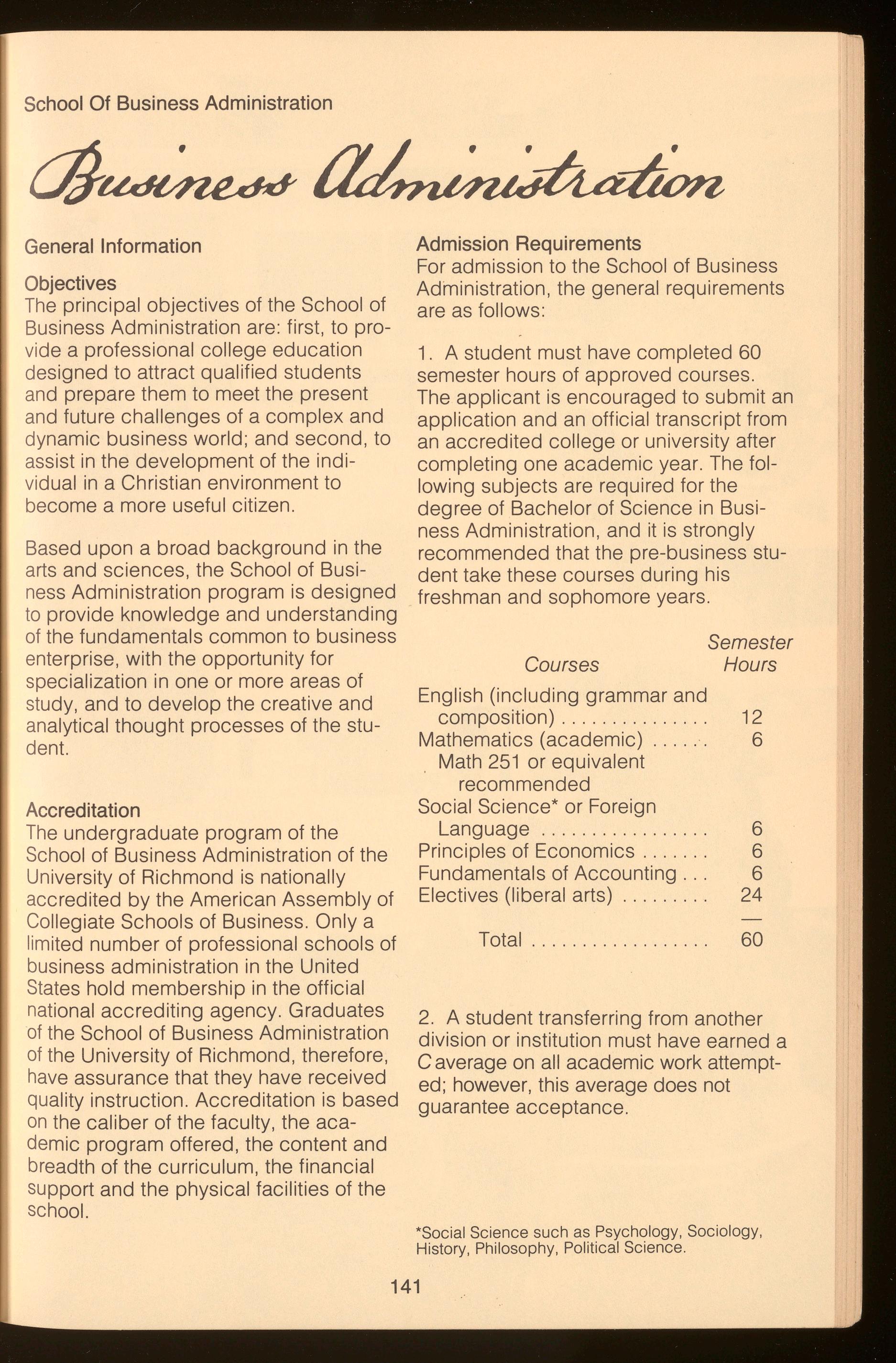
2 A student transferring from another division or institution must have earned a C average on all academic work attempted; however, this average does not guarantee acceptance.
*Social Science such as Psychology, Sociology, History, Philosophy, Political Science.


3. An interview is not required; however, it is to the applicant's advantage to visit the campus and talk with a member of the Admissions Committee.
4. The policy governing admission to the School of Business Administration provides equal educational opportunity to qualified applicants regardless of sex, religion, race, color, age, ethnic or national origin.
5. Final decision concerning admissions rests with the Admissions Committee.
Degree Requirements
The School of Business Administration offers the degree of Bachelor of Science in Business Administration.
Candidates for the Bachelor of Science in Business Administration degree must complete satisfactorily at least 120 semester hours of work, not including physical education activities courses, and earn a grade point average of not less than 2.000 on all work attempted. 1 At least 60 semester hours of approved junior and senior courses, including all those taken during the senior year, must be passed with at least a C average at the University of Richmond; and at least 54 of these 60 semester hours must be taken in the School of Business Administration of the University of Richmond.
A student must have completed four semester hours of physical education as specified under the Health and Physical Education Department's required Physical Education courses listing. This work should be taken before entering the School.
'A semester hour is the value of one class hour of work a week through the semester. Grade points are given for each semester hour according to the following scale: A-4, B-3, D-1, and F-0. The grade point average is determined by dividing the total number of grade points earned by the total number of academic hours attempted. Each of these totals is accumulated term by term.
Degree Requirements
A student must complete the requirements for the degree, as stated in the catalogue in effect at the time of entrance, within five years from the date of original entry. Reinstatement to a program after five years requires permission of the Academic Council. If an extension of time is granted, the student may be required to satisfy the degree requirements as stated in the catalogue in effect at the time of re-entrance.
A student must receive credit for attendance at Assemblies and Convocations during each semester he is enrolled as a full-time student in order to qualify as a candidate for a degree.
A student must file a degree application in the Office of the Dean by the first Friday in October for the coming May or August commencement. Those enrolled only in the spring, file by the first Friday in February. Students enrolled only in the summer term culminating in their graduation, file by the third Friday in June. Degree applications are available in either the Dean's or the Registrar's office.
A student must participate in commencement. Degrees are awarded in person. No deviation from this requirement is permitted except that a student may request graduation in absentia by stating in writing the very unusual circumstance that prevents participation in commencement. This request must be received by the University Registrar no later than eight working days before the ceremony. The Registrar will administer the policy in consultation with the Dean and notify the student. A candidate for graduation who does not participate in the commencement ceremony, unless approved as "in absentia," does not graduate. Such student may graduate by again filing a degree application and by observing the policy stated above concerning participation in commencement.
School of BusinessAdministration
Note: No degree is conferred if the student's financial responsibilities to the University are in an unsatisfactory condition.
Basic or Core Courses
The following courses are required of all students:
Courses
Marketing 321 . Fundamentals
Semester Hours of Marketing .........
Finance 365. Corporation Flnance .
Management Systems 333. Organizational Behavior .. ...
Management Systems 341 Operations Management
Marketing 322 Problems in Marketing OR Accounting 323 Problems in Managerial Accounting OR Finance 366. Problems in Corporation Finance OR
Management Systems 342 . Problems in Management Control
Economics 301. Money, Banking and Public Policy ..
Economics 311 . Managerial Economics
Mathematics 338.* Quantitative
Mathematical Analysis .
English 396. Report Writing ... .
Business Administration 301 Legal Environment of Business
Business Administration 307. Statistics .
Business Administration 310 ·.···
Computers in Business
Business Administration 311
*Waived if Mathematics 251 or equivalent presented
Degree Requirements
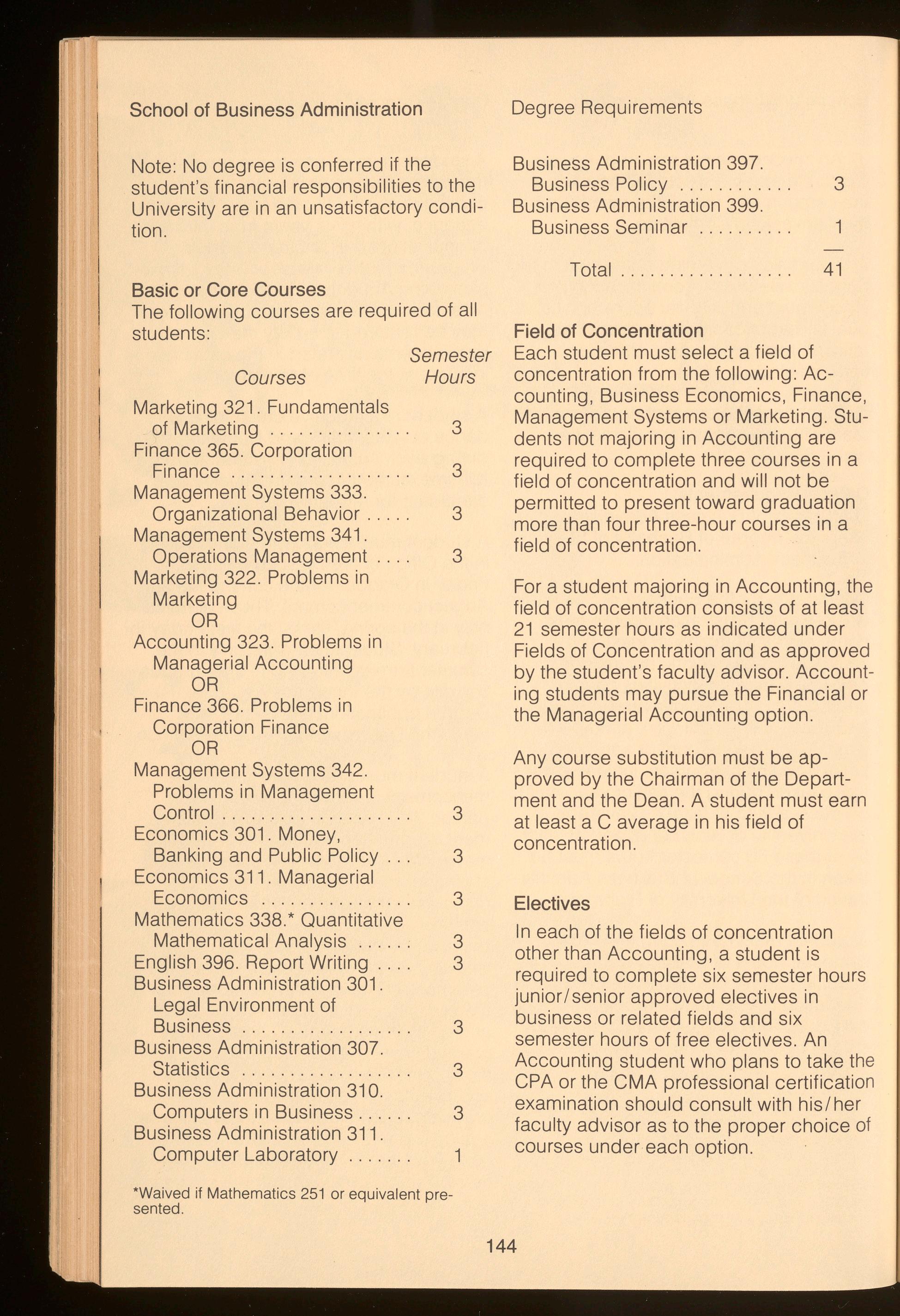
Field of Concentration
Each student must select a field of concentration from the following: Accounting , Business Economics , Finance , Management Systems or Marketing Students not majoring in Accounting are required to complete three courses in a field of concentration and will not be permitted to present toward graduation more than four three-hour courses in a field of concentration .
~or a student majoring in Accounting, the field of concentration consists of at least 21 semester hours as indicated under Fields of Concentration and as approved by the student's faculty advisor. Accounting students may pursue the Financial or the Managerial Accounting option .
Any course substitution must be approved by the Chairman of the Department and the Dean . A student must earn at least a C average in his field of concentration
Electives
In each of the fields of concentration other than Accounting, a student is required to complete six semester hour s junior / senior approved electives in business or related fields and six semester hours of free electives An Accounting student who plans to take th e CPA or the CMA professional certificatio n e x amination should consult with his / her faculty advisor as to the proper choice of courses under each option .

Schoolof BusinessAdministration
Fields of Concentration
Each student will select the course s to be included in his field of concentration from o ne of the following fields
Accounting
Ac counting 313 . Manageri a l Cost Accounting
Ac counting 314-315. Intermediate Accounting
Accounting 316 Advanced Accounting
Accounting 317 . Auditing
Accounting 318. Accounting Information Systems
Accounting 319. Tax Accounting
Accounting 320 . Financial Accounting Theory
BusinessEconomics
Economics 303 . Public Finance
Economics 308 International Trade and Finance
Economics 309. Government Regulation of Business
Economics 313. Macroeconomic Theory
Economics 314 . Labor Economics
Economics 317. Business Fluctuations
Economics 319. Econometrics
Economics 320 . Selected Economic Topics
Economics 325. History of Economic Thought
Finance
Finance 367. Commercial Bank Management
Finance 368 . Investments
Finance 369. Security Analysis
Insurance 351 Principles of Insurance
Management Systems
Management Systems 343. Personne l Management
Management Systems 344. Facilities Management
Management Systems 345 . Management Science
Management Systems 346. Executive Decision Making
Management Systems 347. Selected Topics in Management
Accounting
Marketing
Marketing 320 Selected Topics in Marketing
Marketing 323 Promotion
Marketing 327. Sales Management
Marketing 328 Marketing Research
Marketing 329 . Marketing Management
Deficiencies
A student whose cumulative grade point average is below 1 .6 at the end of his first semester , 1 .8 at the end of his second semester, or 1 9 thereafter must appear before the Academic Council and will be placed on academic probation or dismissed from the School, at the discretion of the Academic Council.
While on probation , a student is not permitted to participate in student activities such as athletics , debating, dramatic and musica l organizations, or to represent the University in any public capacity
Attendance
Students in the School of Business Administration are e x pected to attend their regularly schedu led classes on a professional basis. It is left to the individual instructor to evaluate each student 's record of attendance in arriving at a final grade. A student must attend at least 75% of the meetings of a class in order to receive credit for that course.
Accounting
Accounting 301-302 is a prerequisite to all subsequently numbered Accounting courses.
301 Fundamentalsof FinancialAccounting (3).
Basic theory , concepts and procedures necessary to develop and interpret financial (external) accounting data

School of Business Administration
302 Fundamentalsof Managerial Accounting(3)
Basic theory, concepts and procedures necessary to develop and interpret managerial (internal) accounting data . Prerequisite Accounting 301.
313 Managerial Cost Accounting(3).
Use of the internal accounting system in the preparation of relevant data for effec1 tive managerial planning and control decisions.
314-315 IntermediateAccounting(3-3).
Advanced level consideration of financial accounting and reporting; preparation, analysis and interpretation of corporate financial statements. 314 is prerequesite to 315.
316 Advanced Accounting(3).
Specialized problem solving in the accounting for partnerships, business combinations and consolidations, and governmental units.
317 Auditing(3)
Auditing standards, procedures and reports; professional responsibilities and ethics; systems of internal control.
318 AccountingInformationSystems (3).
Analysis, design and implementation of accounting information systems including 1 internal control and auditing considerations.
319 Tax Accounting(3)
Federal income tax law and related management and accounting problems
320 FinancialAccountingTheory (3)
Developments in generally accepted accoun_t,ng pnnciples and theory; special cons1derat1on of current accounting topics.
Economics
323 Problems in Managerial Accounting (3).
Case-oriented study emphasizing the application of managerial accounting concepts to the solution of planning and control problems of management.
Economics
Economic s 201-202 is a prerequisite to all subsequently numbered Economics courses. Both 201 and 202 must be taken in order to receive credit for either.
201-202 Principlesof Economics(6).
Survey of production, value and distribution, money and banking, international economics and economic systems.
301 Money, Banking and Public Policy (3).
A study of the money system , financial markets, the banking system, monetary and fiscal policy issues.
303 Public Finance (3).
Study of expenditures, revenues and debt management, with emphasis on the Federal Government.
308 InternationalTrade and Finance (3). Study of foreign trade, including the European Economic Community and principles of international payments, instruments and rates.
309 Government Regulation of Business (3).
Economic bases for the regulation of private business; elements of sound public policy toward business; development of federal regulation of business.
311 Managerial Economics (3).
A study of the fundamental, theoretical and analytical tools of economics as applied to decision making; illustration s from empirical stud ies and cases.
School of Business Administration
312 Microeconomic Theory (3).
Theory of the household, firm, industry; distribution theory; general equilibrium analysis.
313 Macroeconomic Theory (3).
National income accounts; study of classica l , Keynesian and post-Keynesian macroeconomics, including growth models.
314 Labor Economics (3). Factors affecting the labor force: hours, unemployment, labor organizations, industrial conflict and labor legislation
317 Business Fluctuations (3).
Measurement, evaluation and forecasting of business conditions; theories of the business cycle; application to private business and to government.
319 Econometrics (3).
Basic concepts in matrix algebra and statist ical inference; problems of estimation in single equation systems; classical normal linear regression model; applications to macro-and microeconomics; simultaneous equation systems.
320 Selected Economic Topics (3). Examination of major areas in economics, application of economic principles and analysis to policy problems.
325 History of Economic Thought (3). Survey of economic analysis from the eighteenth century to Chamberlin and Keynes.
Finance

Finance
Finance 365 is a prerequ isite to all subsequently numbered Finance courses.
351 Principles of Insurance (3).
Risk management, principles and theory of insurance, personal and business needs served by insurance.
365 Corporation Finance (3).
Forms of business organization, financing of firms, capital markets, techniques of financial management.
366 Problems in Corporation Finance (3).
Planning the financial structure, management assets, controlling short-term, intermediate-term and long-term funds, profit determination and distribution.
367 Commercial Bank Management (3).
Problems and policies concerning liquidity and solvency, reserves and earning assets, loans and discounts, account analysis, income and expenses, and services.
368 Investments (3).
The securities markets, fixed and variable income securities, investment theory, management of personal and institutional portfolios.
369 Security Analysis (3).
Techniques of analysis of financial data , evaluation of securities, selection of securities to meet investment objectives.
Management Systems Management Systems 341 is prerequisite to all subsequently numbered Management Systems courses.
333 Organizational Behavior (3). Organizational and human behavior in the management of business systems.
341 Operations Management (3).
Study of variables and structure of business operations. Introduction to quantitative decision techniques in solving basic operating problems.
School of BusinessAdministration
342 Problemsin Management Control (3). Case-oriented study of the application of managerial functions to the analysis and solution of problems in business organizations.
343 PersonnelManagement (3). Problem areas of organization, staffing, training, merit rating, motivation, morale, job evaluation, wage administration, labor 1 unions and labor legislation.
344 FacilitiesManagement (3). Application of industrial engineering practices to evaluate and improve the efficiency of business operations.
345 Management Science (3).
Application of quantitative methods. Typical business problem areas are scheduling, inventories, queues, allocation of resources and market strategies.
346 ExecutiveDecisionMaking (3). Quantitative analysis of decision theory, expected values, risk, uncertainty, utility functions, game theory and information value.
347 Selected Topics in Management (3). Intended primarily as an elective for students in business administration and to provide introductions to branches of management not covered in other courses. Prerequisites: M.S. 333, M.S. 341, and B.A. 307, or equivalent.
Marketing Business Administration
321 Fundamentalsof Marketing (3). Movement of goods and services from producer to consumer. Analysis of markets and their environment, development of a marketing strategy, evaluation and control of marketing programs.
322 Marketing Problems (3).
Application of marketing concepts to the analysis and formulation of marketing programs through case analysis.
323 Promotion(3).
Role of promotion in the marketing mix; forms of promotion; promotional strategy; communications theory; buyer behavior.
327 Sales Management (3).
The sales force management program. Allocation of sales effort; recruiting, selection and training; motivation, supervision, compensation, evaluation and control of the sales force.
328 Marketing Research (3). Concepts, methodology and techniques. Research design and statistical analysis. Assessment of validity and reliability of research information. Prerequisite : Business Administration 307.
329 Marketing Management (3). Analysis of marketing opportunities, marketing organization, planning marketing programs, controlling marketing effort.
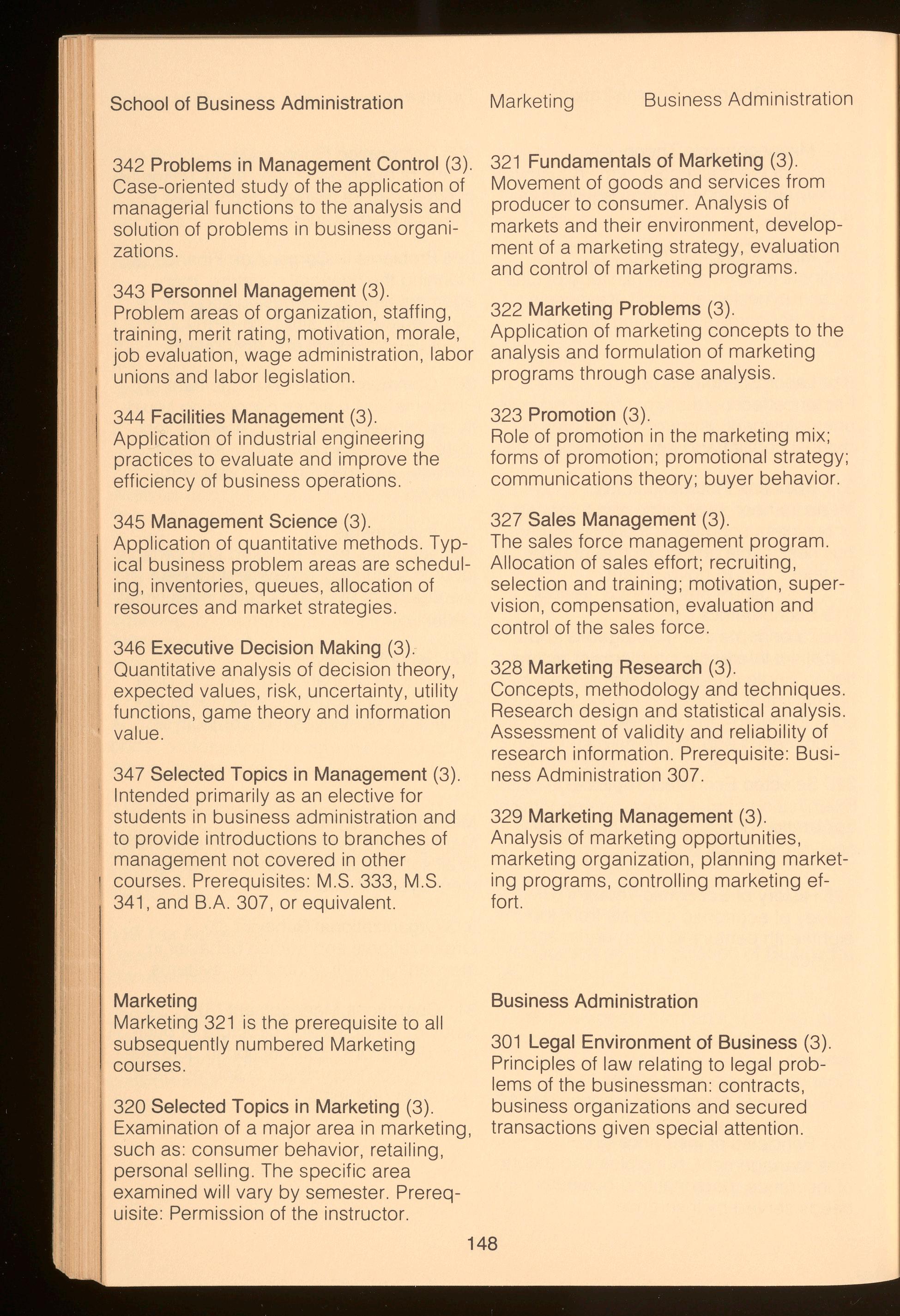
Marketing Marketing 321 is the prerequisite to all subsequently numbered Marketing courses.
320 Selected Topics in Marketing (3). Examination of a major area in marketing, such as: consumer behavior, retailing, personal selling. The specific area examined will vary by semester. Prerequisite: Permission of the instructor.
BusinessAdministration
301 Legal Environmentof Business (3). Principles of law relating to legal problems of the businessman: contracts, business organizations and secured transactions given special attention.
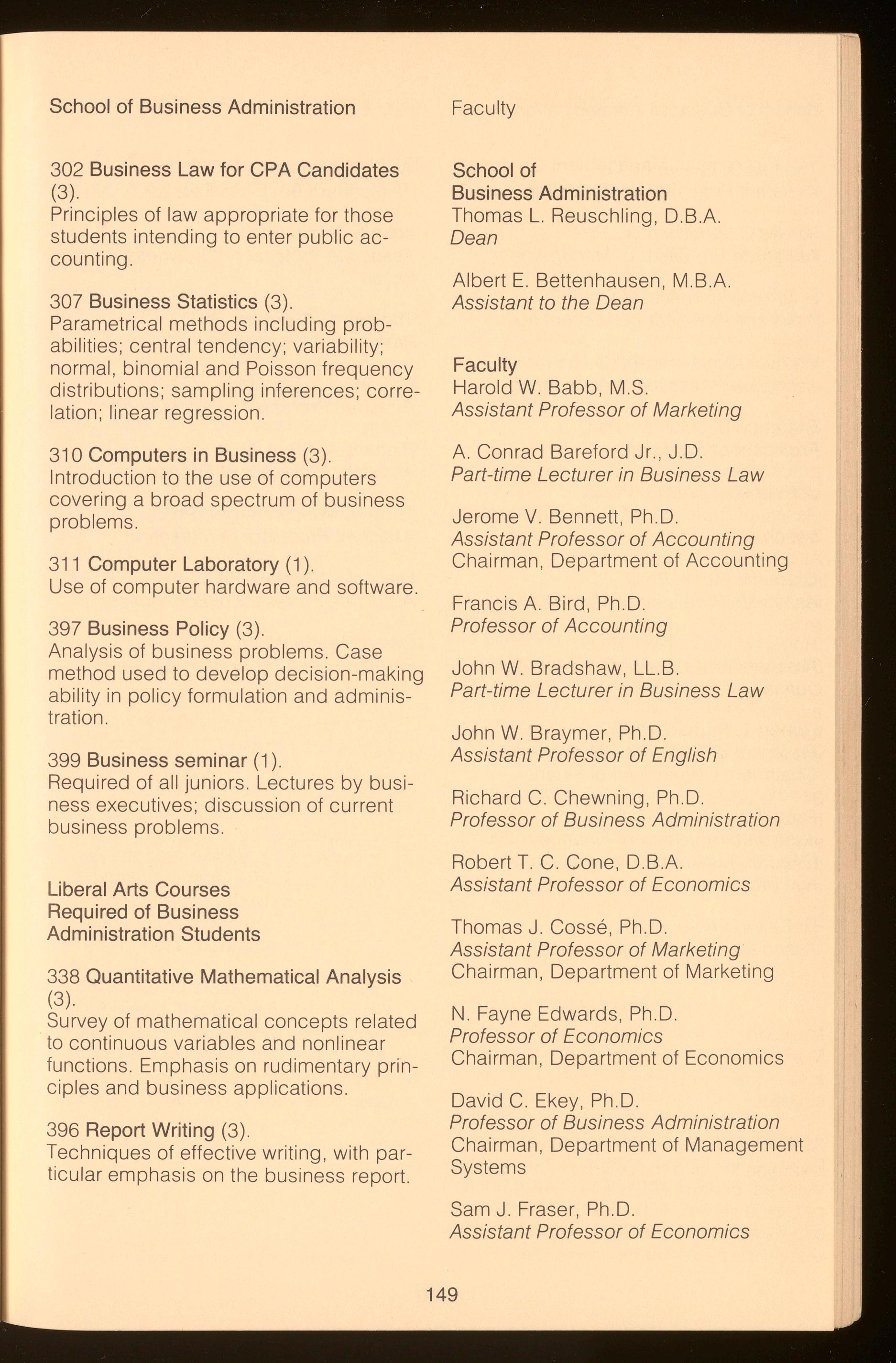
School of Business Administration
302 Business Law for CPA Candidates (3).
Principles of law appropriate for those students intending to enter public accounting.
307 Business Statistics (3).
Parametrical methods including probabilities; central tendency; variability ; normal , binomial and Poisson frequency distributions; sampling inferences; correlation ; linear regression
310 Computers in Business (3).
Introduction to the use of computers covering a broad spectrum of business problems.
311 Computer Laboratory (1 ). Use of computer hardware and software.
397 Business Policy (3).
Analysis of business problems. Case method used to develop decision-making ability in policy formulation and administration.
399 Businessseminar (1 ).
Required of all juniors. Lectures by business executives ; discussion of current business problems.
Liberal Arts Courses Required of Business AdministrationStudents
338 Quantitative Mathematical Analysis (3).
Survey of mathematical concepts related to continuous variables and nonlinear functions. Emphasis on rudimentary princ iples and business applications.
396 Report Writing (3).
Techniques of effective writing, with particular emphasis on the business report.
Faculty
School of BusinessAdministration
Thomas L. Reuschling, D.B.A. Dean
Albert E. Bettenhausen , M.B.A. Assistant to the Dean
Faculty
Harold W. Babb, M.S. Assistant Professor of Marketing
A. Conrad Bareford Jr ., J.D . Part-time Lecturer in Business Law
Jerome V Bennett, Ph.D. Assistant Professor of Accounting Chairman, Department of Accounting
Francis A. Bird , Ph.D Professor of Accounting
John W. Bradshaw, LL.B. Part-time Lecturer in Business Law
John W. Braymer , Ph.D. Assistant Professor of English
Richard C. Chewning , Ph.D. Professor of Business Administration
Robert T. C. Cone , D.B.A. Assistant Professor of Economics
Thomas J. Cosse, Ph.D. Assistant Professor of Marketing Chairman, Department of Marketing
N. Fayne Edwards , Ph.D. Professor of Economics Chairman, Department of Economics
David C. Ekey, Ph.D. Professor of Business Administration Chairman, Department of Management Systems
Sam J. Fraser , Ph.D. Assistant Professor of Economics
School of BusinessAdministration
Thomas D. Giese, Ph.D.
Assistant Professor of Marketing
James C. Goodwin Jr., Ph D
Associate Professor of Management
H. Wayne Hudgins, M .C. Assistant Professor of Accounting
Phillip A. Jones Sr., Ph.D. 1 Associate Professor of Accounting
Clarence R. Jung Jr., Ph.D. Professor of Economics
J . Kenneth Matejka, Ph.D. Assistant Professor of Business Administration
Clarence Monk, Ph.D. Associate Professor of Mathematics
Robert H. Nicholson, Ph D. Assistant Professor of Business Adminis1 tration
Robert T. Partain , Ph.D. Professor of Business Administration Chairman, Department of Finance
Robert W. Phillips, D.B.A. Associate Professor of Finance Director, Master of Business Administration Program
R. Clifton Poole, Ph.D. Associate Professor of Finance
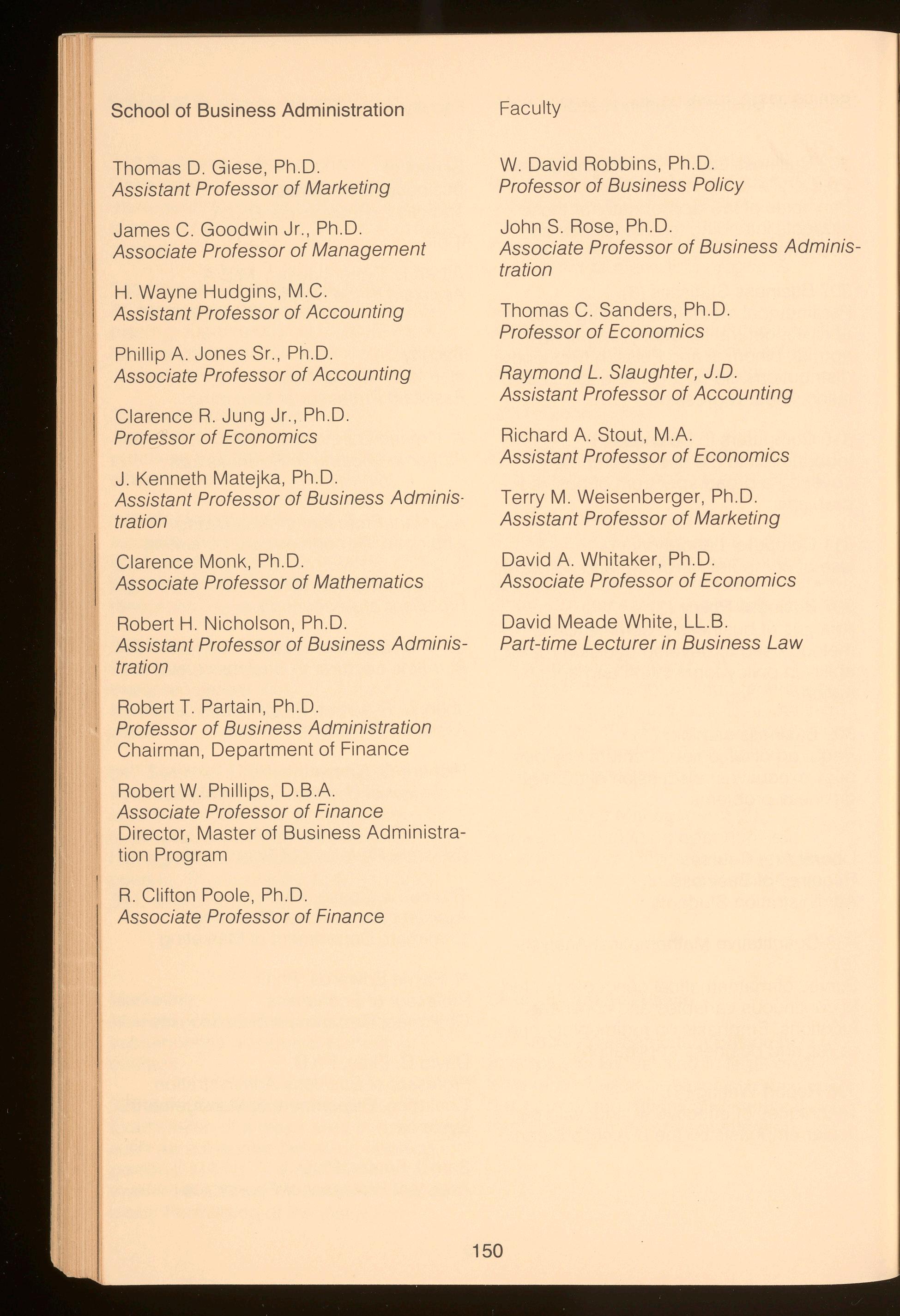
Faculty
W. David Robbins, Ph.D. Professor of Business Policy
John S. Rose, Ph.D. Associate Professor of Business Administration
Thomas C. Sanders , Ph.D. Professor of Economics
Raymond L. Slaughter, JD. Assistant Professor of Accounting
Richard A. Stout, M.A. Assistant Professor of Economics
Terry M. Weisenberger , Ph.D Assistant Professor of Marketing
David A. Whitaker, Ph.D. Associate Professor of Economics
David Meade White, LL.B. Part-time Lecturer in Business Law
Admissions,Expensesand FinancialAid
Admissions
Although requirements for the liberal arts and sciences divisions-Richmond College and Westhampton College-are the same, there are totally different requirements for admission to the School of Business Administration, since an applicant must have completed the equivalent of two years of college work *
The policy governing admission to all colleges and schools of the University of Richmond provides equal educational opportunity to qualified applicants without regard to sex, religion, race, color, age or ethnic or national origin.
AdmissionRequirements
Those seeking admission to Richmond College or Westhampton College must have completed 16 units of high school work, including four in English, three in college-preparatory mathematics, one in history, and one in laboratory science. Two years in one foreign language are strongly recommended. An applicant should have the high school guidance counselor send an official transcript of work completed, courses in progress, and the school's recommendation.
All applicants must take the Scholastic Aptitude Tests, the English Achievement Test and the Mathematics Test (Level I or 11) . A third achievement test is required. These tests must be taken no later than December or January of the senior year .
Applicants are encouraged to take the third achievement test in a foreign language because it aids the language departments in determining placement and proficiency. It is recommended that the language achievement test be taken at the conclusion of the applicant's last year of language study.
The applicant should ask the College Entrance Examination Board to send the results of all of these tests directly to the appropriate College
Deadline
The deadline for regular admission is February 15. Applicants are notified of the Admissions Committee's decision around April 1. Application should be made in the early part of the first semester of the senior year.
An interview is not required; however, it is to the applicant's advantage to visit the campus and talk with a member of the Admissions staff. An appointment for an interview should be made in advance with the Admissions Office.
RichmondCollege HonorSystem
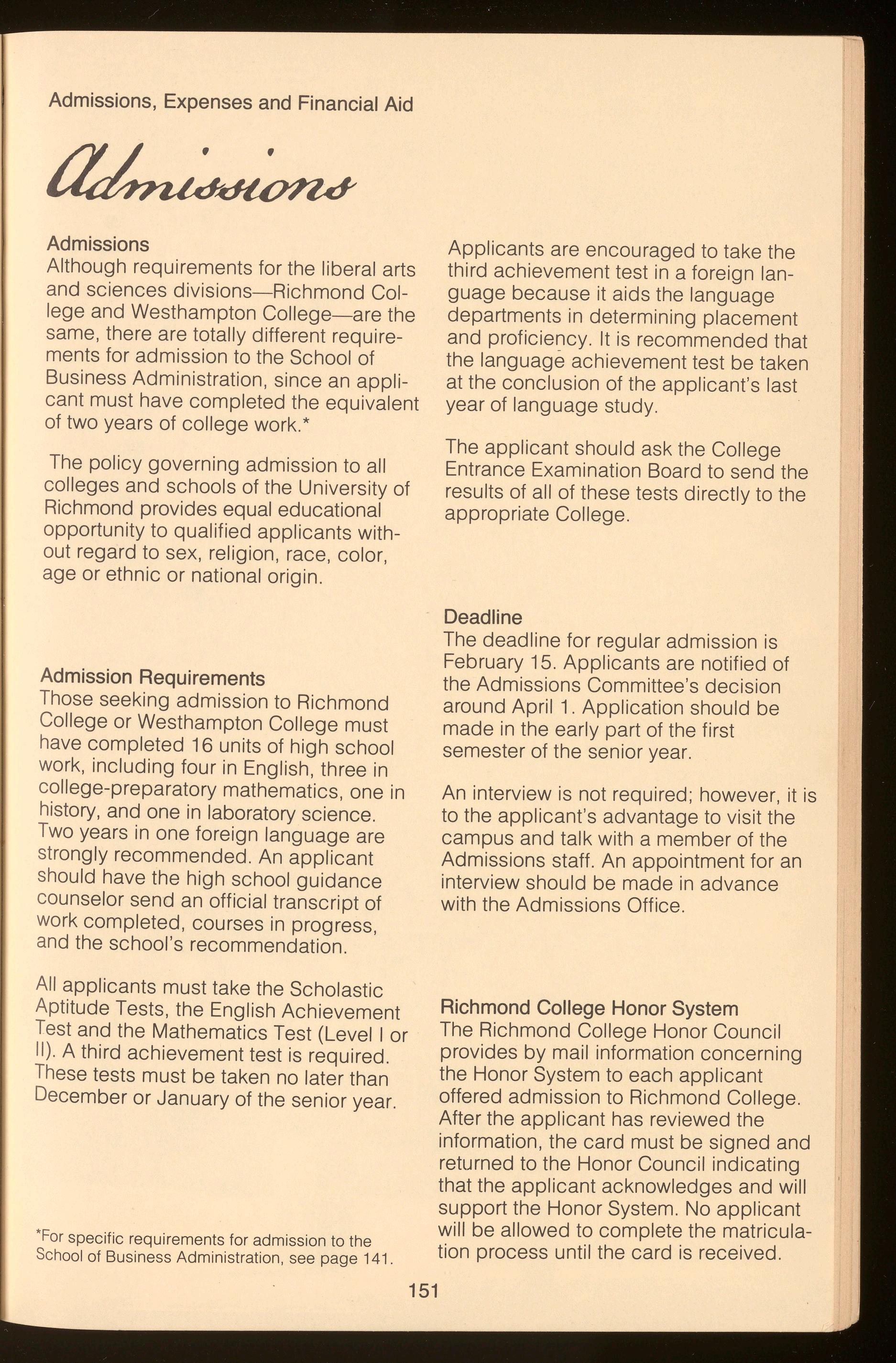
*For specific requirements for admission to the School of Business Administration, see page 141.
The Richmond College Honor Council provides by mail information concerning the Honor System to each applicant offered admission to Richmond College. After the applicant has reviewed the information, the card must be signed and returned to the Honor Council indicating that the applicant acknowledges and will support the Honor System. No applicant will be allowed to complete the matriculation process until the card is received.
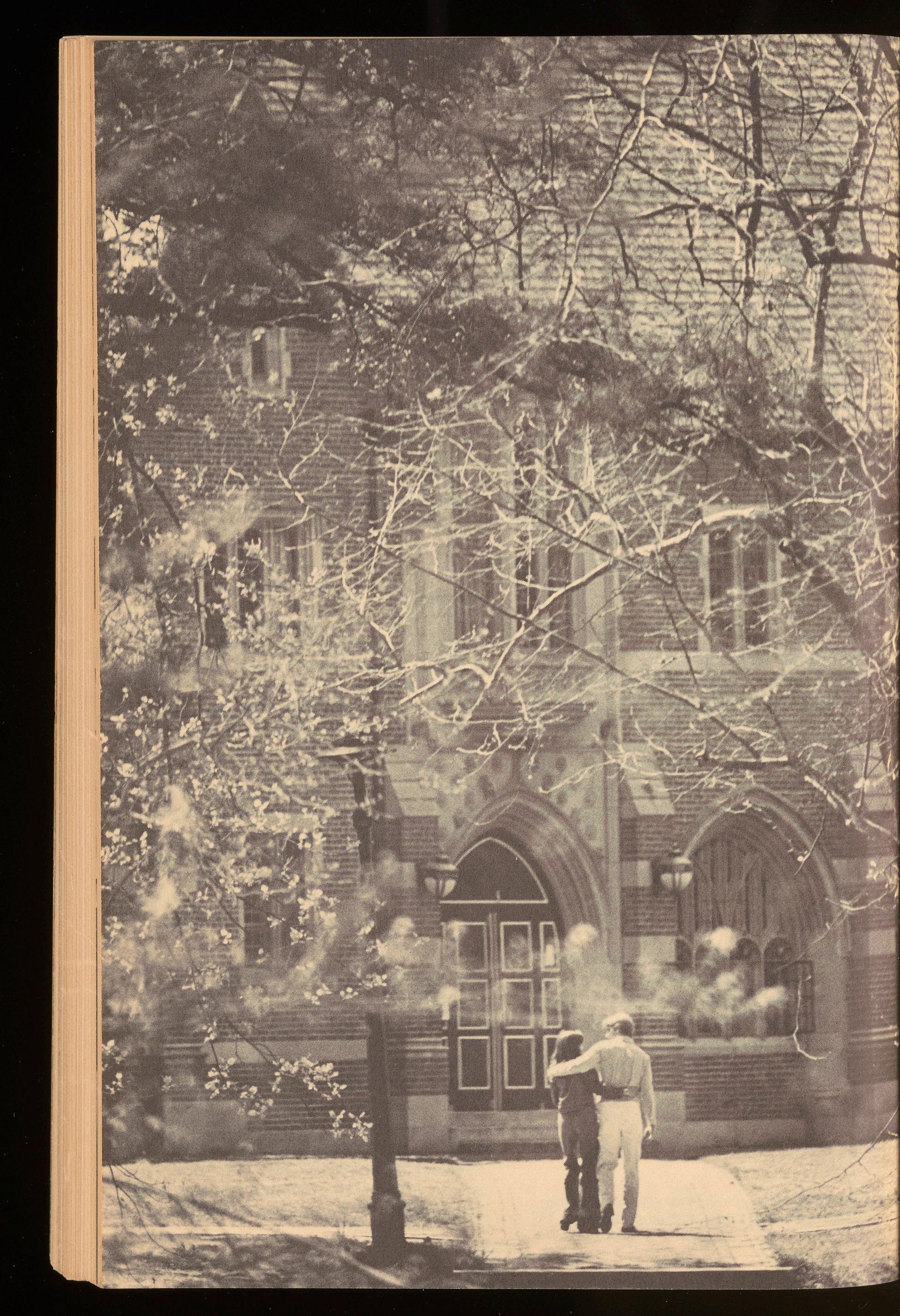

Admissions
Early Decision Plan
UR has an Early Decision Plan for high school seniors. It is designed to secure an early decision by the Admissions Committee on the applications of wellqualified candidates who designate the University of Richmond as their first cho ice. As an Early Decision applicant, submit your application by December 1 along with the transcript of your grades through the end of your junior year and the required SAT scores of the College Entrance Examination Board. The required Achievement Tests may be deferred until December or January of the senior year. Accepted candidates will be notified by December 15 and are obligated to submit deposits confirming intent to enroll. Generally speaking, realistic candidates rank in the top one-fourth of their high school class and present a combined SAT score of at least 1000 . More specific information may be obtained from the Admissions Office.
EarlyAdmission
A program of Early Admission may admit the exceptional student following three years in high school. This program is limited to students who complete the college entrance requirements in three years and who demonstrate unusually strong preparation for college by their high school record and College Entrance Examination Board test scores. Students interested in this program should write the Director of Admissions for further information. Early Admission applicants are required to have an interview with a member of the Admissions staff.
Transfer Students
A student who wishes to transfer from some other college or university to Richmond College or Westhampton College may receive credit for work completed there, subject to the following conditions:
1 . A student must have sent official certificates showing (a) high school credits, (b) college record , and (c) honorable dismissal to continue in good standing.
2. A student must complete at least two full sessions (60 semester hours) at Richmond College or Westhampton College , including the work of the senior year, before receiving the degree. The total number of grade points must be at least twice the total number of semester hours for academic work attempted in Richmond College or Westhampton College.
3. The student must satisfy the entrance requirements, using college credit if necessary.
4. Credit is allowed only for work equivalent to courses offered in Richmond College or Westhamptom College. Credit is not granted for courses taken in another college in which the student earned a grade below the equivalent of C.
5. A student transferring from another institution must have obtained a C average on all academic work attempted; however, this average does not guarantee acceptance.
6. Credit for all courses is regarded as provisional at the time of the applicant's admission, and will not be considered final until the satisfactory completion of one semester's work in Richmond College or Westhamptom College.

Admissions
Advanced Credit for Veterans
In accordance with the recommendations of the American Council on Education , the following advanced credit will be allowed veterans:
1. The veteran who has served at least six months on active duty , but less than one year , shall receive credit for two hours in military science and one hour for physical education, 130-150 sequence.
2. The veteran who has served one year on active duty shall receive credit for two hours of 100-level coursework in physical education and two hours in military science.
3. The veteran who has served more than one year on active duty shall receive credit for two hours of 100-level and two hours of 200-level coursework in physical education and four hours in military science.
4. A veteran may secure additional credit for specialized training courses and for correspondence courses taken from standard colleges under the auspices of the U.S. Armed Forces Institute. A veteran desiring such credit should present his record either on the transcript form of the college in which the work was taken or on the form prepared for such purposes by the U S. Armed Forces Institute. The Academic Council will determine the amount of credit to be granted in each case.
5. In allowing further advanced credit for educational experience in the armed services, the Academic Council will be guided largely by the recommendations of the American Council on Education.
Credit by Examination
The maximum credit toward a degree which may be earned through examination is 30 semester hours.
Advanced Placement
Richmond College and Westhampton College participate in the Advanced Placement Program of the College Entrance Examination Board. Successful candidates for admission who have taken Advanced Placement Tests may have the test results evaluated for college credit. A student who receives a score of four or five on an Advanced Placement Test recognized by the University of Richmond academic department concerned will automatically receive academic hours of credit which are applied as appropriate to curriculum requirements. Similarly, credit will be given for a score of three in all recognized examinations except Chemistry, English, History and Modern Foreign Languages; these departments may grant credit and / or certain exemptions after a review of the examination paper. Information on the current University policies relating to the Advanced Placement Program is available from the University Registrar.
CLEP
Richmond College and Westhampton College award credit based on acceptable performance in College-Level Examination Program (CLEP) tests recognized by the University of Richmond academic department concerned. Generally a student may not attempt credit by examination for a course in which a failing grade was received or for a basic course in those areas in which acceptable college credit has been earned at a more advanced level.
Admissions

Arrangements to take CLEP tests may be made with the Center for Psychologic al Services Information on current Univ ersity policies relating to CLEP should be obtained from the University Registrar.
Credit by Local Examination
Information on courses for which credit b y local examination may be earned is available in the Registrar's Office. Students should check there for examination dates , fees and related regulations .
Standards of Conduct*
The Trustees of the University of Richmond have approved and published a revised Policy Statement on Standards of Conduct, Penalties and Disciplinary Procedures governing students, faculty , administrators , staff members and all other persons whether or not their presence is authorized on the campus of the University of Richmond or at Universitysponsored activities and functions. Any person who violates the standards of conduct and regulations of the University of Richmond shall be subject to disciplinary action and, if necessary , legal action. Disciplinary action may range from reprimand to dismissal or expulsion from the University. Penalties will be imposed after proper determination has been made in accordance with established disciplinary procedures of the University, with fair procedures observed and with appropriate appeal procedures available, as outlined in the Policy Statement and any approved revisions thereof.
*Atte ntion is directed (a) to separately published student handbooks covering the Honor System and ot her regulations , and (b) to other University polic ies, regulations and procedures covering academic performance and standing, motor vehicles, drugs and alcoholic beverages.
Standards of Conduct
Right to Privacy
The University of Richmond has an affirmative obligation to provide order and discipline and thereby promote an environment consistent with the educational process . In fulfilling that obligation , the University subscribes to the principle of providing every member of the University community with the maximum practicable degree of privacy . Any entry of living quarters, offices, lockers or examination of possessions on campus shall be in accordance with the law.
Drugs
The Policy Statement on Standards of Conduct, Penalties and Disciplinary Procedures states that the possession, distribution, sale or use of illegal drugs or narcotics , including marijuana and the hallucinogens , is prohibited. Any person who violates the rule prohibiting illegal drugs will be subject to disciplinary action and is liable to separation or expulsion from the University Students are held responsible for the conduct of their guests.
AlcoholicBeverages
The University of Richmond believes that the consumption of alcoholic beverages is inconsistent with its educational objectives. Therefore, the University has established guidelines to limit the use and to regulate the consumption of such beverages on campus. Persons who conduct themselves in a disorderly manner, who damage or destroy University property , or who infringe upon the rights of others, will be subject to University disciplinary and / or civil action. Trustees, faculty , staff , students , alumni , alumnae, and members of approved groups are held responsible for the conduct of their guests.
Admissions
Expenses
The expenses for the 1979-80 college year, exclusive of special charges, for Richmond College (RC), the School of Business Administration (SBA), and Westhampton College (WC) are as follows:*
Semester Year
General Fee (12 to 19 hrs. per sem.) $1,705.00 $3,410.00
Residence Halls (double occupancy, per student):

Note : All single rooms will be charged at a rate $150.00 above the double room rate tor that dormitory. All tr ip les and quads will be charged $25.00 per student less than the double room rate tor that dormitory .
19 Meal Plan: Mon thru Fri. 3 meals per day ; Sat. and Sun. Brunch and Dinner
14 Meal Plan Any of the above 19 Meal
10 Meal Plan: Any 10
Note: Information concerning a student accident and sickness insurance policy is available through the University Services Office.
*The University reserves the right to increase the fees listed herein and the charges for room and board, if conditions should make such changes necessary or advisable. The changes will be announced as far in advance as feasible.
tAII single students not residing with their families or in a residence hall will be charged a $30 Medical Fee and will receive the same medical attention and infirmary privileges as residence hall students. Students not regularly eating in the Refectory will be charged for meals while in the infirmary. Services of the University Physician will be available only in the infirmary
Expenses
The above fees are for full-time students taking from 12 to 19 hours inclusive per semester and are payable at the Bursar's Office, one-half on the first Monday in August and one-half on the first Monday in December. Students entering for the second semester pay one-half of the regular charges. Part-time students taking less than 12 hours will pay at the rate of $153 .00 per semester hour. An additional charge of $153.00 will be made for each hour in excess of 19 hours carried in any semester.
Meal Plans
The University offers three meal plans to students. Participation in one of the meal plans is required for residence hall students.
Selection of Meal Plan-When
you select a room during the Random Room Selection Process, you must also select the meal plan in which you wish to participate for the year If a selection is not made, the full 19-meal board plan will be billed. The plan which is billed must be paid in full. During the two week Drop / Add period each term, students eligible to participate in optional meal plans will be allowed one change to their original selection. All adjustments in the cost of the board plan selected will be done at the time of the change and a refund check will be requested for any overpayment resulting from the change in plan. Payment of any increase in cost resulting from a change in meal plans will be due at the time of the change. The ID / Meal Card is nontransferable. If the ID / Meal Card is lost, there is a replacement charge of $7.50.
Admissions
Plan Type
A. 19-Meal Plan-All Freshmen and Sophomore students residing in the residence halls are required to participate in this plan. This meal plan is also optional for Juniors, Seniors, Law and Graduate students Meal service for this plan includes three meals per day Monday through Friday : Saturday and Sunday service will be brunch and dinner.
Cost per semester
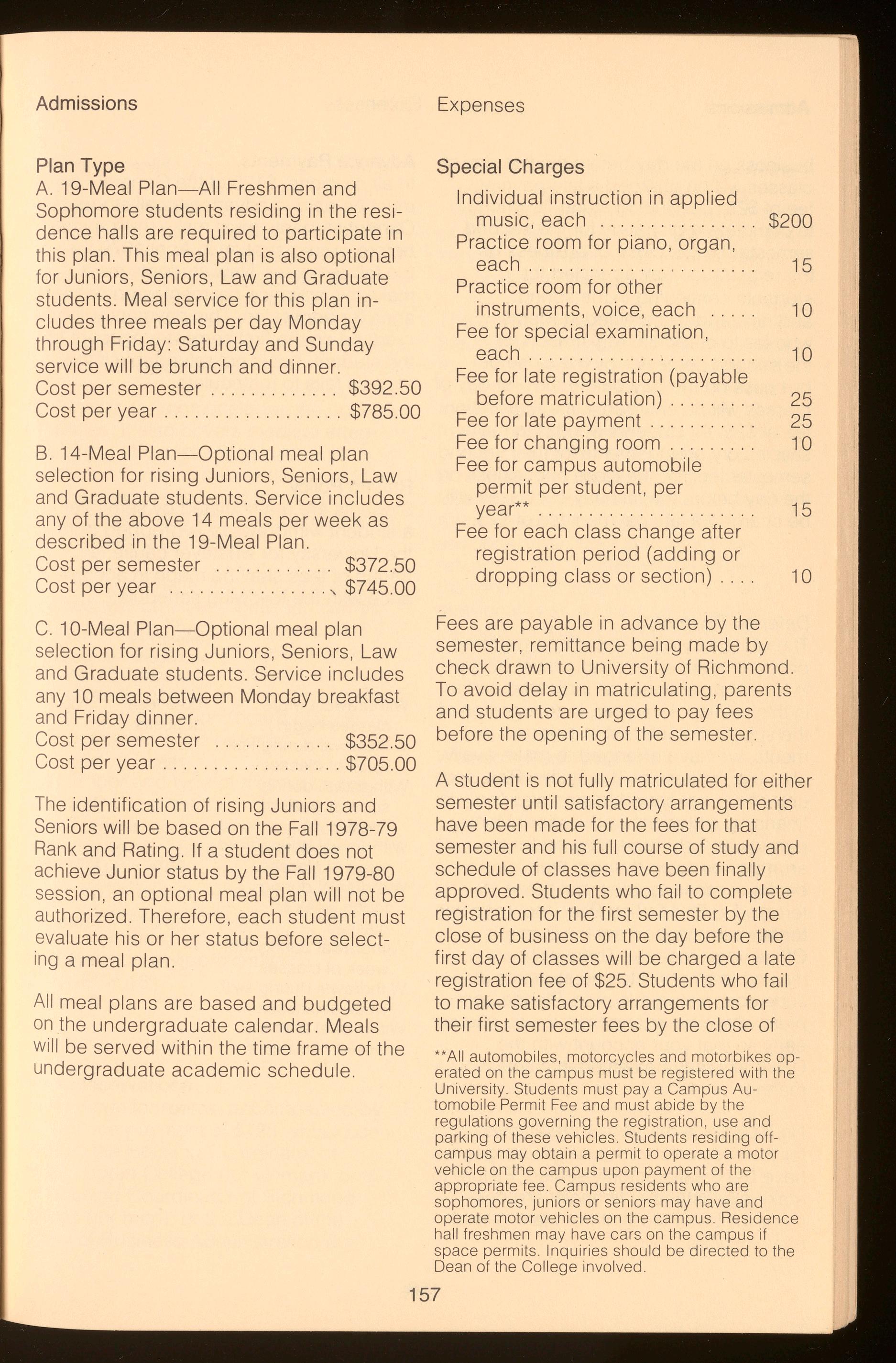
$392.50
Cost per year .. .. $785.00
B. 14-Meal Plan-Optional meal plan selectio n for rising Juniors, Seniors, Law and Graduate students. Service includes any of the above 14 meals per week as described in the 19-Meal Plan.
Cost per semester . . $372.50
Cost per year ..... ......... , $745.00
C. 10-Meal Plan-Optional meal plan selection for rising Juniors, Seniors, Law and Graduate students. Service includes any 10 meals between Monday breakfast and Friday dinner.
Cost per semester . . . . . . . . . .
Cost per year
$352.50
$705.00
The identification of rising Juniors and Seniors will be based on the Fall 1978-79 Rank and Rating. If a student does not achieve Junior status by the Fall 1979-80 session, an optional meal plan will not be authorized. Therefore, each student must evaluate his or her status before selecting a meal plan.
All meal plans are based and budgeted on the undergraduate calendar. Meals will be served within the time frame of the undergraduate academic schedule.
Expenses
Special Charges
Individual instruction in applied music, each . . . . .......... $200 Practice room for piano, organ, each . . . . . . .
15
Practice room for other instruments, voice, each 1O
Fee for special examination, each...... 10
Fee for late registration (payable before matriculation) 25
Fee for late payment . . 25
Fee for changing room . . . . . 1O
Fee for campus automobile permit per student, per year** . . 15
Fee for each class change after registration period (adding or dropping class or section) 1O
Fees are payable in advance by the semester, remittance being made by check drawn to University of Richmond . To avoid delay in matriculating, parents and students are urged to pay fees before the opening of the semester.
A student is not fully matriculated for either semester until satisfactory arrangements have been made for the fees for that semester and his full course of study and schedule of classes have been finally approved. Students who fail to complete registration for the first semester by the close of business on the day before the first day of classes will be charged a late registration fee of $25. Students who fail to make satisfactory arrangements for their first semester fees by the close of
**All automobiles, motorcycles and motorbikes operated on the campus must be registered with the University. Students must pay a Campus Automobile Permit Fee and must abide by the regulations governing the registration, use and parking of these vehicles. Students residing offcampus may obtain a permit to operate a motor vehicle on the campus upon payment of the appropriate fee. Campus residents who are sophomores, juniors or seniors may have and opera te motor vehic les on the campus. Residence hall freshmen may have cars on the campus if space permits. Inquiries should be directed to the Dean of the College involved.
business on the day before the first day of classes will be charged a late payment fee of $25. Continuing students who fail to complete registration for the second semester by the close of business on the registration day specified for students continuing in the spring, and new and re-admitted students who fail to complete registration for the second semester by the close of business on the day before the first day of classes will be charged a late registration fee of $25. All students who fail to make satisfactory arrangements for their second semester fees by the close of business on the day before the first day of classes will be charged a late payment fee of $25
Deferred Payments
The University does not offer a deferred payment plan; all accounts must be paid in full each semester as indicated earlier in this section . However , in recognition of the substantial interest in deferred payments, we have arranged to make available the services of The Tuition Plan, Inc , one of several sound alternatives for financing a student's education . Many parents and students may prefer to arrange financing through their local banks or other sources , but those interested in The Tuition Plan, Inc. may get further information from the Bursar 's Office upon request. There will be a mailing to all parents and students in June concerning this plan. Please complete whatever arrangements you choose early so that your account with the University may be settled in a timely manner.
No diploma is granted or credit given for the session 's work until all charges have been satisfactorily settled. Failure to make a satisfactory financial arrangement will bar a student from taking final examinations.
Advance Payments
In all divisions, $125 of the General Fee must be paid in advance by all students. Current students must make this payment before preregistration in April 1979 for the fall semester. New students must make this advance payment upon acceptance for admission. This payment will be credited on the first semester account of the student , but is not refundable if the student fails to matriculate.
Refund Policy
Students are matriculated by semester . If a student withdraws or is dropped from the University for whatever cause, a refund of fees shall be made in accordance with the following schedule:

Withdrawal before classes begin .
Withdrawal during first week of clas s es .
Withdrawal during s econd week of classes
Withdrawal during third week of cla s ses .
Withdrawal during fourth week of classes
Withdrawal during tilth week of classes .
Withdrawal during sixth week of clas s es
Withdrawal after six weeks of classes .
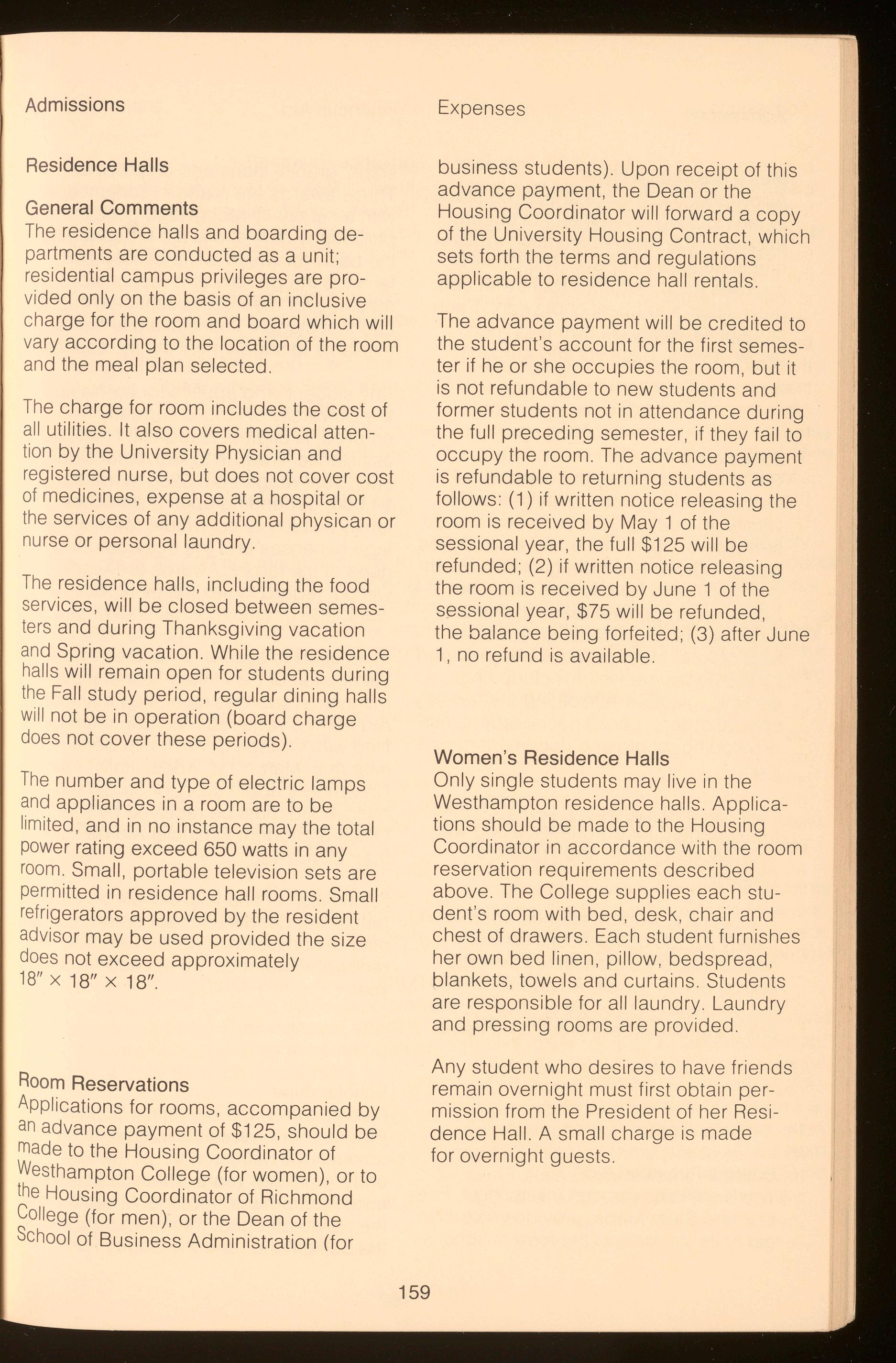
Admissions
ResidenceHalls
General Comments
The residence halls and boarding departmen ts are conducted as a unit; residential campus privileges are provided only on the basis of an inclusive charge for the room and board which will vary according to the location of the room and the meal plan selected.
The charge for room includes the cost of all utilities. It also covers medical attention by the University Physician and registered nurse, but does not cover cost of medicines, expense at a hospital or the services of any additional physican or nurse or personal laundry.
The residence halls, including the food services, will be closed between semesters and during Thanksgiving vacation and Spring vacation. While the residence halls will remain open for students during the Fall study period, regular dining halls will not be in operation (board charge does not cover these periods).
The number and type of electric lamps and appliances in a room are to be limited, and in no instance may the total power rating exceed 650 watts in any room. Small, portable television sets are permitted in residence hall rooms. Small refrigerators approved by the resident advisor may be used provided the size does not exceed approximately 18" X 18" X 18"
RoomReservations
Applicatio ns for rooms, accompanied by an advance payment of $125, should be made to the Housing Coordinator of Westhampton College (for women), or to the Housing Coordinator of Richmond College (for men), or the Dean of the School of Business Administration (for
Expenses
business students) Upon receipt of this advance payment, the Dean or the Housing Coordinator will forward a copy of the Unive rsity Housing Contract, which sets forth the terms and regulations applicable to residence hall rentals.
The advance payment will be credited to the student's account for the first semester if he or she occupies the room, but it is not refundable to new students and former students not in attendance during the full preceding semester, if they fail to occupy the room. The advance payment is refundable to returning students as follows: (1) if written notice releasing the room is received by May 1 of the sessional year, the full $125 will be refunded; (2) if written notice releasing the room is received by June 1 of the sessional year, $75 will be refunded, the balance being forfeited; (3) after June 1, no refund is available.
Women's Residence Halls
Only single students may live in the Westhampton residence halls. Applications should be made to the Housing Coordinator in accordance with the room reservation requirements described above. The College supp lies each student's room with bed, desk, chair and chest of drawers. Each student furnishes her own bed linen, pillow, bedspread, blankets, towels and curtains. Students are responsible for all laundry. Laundry and pressing rooms are provided.
Any student who desires to have friends remain overnight must first obtain permission from the President of her Residence Hall. A sma ll charge is made for overnight guests.
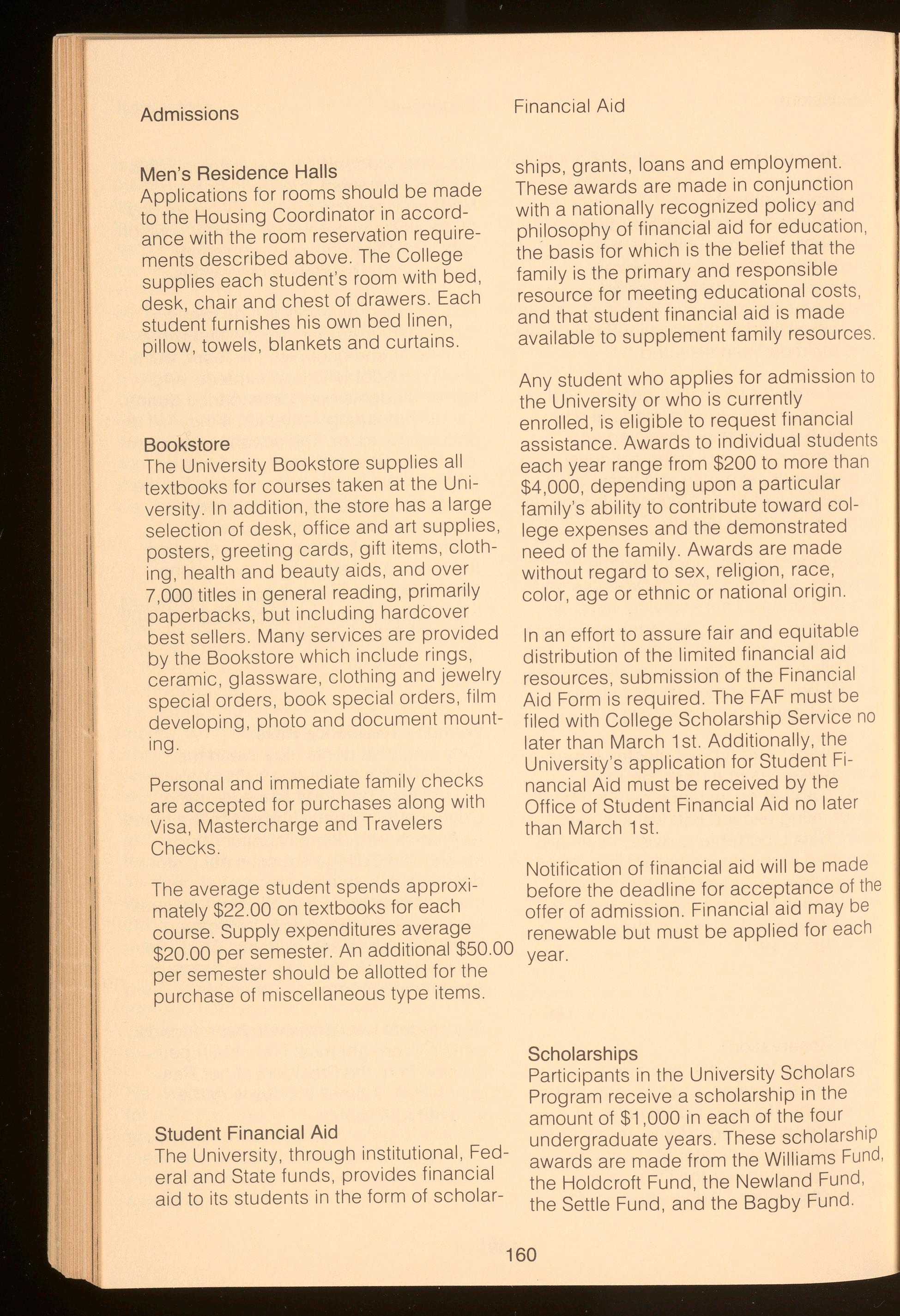
Admissions
Men's Residence Halls
Applications for rooms should be made to the Housing Coordinator in accordance with the room reservation requirements described above. The College supplies each student's room with bed, desk, chair and chest of drawers. Each student furnishes his own bed linen, pillow, towels, blankets and curtains.
Bookstore
The University Bookstore supplies all textbooks for courses taken at the University. In addition, the store has a large selection of desk, office and art supplies, posters, greeting cards, gift items , clothing, health and beauty aids, and over 7,000 titles in general reading, primarily paperbacks, but including hardcover best sellers. Many services are provided by the Bookstore which include rings, ceramic, glassware, clothing and jewelry special orders, book special orders, film developing, photo and document mounting
Personal and immediate family checks are accepted for purchases along with Visa, Mastercharge and Travelers Checks.
The average student spends approximately $22.00 on textbooks for each course. Supply expenditures average $20.00 per semester. An additional $50.00 per semester should be allotted for the purchase of miscellaneous type items.
Student Financial Aid
The University , through institutional, Federal and State funds, provides financial aid to its students in the form of scholar-
Financial Aid
ships, grants, loans and employment. These awards are made in conjunction with a nationally recognized policy and philosophy of financial aid for education, the basis for which is the belief that the family is the primary and responsible resource for meeting educational costs , and that student financial aid is made available to supplement family resour ces.
Any student who applies for admission to the University or who is currently enrolled, is eligible to request financial assistance. Awards to individual students each year range from $200 to more than $4,000, depending upon a particular family 's ability to contribute toward college expenses and the demonstrated need of the family. Awards are made without regard to sex, religion, race, color, age or ethnic or national origin.
In an effort to assure fair and equitable distribution of the limited financial aid resources , submission of the Financial Aid Form is required. The FAF must be filed with College Scholarship Service no later than March 1st. Additionally , the University 's application for Student Financial Aid must be received by the Office of Student Financial Aid no later than March 1st.
Notification of financial aid will be made before the deadline for acceptance of the offer of admission. Financial aid may be renewable but must be applied for each year.
Scholarships
Participants in the University Scholars Program receive a scholarship in the amount of $1,000 in each of the four undergraduate years. These scholarship awards are made from the Williams Fund, the Holdcraft Fund , the Newland Fund, the Settle Fund, and the Bagby Fund.
Admissions
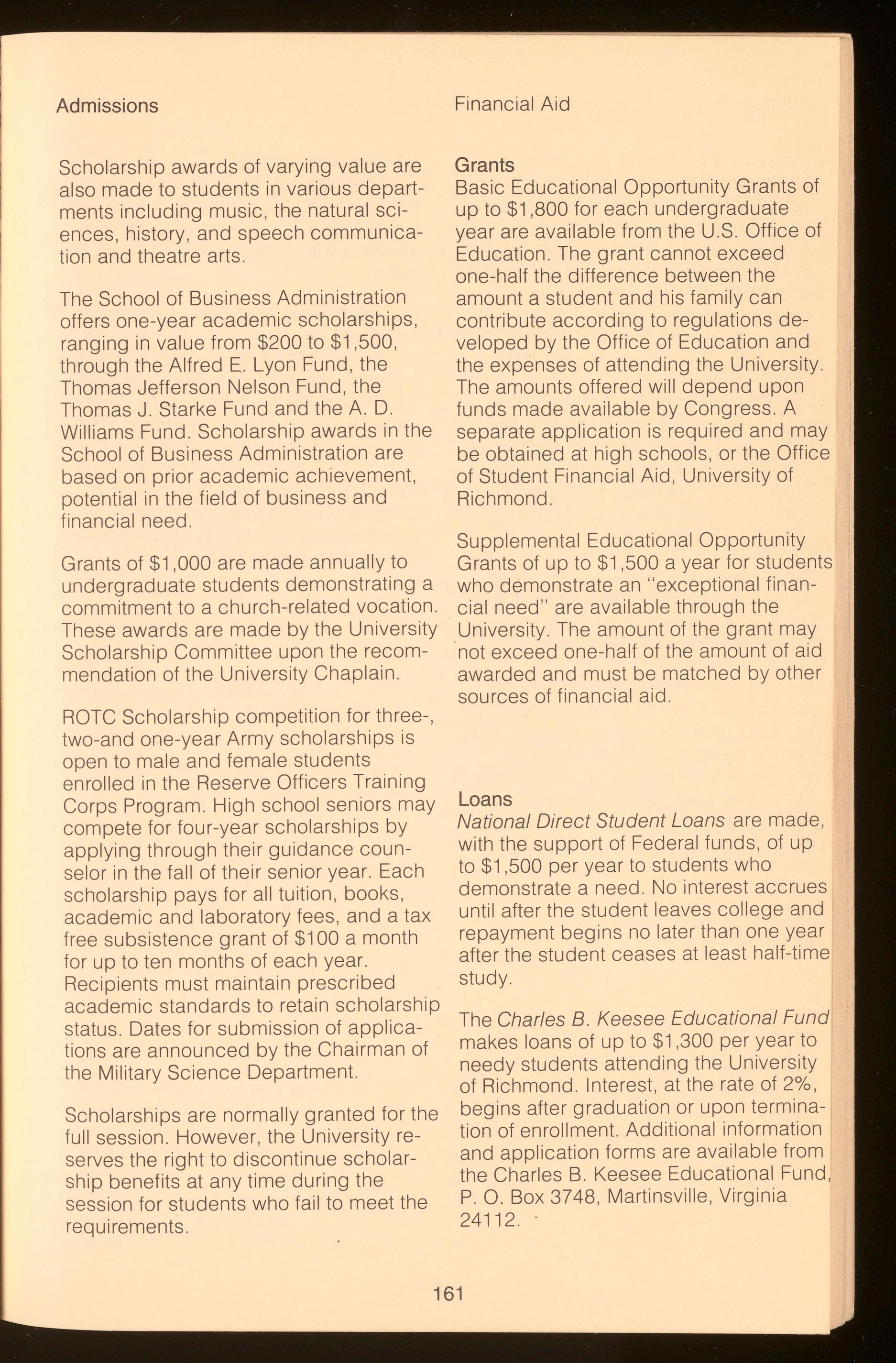
Scholarship awards of varying value are also made to students in various departments including music, the natural sciences, history, and speech communication and theatre arts.
The School of Business Administration offers one-year academic scholarships, ranging in value from $200 to $1,500, through the Alfred E Lyon Fund, the Thomas Jefferson Nelson Fund, the Thomas J. Starke Fund and the A. D. Williams Fund. Scholarship awards in the School of Business Administration are based on prior academic achievement, potential in the field of business and financial need.
Grants of $1,000 are made annually to undergraduate students demonstrating a commitment to a church-related vocation. These awards are made by the University Scholarship Committee upon the recommendation of the University Chaplain.
ROTC Scholarship competition for three-, two-and one-year Army scholarships is open to male and female students enrolled in the Reserve Officers Training Corps Program. High school seniors may compete for four-year scholarships by applying through their guidance counselor in the fall of their senior year. Each scholarship pays for all tuition, books, academic and laboratory fees, and a tax free subsistence grant of $100 a month for up to ten months of each year. Recipients must maintain prescribed academic standards to retain scholarship status. Dates for submission of applications are announced by the Chairman of the Military Science Department.
Scholarships are normally granted for the full session. However, the University reserves the right to discontinue scholarship benefits at any time during the session for students who fail to meet the requirements.
Financial Aid
Grants
Basic Educational Opportunity Grants of up to $1,800 for each undergraduate year are available from the U.S. Office of Education. The grant cannot exceed one-half the difference between the amount a student and his family can contribute according to regulations developed by the Office of Education and the expenses of attending the University. The amounts offered will depend upon funds made available by Congress. A separate application is required and may be obtained at high schools, or the Office of Student Financial Aid, University of Richmond.
Supplemental Educational Opportunity Grants of up to $1,500 a year for students who demonstrate an "exceptional financial need" are available through the University. The amount of the grant may not exceed one-half of the amount of aid awarded and must be matched by other sources of financial aid.
Loans
National Direct Student Loans are made, with the support of Federal funds, of up to $1,500 per year to students who demonstrate a need. No interest accrues until after the student leaves college and repayment begins no later than one year after the student ceases at least half-time study.
The Charles B. Keesee Educational Fund makes loans of up to $1,300 per year to needy students attending the University of Richmond. Interest, at the rate of 2%, begins after graduation or upon termination of enrollment. Additional information and application forms are available from the Charles B. Keesee Educational Fund, P. 0. Box 3748, Martinsville, Virginia 24112.
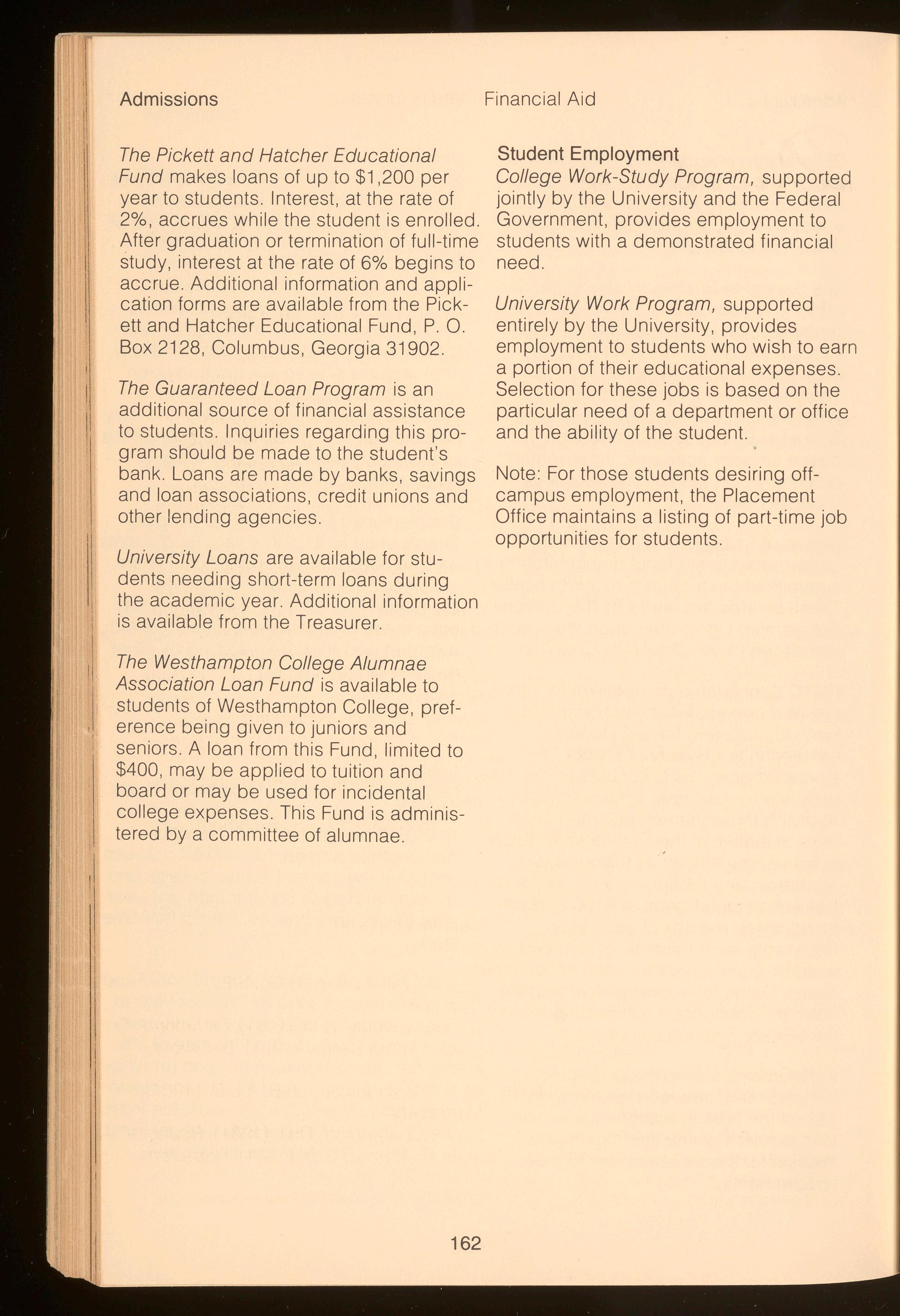
Admissions
The Pickett and Hatcher Educational Fund makes loans of up to $1,200 per year to students. Interest , at the rate of 2%, accrues while the student is enrolled. After graduation or termination of full-time study, interest at the rate of 6% begins to accrue. Additional information and application forms are available from the Pickett and Hatcher Educational Fund , P. 0. Box 2128, Columbus, Georgia 31902.
The Guaranteed Loan Program is an additional source of financial assistance to students. Inquiries regarding this program should be made to the student's bank. Loans are made by banks, savings and loan associations , credit unions and other lending agencies.
University Loans are available for students needing short-term loans during the academic year Additional information ' is available from the Treasurer.
ii The Westhampton College Alumnae Association Loan Fund is available to students of Westhampton College, preference being given to juniors and senior s . A loan from this Fund , limited to $400, may be applied to tuition and board or may be used for incidental college expenses. This Fund is administered by a committee of alumnae.
Financial Aid
Student Employment College Work-Study Program, supporte d jointly by the University and the Federal Government , provides employment to students with a demonstrated financial need.
University Work Program, supported entirely by the University, provides employment to students who wish to earn a portion of their educational expenses. Selection for these jobs is based on the particular need of a department or office and the ability of the student.
Note: For those students desiring offcampus employment , the Placement Office maintains a listing of part-time job opportunities for students.
Board of Trustees
Officers
F. Carlyle Tiller, D C. S., Rector
E. Claiborne Robins, LL.D., Vice Rector
E. Bruce Hei lman, Ph.D., LL.D., D.Hum., President
Carle E. Davis, LL.B., Secretary
Louis W. Moelchert Jr., Treasurer

Corporate Trustees
Terms Expiring June 30, 1979
Ellen Gwathmey, Walkerton
Robert C. King Sr., Richmond
T. Justin Moore Jr., LL.B., Richmond
W. Dortch Oldham, LL.D., Nashville, Tenn.
R. Clayton Pitts, Ph.D., Portsmouth
Richard S. Reynolds Jr., D.C.S., Richmond
Leroy Smith, M.D., Richmond
Frances A. Stallard, D.Hum , Richmond
William B. Thalhimer Jr:, D.C.S., Richmond
Stephen J. Wright, Ph.D., LL.D., L.H.D., Litt.D., Hampton
Elaine J . Yeatts, Richmond
Terms Expiring June 30, 1980
Raymond F. Allen, D.D., Blacksburg
Otis L. Brown, Richmond
Martha A. Carpenter, M.D., Charlottesville
William V. Daniel, Richmond
William B. Graham, Richmond
Robert D. Kilpatrick, Hartford, Conn.
Warren M. Pace, Richmond
E. Claiborne Robins Jr., Richmond
Board of Trustees
Charles H. Ryland, J.D, LL.D., Warsaw
Clinton Webb, Richmond
Terms Expiring June 30, 1981
Chester L. Brown, D.D., Hampton
Paul W. Duke, Litt.D., Washington, D. C.
Max H. Goodloe, Richmond
Floyd D. Gottwald Jr., Richmond
L. Howard Jenkins Jr., Richmond
Joseph A. Jennings, Richmond
Thomas C Leggett, South Boston
E. Claiborne Robins, LL.D., Richmond
Terms Expiring June 30, 1982
Lewis T. Booker, J.D., LLD., Richmond
Betty Ann Allen Doub, Richmond
Ann Carol Haskell, Barboursville
E. Bruce Heilman, Ph.D., LL.D., D Hum , Richmond
Carl W. Johnson, Richmond
Ken McFarlane Smith, JD., Arlington
Henry F. Stern, Richmond
Luther Joe Thompson, Ph.D., D.D., Richmond
F. Carlyle Tiller, D.C.S., Richmond
Trustees Emeritit
Theodore F. Adams, D.D. (1982), Richmond
Reuben E. Alley, D.D. (1981 ), Richmond
William Hugh Bagby (1981 ), Baltimore, Md.
W R. Broaddus Jr., LL.B., LL.D. (1981), Martinsville
Lynn C. Dickerson, D.D. (1981 ), Roanoke
John H. Garber, D.D. (1981 ), Hampton
tTerms expire June 30 of the year listed.
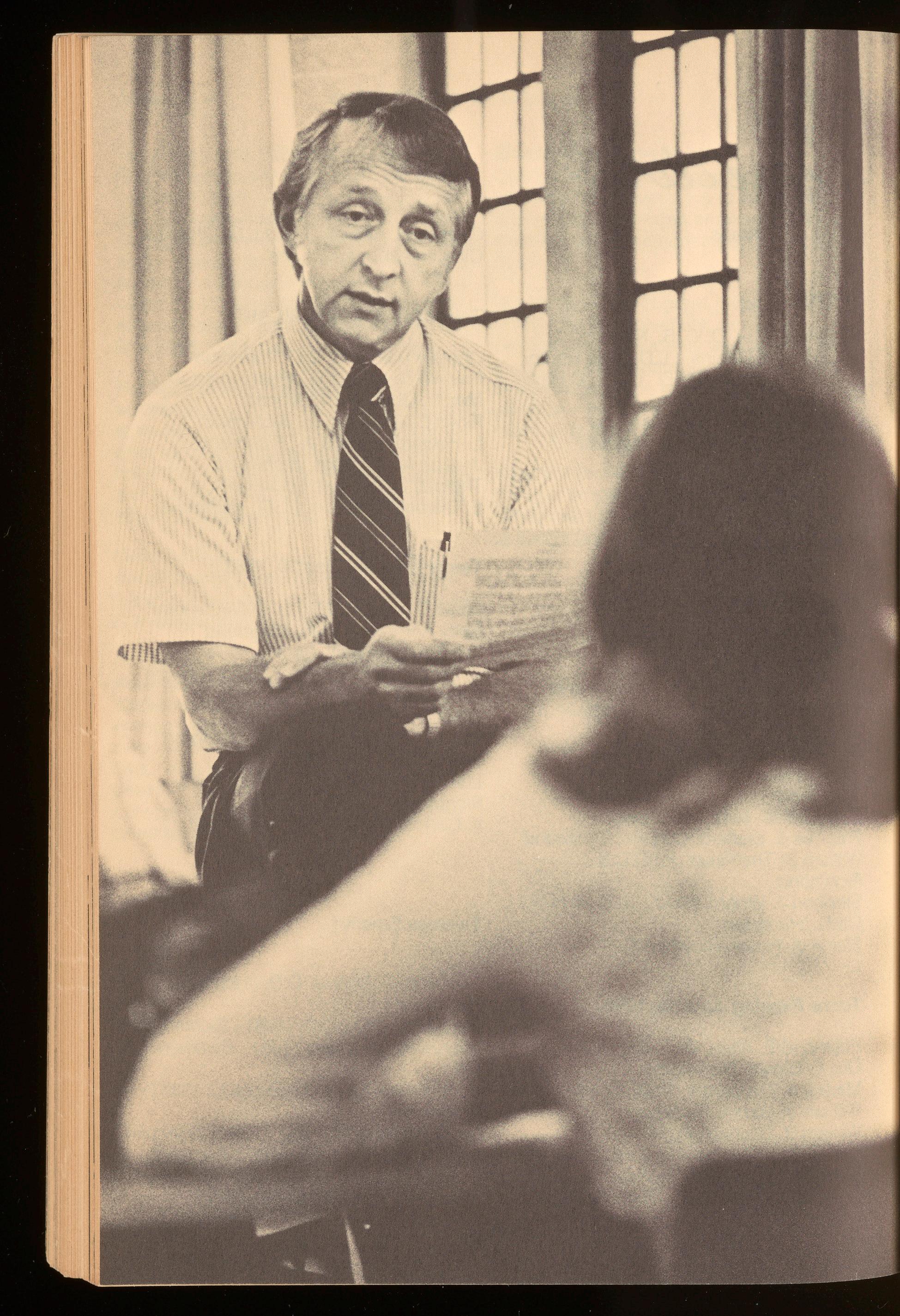
Directory
L. Dudley George (1981 ), Richmond
F. D. Gottwald Sr., D.C.S. (1982), Richmond
W. Tyler Haynes, D.D.S., D.Sc. (1980), Richmond
M. M. Long, J.D., LL.D. (1981 ), St. Paul
Robert T. Marsh Jr., LL.D. (1981 ), Richmond
Edward H. Pruden, Ph.D., D.D. (1980), Richmond
Harold F. Snead, LL.B., LL.D. (1979), Richmond
James T. Tucker, M.D., D.Sc. (1981 ), Richmond
UniversityAdministrativeOfficers
President
E. Bruce Heilman, Ph.D., LL.D., D.Hum.
Vice President for Academic Affairs and Provost
Melvin L. Vulgamore, B.D., Ph.D.
Vice President for Business and Finance and Treasurer
Louis W. Moelchert Jr., M.Acctcy.
Vice President for University Relations
H. Gerald Quigg, B.A.
Vice President for Student Affairs
William H. Leftwich, M.A., Ph.D.
Dean of Administration
Clarence J. Gray, M.A., Ed.D.
Chaplain to the University
David D. Burhans, Th.M. , Th.D.
University Librarian
Dennis E. Robison, M.S, M.A.
University Registrar
Walter van Klein, M.A.
University Administrative Officers
Director of Admissions
Thomas N. Pollard Jr., M.A.
Director of Career Planning and Placement
Joanne C. Patton, M.S.
Director of Student Financial Aid
Allen W. Fredd Jr., B.B.A.
Chancellor
George M. Modlin, Ph.D., LL.D.
Deans of Divisions
Dean of the Faculty of Arts and Sciences
B Gresham Riley, M.A., Ph.D.
Dean of Richmond College
Richard A. Mateer, Ph.D.
Dean of Westhampton College
Stephanie L. M. Bennett, M.A., Ph.D.
Dean of the School of Business Administration
Thomas L. Reuschling, M.B.A., D.B.A.

Active Faculty, 1978-79
The year given designates the year of appointment.
Professors
E. Bruce Heilman, 1971 President
B.S., M.A., Ph.D., Peabody College; LL.D., Wake Forest University; D.Hum., Campbell College

Directory
Melvin L. Vulgamore , 1978
Vice President for Academic Affairs and Provost
B.A. , Ohio Wesleyan University ; B D , Harvard University; Ph.D., Boston University; Postdoctoral Study , University of Oxford , University of Heidelberg , American University , Beirut
Robert S. Alley, 1963
Professor of Humanities
B.A., University of Richmond ; B.D ., Southern Baptist Theological Seminary; M.A., Ph.D., Princeton University
H. Pearce Atkins , 1958
Professor of Mathematics
A.B. , Cornell University ; M.Sc ., Brown University ; Ph.D ., University of Rochester
Francis A . Bird*, 1972
Professor of Accounting, School of Business Administration
B.S., Drexel University ; M S., Ph.D ., The Pennsylvania State University ; C P.A.
Kenneth A. Blick , 1967
Professor of Psychology
B.A., M.A., University of Richmond ; Ph.D. , Tulane University
John C Boggs Jr (1957t) , 1962
Professor of English
A.B ., Duke University ; M.A. , Ph.D. , Columbia University
Ernest C . Bolt Jr. , 1966
Professor of History
B.A. , Furman University; M .A., Ph.D., University of Georgia
tYear of first appointment .
*On sabbatical leave, first semester 1978-79
**On sabbatical leave , second semester 1978-79.
ttOn leave of absence , second semester 1978-79
:j:On leave of absence , session 1978-79.
Faculty
Irby B Brown (1959t), 1966
Professor of English
B.A., University of Richmond ; M.A. , Ph.D , University of Virginia
Addison D. Campbell , 1955
Professor of Physics
B S., Hampden-Sydney College ; M.S., University of Richmond ; Ph.D ., Univer sity of North Carolina
Richard C . Chewning (1958t) , 1963
Professor of Business Administration, School of Business Administration
B.S., in Bus . Adm , Virginia Polytechnic Institute; M .B.A., University of Virginia; Ph.D ., University of Washington
Georgia B. Christopher, 1971
Professor of English
B.A. , Agnes Scott College ; M.A.T ., M.A. , Ph.D. , Yale University
W. Harrison Daniel, 1956
Professor of History
B.A., Lynchburg College; B.D., M.A., Vanderbilt University; Ph.D., Duke University
Frank E Eakin Jr. , 1966
Professor of Religion
B.A. , University of Richmond; B.D ., Southern Baptist Theological Seminar ; Ph.D ., Duke University
N. Fayne Edwards , 1968
Professor of Economics, School of Business Administration
B.S., Virginia Polytechnic Institute and State University; Ph.D., University of Kentucky
David C Ekey**, 1961
Professor of Business Administration, School of Business Administration
B.S I.E , B S. Educ., M S , Ph.D., The Ohio State University
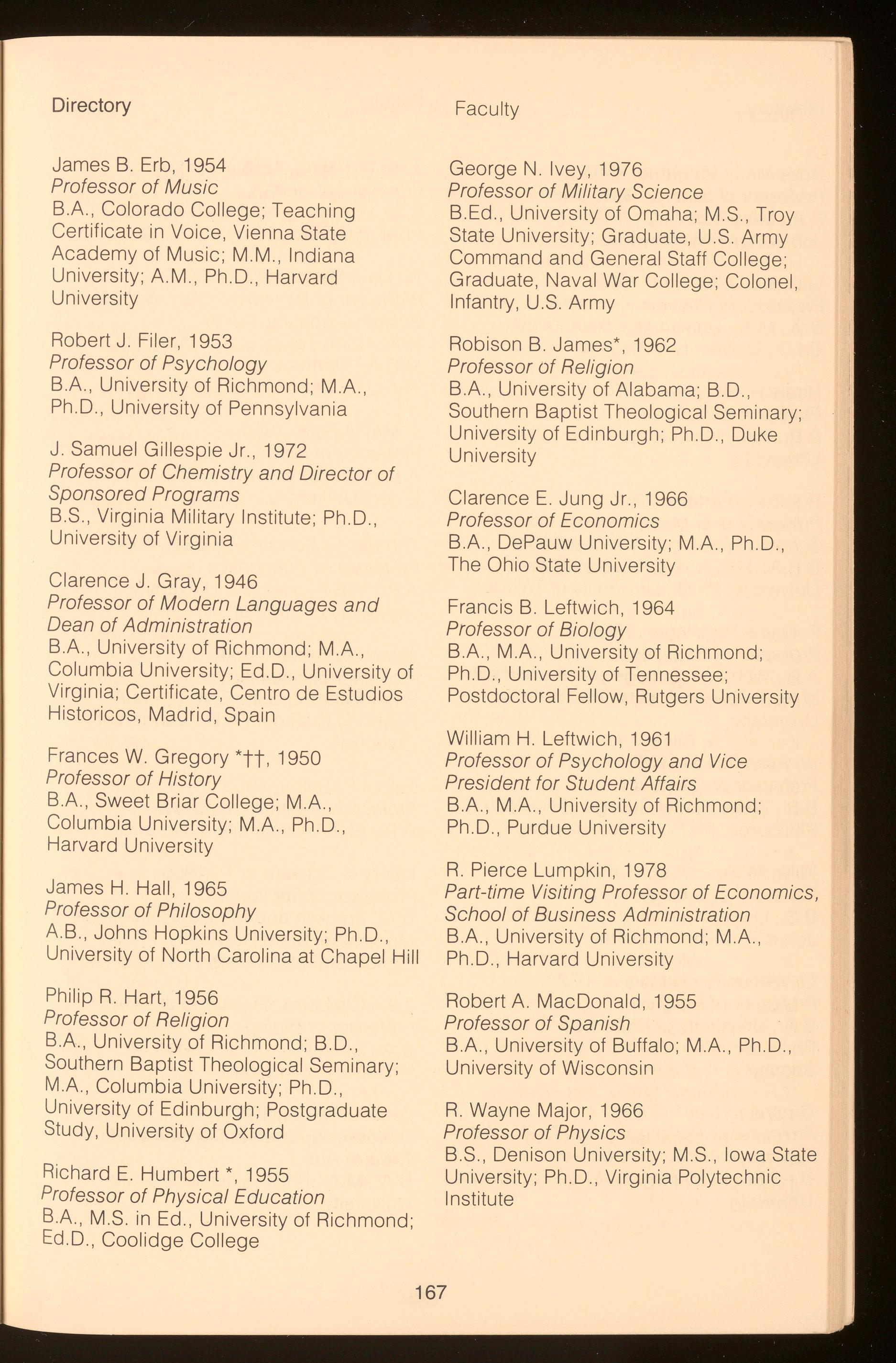
Directory
James B. Erb, 1954 Professor of Music
B.A., Colorado College; Teaching Certificate in Voice, Vienna State Academy of Music; M.M., Indiana University; A.M., Ph.D., Harvard University
Robert J. Filer, 1953 Professor of Psychology
B.A., University of Richmond; M.A., Ph.D., University of Pennsylvania
J. Samuel Gillespie Jr., 1972 Professor of Chemistry and Director of Sponsored Programs
B.S., Virginia Military Institute; Ph.D., University of Virginia
Clarence J. Gray, 1946 Professor of Modern Languages and Dean of Administration
B.A., University of Richmond; M.A., Columbia University; Ed.D., University of Virginia; Certificate, Centro de Estudios Historicos, Madrid, Spain
Frances W. Gregory *tt, 1950 Professor of History
B.A., Sweet Briar College; M.A., Columbia University; M.A., Ph.D , Harvard University
James H. Hall, 1965 Professor of Philosophy
AB , Johns Hopkins University; Ph.D., University of North Carolina at Chapel Hill
Philip R. Hart, 1956 Professor of Religion
B.A., University of Richmond; B.D., Southern Baptist Theological Seminary; M.A., Columbia University; Ph.D., University of Edinburgh; Postgraduate Study, University of Oxford
Richard E. Humbert*, 1955 Professor of Physical Education
B.A., M.S. in Ed., University of Richmond; Ed.D., Coolidge College
Faculty
George N. Ivey, 1976 Professor of Military Science
B.Ed., University of Omaha; M.S , Troy State University; Graduate, U.S Army Command and General Staff College; Graduate, Naval War College; Colonel, Infantry, U.S. Army
Robison B. James*, 1962 Professor of Religion
B.A., University of Alabama; B.D., Southern Baptist Theological Seminary; University of Edinburgh; Ph.D, Duke University
Clarence E. Jung Jr., 1966 Professor of Economics
B.A., DePauw University; M.A., Ph.D., The Ohio State University
Francis B. Leftwich, 1964 Professor of Biology
B.A., M.A., University of Richmond; Ph.D., University of Tennessee; Postdoctoral Fellow, Rutgers University
William H. Leftwich, 1961 Professor of Psychology and Vice President for Student Affairs
B.A., M.A., University of Richmond; Ph.D., Purdue University
R. Pierce Lumpkin, 1978
Part-time Visiting Professor of Economics, School of Business Administration
B.A., University of Richmond; M.A., Ph.D., Harvard University
Robert A. MacDonald, 1955 Professor of Spanish
B.A., University of Buffalo; M.A., Ph.D., University of Wisconsin
R. Wayne Major, 1966 Professor of Physics
B.S., Denison University; M.S., Iowa State University; Ph.D., Virginia Polytechnic Institute
Directory
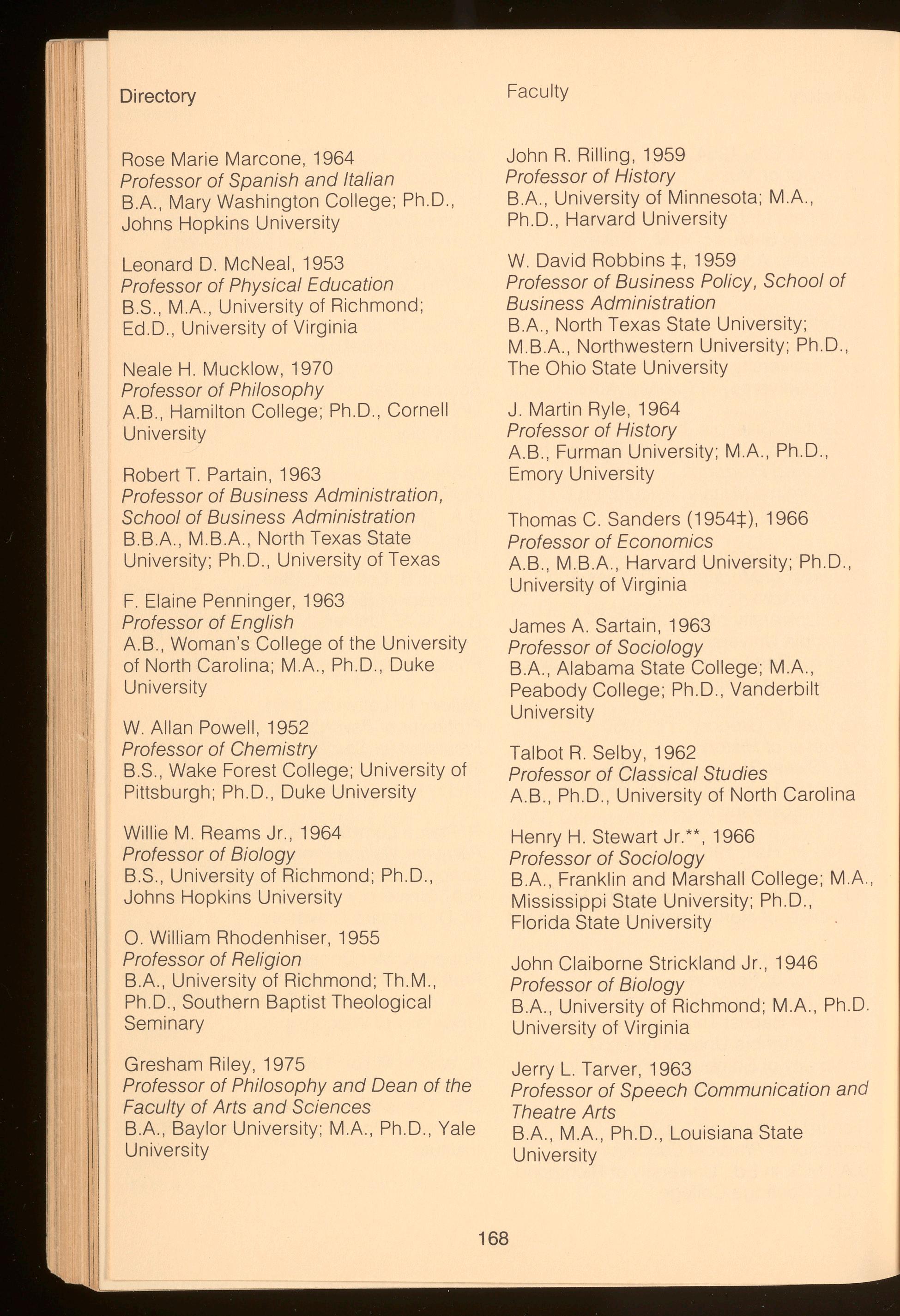
Rose Marie Marcone , 1964
Professor of Spanish and Italian
B.A., Mary Washington College ; Ph.D ., Johns Hopkins University
Leonard D. McNeal , 1953
Professor of Physical Education
B.S , M.A. , Univ ersity of Richmond ; Ed.D ., Universit y of Virginia
Neale H Mucklow , 1970
Professor of Philosophy
A.B. , Hamilton College ; Ph.D. , Cornell Universit y
Robert T. Partain, 1963
Professor of Business Administration , School of Business Administration
B.B.A. , M .B.A. , North Tex as State University ; Ph.D ., Univer s ity of Tex as
F Elaine Penninger, 1963
Professor of English
A.B. , Woman ' s College of the University of North Carolina ; M.A., Ph D. , Duke University
W. Allan Powell, 1952
Professor of Chemistry
B S ., Wake Forest College ; Univ ersity of Pittsburgh ; Ph D. , Duke University
Willie M . Reams Jr ., 1964
Professor of Biology
B.S., University of Richmond ; Ph.D ., Johns Hopkins University
0. William Rhodenhiser , 1955 Professor of Religion
B.A. , University of Richmond; Th M ., Ph D. , Southern Baptist Theological Seminary
Gresham Riley , 1975
Professor of Philosophy and Dean of the Faculty of Arts and Sciences
B.A., Baylor University ; M.A., Ph.D , Yale University
Fac ulty
John R Rilling, 1959
Professor of History
B.A., University of Minnesota; M.A., Ph D., Harvard University
W. Dav id Robbins+, 1959
Professor of Business Policy , School of Business Administration
B.A., North Te x as State University ; M.B.A ., Northwestern University ; Ph.D ., The Ohio State University
J. Martin Ryle , 1964
Professor of History
A.B ., Furman University; M.A. , Ph.D ., Emory University
Thomas C. Sanders (1954+) , 1966
Professor of Economics
A.B., M.B.A., Harvard University; Ph.D ., Univer s ity of Virginia
James A Sartain , 1963
Professor of Sociology
B.A., Alabama State College; M.A., Peabody College ; Ph.D. , Vanderbilt University
Talbot R. Selby , 1962
Professor of Classical Studies
A.B ., Ph.D , University of North Carolina
Henry H Stewart Jr. ** , 1966
Professor of Sociology
B.A., Franklin and Marshall College ; M.A. , Mississippi State University; Ph.D , Florida State University
John Claiborne Strickland Jr. , 1946
Professor of Biology
B.A. , University of Richmond; M .A ., Ph .D . University of Virginia
Jerry L. Tarver , 1963
Professor of Speech Communication an d Theatre Arts
B.A. , M.A., Ph.D., Louisiana State University
Directory
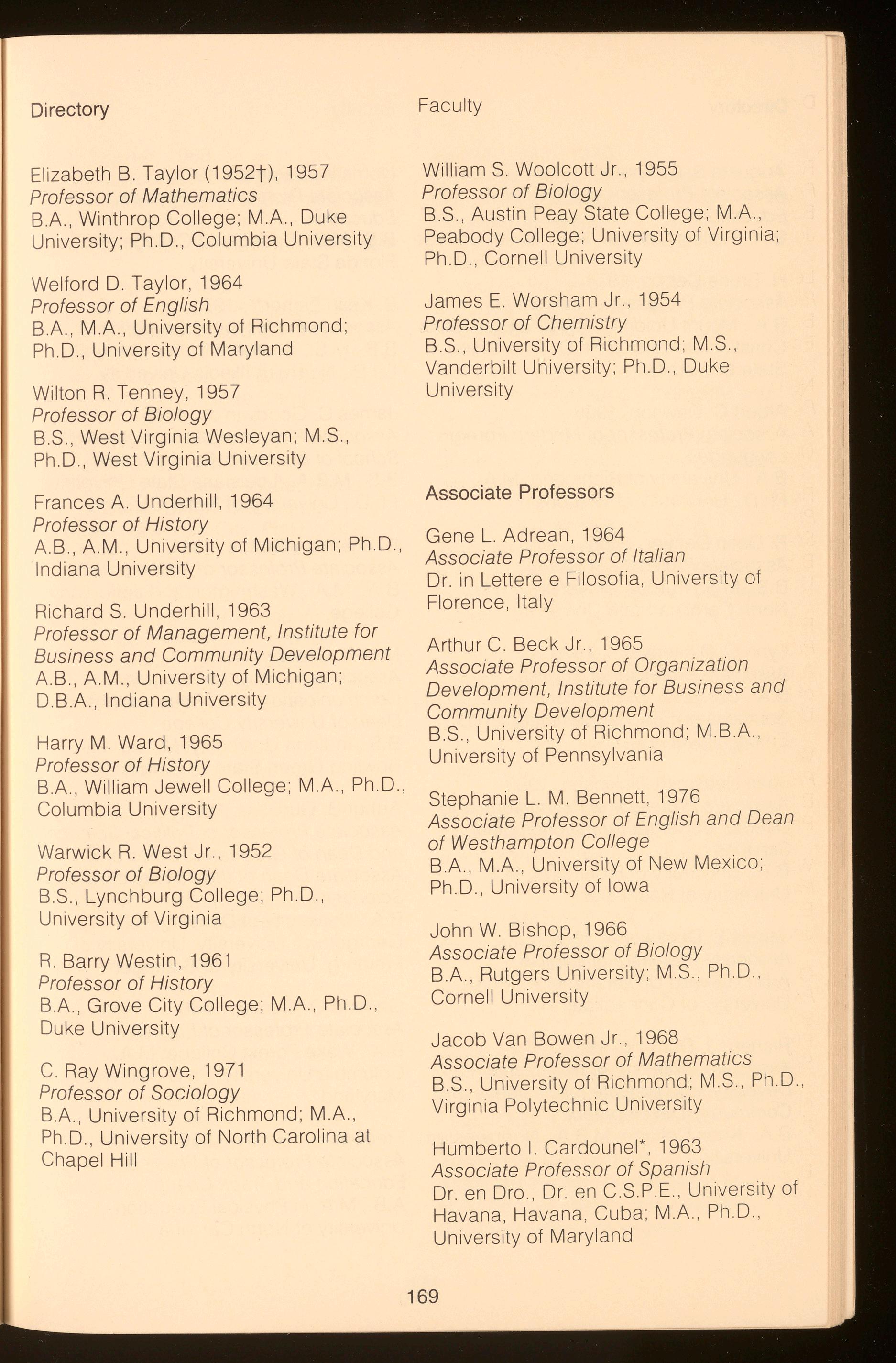
Elizabeth B. Taylor (1952t), 1957 Professor of Mathematics
BA, Winthrop College; MA, Duke University; Ph D , Columbia University
Welford D. Taylor , 1964 Professor of English
BA, MA, University of Richmond ; Ph.D . , University of Maryland
Wilton R. Tenney , 1957 Professor of Biology
B.S., West Virginia Wesleyan; M.S. , PhD., West Virginia University
Frances A. Underhill , 1964 Professor of History
A B., A.M., University of Michigan; PhD , Indiana University
Richard S Underhill , 1963 Professor of Management, Institute for Business and Community Development
A B. , AM. , University of Michigan; D. BA , Indiana University
Harry M. Ward, 1965 Professor of History
BA, William Jewell College; MA , PhD, Co lumbia University
Warwick R. West Jr. , 1952 Professor of Biology
B.S., Lynchburg College ; Ph.D ., University of Virginia
R. Barry Westin , 1961 Professor of History
BA, Grove City College; MA , Ph.D ., Duke University
C. Ray Wingrove , 1971 Professor of Sociology
BA, University of Richmond; MA , PhD., University of North Carolina at Chapel Hi ll
Faculty
William S. Woolcott Jr. , 1955 Professor of Biology
B.S. , Austin Peay State College; MA , Peabody College; University of Virginia; PhD. , Cornell University
James E. Worsham Jr , 1954 Professor of Chemistry
B.S., University of Richmond; M.S. , Vanderbilt University; PhD. , Duke University
Associate Professors
Gene L. Adrean , 1964
Associate Professor of Italian
Dr in Lettere e Filosofia , Uni ve rsit y of Florence , Italy
Arthur C Beck Jr, 1965
Associate Professor of Organization
Development, Institute for Business and Community Development
BS , University of Richmond ; M.BA , University of Pennsyl va nia
Stephanie L. M. Bennett , 1976
Associate Professor of English and D ea n of Westhampton College
BA , MA , University of New Mexic o; Ph.D. , Universit y of Iowa
John W. Bishop , 1966
Associate Professor of Biology
BA , Rutgers University; MS , PhD , Cornell Universit y
Jacob Van Bowen Jr , 1968
Associate Professor of Mathematics
B.S. , University of Richmond ; MS, PhD. , Virginia Po lytechnic University
Humberto I. Cardounel *, 1963
Associate Professor of Spanish
Dr. en Oro , Dr. en C S P E , Uni versity of Havana, Havana , Cuba ; MA, PhD , University of Maryland
,I I
Directory

Augusta S. Chapman, 1955
Associate Professor of Physical Education
B.A., Hollins College; M.S., Smith College
H. Bruce Cobbs, 1974
Associate Professor of Education
B.A., Mount Union College; M.Ed., Texas
Christian University; Ph.D , The Ohio State University
Albert C Dawson, 1966
Associate Professor of Modern Foreign
Languages
B.A. , University of Richmond; M.A., PhD, University of Wisconsin
R. Dean Decker, 1966
Associate Professor of Biology
BS, M.S. , Purdue University; Ph.D. , North Carolina State University
Lynn C. Dickerson 11, 1970
Associate Professor of English
B.A., University of Richmond; B.D. , Th.M, Southeastern Baptist Seminary ; Ph.D , Emory University
Jean Neasmith Dickinson , 1963
Associate Professor of Psychology and Director of Center for Psychological Services
B.A. , University of Richmond ; M.S., University of Rochester
James E. Duckworth , 1968
Associate Professor of English
A.B, Harvard University; M.A., Ph.D., University of Connecticut
Richard J. Dunsing , 1967
Associate Professor of Organization
Development , Institute for Business and Community Development
B.A., Knox College; M.B.A. , Northwestern University
Faculty
Norris W. Eastman, 1971
Associate Professor of Physical Education
B.S , M .S., Springfield College; Ph.D ., Florida State University
B. Keith Eicher** , 1971
Associate Professor of Education
B.S., M.S , Southern Illinois University; Ed.D. , Northern Illinois University
James C. Goodwin Jr., 1976
Associate Professor of Management, School of Business Administration
B.S., M.B.A., Louisiana State University; Ph.D , University of North Carolina
E. Sherman Grable , 1941
Associate Professor of Mathematics
B.A., M.A. , Washington and Jefferson College
Max C. Graeber, 1967
Associate Professor of Speech
Communication and Theatre Arts and Dean of University College
B.S. , Indiana University; M.A., Ph.D. , Bowling Green State University
Arthur B. Gunlicks, 1968
Associate Professor of Political Science and Dean of Graduate Studies and Associate Dean of the Faculty of Arts and Sciences
B.A., University of Denver; Ph.D , Georgetown University; University of Freiburg; University of Gottingen
Garland 0. Gunter, 1966
Associate Professor of English
B.A., Wake Forest College; M.A. , Columbia University; Ph.D., University of Maryland
Frederick T. Hardy, 1950
Associate Professor of Physical Education and Track Coach
A.B., M.A. in Physical Education , University of North Carolina
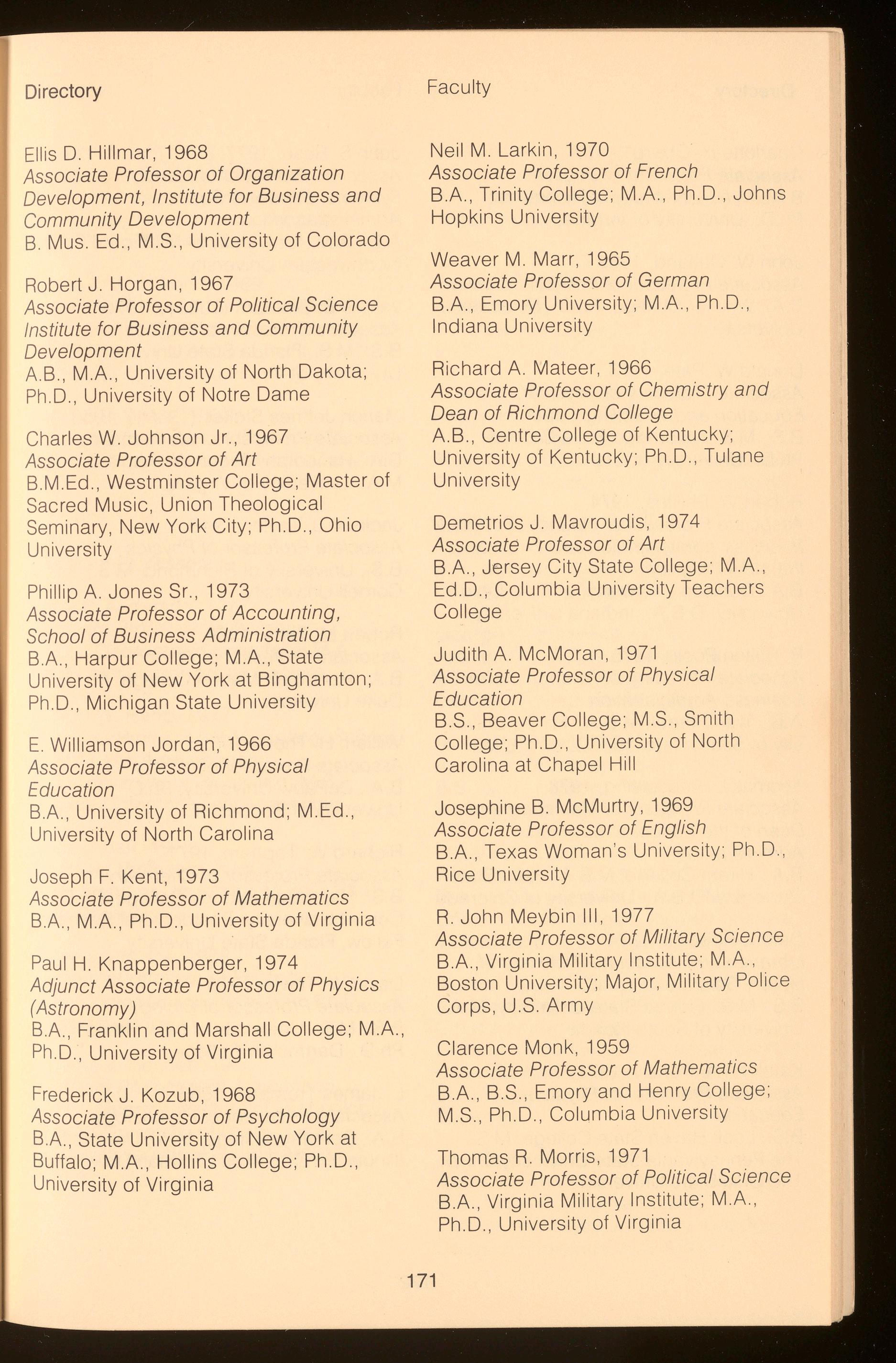
'
Directory
Ellis D Hillmar, 1968
Assoc iate Professor of Organization
Development, Institute for Business and Community Development
B Mus. Ed., M.S., University of Colorado
Robert J. Horgan , 1967
Assoc iate Professor of Political Science Institute for Business and Community Development
A.B., M.A. , University of North Dakota; Ph.D , University of Notre Dame
Char les W. Johnson Jr , 1967
Assoc iate Professor of Art
B.M.Ed., Westminster College; Master of Sacred Music , Union Theological Semina ry , New York City; Ph.D. , Ohio University
Phillip A. Jones Sr ., 1973
Assoc iate Professor of Accounting, Schoo l of Business Administration
B.A., Harpur College; M.A., State Unive rsity of New York at Binghamton; Ph.D, Michigan State University
E. Williamson Jordan, 1966
Assoc iate Professor of Physical Educa tion
B.A., University of Richmond ; M.Ed. , University of North Carolina
Josep h F. Kent , 1973
Assoc iate Professor of Mathematics
B.A., M.A., Ph.D. , University of Virginia
Paul H. Knappenberger, 1974
Adju nct Associate Professor of Physics (Astronomy)
BA, Franklin and Marshall College; M.A., Ph.D ., University of Virginia
Frederick J. Kozub, 1968
Assoc iate Professor of Psychology
Faculty
Neil M. Larkin , 1970
Associate Professor of French
B.A. , Trinity College ; M.A. , Ph.D. , Johns Hopkins University
Weaver M . Marr , 1965
Associate Professor of German
B.A., Emory University ; M.A. , Ph.D, Indiana University
Richard A. Mateer, 1966
Associate Professor of Chemistry and Dean of Richmond College
A.B., Centre College of Kentucky; University of Kentucky; Ph.D ., Tulane University
Demetrios J. Mavro udis , 1974
Associate Professor of Art
B.A. , Jersey City State College; M.A. , Ed.D , Columbia University Teacher s College
Judith A. McMoran, 1971
Associate Professor of Physical Education
BS, Beaver College; M.S., Smith College ; Ph.D ., University of North Carolina at Chapel Hill
Josephine B. McMurtry , 1969
Associate Professor of English
B.A., Texas Woman ' s University ; PhD , Rice University
R. John Meybin Ill, 1977
Associate Professor of Military Science
B.A., Virginia Military Institute; M.A. , Boston University ; Major , Military Police Corps, U S Army
Clarence Monk , 1959
Associate Professor of Mathematics
B.A. , B.S ., Emory and Henry College; M S. , Ph.D. , Columbia Univer s ity
BA, State University of New York at Buffalo; M.A., Hollins College; Ph.D., University of Virginia 171
Thomas R. Morris, 1971
Associate Professor of Political Science
B.A., Virginia Military Institute; M.A., Ph.D., University of Virginia
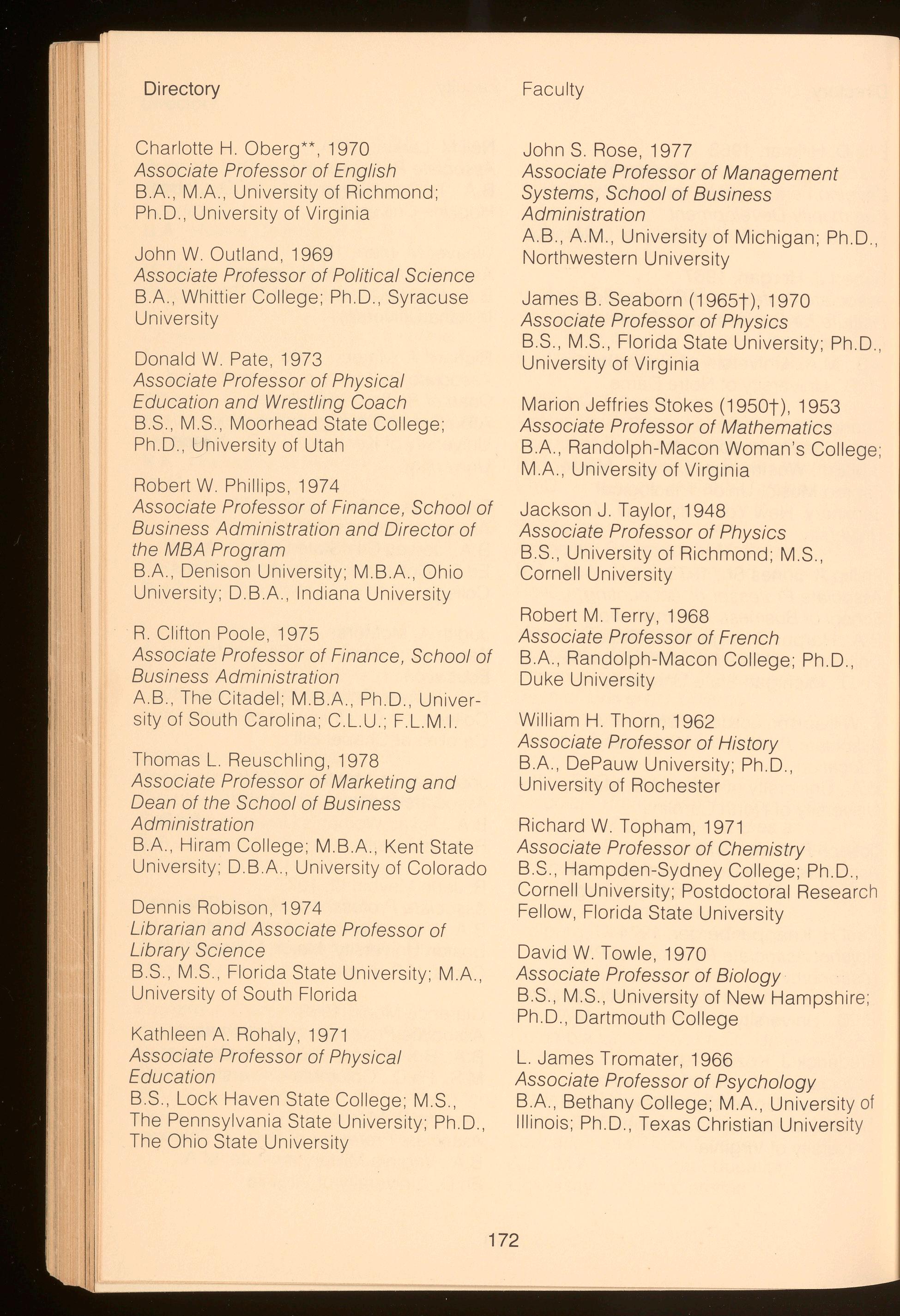
Directory
Charlotte H. Oberg **, 1970
Associate Professor of English
BA , MA , Uni v ersity of Richmond ; PhD, Uni v ersity of Virginia
John W Outland , 1969
Associate Professor of Political Science
BA , Whittier College; PhD , Syracuse Uni v ersit y
Donald W Pate , 1973
Associate Professor of Physical Education and Wrestling Coach
B.S. , M .S , Moorhead State College ; PhD , Uni v ers ity of Utah
Robert W . Phillips , 1974
Associate Professor of Finance, School of Business Administration and Director of the MBA Program
BA , Denison University ; M.BA , Ohio University; D BA , Indiana University
R. Clifton Poole , 1975
Associate Professor of Finance, School of Business Administration
AB , The Citadel; M.BA , PhD, University of South Carolina ; C.L U. ; F.L.M.I.
Thomas L. Reuschling , 1978
Associate Professor of Marketing and Dean of the School of Business Administration
BA , Hiram College; M.BA , Kent State Universit y; D.BA , Uni v ersity of Colorado
Dennis Robison , 1974
Librarian and Associate Professor of Library Science
BS , MS , Florida State Uni v ersity ; MA , University of South Florida
Kathleen A Rohal y, 1971
Associate Professor of Physical Education
B.S , Lock Ha v en State College ; M S , The Pennsylvania State University; Ph.D. , The Ohio State University
Faculty
John S. Rose , 1977
Associate Professor of Management Systems, School of Business Administration
AB. , AM, University of Michigan; Ph.D , Northwestern University
James B. Seaborn (1965t) , 1970
Associate Professor of Physics
B.S. , M.S., Florida State University; PhD , University of Virginia
Marion Jeffries Stokes (1950t), 1953
Associate Professor of Mathematics
BA , Randolph-Macon Woman ' s College ; MA , University of Virginia
Jackson J. Taylor , 1948
Associate Professor of Physics
B.S. , University of Richmond ; M.S. , Cornell University
Robert M. Terry , 1968
Associate Professor of French
BA , Randolph-Macon College ; Ph.D ., Duke University
William H. Thorn, 1962
Associate Professor of History
BA , DePauw University; Ph.D. , University of Rochester
Richard W Topham, 1971
Associate Professor of Chemistry
B.S , Hampden-Sydney College; Ph.D ., Cornell University ; Postdoctoral Researc h Fellow , Florida State University
David W. Towle, 1970
Associate Professor of Biology
B.S , M.S, University of New Hampshire ; PhD , Dartmouth College
L. James Tromater , 1966
Associate Professor of Psychology
BA , Bethany College; MA , Universit y of Illinois; Ph.D., Texas Christian Universit y
Directory
John D. Welsh, 1965
Associate Professor of Speech Communication and Theatre Arts
BA, University of Richmond; M.A., Ph.D., Tulane University
David A. Whitaker** , 1969
Associate Professor of Economics
B.S., Virginia Commonwealth University;
M.S., Virginia Polytechnic Institute ; Ph .D, Univ ersity of Florida
Joseph S. White, 1967
Associate Professor of Classical Studies
A B, Ph.D., University of North Carolina
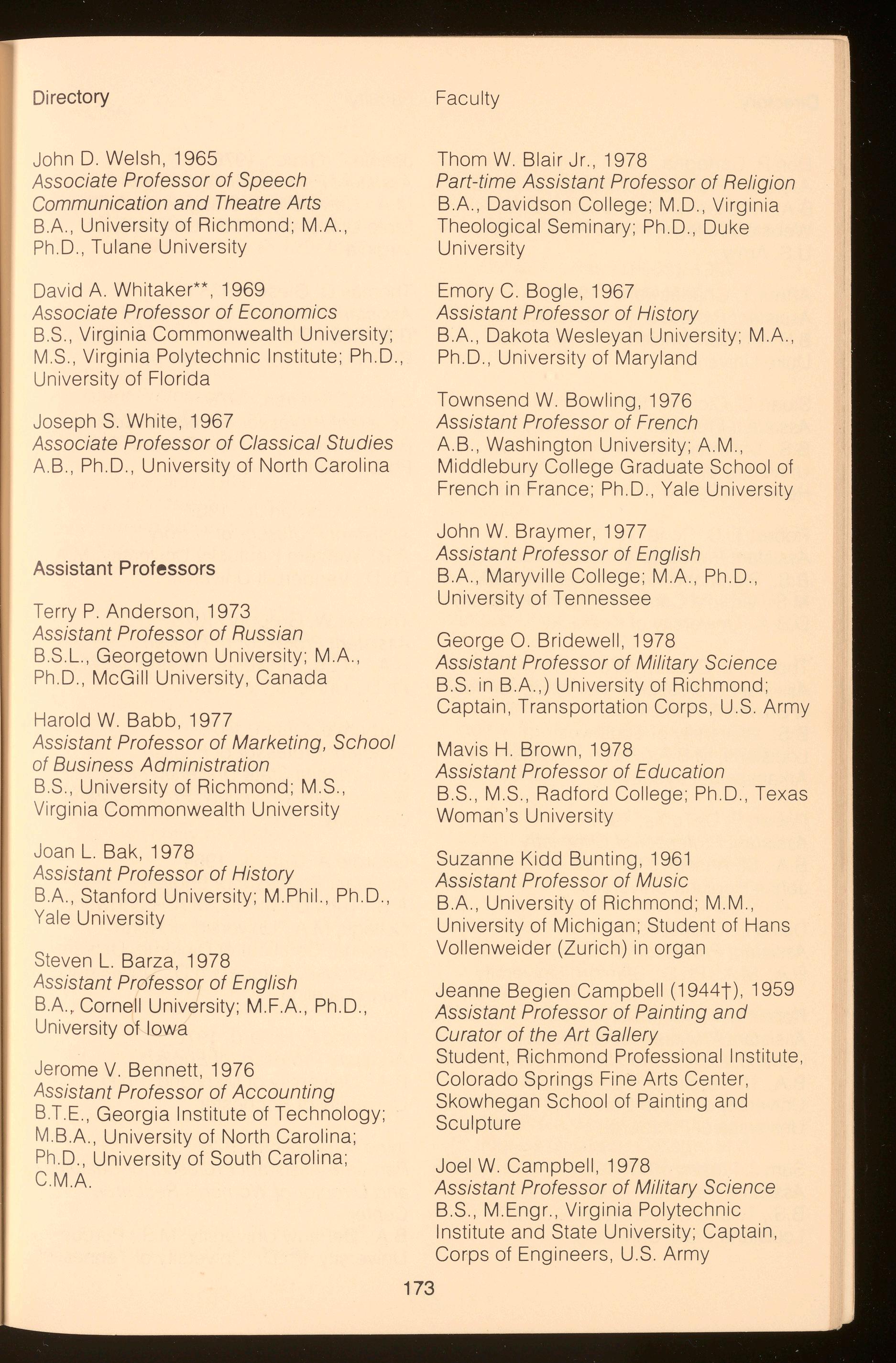
Assistant Professors
Terry P. Anderson , 1973
Assistant Professor of Russian
B.S.L, Georgetown University ; M.A. , Ph.D., McGill University , Canada
Harold W. Babb , 1977
Assistant Professor of Marketing, School of Business Administration
B.S., University of Richmond; M.S. , Virgi nia Commonwealth University
Joan L. Bak, 1978
Assistant Professor of History
BA, Stanford University; M Phil , Ph.D , Yale University
Steven L. Barza , 1978
Assistant Professor of English
BA, Cornell University ; M.F.A., Ph.D , University of Iowa
Jerome V. Bennett , 1976
Assis tant Professor of Accounting
B T.E, Georgia Institute of Technolog y;
M.BA, University of North Carolina ; Ph.D., University of South Carolina; C.M.A.
Faculty
Thom W. Blair Jr ., 1978
Part-time Assistant Professor of Religion
B.A. , Davidson College ; M.D , Virginia
Theological Seminary; Ph.D. , Duke University
Emory C Bogle , 1967
Assistant Professor of History
B.A. , Dakota Wesleyan University ; M.A. , Ph.D ., University of Maryland
Townsend W. Bowling, 1976
Assistant Professor of French
A.B., Washington University; A.M , Middlebury College Graduate School of French in France; Ph.D, Yale University
John W. Braymer , 1977
Assistant Professor of English
B.A. , Maryville College ; MA , Ph.D , University of Tennessee
George O Bridewell , 1978
Assistant Profess or of Military Science
B.S. in B.A.,) University of Richmond; Captain, Transportation Corps, U S. Army
Mavis H. Brown , 1978
Assistant Professor of Education
B.S. , M.S., Radford College ; Ph.D. , Texas Woman 's University
Suzanne Kidd Bunting , 1961
Assistant Professor of Music
B.A., University of Richmond; M.M. , University of Michigan ; Student of Han s Vollenweider (Zurich) in organ
Jeanne Begien Campbell (1944t), 1959
Assistant Professor of Painting and Curator of the Art Gallery
Student, Richmond Professional Institute, Colorado Springs Fine Arts Center, Skowhegan School of Painting and Sculpture
Joel W. Campbell , 1978
Assistant Professor of Military Science
B .S., M.Engr. , Virginia Polytechnic Institute and State University; Captain, Corps of Engineers , U S Army
Directory
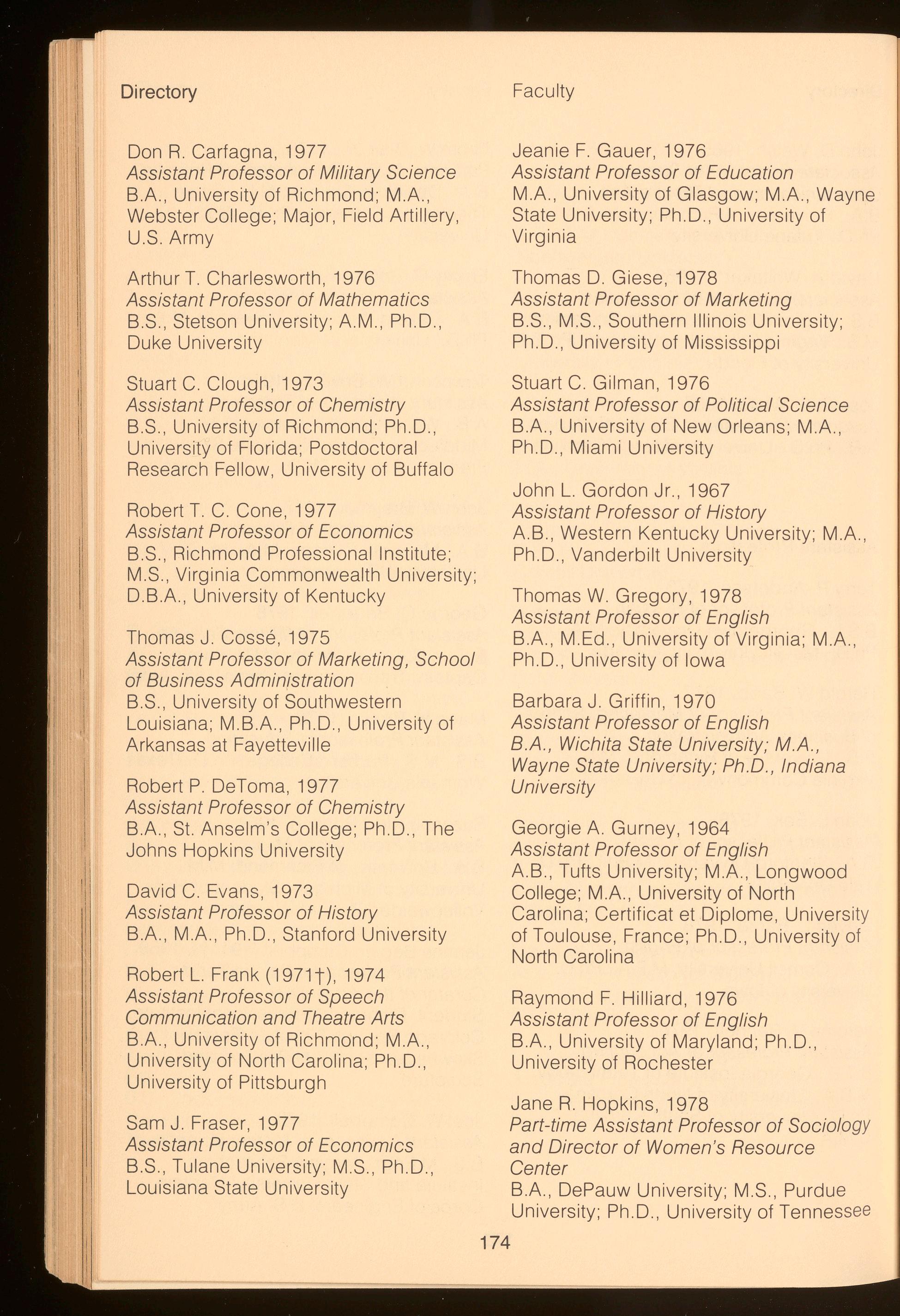
Don R. Carfagna , 1977
Assistant Professor of Military Science
B.A. , University of Richmond ; M.A. , Webster College ; Major , Field Artillery , U.S Arm y
Arthur T. Charlesworth, 1976
Assistant Professor of Mathematics
B.S., Stetson Unive rsity; A.M , Ph.D. , Duke Universit y
Stuart C Clough , 1973
Assistant Professor of Chemistry
B.S. , University of Richmond ; Ph.D ., Universit y of Florida ; Postdoctoral Research Fellow , Uni v ersity of Buff a lo
Robert T. C Cone , 1977
Assistant Professor of Economics
B.S., Richmond Professional Institute ; M.S. , Virginia Commonwealth Univer s ity;
D B.A. , Univ ersity of Kentuck y
Thomas J. Cosse , 1975
Assistant Professor of Marketing , School of Business Administration
B S ., Uni v ersity of Southwestern
Louisiana; M .B.A. , Ph.D. , Uni v ersit y of Arkansas at Fayetteville
Robert P. DeToma , 1977
Assistant Professor of Chemistry
B.A. , St Anselm 's College ; Ph.D. , The Johns Hopkins University
Dav id C. Ev ans , 1973
Assistant Professor of History
B.A. , M.A. , Ph.D , Stanford University
Robert L Frank (1971t) , 1974
Assistant Professor of Speech Communication and Theatre Arts
B.A., University of Richmond; M A. , University of North Carolina ; Ph.D. , University of Pittsburgh
Sam J. Fraser , 1977
Assistant Professor of Economics
B.S., Tulane University ; M .S. , Ph.D. , Louisiana State University
Faculty
Jeanie F. Gauer , 1976
Assistant Professor of Education
M.A., University of Glasgow ; M.A. , Wayne State University; Ph.D. , University of Virginia
Thomas D. Giese , 1978
Assistant Professor of Marketing
B S. , M.S. , Southern Illinois Uni v ersity; Ph.D ., University of Mississippi
Stuart C Gilman , 1976
Assistant Professor of Political Science
B.A. , University of New Orleans ; M.A. , Ph.D ., Miami University
John L Gordon Jr, 1967
Assistant Professor of History
A.B , Western Kentuck y University ; M.A. , Ph.D. , Vanderbilt University
Thomas W Gregory , 1978
Assistant Professor of English
B.A. , M.Ed. , University of Virginia ; M.A. , Ph.D ., University of Iowa
Barbara J. Griffin , 1970
Assistant Professor of English
B.A. , Wichita State University ; M.A., Wayne State University ; Ph.D. , Indiana University
Georgie A. Gurney , 1964
Assistant Professor of English
A.B., Tufts University ; M.A. , Longwood College; M.A. , University of North Carolina ; Certificat et Diplome , Universi ty of Toulouse , France ; Ph.D. , University of North Carolina
Raymond F. Hilliard , 1976
Assistant Professor of English
B.A., University of Maryland; Ph.D. , University of Rochester
Jane R. Hopkins , 1978
Part-time Assistant Professor of Sociolo gy and Director of Women 's Resource Center 174
B.A. , DePauw University; M.S., Purdue University ; Ph .D., University of Tenness ee
Directory
Warren P. Hopkins , 1976
Assistant Professor of Psychology
B.A. , Washington and Lee University; M.A. , Ph.D., University of Tennessee
H. Wayne Hudgins , 1978
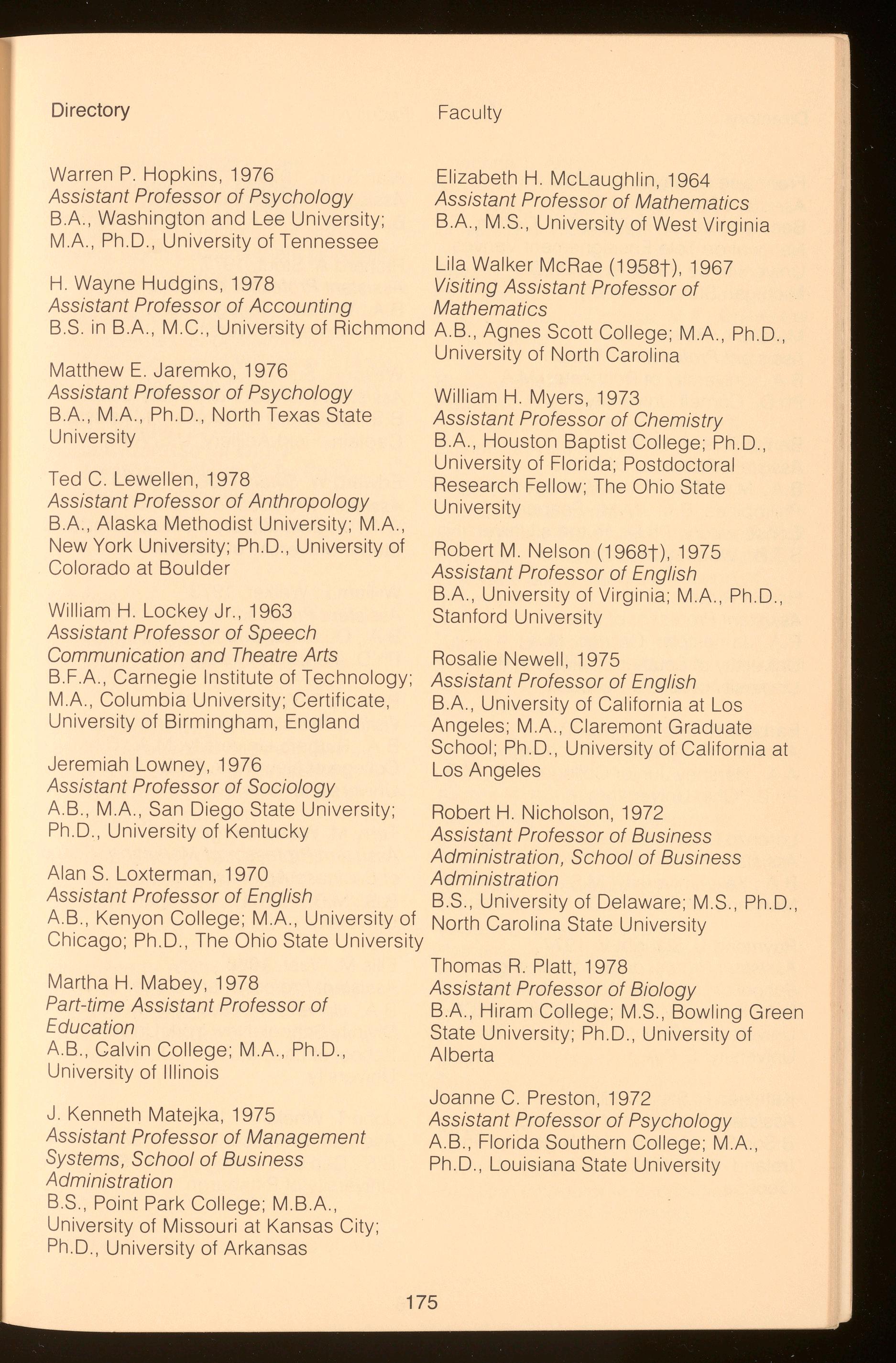
Faculty
Elizabeth H. McLaughlin, 1964
Assistant Professor of Mathematics
B.A., M.S, University of West Virginia
Lila Walker McRae (1958t) , 1967
Visiting Assistant Professor of Assistant Professor of Accounting Mathematics
B.S. in B.A. , M.C ., University of Richmond
Matthew E. Jaremka , 1976
Ass istant Professor of Psychology
B.A. , M.A. , Ph.D. , North Texas State Univ ersity
Ted C. Lewellen, 1978
Assistant Professor of Anthropology
B.A. , Alaska Methodist University; M.A. , New York University; Ph.D., University of Colorado at Boulder
William H. Lockey Jr. , 1963
Assistant Professor of Speech
Communication and Theatre Arts
B F.A. , Carnegie Institute of Technology ;
M.A. , Columbia University ; Certificate , University of Birmingham , England
Je remiah Lowney, 1976
Assistant Professor of Sociology
A.B. , M.A. , San Diego State University ; Ph.D , University of Kentucky
A.B. , Agnes Scott College ; M.A. , Ph.D.,
Univ ersity of North Carolina
William H . Myers , 1973
Assistant Professor of Chemistry
B.A., Houston Baptist College; Ph.D ., University of Florida ; Postdoctoral Research Fellow; The Ohio State University
Robert M. Nelson (1968t), 1975
Assistant Professor of English
B.A. , University of Virginia ; M.A. , Ph.D. , Stanford University
Rosalie Newell , 1975
Assistant Professor of English
B.A., University of California at Los Angeles; M.A. , Claremont Graduate School; Ph.D ., University of California at Los Angeles
Robert H. Nicholson, 1972 Assistant Professor of Business Administration, School of Business
A lan S. Loxterman, 1970 Administration
Assistant Professor of English
B.S., University of Delaware ; M.S , Ph.D , A. B. , Kenyon College ; M.A. , University of North Carolina State University Chicago; Ph.D. , The Ohio State University
Martha H. Mabey , 1978
Part-time Assistant Professor of Education
A. B , Calvin College ; M.A. , Ph.D., University of Illinois
J. Kenneth Matejka , 1975
Assistant Professor of Management Systems, School of Business
Administration
B S, Point Park College; M.B.A. , University of Missouri at Kansas City; Ph.D., University of Arkansas
Thomas R. Platt, 1978
Assistant Professor of Biology
B.A., Hiram College ; M S., Bowling Green State University ; Ph.D. , University of Alberta
Joanne C. Preston , 1972
Assistant Professor of Psychology
A.B , Florida Southern College ; M.A. , Ph.D. , Louisiana State University
Directory
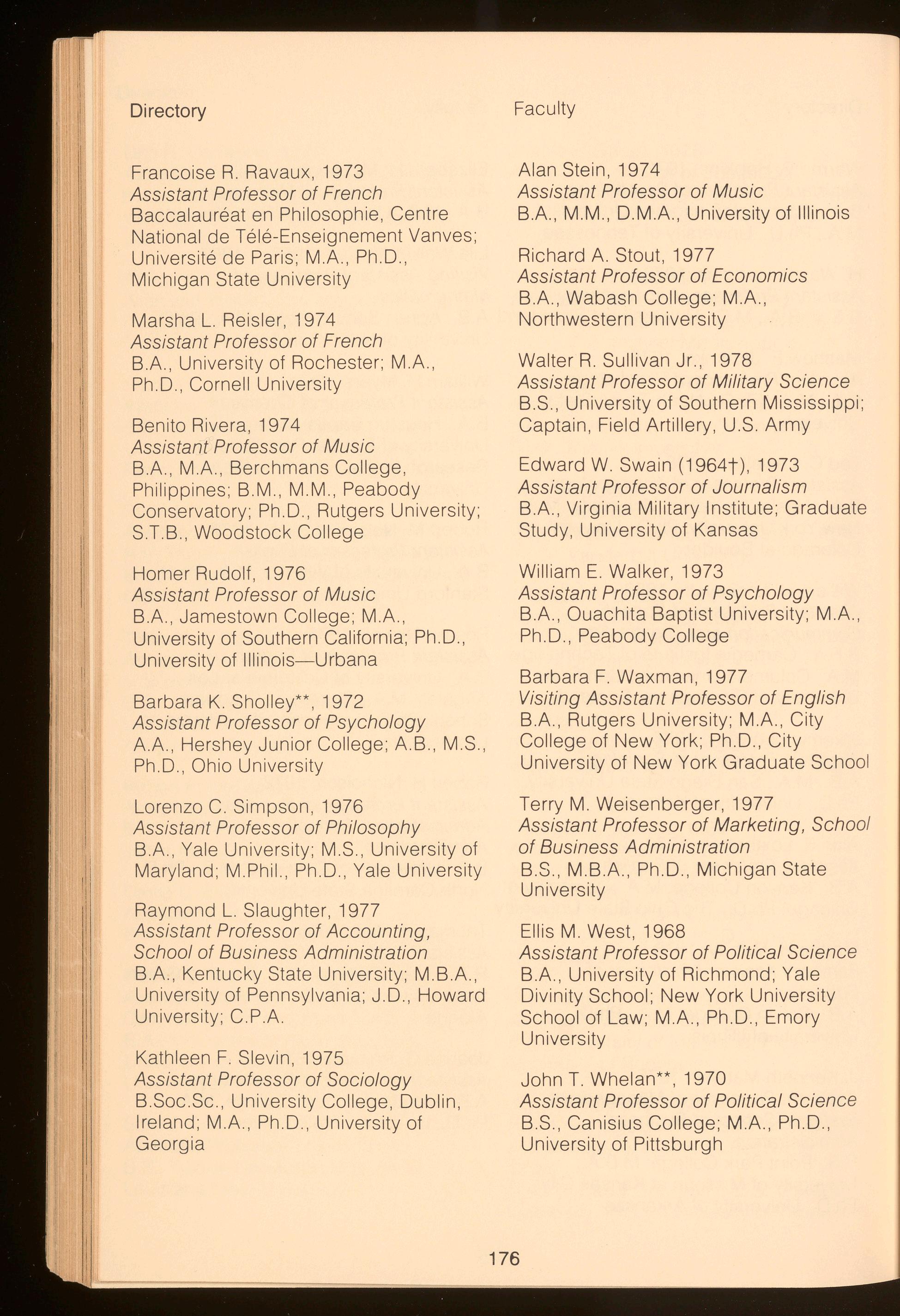
Francoise R. Ravaux , 1973
Assistant Professor of French Baccalaureat en Philosophie, Centre
National de Tele-Enseignement Vanves; Universite de Paris ; M.A., Ph.D., Michigan State University
Marsha L. Reisler , 1974
Assistant Professor of French
BA, University of Rochester ; M.A. , Ph.D ., Cornell University
Benito Rivera , 197 4
Assistant Professor of Music
BA, M.A., Berchmans College, Philippines ; BM , M.M , Peabody Conservatory; Ph.D., Rutgers University; S.T.B., Woodstock College
Homer Rudolf , 1976
Assistant Professor of Music
BA, Jamestown College ; M.A. , University of Southern California ; Ph.D., University of Illinois-Urbana
Barbara K. Sholley**, 1972
Assistant Professor of Psychology
A.A. , Hershey Junior College ; A.B. , M.S , Ph D , Ohio University
Lorenzo C Simpson , 1976
Assistant Professor of Philosophy
BA , Yale University ; M.S. , University of Maryland ; M.Phil , PhD. , Yale University
Raymond L. Slaughter , 1977
Assistant Professor of Accounting, School of Business Administration
B.A. , Kentucky State University; M.B.A., University of Pennsylvania; J.D., Howard University ; CPA
Kathleen F. Slevin , 1975
Assistant Professor of Sociology
B Soc Sc , University College, Dublin, Ireland; M.A., Ph.D , University of Georgia
Faculty
Alan Stein, 1974
Assistant Professor of Music
BA , M .M ., D.M.A. , University of Illinois
Richard A. Stout, 1977
Assistant Professor of Economics
B.A. , Wabash College; M.A., Northwestern University
Walter R. Sullivan Jr , 1978
Assistant Professor of Military Science
B.S., University of Southern Mississippi ; Captain, Field Artillery, U.S. Army
Edward W. Swain (1964t), 1973
Assistant Professor of Journalism
B.A. , Virginia Military Institute; Graduate Study , University of Kansas
William E. Walker , 1973
Assistant Professor of Psychology
BA, Ouachita Baptist University; M.A. , Ph.D. , Peabody College
Barbara F. Waxman, 1977
Visiting Assistant Professor of English
B.A., Rutgers University ; M.A., City College of New York; Ph.D ., City University of New York Graduate School
Terry M. Weisenberger , 1977
Assistant Professor of Marketing , School of Business Administration
B.S, M.B.A., Ph.D., Michigan State University
Ellis M. West, 1968
Assistant Professor of Political Science
BA, University of Richmond ; Yale Divinity School; New York University School of Law; M.A., Ph.D , Emor y University
John T . Whelan**, 1970
Assistant Professor of Political Science
B.S. , Canisius College; M.A., Ph.D. , University of Pittsburgh
Directory
Doris M Willett (1962t), 1965
Assistant Professor of Mathematics
B S ., M.A., Western Carolina College; Graduate Study, University of North Carolina, North Carolina State University and University of Virginia
Nathaniel R. Withers, 1970
Assistant Professor of Mathematics
B.S., M.A., College of William and Mary; M.S., D.A. , Carnegie-Mellon University
Peter L. Yeager, 1975
Assistant Professor of English
A.B ., Hamilton College; M.A., Ph.D , University of North Carolina Lecturers
A . Conrad Bareford Jr ., 1978
Part-time Lecturer in Business Law
B.A., J.D., University of Richmond
Junie L. Bradshaw, 1977
Part-time Lecturer in Business Law , School of Business Administration
A .A., College of William and Mary at Norfolk; LL.B., Univ8rsity of Richmond
Samuel T. Emory (1968t), 1976
Visiting Lecturer in Geography
A.B ., M.A. , University of North Carolina ; Ph.D., University of Maryland
David Meade White, 1946
Part-time Lecturer in Business Law , School of Business Administration
Circuit Court Judge ; LL.B , University of Ric hmond
Faculty
Charlotte T. Anton , 1978
Part-time Instructor in Classical Studies
B.A. , Wake Forest College ; M.H . , University of Richmond
Beverly S Baker, 1978
Part-time Instructor in English
B.A., Lynchburg College ; M.A., University of Richmond
Richard Becker , 1975 Instructor in Music
B.M., University of Rochester; M.M ., Boston University
Robert H. Bell , 1961 Instructor in Chemistry
B.S., Virginia Polytechnic Institute ; B.S. in Pharmacy , Medical College of Virginia; Graduate Study , Medical College of Virginia
Albert E Bettenhausen , 1971
Instructor in Business Administration and Assistant to the Dean , School of Business Administration
B .S . in B.A., University of Richmond; M .B.A. , University of Florida
Berndt H . Bohm (1972t), 1976
Adjunct Instructor of Speech and Assistant to the Dean of University College
B.A., M.A., University of Richmond
William C . Basher , 1976
Part-time Instructor in Education
B.A., University of Richmond; M.Ed, Virginia Commonwealth University ; Ed.D ., University of Virginia
John K Colbert Jr ., 1978
Part-time Instructor in Clarinet
B .M , New England Conservatory of Music
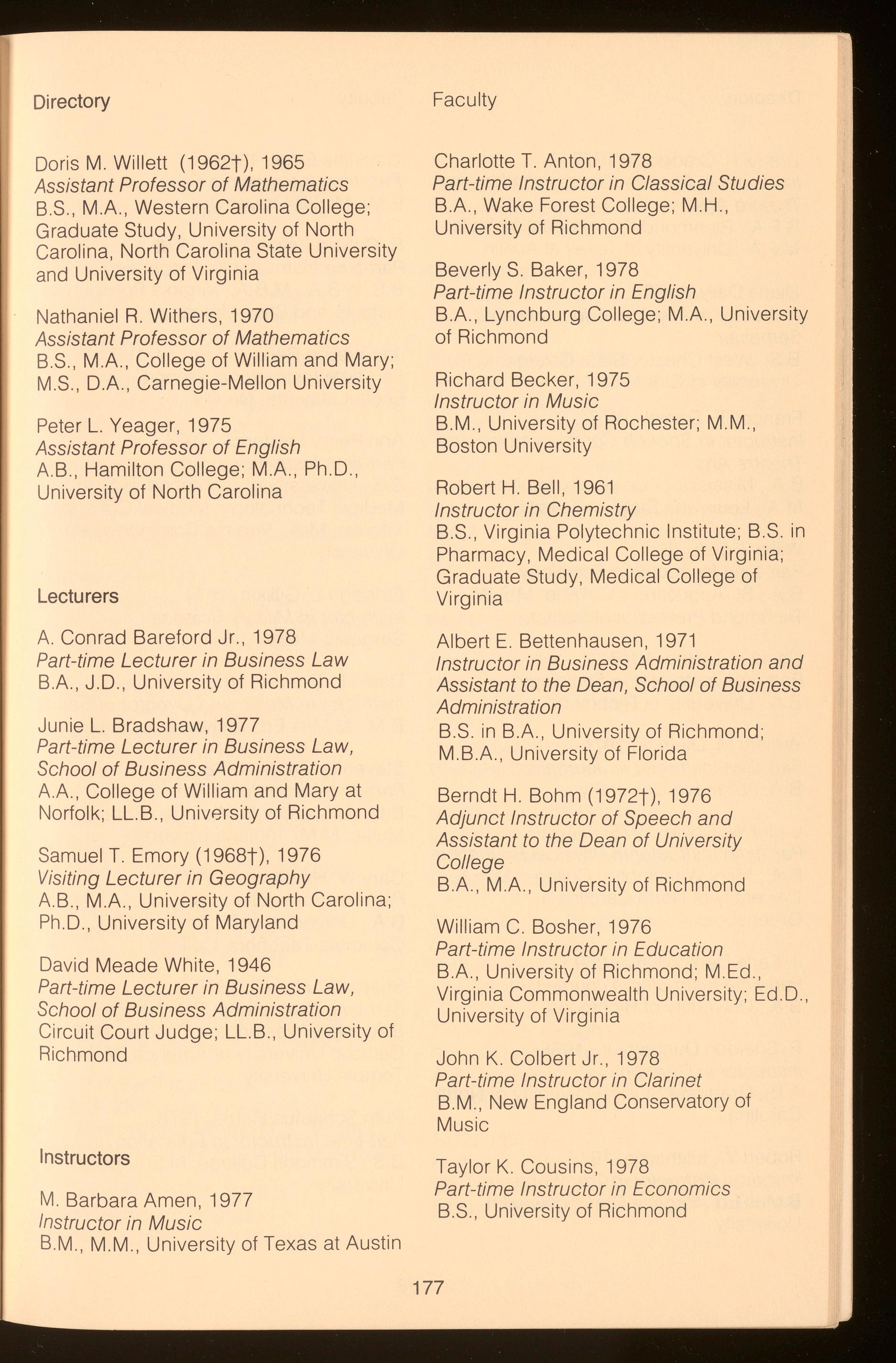
Instructors
M. Barbara Amen, 1977
Instructor in Music
B.M., M.M ., University of Texas at Austin
Taylor K . Cousins , 1978
Part-time Instructor in Ec onomics
B S , University of Richmond
,I'
Directory

Cheryl P. Craddock, 1977
Instructor in Speech Communication and Theatre Arts
B.F.A., Richmond Professional Institute;
M.F.A., University of Texas at Austin
Diane Daily, 1976
Instructor in Physical Education, Fall Semester
B.S., West Chester State College; M.Ed., University of Cincinnati
Frances E. Daniel, 1977
Instructor in Speech Communication and Theatre Arts
BA, Mississippi University for Women;
M.A., Louisiana State University
Willie J. Dell, 1977
Part-time Instructor in Sociology
BA, St Augustine's College; M.S.W., Richmond Professional Institute
David H. Demo, 1978
Part-time Instructor in Sociology
BA, University of Richmond
William M. Dietrick, 1974
Part-time Instructor in Journalism
BA, Villanova University
Laura W. Doyle, 1975
Part-time Instructor in Physical Education
BA, Mary Washington College; M.F.A., University of North Carolina at Greensboro
J. Earle Dunford Jr, 1969
Part-time Instructor in Journalism
BA, University of Richmond
R. Sheldon Dunham Jr , 1968
Instructor in German
AB., Graduate Study, University of North Carolina
Robert W. Ellithorpe, 1975
Part-time Instructor in Trombone
B.Mus.Ed., Virginia Commonwealth University
Faculty
Christine Ertel!, 1976
Part-time Instructor in Flute
B.M., McGill University
R. Calvert Esleeck Jr., 1978
Part-time Instructor in Accounting
B.S. in BA, M.B.A., Virginia Polytechnic Institute and State University
Jacqueline Renaud Francis, 1960
Part-time Instructor in French Ecole Lafayette, Neuilly
Ann Peery Frederick, 1974
Part-time Instructor in Art
B.S., University of Richmond; B.S. in Medical Technology, Medical College of Virginia; M.A., Virginia Commonwealth University
Eldridge L. Gillikin, 1974
Instructor in Military Science Sergeant Major, U.S Army
David L. Graves, 1975
Instructor in Music and Director of Bands
B.M., M.Mus.Ed., University of Georgia
Steven L. Gross, 1978
Part-time Instructor in French Horn
B.M., University of Michigan School of Music; M.M, Indiana University
Cary W. Hairfield Ill, 1978
Part-time Instructor in Art
BA, University of Richmond; M.A., Columbia Teachers' College
Sharon K. Harrell, 1978
Part-time Instructor in Psychology
BA, Mary Washington College; M.A., Catholic University of America; M.A., Temple University
Ruth Schaufus Harris, 1978
Part-time Instructor in Education
B.S., Simmons College; M.Ed., Boston University
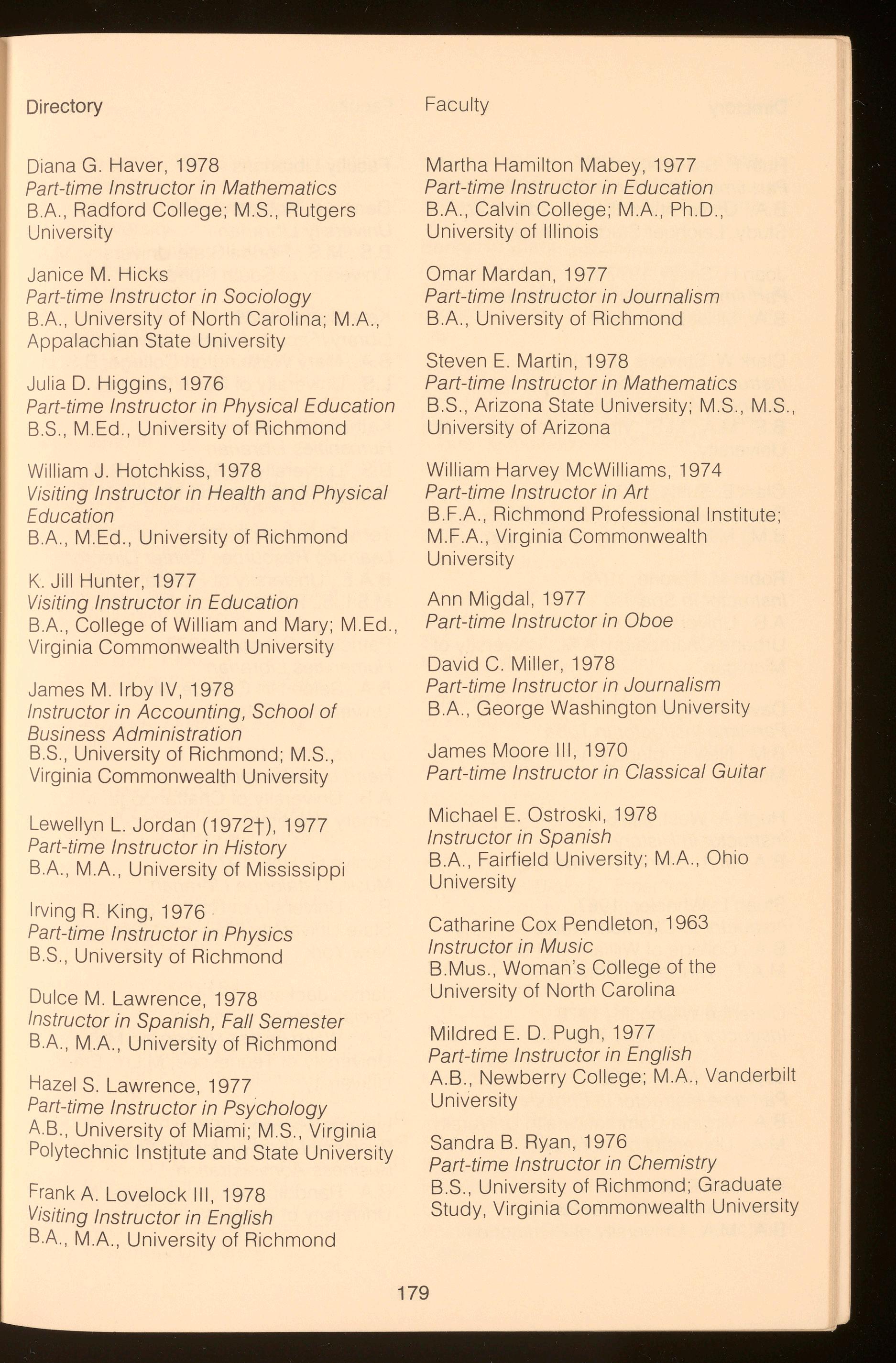
Directory
Diana G. Haver, 1978
Part-time Instructor in Mathematics
B.A., Radford College; M.S., Rutgers University
Janice M. Hicks
Part-time Instructor in Sociology
B.A., University of North Carolina; M.A., Appalachian State University
Julia D. Higgins, 1976
Part-time Instructor in Physical Education
B.S., M.Ed., University of Richmond
William J. Hotchkiss, 1978
Visiting Instructor in Health and Physical Education
B.A., M.Ed., University of Richmond
K. Jill Hunter, 1977
Visiting Instructor in Education
B.A., College of William and Mary; M.Ed., Virginia Commonwealth University
James M. Irby IV, 1978
Instructor in Accounting, School of Business Administration
B.S., University of Richmond; M.S., Virginia Commonwealth University
Lewellyn L. Jordan (1972t ), 1977
Part-time Instructor in History
B.A., M.A., University of Mississippi
Irving R. King, 1976 .
Part-time Instructor in Physics
B.S., University of Richmond
Dulce M. Lawrence, 1978
Instructor in Spanish, Fall Semester
B.A., M.A., University of Richmond
Hazels. Lawrence, 1977
Part-time Instructor in Psychology
A.B., University of Miami; M.S., Virginia Polytechnic lnstjtute and State University
Frank A. Lovelock 111, 1978
Visiting Instructor in English
B.A., M.A., University of Richmond
Faculty
Martha Hamilton Mabey, 1977
Part-time Instructor in Education
B.A., Calvin College; M.A., Ph.D., University of Illinois
Omar Mardan, 1977
Part-time Instructor in Journalism
B.A., University of Richmond
Steven E. Martin, 1978
Part-time Instructor in Mathematics
B.S., Arizona State University; M.S., M.S., University of Arizona
William Harvey McWilliams, 1974
Part-time Instructor in Art
B.F.A., Richmond Professional Institute;
M.F.A., Virginia Commonwealth University
Ann Migdal, 1977
Part-time Instructor in Oboe
David C. Miller, 1978
Part-time Instructor in Journalism
B.A., George Washington University
James Moore 111, 1970
Part-time Instructor in Classical Guitar
Michael E. Ostroski, 1978
Instructor in Spanish
B.A., Fairfield University; M.A., Ohio University
Catharine Cox Pendleton, 1963
Instructor in Music
B.Mus., Woman's College of the University of North Carolina
Mildred E. D. Pugh, 1977
Part-time Instructor in English
A.B., Newberry College; M.A., Vanderbilt University
Sandra B. Ryan, 1976
Part-time Instructor in Chemistry
B.S , University of Richmond; Graduate Study, Virginia Commonwealth University
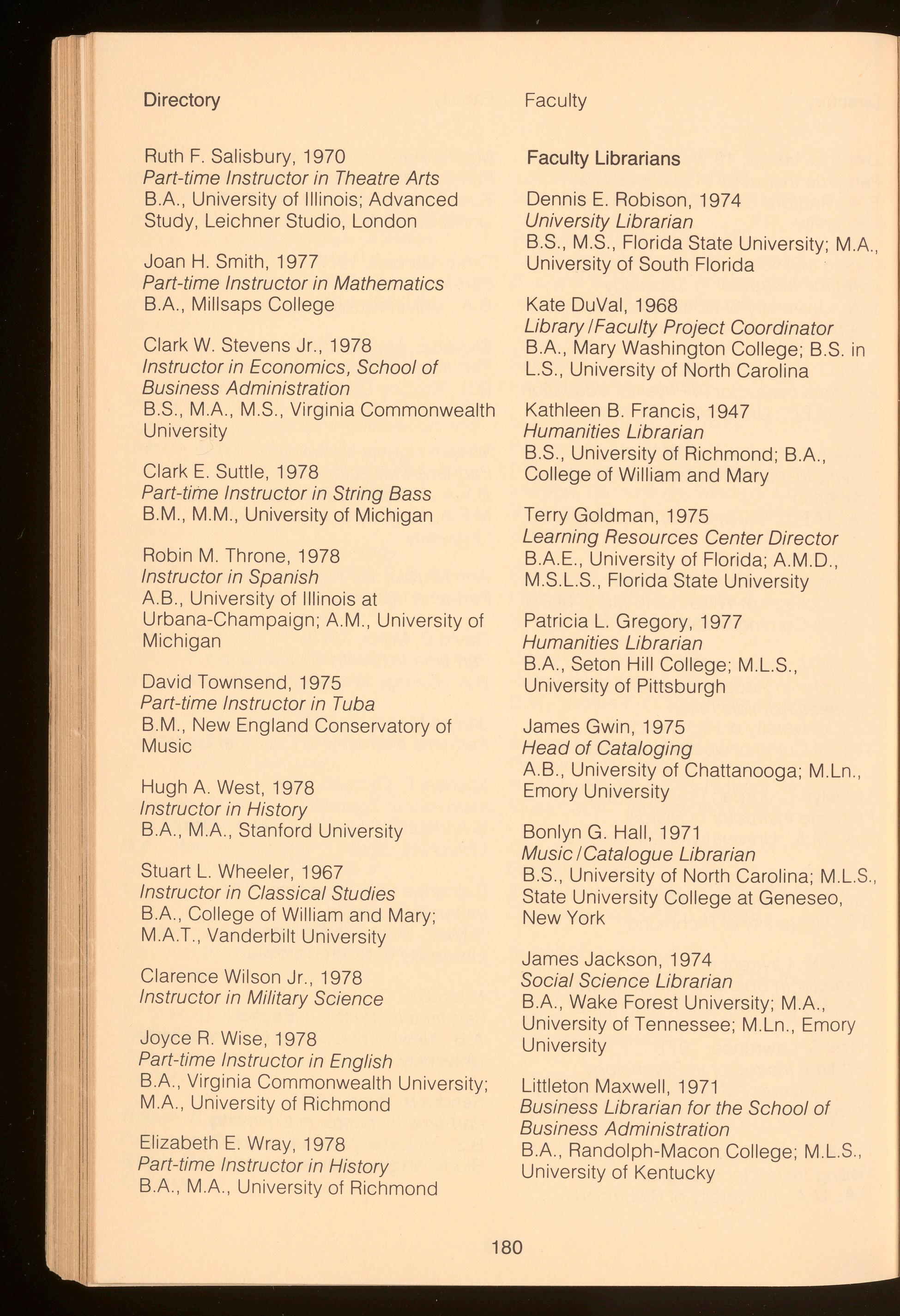
Directory
Ruth F. Salisbury , 1970
Part-time Instructor in Theatre Arts
B.A. , University of Illinois ; Advanced Study , Leichner Studio, London
Joan H Smith, 1977
Part-time Instructor in Mathematics
B.A. , Millsaps College
Clark W. Stevens Jr. , 1978
Instructor in Economics, School of Business Administration
B.S., M.A., M.S., Virginia Commonwealth University
Clark E. Suttle, 1978
Part-time Instructor in String Bass
B.M ., M.M , University of Michigan
Robin M. Throne, 1978
Instructor in Spanish
A.B., University of Illinois at Urbana-Champaign; A.M ., Univ ersity of Michigan
David Townsend, 1975
Part-time Instructor in Tuba
B .M., New England Conservatory of Music
Hugh A. West , 1978
Instructor in History
B.A. , M.A., Stanford University
Stuart L . Wheeler , 1967
Instructor in Classical Studies
B.A., College of William and Mary; M.A.T., Vanderbilt University
Clarence Wilson Jr ., 1978
Instructor in Military Science
Joyce R. Wise , 1978
Part-time Instructor in English
B.A. , Virginia Commonwealth University ; M.A. , Univer s ity of Richmond
Elizabeth E Wray, 1978
Part-time Instructor in History
B.A. , M.A. , Univ ersity of Richmond
Faculty
Faculty Librarians
Dennis E. Robison , 1974
University Librarian
B.S., M.S , Florida State University; M.A., University of South Florida
Kate DuVal, 1968
Library / Faculty Project Coordinator
B.A., Mary Washington College; B S in L.S., University of North Carolina
Kathleen B Francis, 1947
Humanities Librarian
B.S., University of Richmond; B.A., College of William and Mary
Terry Goldman, 1975
Learning Resources Center Director
B.A.E. , University of Florida ; A M.D , M .S.L.S., Florida State University
Patricia L. Gregory, 1977
Humanities Librarian
B.A., Seton Hill College ; M.L.S , University of Pittsburgh
James Gwin, 1975
Head of Cataloging
A.B ., University of Chattanooga; M.Ln. , Emory University
Bonlyn G. Hall , 1971
Music / Catalogue Librarian
B.S ., University of North Carolina; M .L .S., State University College at Geneseo , New York
James Jackson, 1974
Social Science Librarian
B.A., Wake Forest University; M.A. , University of Tennessee; M.Ln. , Emory University
Littleton Maxwell, 1971
Business Librarian for the School of Business Administration
B.A. , Randolph-Macon College; M .L .S., University of Kentucky

Directory
Katherine Smith, 1974
Sc ience Librarian
B.A., University of Richmond; M.S. , Drexel University
Lila E. Williams, 1970 Catalog Librarian
B.A., Bridgewater College; M.L.S., University of Pittsburgh FacultyEmeriti
Spencer Delancey Albright Jr., 1946 Professor of Political Science, Emeritus
B.A., University of Arkansas; A.M ., University of Chicago; University of Minnesota Graduate School; Institute of Inte rnational Law, University of Michigan; Ph.D., University of Texas
Catherine Bell, 1950 Registrar of Westhampton College , Emerita
B.A., University of Richmond; M.A., Duke University
Thomas Senior Berry , 1953 Professor of Economics, Emeritus
S.B., A.M., Ph.D ., Harvard University
Merton E Carver , 1935 Professor of Psychology, Emeritus
A.B ., M.A. , University of Rochester; Ph.D., Harvard University
Hannah Lide Coker, 1945 Music Librarian, Emerita B.A., University of Richmond; B.A. , Coker College; Graduate Student , University of Oklahoma and Eastman School of Music ; Pupil of Barre Hill, Marguerite Babaian in voice , and F Flaxington Harker, Cecile Genhart, Robert Casadesus in piano
Fanny Graves Crenshaw, 1914 Professor of Physical Education, Emerita B.A., Bryn Mawr College; Graduate Study, Columbia University
Faculty
Edward Wadsworth Gregory Jr., 1946
Professor of Sociology, Emeritus
B.A., M.A., Ph.D., University of Virginia
Benjamin Clark Holtzclaw, 1929 Professor of Philosophy, Emeritus
A.B., LL.D , Mercer University ; B.A. , M.A. , Oxford University; Ph.D., Cornell University
Joseph E Nettles, 1940
Alumni Secretary, Emeritus
Former Staff Writer, Associated Press; L.H.D ., University of Richmond
Frederick C . Neumann , 1955 Professor of Music , Emeritus Graduate of the Prague Conservatory ; Ph.D , University of Berlin ; M.A., Ph.D. , Columbia University
Edward F. Overton , 1946 Professor of Education, Emeritus
B.A., University of Richmond; M.A. , Ph.D., University of Virginia
Edward C. Peple, 1937 Professor of English, Emeritus
B.A., University of Richmond; A.M. , Ph.D. , Harvard University
Malcolm U. Pitt, 1928 Athletic Director, Emeritus
Nolan E. Rice , 1950 Professor of Biology, Emeritus
A.B ., University of Kentucky ; A.M. , Ph.D ., Duke University
Joseph Clarke Robert, 1961 Professor of History, Emeritus
A.B., LL.D., Furman University; A.M. , Ph.D , Duke University; Litt.D , Washington and Lee University ; L.H.D ., Medical College of Virginia
Marguerite Roberts , 1947 Professor of English, Emerita
B.A., University of Evansville ; M.A., Ph.D , Harvard University ; Cambridge University; University of Chicago; Postdoctoral Research Fellow, Radcliffe College
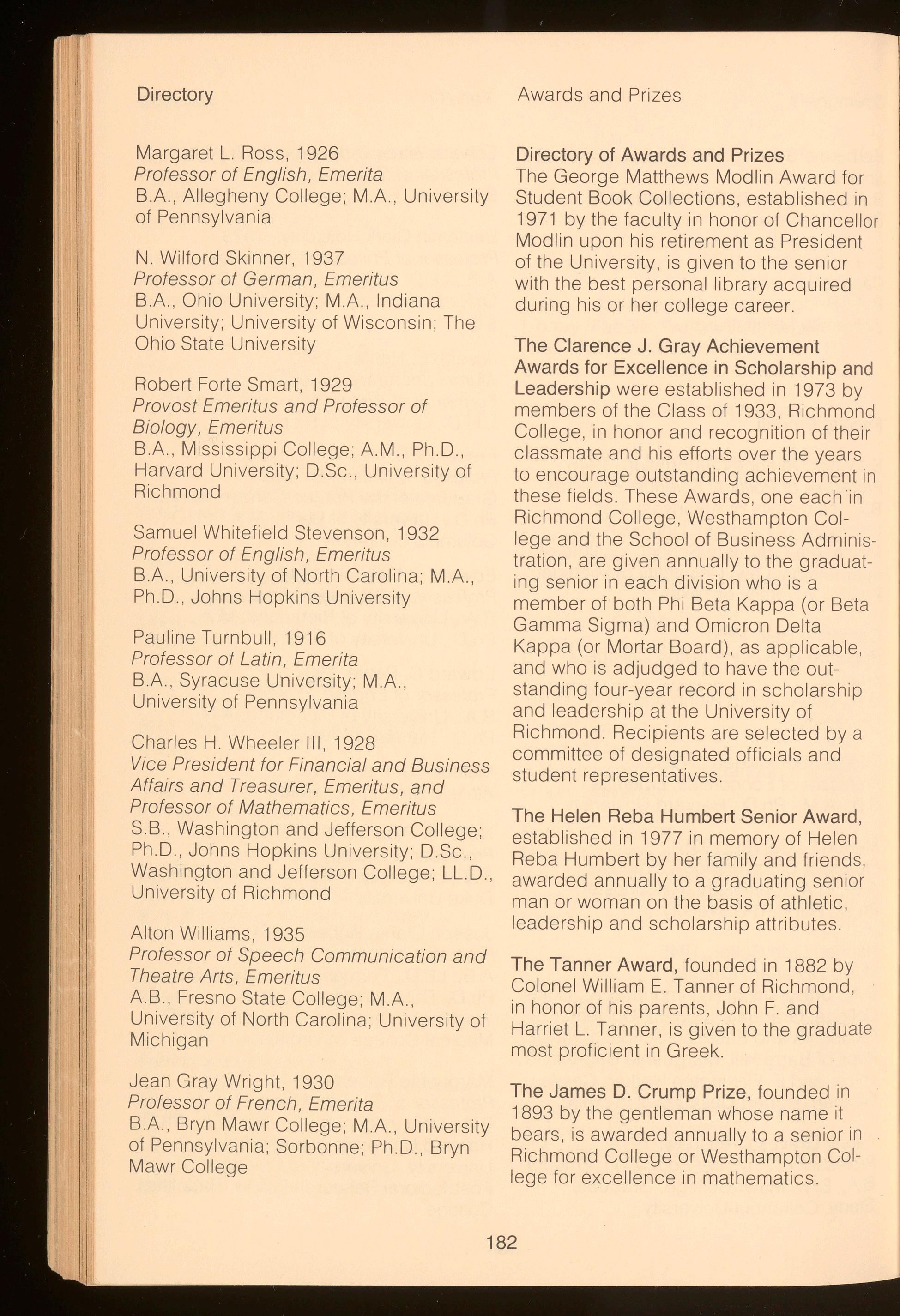
Directory
Margaret L. Ross , 1926
Professor of English , Emerita
BA , Allegheny College ; M.A. , University of Pennsylvania
N. Wilford Skinner , 1937
Professor of German , Emeritus
BA, Ohio University ; M.A., Indiana University ; University of Wisconsin ; The Ohio State University
Robert Forte Smart , 1929
Provost Emeritus and Professor of Biology, Emeritus
BA , Mississippi College; A.M. , Ph.D., Harvard University; D.Sc., University of Richmond
Samuel Whitefield Stevenson, 1932
Professor of English , Emeritus
BA , University of North Carolina ; M.A., Ph.D., Johns Hopkins University
Pauline Turnbull , 1916
Professor of Latin, Emerita
BA , Syracuse University; M.A., University of Pennsylvania
Charles H. Wheeler Ill , 1928
Vice President for Financial and Business Affairs and Treasurer, Emeritus, and Professor of Mathematics , Emeritus
SB. , Washington and Jefferson College ;
Ph.D. Johns Hopkins University ; D Sc. , Washington and Jefferson College; LL.D., University of Richmond
Alton Williams, 1935
Professor of Speech Communication and Theatre Arts, Emeritus
A.B ., Fresno State College ; M.A. , University of North Carolina ; University of Michigan
Jean Gray Wright , 1930
Professor of French, Emerita
BA , Bryn Mawr College ; M.A. , University of Pennsylvania ; Sorbonne ; Ph.D. , Bryn Mawr College
Awards and Prizes
Directory of Awards and Prizes
The George Matthews Modlin Award for Student Book Collections, established in 1971 by the faculty in honor of Chancellor Mod lin upon his retirement as President of the University, is given to the senior with the best personal library acquired during his or her college career.
The Clarence J . Gray Achievement Awards for Excellence in Scholarship and Leadership were established in 1973 by members of the Class of 1933 , Richmond College, in honor and recognition of their classmate and his efforts over the years to encourage outstanding achievement in these fields. These Awards , one each in Richmond College, Westhampton College and the School of Business Admini stration , are given annually to the graduating senior in each division who is a member of both Phi Beta Kappa (or Beta Gamma Sigma) and Omicron Delta Kappa (or Mortar Board), as applicable , and who is adjudged to have the outstanding four-year record in scholarship and leadership at the University of Richmond . Recipients are selected by a committee of designated officials and student representatives.
The Helen Reba Humbert Senior Award, established in 1977 in memory of Helen Reba Humbert by her family and friend s, awarded annually to a graduating senior man or woman on the basis of athletic , leadership and scholarship attributes.
The Tanner Award, founded in 1882 by Colonel William E. Tanner of Richmond , in honor of his parents , John F and Harriet L. Tanner , is given to the graduat e most proficient in Greek.
The James D. Crump Prize, founded in 1893 by the gentleman whose name it bears , is awarded annually to a senior in Richmond College or Westhampton College for exce llence in mathematics
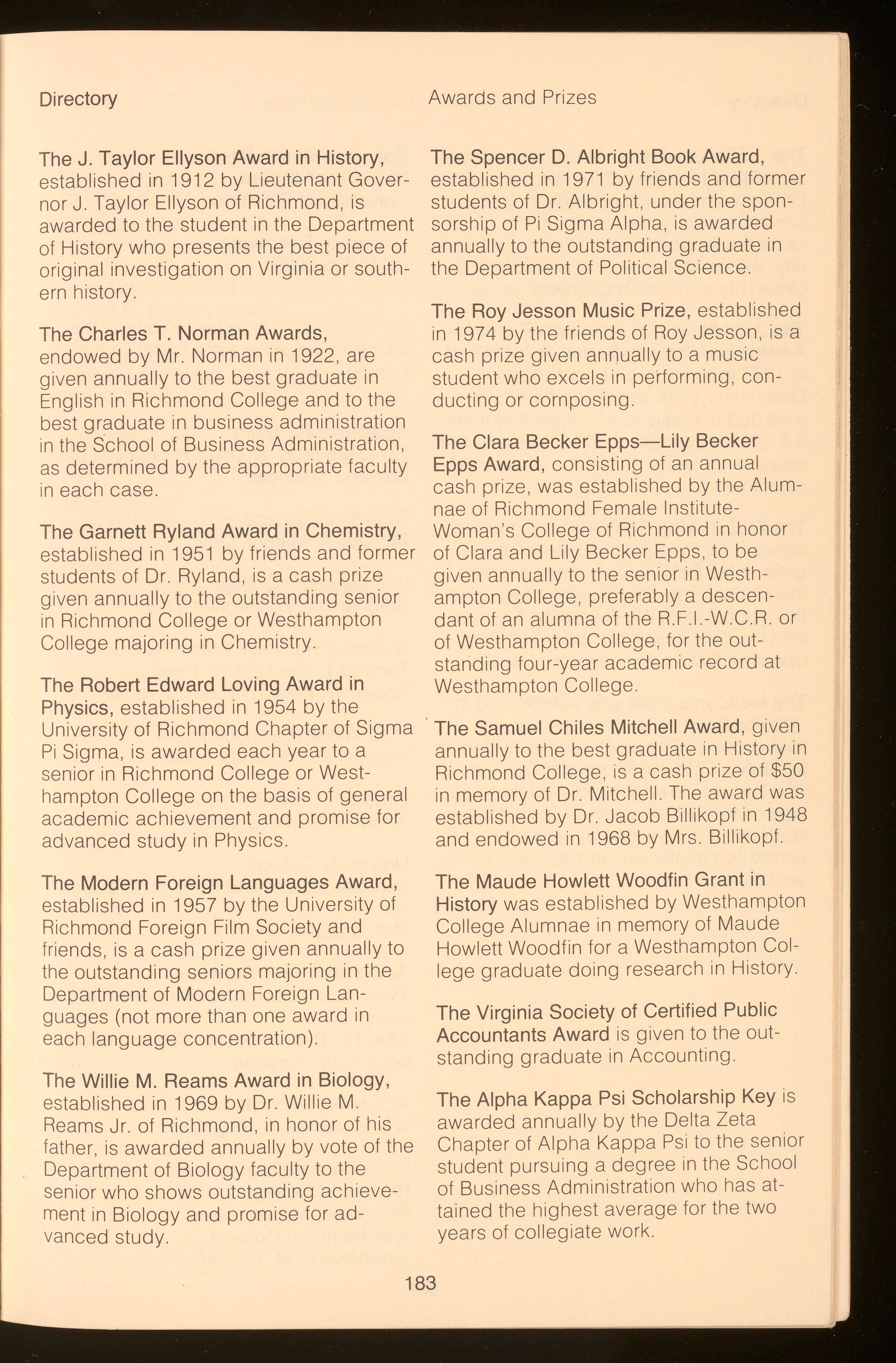
The J. Taylor Ellyson Award in History, established in 1912 by Lieutenant Governor J. Taylor Ellyson of Richmond, is awarded to the student in the Department of History who presents the best piece of original investigation on Virginia or southern history.
The Charles T. Norman Awards, endowed by Mr. Norman in 1922, are given annually to the best graduate in English in Richmond College and to the best graduate in business administration in the School of Business Administration, as determined by the appropriate faculty in each case.
The Garnett Ryland Award in Chemistry, established in 1951 by friends and former stude nts of Dr. Ryland, is a cash prize given annually to the outstanding senior in Richmond College or Westhampton College majoring in Chemistry.
The Robert Edward LovingAward in Physics,established in 1954 by the University of Richmond Chapter of Sigma Pi Sigma, is awarded each year to a sen ior in Richmond College or Westhampton College on the basis of general academic achievement and promise for advanced study in Physics.
The Modern Foreign Languages Award, established in 1957 by the University of Richmond Foreign Film Society and friends, is a cash prize given annually to the outstanding seniors majoring in the Department of Modern Foreign Languages (not more than one award in each language concentration).
The Willie M. Reams Award in Biology, established in 1969 by Dr. Willie M. Reams Jr. of Richmond, in honor of his father, is awarded annually by vote of the Department of Biology faculty to the senio r who shows outstanding achievement in Biology and promise for advance d study.
Awards and Prizes
The Spencer D. AlbrightBook Award, established in 1971 by friends and former students of Dr. Albright , under the sponsorship of Pi Sigma Alpha, is awarded annually to the outstanding graduate in the Department of Political Science.
The Roy Jesson Music Prize, established in 1974 by the friends of Roy Jesson, is a cash prize given annually to a music student who exce ls in performing, conducting or composing.
The Clara Becker Epps-Lily Becker Epps Award, consisting of an annual cash prize, was established by the Alumnae of Richmond Female InstituteWoman's College of Richmond in honor of Clara and Lily Becker Epps , to be given annually to the senior in Westhampton College, preferably a descendant of an alumna of the R.F.I.-W.C.R. or of Westhampton College, for the outstanding four-year academic record at Westhampton College.
The Samuel Chiles MitchellAward, given annually to the best graduate in History in Richmond College, is a cash prize of $50 in memory of Dr. Mitchell. The award was established by Dr. Jacob Billikopf in 1948 and endowed in 1968 by Mrs. Billikopf.
The Maude Howlett Woodfin Grant in Historywas established by Westhampton College Alumnae in memory of Maude Howlett Woodfin for a Westhampton College graduate doing research in History.
The Virginia Society of Certified Public AccountantsAward is given to the outstanding graduate in Accounting.
The Alpha Kappa Psi ScholarshipKey is awarded annually by the Delta Zeta Chapter of Alpha Kappa Psi to the senior student pursuing a degree in the School of Business Administration who has attained the highest average for the two years of collegiate work
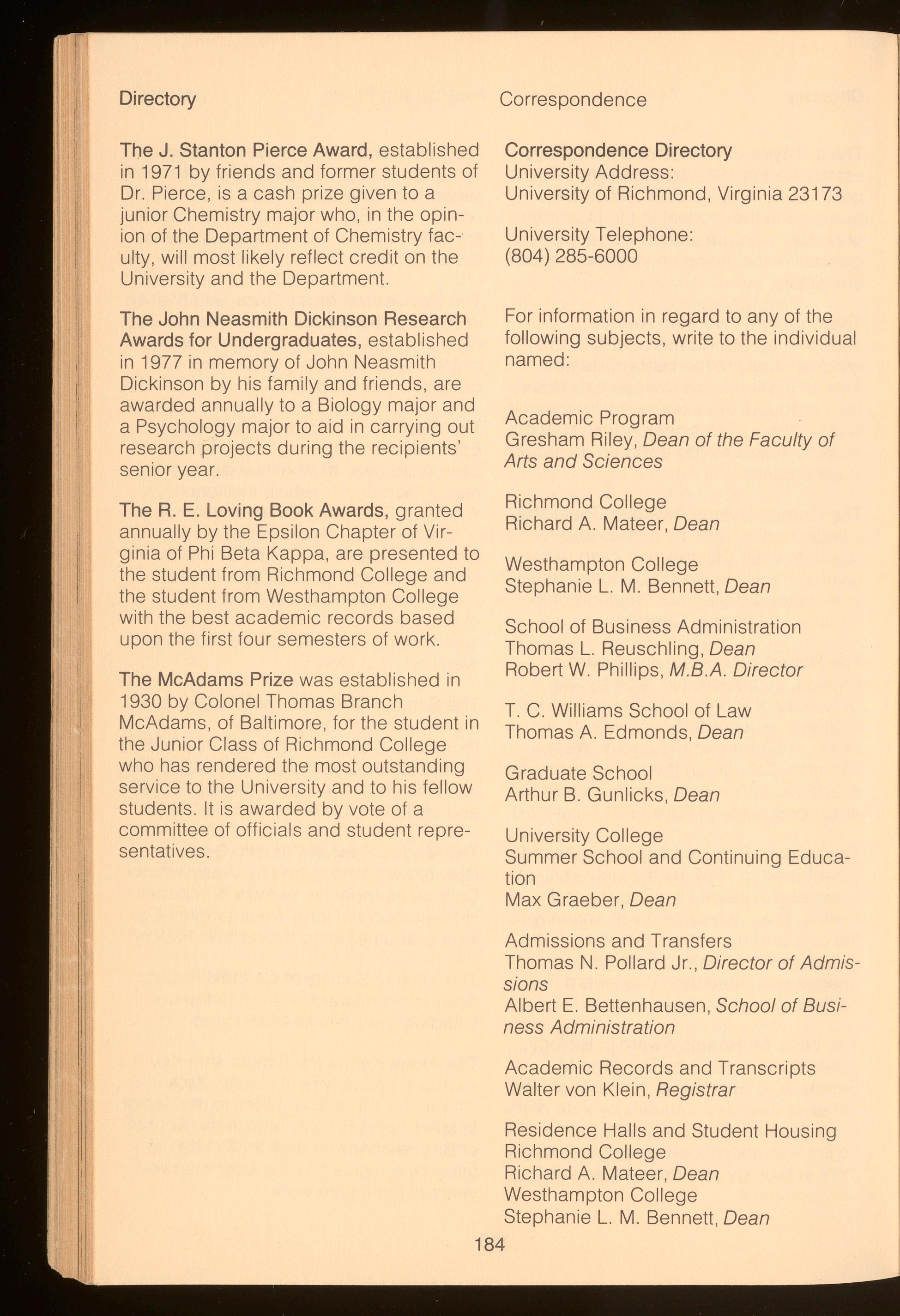
Directory
The J. Stanton Pierce Award, established in 1971 by friends and former students of Dr. Pierce, is a cash prize given to a junior Chemistry major who, in the opinion of the Department of Chemistry faculty, will most likely reflect credit on the University and the Department.
The John Neasmith DickinsonResearch Awards for Undergraduates,established in 1977 in memory of John Neasmith Dickinson by his family and friends, are awarded annually to a Biology major and a Psychology major to aid in carrying out research projects during the recipients' senior year.
The R. E. Loving Book Awards, granted annually by the Epsilon Chapter of Virginia of Phi Beta Kappa, are presented to the student from Richmond College and the student from Westhampton College with the best academic records based upon the first four semesters of work.
The McAdams Prize was established in 1930 by Colonel Thomas Branch McAdams, of Baltimore, for the student in the Junior Class of Richmond College who has rendered the most outstanding service to the University and to his fellow students. It is awarded by vote of a committee of officials and student representatives.
Correspondence
CorrespondenceDirectory
University Address:
University of Richmond, Virginia 23173
University Telephone : (804) 285-6000
For information in regard to any of the following subjects , write to the individual named:
Academic Program
Gresham Riley, Dean of the Faculty of Arts and Sciences
Richmond College
Richard A. Mateer, Dean
Westhampton College
Stephanie L. M. Bennett, Dean
School of Business Administration
Thomas L. Reuschling, Dean
Robert W. Phillips, MB.A. Director
T. C. Williams School of Law
Thomas A. Edmonds, Dean
Graduate School
Arthur B. Gunlicks, Dean
University College
Summer School and Continuing Education
Max Graeber, Dean
Admissions and Transfers
Thomas N. Pollard Jr., Director of Admissions
Albert E Bettenhausen, School of Business Administration
Academic Records and Transcripts
Walter von Klein , Registrar
Residence Halls and Student Housing
Richmond College
Richard A. Mateer, Dean
Westhampton College
Stephanie L. M. Bennett, Dean
184

Directory
Financial Aid
Allen W. Fredd Jr , Director
Fees and Business Matters
Marvin E. Miller, Bursar
Ca reer Planning and Placement
Joanne C . Patton , Director
Student Affairs
William H Leftwich , Vice President for Student Affairs
Health Services
Robert B. McEntee, M.D.
Religious Life
David D Burhans , Chaplain
Athletics
Charles S. Boone , Director of Athletics
Correspondence
Gifts or Bequests
H. Gerald Quigg , Vice President for University Relations
Public Relations and Publications
H. Gerald Quigg, Vice President for University Relations
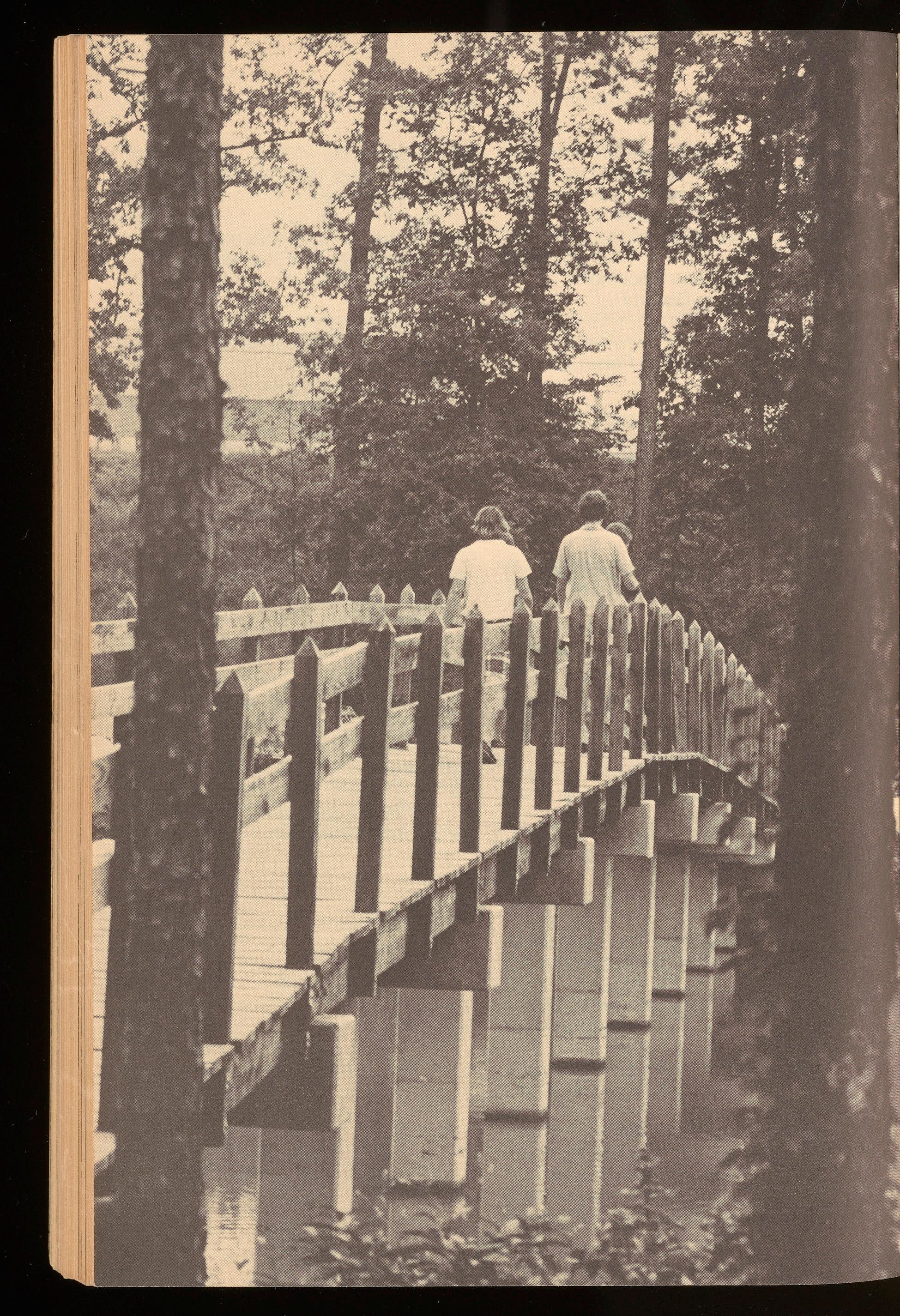
Academic Calendar, 1979-80

First Semester
August 25, Saturday
August 28, Tuesday
August 29, Wednesday
August 30, Thursday
October 5, Friday
October 18, Thursday
October 23, Tuesday
November 21, Wednesday
November 26, Monday
December 11, Tuesday
December 19, Wednesday
December 20, Thursday
RC*-WC* New students arrive
Orientation program begins.
RC*-WC* returning students arrive.
SBA* New students arrive.
Registration of all students.
Classes begin, 8:15 a.m.
Last day to file for May or August graduation.
Last day of classes prior to Fall study period
Residence halls remain open.
Classes resume, 8:15 a.m.
Thanksgiving holiday begins at 12:30 p.m.
Classes resume, 8:15 a.m.
Examination period begins.
Examination period ends.
Residence halls close at 9 30 a.m.
Second Semester
January 13, Sunday
January 13, Sunday
January 14, Monday
February 1, Friday
March 7, Friday
March 8, Saturday
March 16, Sunday
March 17, Monday
April 24, Thursday
April 25, Friday
May 3, Saturday
May 11, Sunday
Residence halls open at 2:00 p.m.
RC*-WC* registration of new students, 2 003:00 p .m.
Classes begin, 8:15 a.m.
Last day to file for May or August graduation, if not filed earlier.
Spring vacation begins, 5:30 p.m.
Residence halls close at 9:30 a.m.
Residence halls open at 2 00 p.m.
Classes resume, 8:15 a.m.
Classes end.
Examination period begins.
Examination period ends.
Baccalaureate Service and Commencement Exercise.
Please see also the detailed academic calendar published by the Office of the University Registrar.
*RC-Richmond College: WC-Westhampton College: SBA-School of Business Administration 187
Academic Calendar, 187
Academic Life, 11-29
Academic Orientation, 58
Academic Probation: RC& WC, 62 SBA, 145
Academic Procedures, 59-61
Academic Skills Program, 16
Academic Standing, 61-63
Academic Warning: RC & WC, 62
' Academics: RC & WC, 54-63
SBA, 141-150
Accounting, 28, 145-146 Accreditation, 50, 141 Administrative Officers, 165 Admission Policy, 46, 151
Admissions Requirements: RC & WC, 51,151
SBA, 141
Admissions Deadline, 46, 51,151
Advanced Credit for Veterans, 154 Advanced Placement, 47 Advisors, 16, 41
Alcoholic Beverages, 40, 155
American Studies, 17, 65 Applied Music, 25, 120-121 Area Studies, 17, 58, 65-69 Art, 17, 69-71
Art History, 17, 69-70
Art, Studio, 17, 70-71
Arts Groups, 37
Assemblies, Required, 54, 63, 143 Astronomy, 71-72
Athletics, 37-39, 51
Individual physical conditioning, 39 Intercollegiate, 39, 99-100
Intramural and Club, 39 Physical education, 39 Attendance, Class: RC & WC, 63 SBA, 145
Auditing Courses: RC & WC, 60 Automobiles, 40, 157 Awards and Prizes, 182-184
B. A., Requirements, for 55-56
B.M., Requirements, for, 56-57
B.S., Requirements, for, 56
B.S., in Business Administration (SBA) 143-144 Bands, University, 120 Biology, 18, 72-74
Black History Week, 36 Board of Trustees, 163-164 Botany (see Biology)
Brass Instruments, 121 , Business Administration Courses, 148-149 Business Administration, School of, 4, 141-150
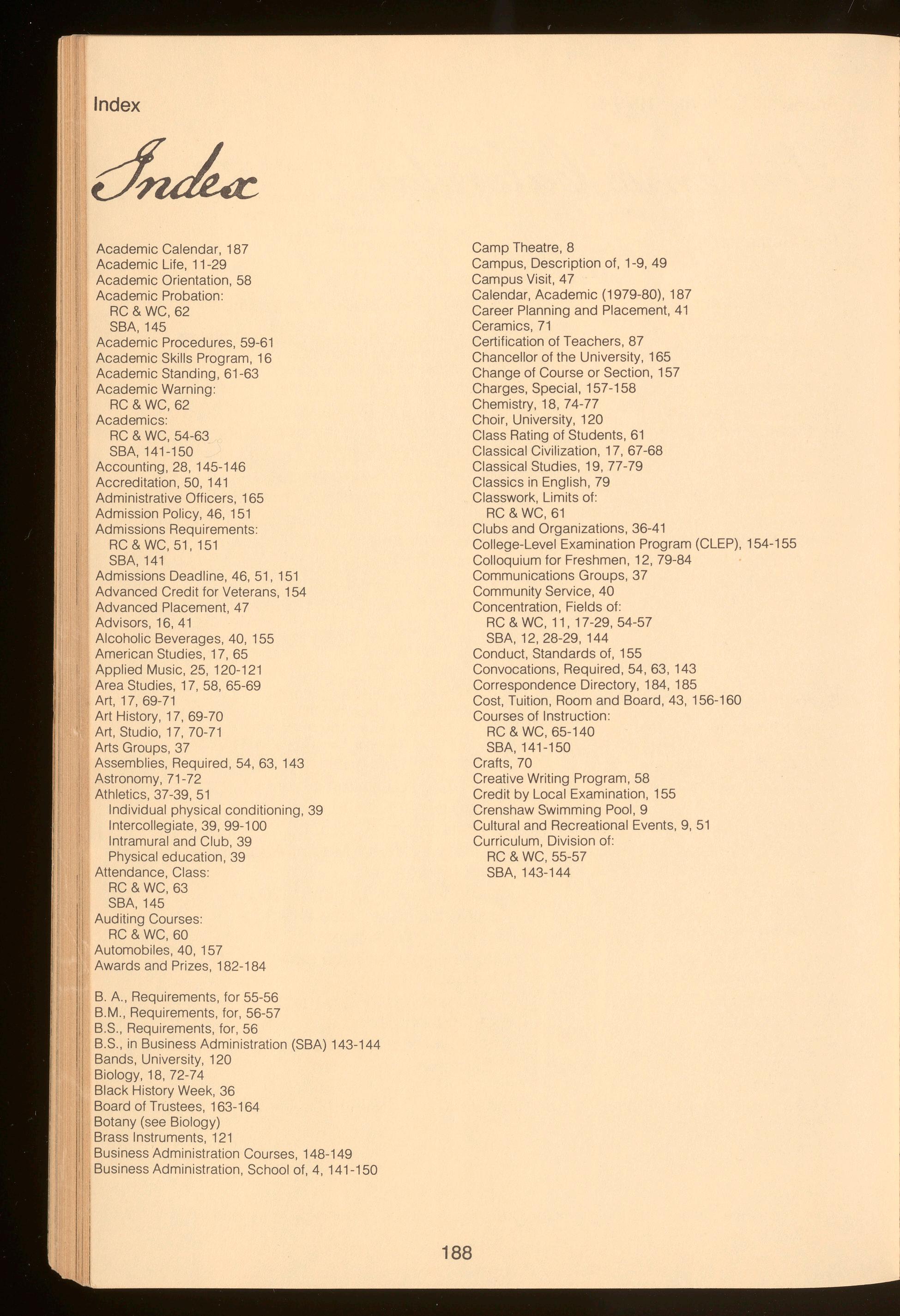
Camp Theatre, 8 Campus, Description of, 1-9, 49 Campus Visit, 47 Calendar, Academic (1979-80), 187 Career Planning and Placement, 41 Ceramics, 71 Certification of Teachers, 87 Chancellor of the University, 165 Change of Course or Section, 157 Charges, Special, 157-158 Chemistry, 18, 74-77 Choir, University, 120 Class Rating of Students, 61 Classical Civilization, 17, 67-68 Classical Studies, 19, 77-79 Classics in English, 79 Classwork, Limits of: RC & WC, 61 Clubs and Organizations, 36-41 College-Level Examination Program (CLEP), 154-155 Colloquium for Freshmen, 12, 79-84 Communications Groups, 37 Community Service, 40 Concentration, Fields of: RC & WC, 11, 17-29, 54-57 SBA, 12, 28-29, 144 Conduct, Standards of, 155 Convocations, Required, 54, 63, 143 Correspondence Directory, 184, 185 Cost, Tuition, Room and Board, 43, 156-160 Courses of Instruction: RC & WC, 65-140 SBA, 141-150 Crafts, 70 Creative Writing Program, 58 Credit by Local Examination, 155 Crenshaw Swimming Pool, 9 Cultural and Recreational Events, 9, 51 Curriculum, Division of: RC & WC, 55-57 SBA, 143-144
Index
Dance, 140 Dean's List, 61 Debating, 139 Deferred Payments, 158 Deficiencies:
RC & WC, 62-63
SBA, 145 Degrees: 3-5, 49
RC & WC, 54-57
SBA, 141-144
Degree Credit for Professional Studies, 57 Degree Requirements: RC & WC, 54-57
SBA, 141-144 Degree with Honors, 62 Directorie s, 163-185
Distributional Requirements:
RC & WC, 56
SBA, 143-144 Drugs, 40, 155
DuPontFund,9 Dutch Chaos Week, 36
Early Admission, 47, 153 Early Decision Plan, 46, 153 Economics:
RC & WC, 19, 84
SBA, 28, 146-147 Education, 20, 84-90 Employment, Student, 44-45, 162 English, 20, 90-95 Ensembles, Music, 119, 120 Examinations:
RC& WC, 61 Expenses, 43, 156-160
Faculty Advisors, 16
Faculty, Description of, 31-33, 50 Faculty , Listing of : Active (1978-79), 165-181 Emeriti, 181-182
SBA, 149-150, 165-181 Film (see American Studies, Art, English, Religion) Finance, 28, 147 Financial Aid, Student, 43-46, 52, 160-162 Foreign Languages, Modern, 24, 110-115 Fraternities, Social, 37, 50 French, 110-111
General Assembly Internship, 14
General Information : (see Profile of UR), 49-52
General Information: SBA, 141 Geography, 95 German, 111-113
Grade Points, 54
Grading Policies:
RC & WC, 59-60 Graduate School, 4-5 Graduate School , 4-5 Grants, 43, 161 Graphic Arts, 71 Greek, 77-78 Greek Week, 36

Health and Physical Education, 21, 95-100 History , 22, 100-104 Honor Societies and Organizations, 36 Honor System, Richmond College, 151 Honors, Degree, 62 Honors , Intermediate, 62 Honors Program : RC & WC, 12, 58
Independent Study, 12, 22, 58, 104-105 Infirmary , 41 Interd isciplina ry Studies, 12, 22, 58, 104-105 Intermediate Honors, 62 Italian , 113
Jobs,43, 162 Journalism, 22, 105-106
Late Registration Fee, 157 Latin, 78
Law , T.C. Williams School of, 4 Learning Resources Center, Billikopf, 7, 58 Librarians, 180-181 Libraries, 7, 50 Limits of Work: RC & WC, 61 Loans , 44,46-47, 161-162 Lutz Puppet Collection, 8
Management Systems, 28, 147-148
Marsh Gallery, 8 Marketing, 29, 148 Mathematics, 23, 106-109 Meal Plans, 156-157 Men's Residence Halls, 160 Milit~ry Science, 23, 109-11O Miscellaneous Instruments, 121 Modern Foreign Language s, 24, 110-115 Modern Languages, 113-114 Modlin Fine Arts Center, 8 Motor Vehicles, 40, 157 Music, 24, 115-121 Music, General Concentration, 116-117 Music Education, 117-118
Music History, Literature and Appreciation, 118-119 Music Library, 7 Music Theory, 119 Musical Organizations, 36, 119-120
Orchestra, University, 119 Organ, 120 Organizations, 36-41, 50
Index
Painting, 70-71
Pass-Fail Option , 60 Payment , Terms of , 156-160
Philosophy, 25, 122-124
Physical Education, Health and, 95-100
Physics, 25, 124-126
Piano, 120
Pitt Baseball Field, 8
Placement, Teacher, 88
Political Science , 26, 126-128
Practical Experience, off-campus , 14-15
Privacy , Right to , 155 Prizes, Awards and, 182-184
Probation , Academic , 62-63 , 145
Professional Studies, Degree Credit for , 57
Proficiency Requirements : RC & WC, 54 -57
Profile of UR, 49-52
Programs, Special, 11-16 , 50, 57-59
Psychology, 26, 129-131
Psychological Services, Center for, 41 Purpose of the University, 1
Recreational Organizations, 37 Registration, (see Academic Calendar)
Religion, 27 , 132-134
Religious Activities , 37
Religious Organizations, 37, 51
Research Program, Undergraduate, 13
Residence Halls, 35, 159-160
Richmond, City of , 9
Richmond College , 3 Right to Privacy , 155
Robins Gallery of Design from Nature , Lora, 7 Robins Center, 8 Room Reservations, 159 Russian, 114 Russian Area Studies , 17, 68
Scholarships, 43-46, 160-161
School of Business Administration: Accreditation , 141
Admission Requirements , 141-142 Areas of Concentration, 144-145
Courses of Instruction, 145-149
Degree Requirements, 143-144
Description of , 4 Faculty, 121-122
General Information, 141-145
Science Center, 7 Science Library, 7
Sculpture , 70-71
Semester Reports , 61
Sociology, 27, 134-138
Spanish, 114-115
Special Charges , 157-158
Special Examinations , 61
Special Program s , 11-16 , 57-59
Speech Communications and Theatre Arts , 27-28, 138-40
Standards of Conduct, 155
String Instruments, 121
Student Employment , 44-45 , 162
Student Financial Aid, 43-46 , 160-162
Student Government, 40, 51

Student Life , 35-41
Athletics , 37-39
Clubs & Organizations, 36-41 Community Service, 40 Government, 40
Honor Societies, 36-37
Student Services , 41
Student Union , University 35
Studio Art , 17, 70-71
Study Abroad, 15, 59
Teacher Education, Admis sions to, 86-87
Teacher Placement Service, 88
Teacher Preparation , 85
Teachers, Certification of, 85
Television (see American Studies , English, Religion)
Terms of Payment , 156-160
Theatre Arts, Speech Communication and , 27-28 , 138-140
Transfer Students, 153
Travel Experiences , 15, 59
Trustees, Board of, 163-164
Tucker-Boatwright Festival, 36
Undergraduate Research Program , 13
University Bands , 37 , 120
University Choir, 37 , 120
University College , 5
University Common s, 7
University Debate Team, 139 University Orchestra, 119 University of Richmond, History, 1-3 Profile, 49-52 Purpose , 1
Urban Studies, 17, 68-69
Veteran , Advanced Credit for , 154
Virginia Baptist Historical Society, 50 Voice , 120-121
Warning, Academic: RC & WC , 62
Westhampton College, 3
Withdrawal from College, 158
Women 's Lifestyles Conference , 36
Women's Residence Halls, 159
Woodwind Instruments, 121
Work-Study Program , 46 , 162
Work Taken Elsewhere , 59
Zoology (see Biology)
Indexto Buildings

·President 's Home
1. Bus Terminal
2 UR Bus Stop
3. C lass of 1915 Gateway
4 The T C Williams School of Law
Established in 1870 and named for Thomas C Williams Sr , trustee of Richmond College from 1881 to 1889 , the present building was constructed in 1954 and enlarged in 1972
5 School of Business Administration
Housing " one of the finest undergraduate business schools in the country ," this building was made possible by a substantial bequest of L. U Noland, a Newport News businessman, and was completed in 1961
6 Dennis Auditorium
This 450 -seat auditorium, located in the School of Business Administration , is named for Overton D Dennis , a member of the Richmond College class of 191O and a university trustee , 1937- 1971
7 Robert Ryland Hall
Named for the only president of the Virginia Baptist Seminary , 1832-1840 , and the first president of Richmond College , 1840- 1866 , this classroom and faculty office facility was constructed in 1914, along with its companion building , Charles H Ryland Hall.
8 . Charles H Ryland Hall
Con structed in 1914 as a companion to Robert Ryland Hall, this building housed the University Library from 1914 until 1955 , when the Boatwright Memorial Library was constructed II is named for Charles Hill Ryland , a nephew of Robert Ryland and a trustee of Richmond College, 1873-1914, treasurer of Richmond College , 1874-1911 , and librarian of Richmond College, 1883-1914
9. Maryland Hall
Built in 1932 and named for its generous donors, the Maryland Baptists, it housed the biology department until completion of the Science Center in 1977 After extensive renovation , it now houses the university 's administrative offices, including the president's suite , admissions, financ ial aid and alumni / ae offices
10. Richmond Hall
Named for the City of Richmond whose citizens provided generous gifts toward its construction in 1930, it housed the physics department until completion of the Science Center in 1977. This building , recently renovated , now houses the psychology department , the Center for Psychological Services, University College, career planning and placement , the Women 's Resource Center , the payments office and classrooms
11. Puryear Hall
Completed in 1926 , it was the first unit erected in what was once considered the Science Quadrangle II housed the chemistry department until the completion of the Science Ce nter in 1977 Recently renovated , it now ho use s classrooms and facult y offices for the departments of modern foreign languages , sociology and mathematics
12. Boatwright Memorial Library
A memorial to Frederic W Boatwright, the third president of the university, 1895-1946 , and chancellor , 1946-1951 , this library was built in 1955 with funds given by the Baptists of Virginia The addition, completed in 1976 , provides space for over 500 ,000 volumes and includes an extensive collection of rare books Multimedia facilities in the Jacob Billikopf Learning Resources Center include a 1OD-seat auditorium , graphics and photography studios , and individual study carrels wired for film and cassette tape modules On the lower level the Lora Robins Gallery of Design from Nature displays shells , fossils , gems and minerals
13. Virginia Baptist Historical Society
This wing of the Boatwright Memorial Library is the repository for the archives of the Baptists of Virginia and includes more than 1,500 manuscript volumes of early church records Considerable work toward preserving and cataloguing the materials was done by Dr Garnett Ryland , secretary of the socie ty from 1940 to 1954 and professor of chemistry , 19151945
14. Old Student Center
Built in 1951 , the former center for Richmond College student activities now houses campus security , Army ROTC and political science faculty offices
15. University Post Office
16 Mitchell - Metcalf Memorial Sundial
Dedicated in 1954, the sundial was given by Mrs John Calvin Metcalf in memory of her husband, professor of English at Richmond College, 19041917 anditsfirstdean , 1914-1917, and his friend Dr Samuel Chiles Mitchell, professor of history at the university , 1895-1945
17 Barracks
Built in 1946 as emergency housing for World War 11veterans , this building temporarily houses the lnslitute for Business and Community Development and the university 's print shop
18. Brunet Memorial Hall
One of the original buildings on the. campus, with additions completed In 1943 and 1964, this structure houses university dining facilities It is named for a university benefactor , Mrs Sarah A Brunet of Norfolk
19 Tennis Courts
20. Athletic Field
The first metric track built in the United States , an all-weather Chevron 440 , surrounds the field and is one of the finest in the country
21 Mo dular Units
This is a cluster of small residence hall units
22-23 Fraternity Lodges
There are 11 national Greek-letter soc ial fraternities , which maintain nonresident lodges
24 The Robin s Center
One of the best-equipped athletic facilities in the country, this $10million center was a gift of alumnus and trustee E Claiborne Robins and his family , who also donated $50 million to the university in 1969 Completed in 1972 , it includes a 10,000seat basketball arena, swimming pool , wrestling room , olympic weight room, two e xercise rooms complete with gymnastic equipment , seven handball courts , two squash courts, two au xiliary gymnasiums, steam and sauna baths , dressing rooms with separate locker area for each varsity sport , classrooms , physiology laboratory , offices, conference rooms and a 130-seat theatre
25 Robins Center Swimming Pool
This facility includes a six-lane swimming pool with automatic-timing system and sealing for 500 spectators
26 Millhiser Memorial Gymnasium
Constructed in 1921 with funds given by Mr and Mrs Clarence Millhiser in memory of their son , Roger , a former student at Richmond College , this building houses the registrar's office and the computer center
27 Infirmary
28 Robins Memorial Hall
Built in 1959 , this men's residence hall is the gift of E Claiborne Robins, class of 1931, in memory of his mother, Martha Elizabeth Robins The dean of Richmond College has offices in this building.
29. Jeter Memorial Hall
This residence hall for men is one of the original buildings constructed in 1914 It is a memorial to Jeremiah Bell Jeter , celebrated Baptist minister and a charter trustee of Richmond College , 1840-1880
Index to Buildings
30. Dennis Memorial Hall 43
Completed in 1964, this men ' s residence hall is the gift of Overton D Dennis, a member of the class of 1910, in memory of his brother, Eugene T. Dennis.
31. Freeman Hall
A men's residence hall built in 1965, it is named for Douglas Southall Freeman , class of 1904 and former editor of the Richmond News Leader, who served as a trustee of the university, 1925-1950, and as rector, 1934-1950
32. Thomas Memorial Hall
One of the original buildings, this residence hall for men is named for 44 James Thomas Jr , a Richmond to- 45. bacconist and eminent Baptist layman, who was a charter trustee of Richmond College, 1804-1882
33. Wood Memorial Hall
A substantial grant for this men's residence hall, constructed in 1956 , was given by the First Baptist Church Endowment Fund of Richmond in memory of Mrs Bettie Davis Wood
34. Moore Memorial Hall
Built in 1969, this men's residence hall is named for T. Justin Moore, a 1908 graduate of the university, who served as a trustee, 19315-1958,and as rector, 1951-1958.
35. Marsh Hall 46.
Completed in 1973 , this men 's residence hall is named in honor of Robert T Marsh Jr., a 1921 graduate of the university, who became a trustee in 1953 and served as rector, 1958-1973.
36. Pitt Baseball Field
The field is named for Coach Malcolm U. Pitt, a member of the class of 1915, baseball coach, 1928-1971, and director of athletics, 1944-1967
47 .
37. University Commons Spanning University Lake, this new 48. student activities center includes lounges for exhibits and studying, arts and crafts studio, dining facilities (Dry Dock) , bookstore , the chaplain 's 49 . office , game rooms, meeting rooms and student organization offices
38. Cannon Memorial Chapel
Constructed in 1929, the chapel was donated by the widow of Henry Mansfield Cannon, a Richmond tobacconist. It contains a Baroque tracker-action pipe organ built by Rudolf von Beckerath in 1961 , the second to be installed in the United 50. States
39. Power Plant
40. Maintenance Area
41. Quonset Hut
42. Physical Plant

Science Center
Completed in 1977 , this $8-million complex houses the biology, chemistry and physics departments , along with components of the Virginia lnstilute for Scientific Research (VISA)
The science library, two small auditoriums, 27 teaching laboratories with adjoining preparation and instrument rooms, 26 student-faculty research laboratories, a radionuclide lab, greenhou·se, animal facilities, computer terminal room, seminar rooms , student-faculty lounges and faculty and graduate student offices are included
Deanery
Modlin Fine Arts Center
This facility , named for Chancellor George M Modlin, president of the university, 1946-1971, is the center for art , drama and music Completed in 1968, it includes a theatre, painting, sculpture and ceramic studios ,"a music-listening library , rehearsal areas for orchestra and vocal groups, 20 music-practice rooms and teaching studios. Exhibited in the center are the Lutz Puppet Collection and an extensive collection of American pressed-glass goblets. The Marsh Gallery displays the work of contemporary artists
Camp Memorial Theater
Located in the Modlin Fine Arts Center, this 700-seat theatre is named for James L. Camp, a trustee of the university, 1900-1926 , and given in his memory by his six children
Crenshaw Swimming Pool
Built in 1963 , this facility for Westhampton College students honors Fanny G Crenshaw, the first director of physical education at Westhampton College, 1914-1955
Shepherd Memo rial Garden
This garden was given by Sally Gray Shepherd Perkins in 1937 in memory of her mother , Willie Gray Shepherd Keller Hall
Constructed in 1937 , the building is named for May Lansfield Keller , the first dean of Westhampton College, 1914-1946 , and professor of English. The center for physical education activities for Westhampton students , it is also a residence hall for undergraduate women and includes the Keller Hall Reception Room
Booker Fountain
Hannah Lide Coker, a 1923 graduate of Westhampton College, assistant professorof music, 1945 - 1971, and music librarian, 1955-1971 , donated this fountain in 1973 to honor Le s lie
Sessoms Booker, a 1922 graduate of Westhampton College, who served as ex ecutive secretary of the Westhampt o n College Alumnae Associalion , 1943-1968
South Court
This residence hall for women was constructed in 1948
Westhampton Classrooms and Offices
Westhampton Main Dining Hall
54 Westhampton Court Dining Hall
55. North Court
Constructed in 1914, this women's residence hall is one of the original buildings on the Westhampton campus Four residence sections are grouped around a large English court, with a classroom section connected by a tower and cloisters The Graduate School and the dean of Westhampton College have offices in this facility
56. Gray Court
Completed in 1974, this women's residence hall was given in memory of Agnes Taylor Gray, a 1923 graduate of Westhampton College, by her husband, Virginia Senator Garland Gray, a 1921 graduate of Richmond College and a trustee of the university from 1949 to 1977.
57. Jenkins Greek Theater
This amphitheater was built in 1929 with funds given by Luther H Jenkins, a prominent Richmond businessman and Baptist layman
58. Westhampton Tennis Courts
59. Footbridge to Island and Gazebo
Note : The Lo ra Robin s C ourt, lo c ated acr oss the str eet from the Dea ne ry (N o. 44 ), is under co ns truc tio n fo r occ upan cy
A ugu st 1979 The resi d e nce hal l will ho use 250 wo me n
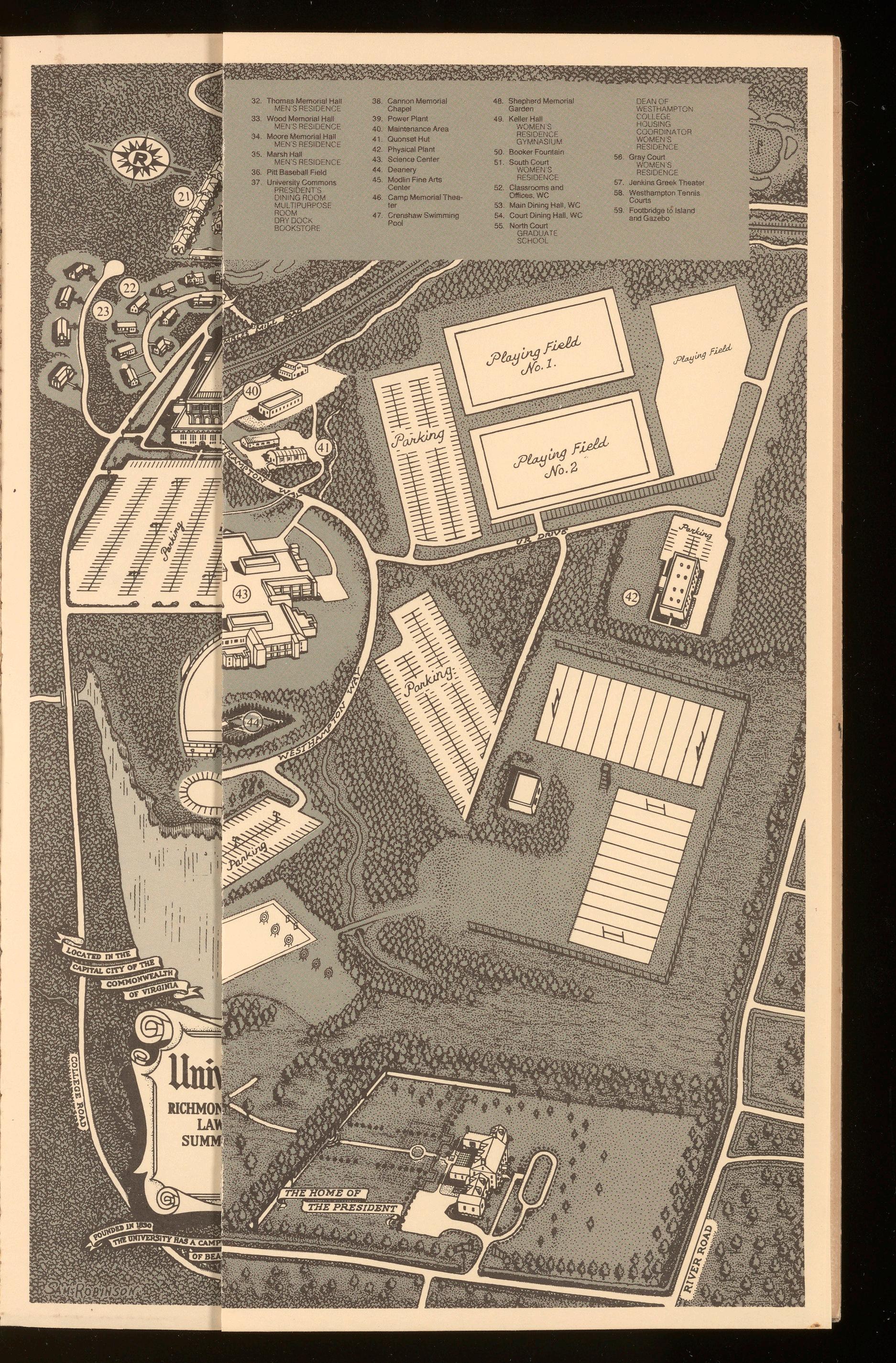
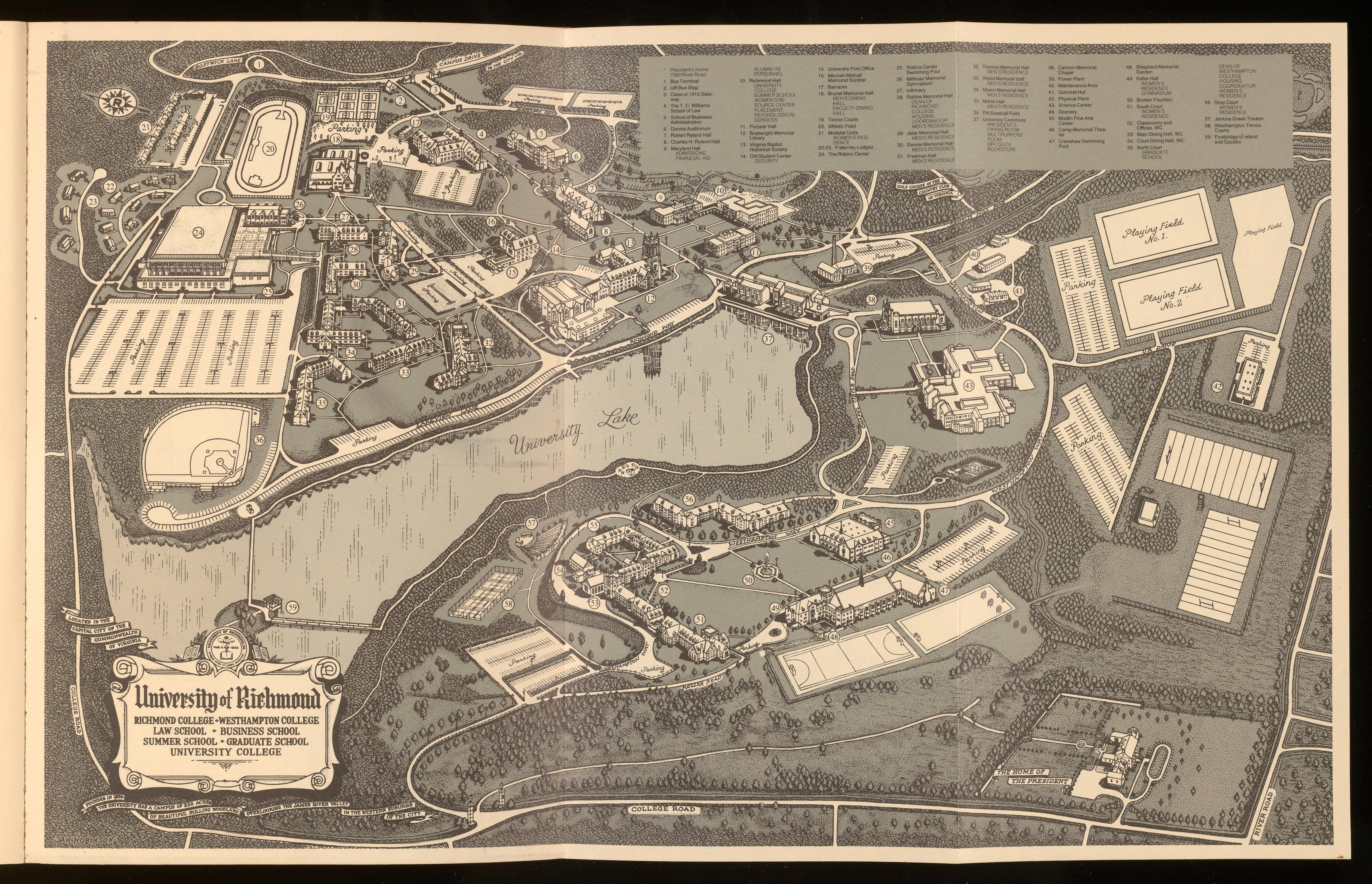
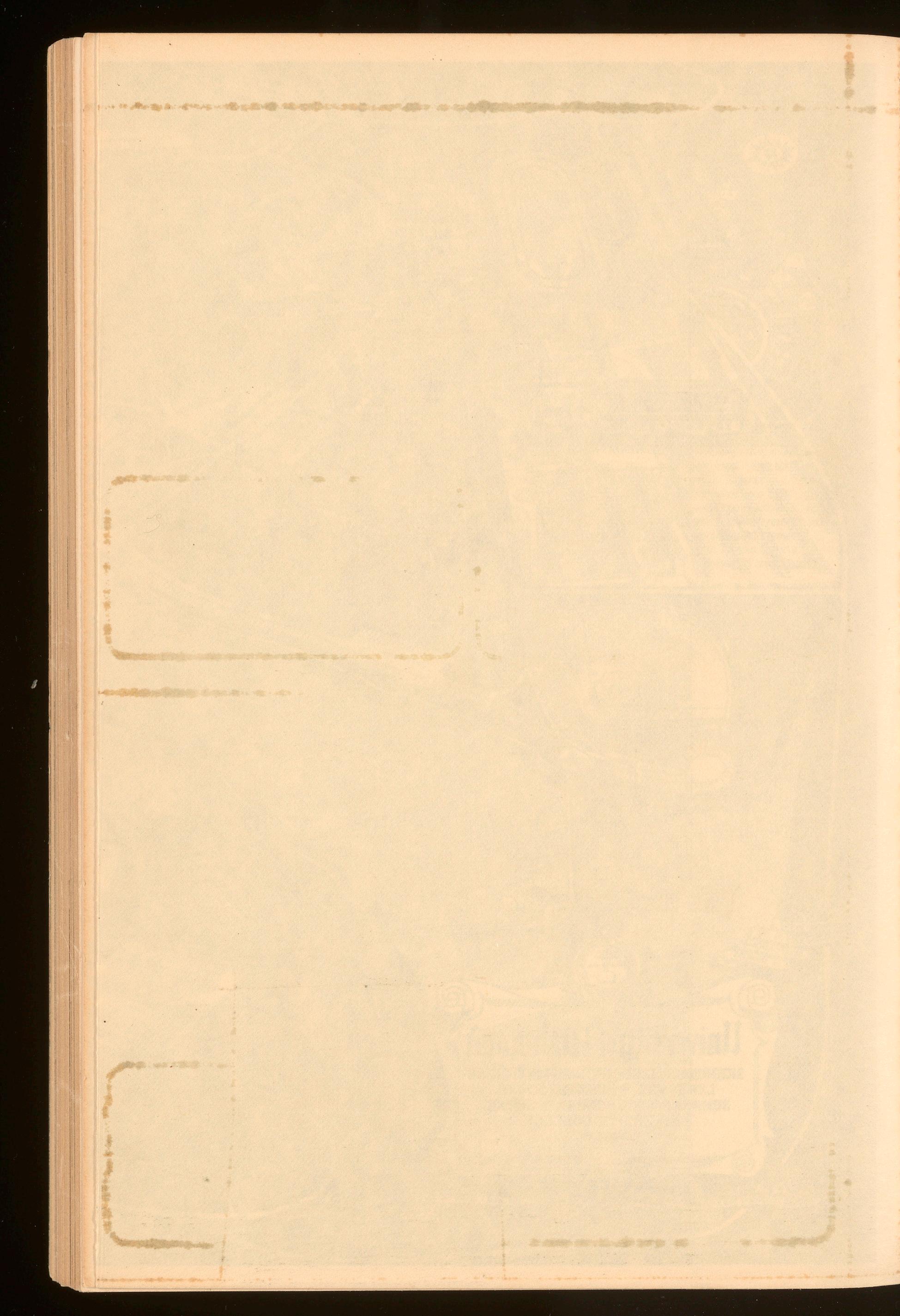
Universityof Richmond
Please
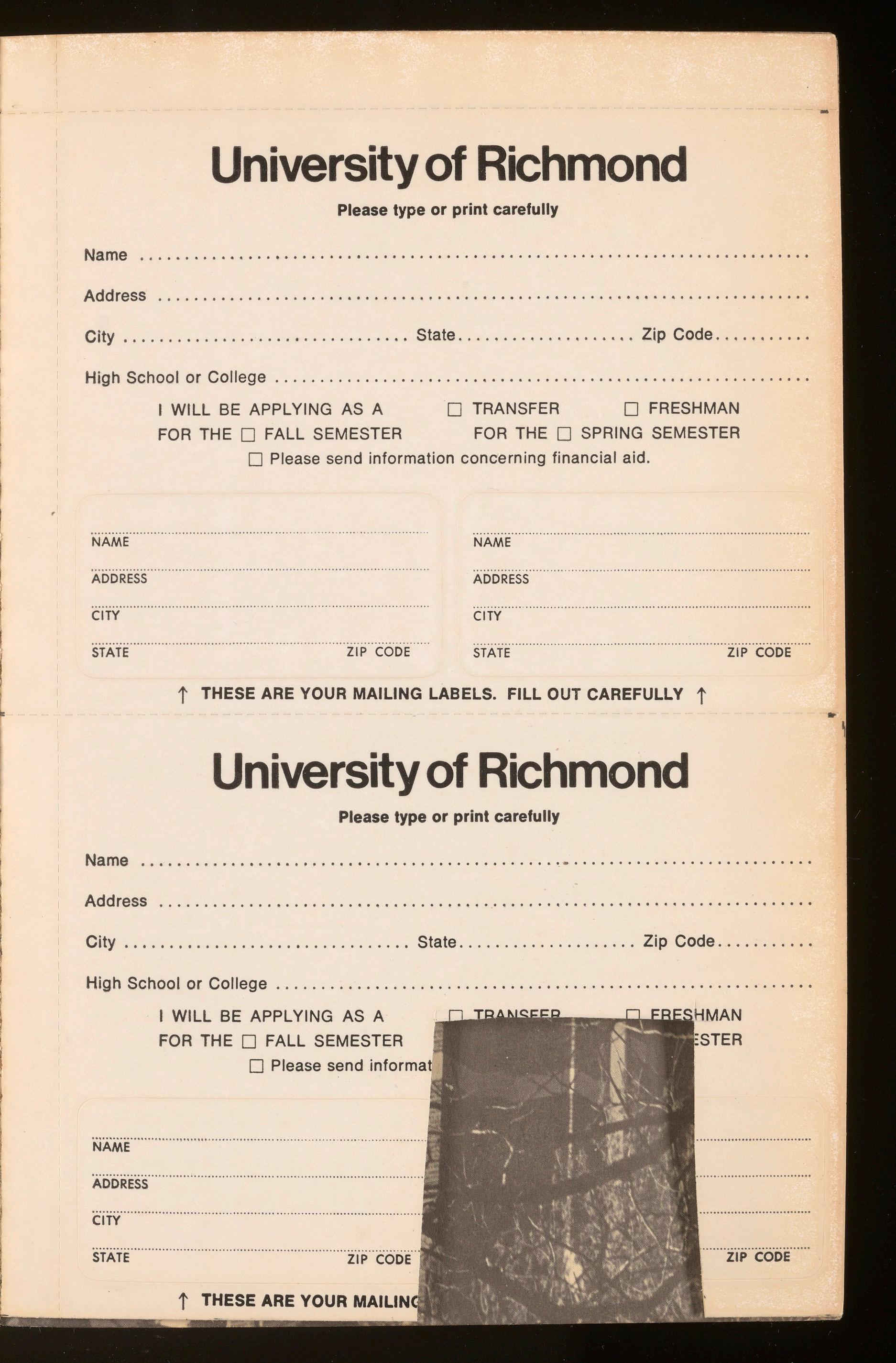
Universityof Richmond
FIRST CLASS Permit No. 1
University of Richmond, Va.
BUSINESS REPLY CARD
No Postage Necessary If Mailed In United St ates
Postage will be paid by:
Director of Admissions
Universityof Richmond Virginia 23173
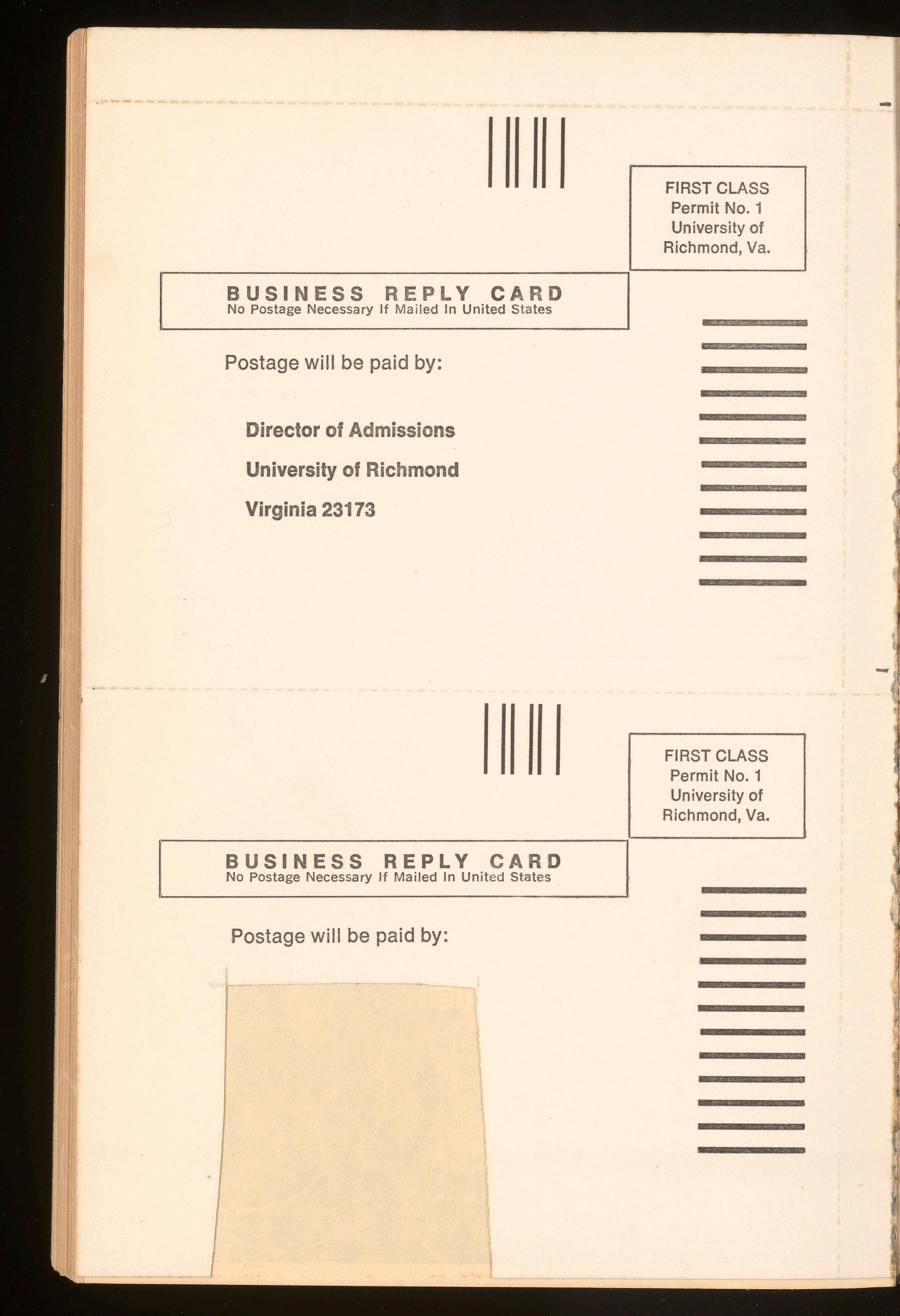
FIRST CLASS Permit No. 1
University of Richmond, Va.
BUSINESS REPLY CARD
No Postage Necessary If Mailed In Unit e d States
Postage will be paid by:
